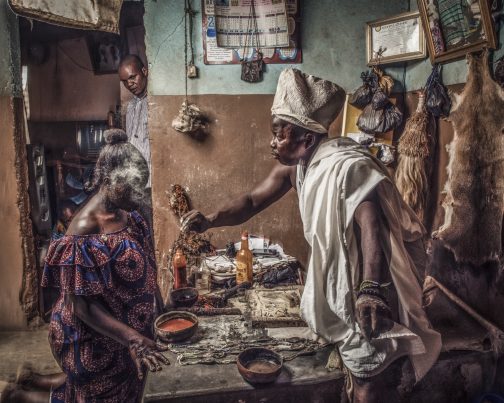
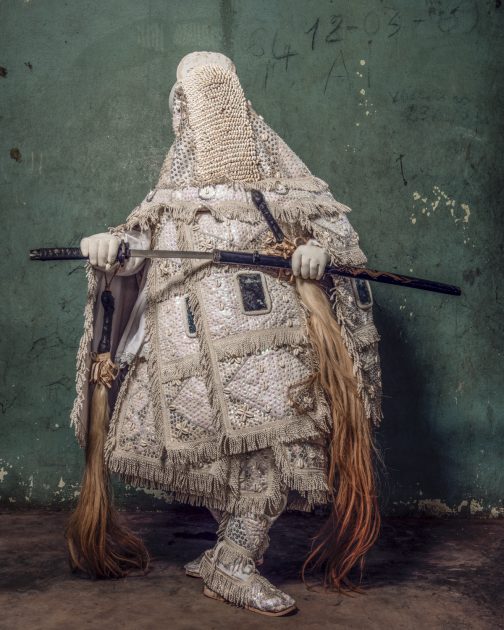
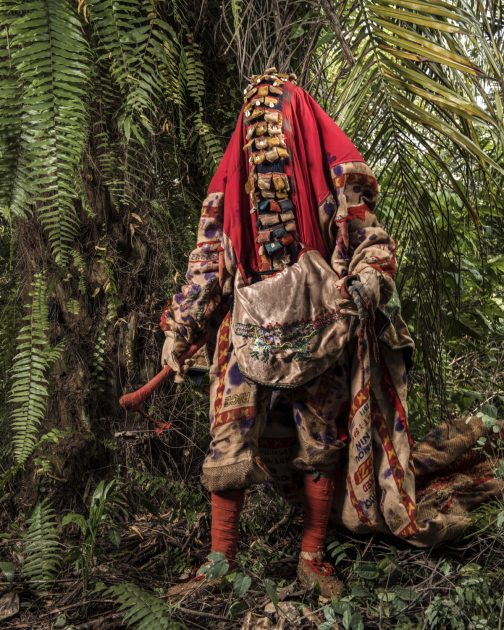
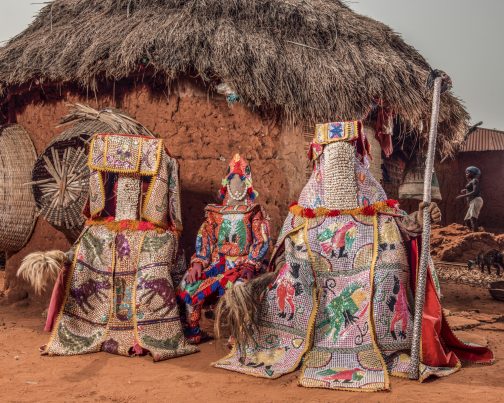
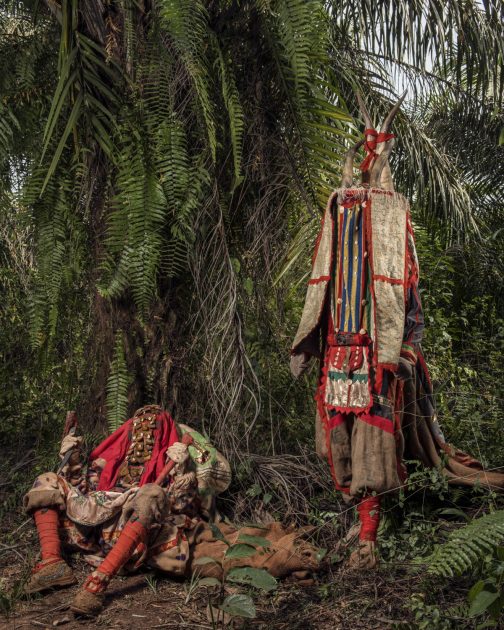
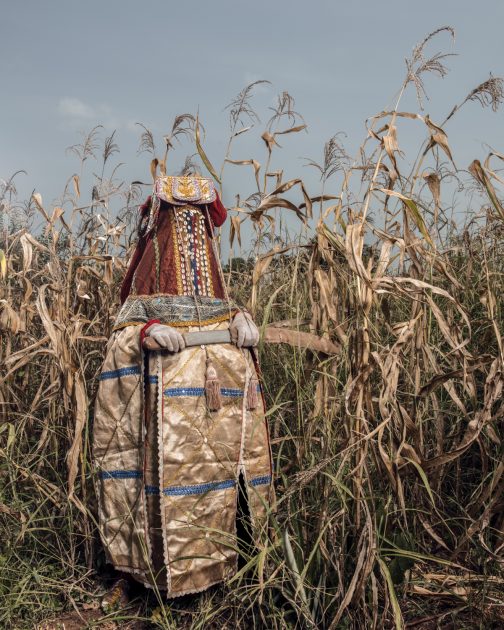
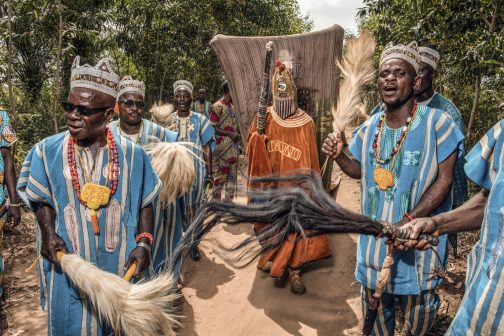
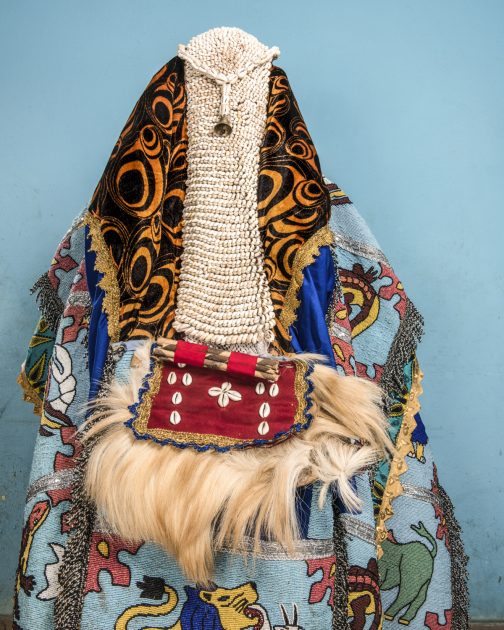
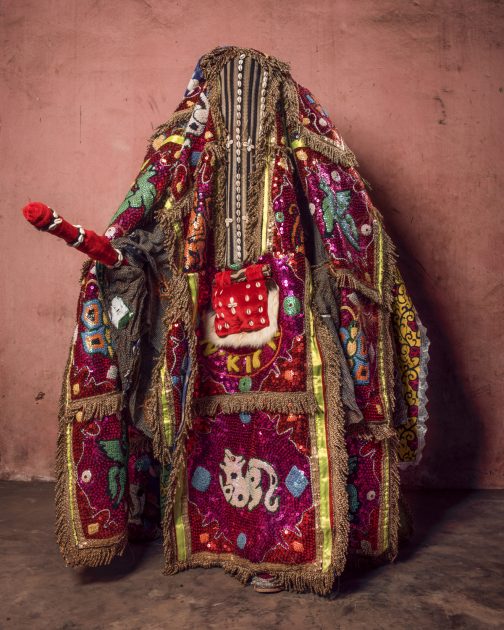
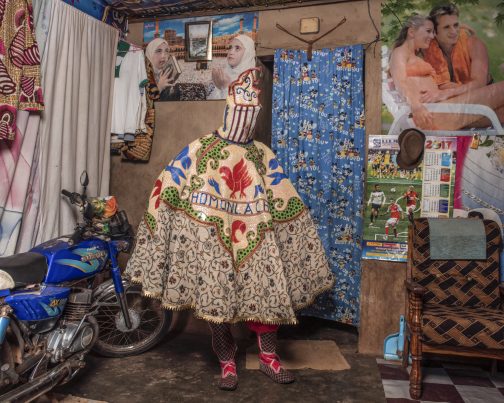
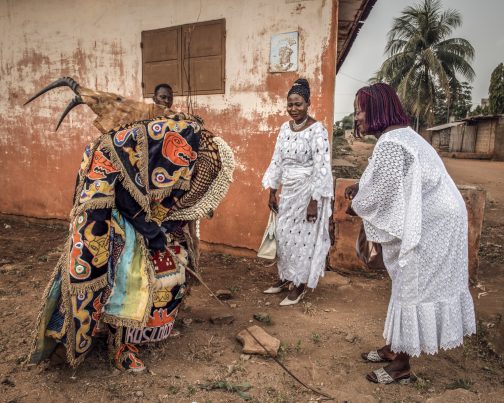
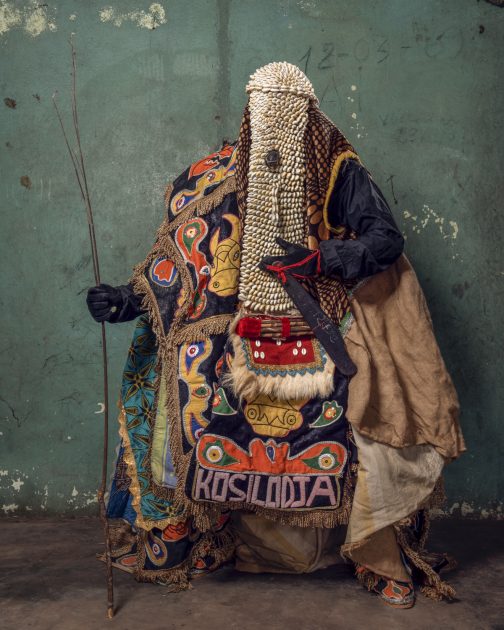
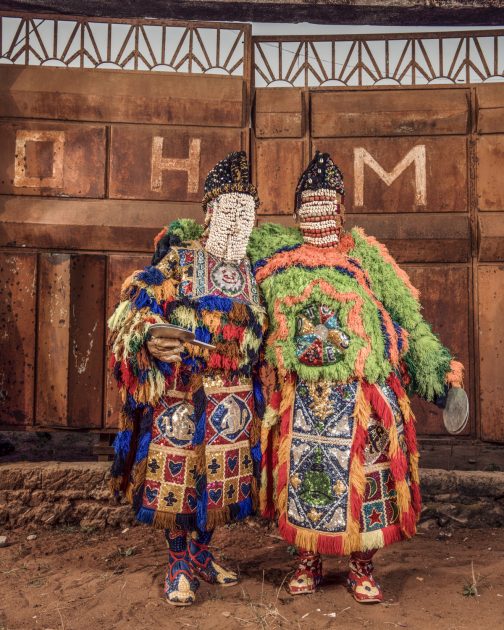
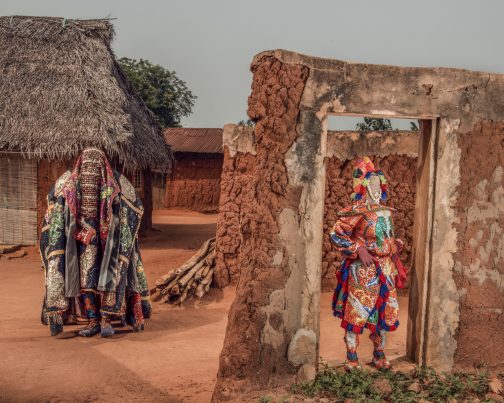
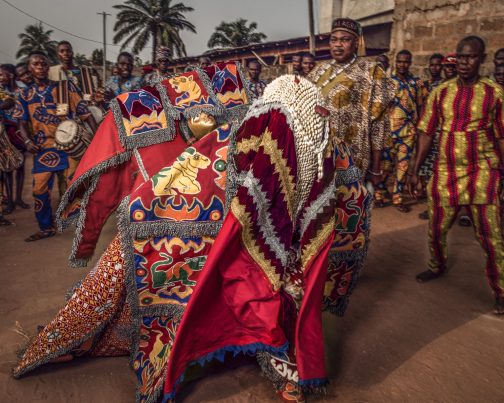
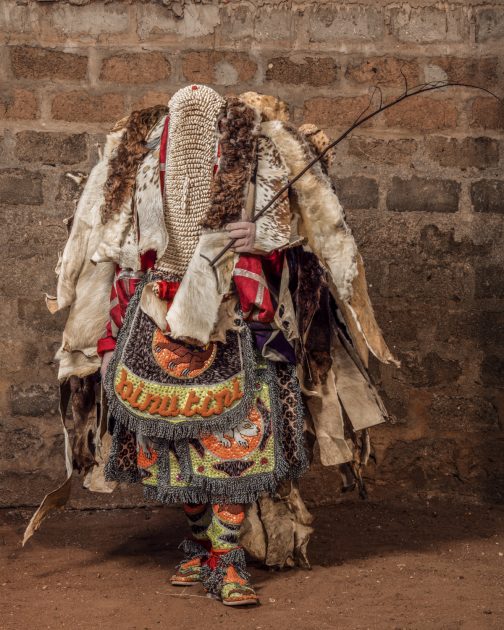
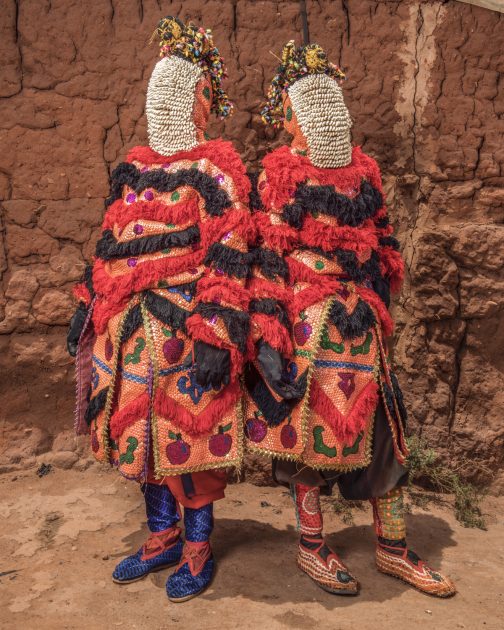
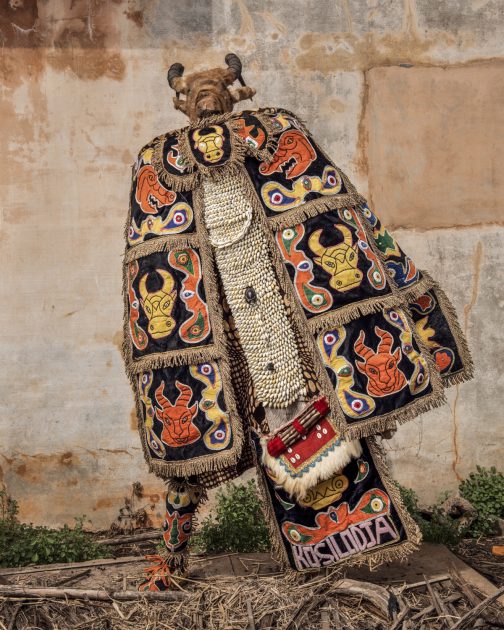
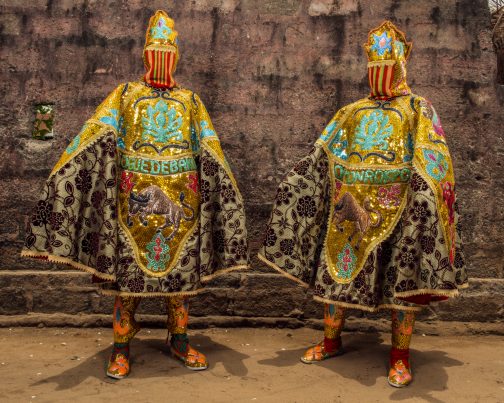
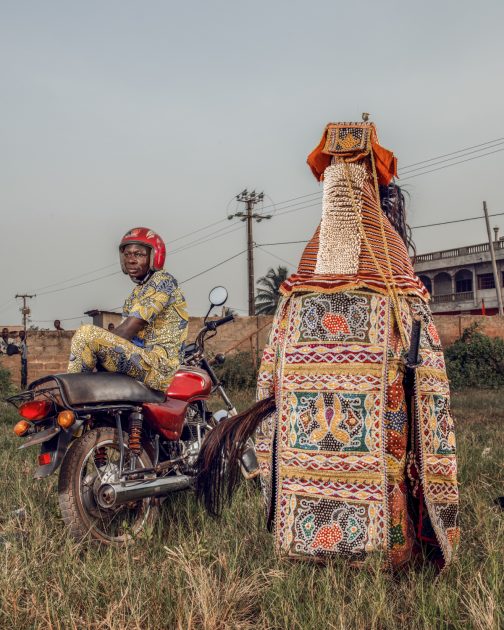
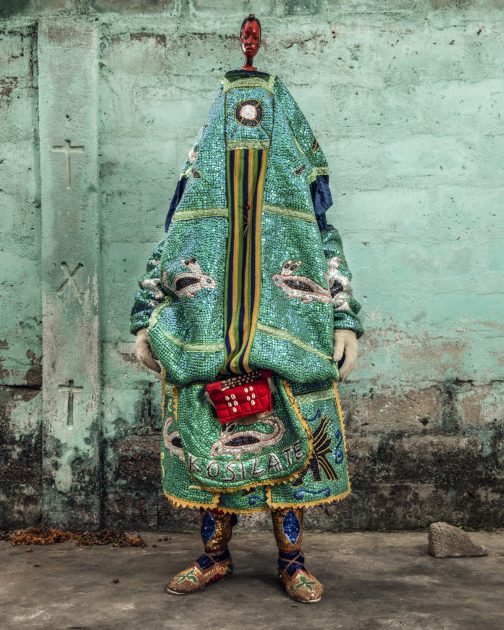
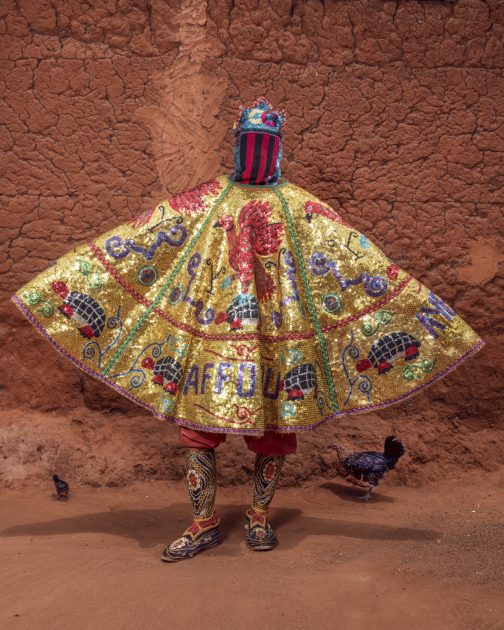
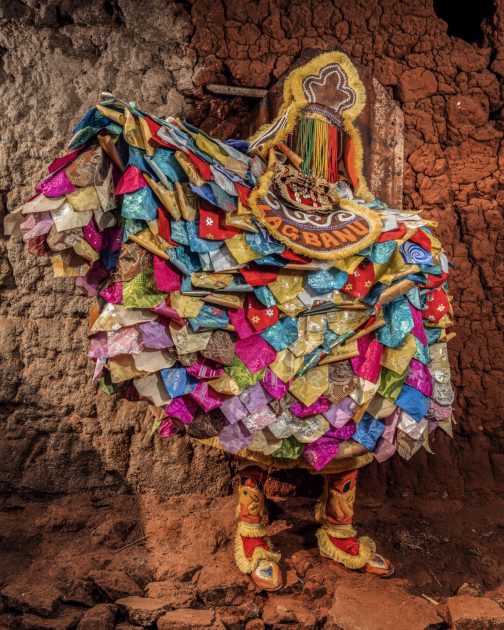
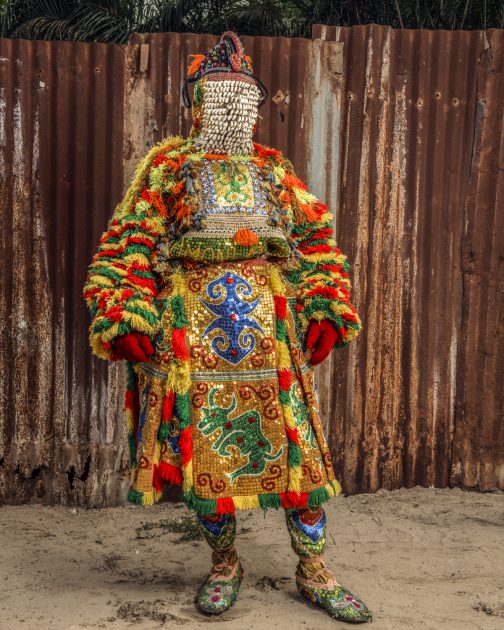
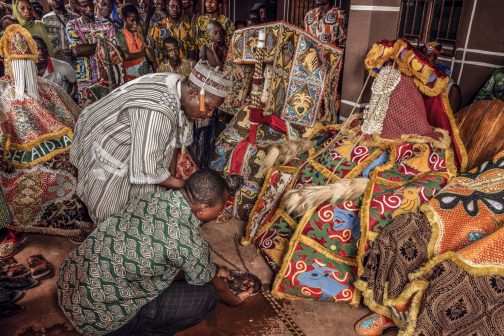
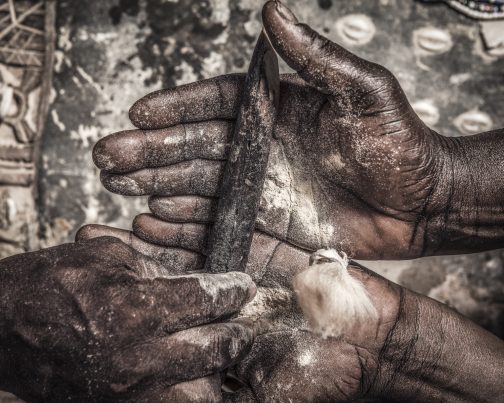
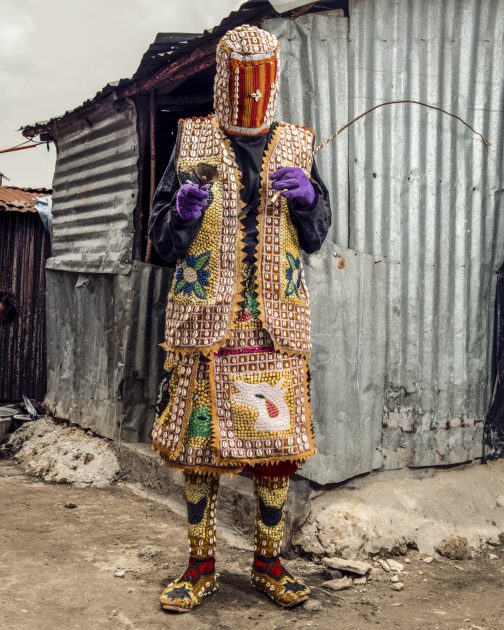
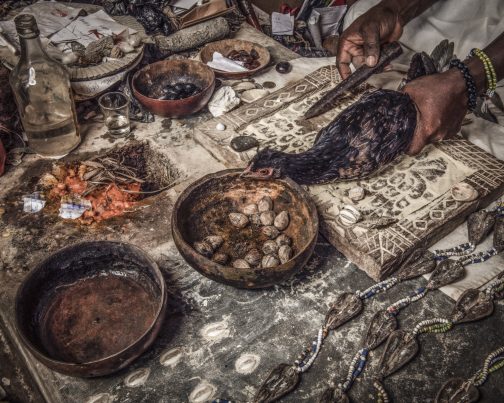
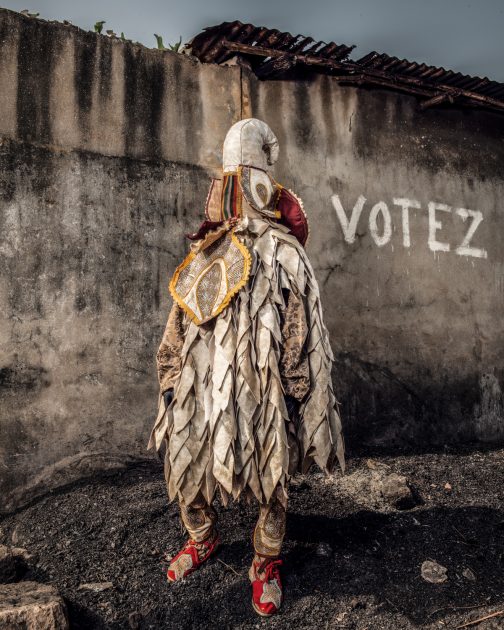
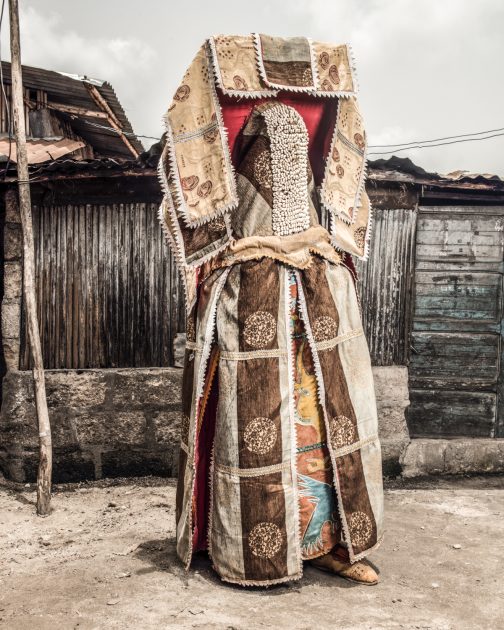
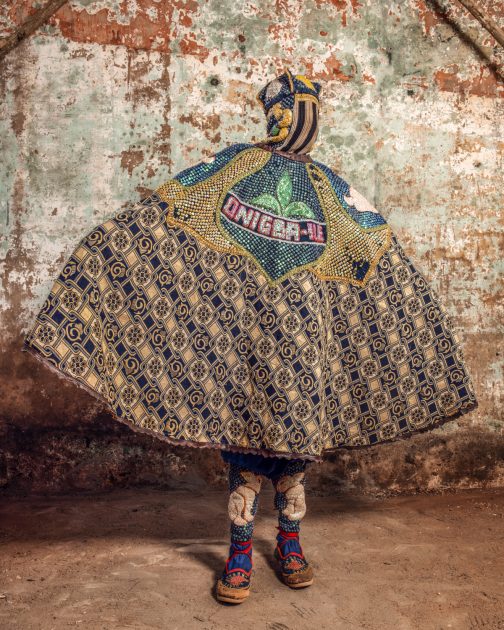
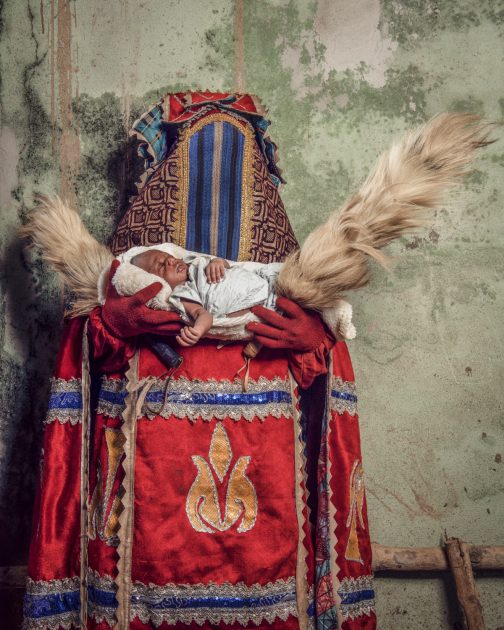
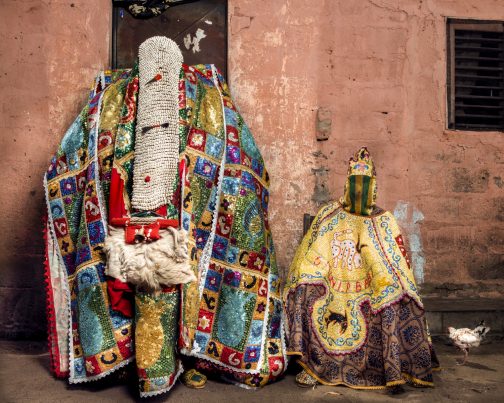
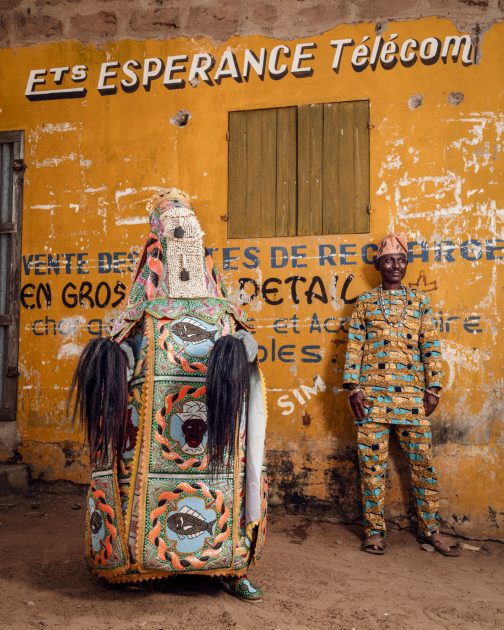
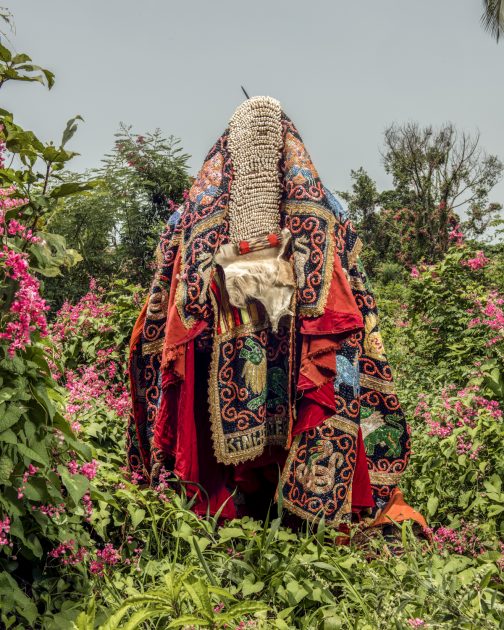
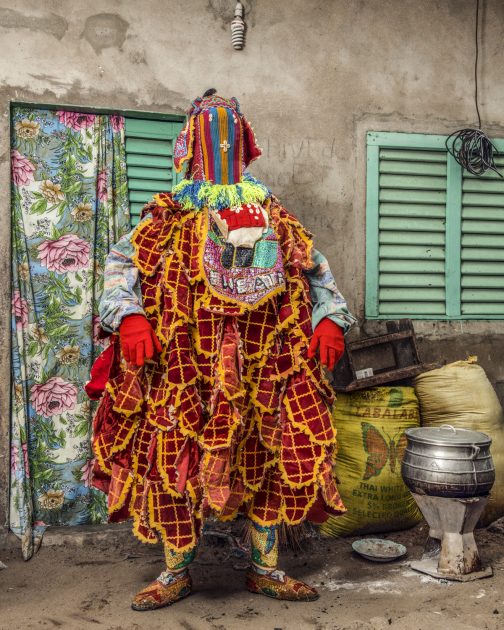
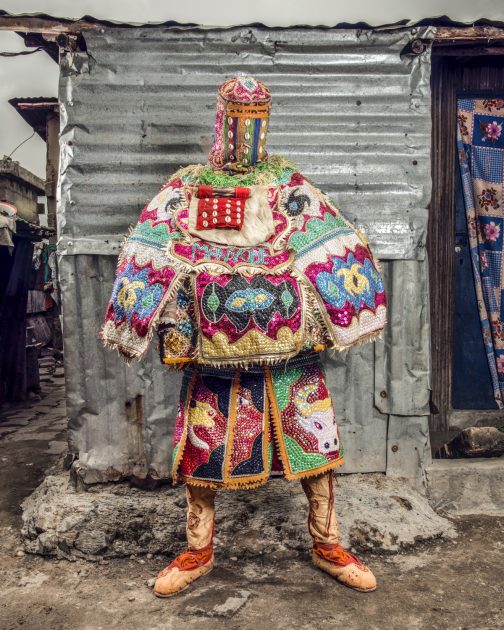
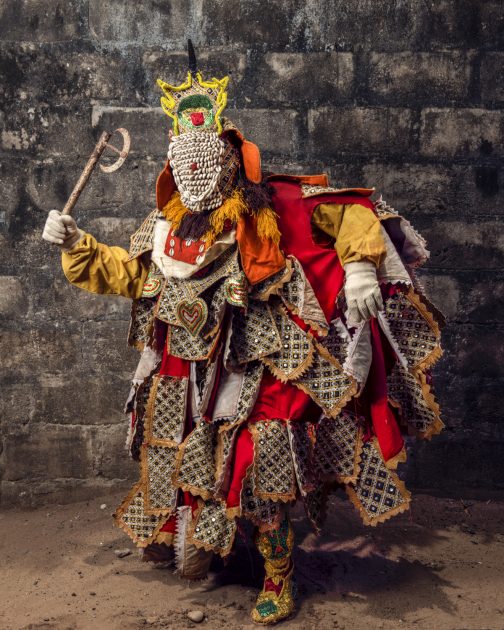
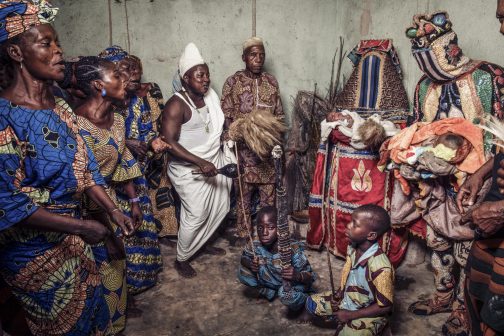
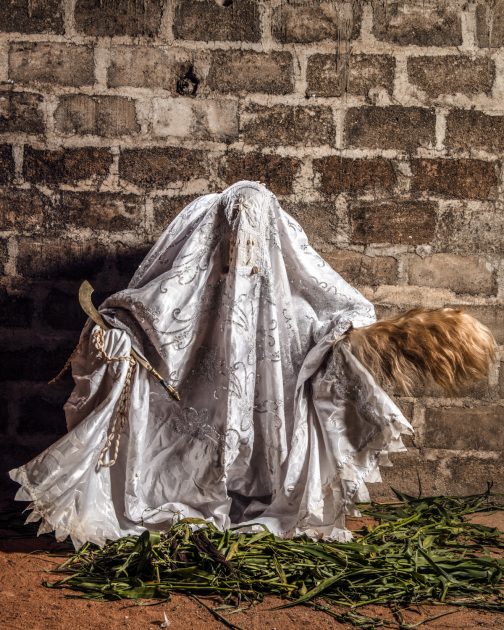
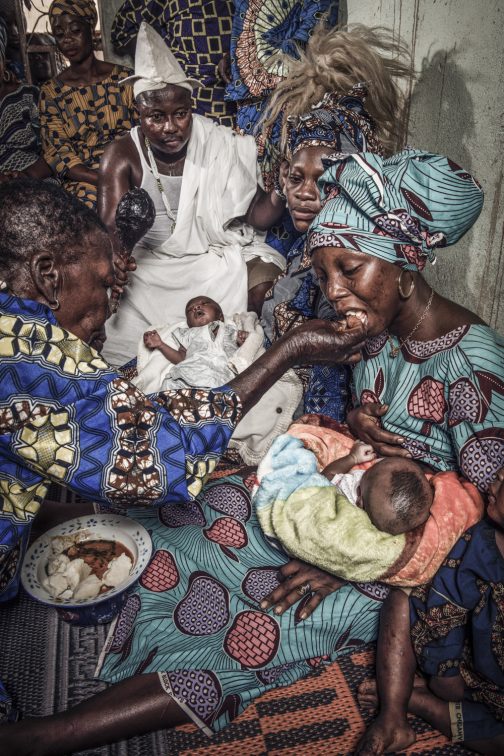
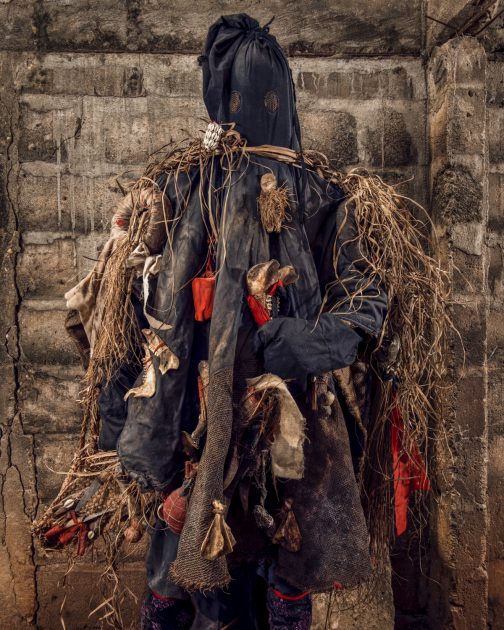
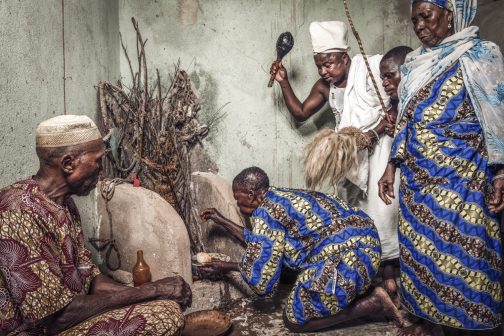
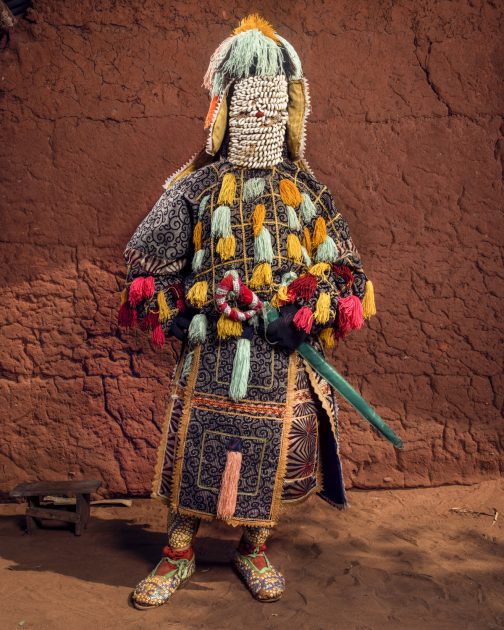
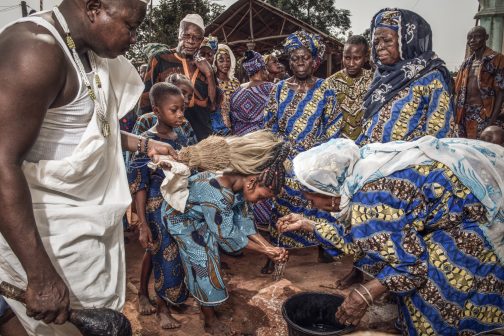
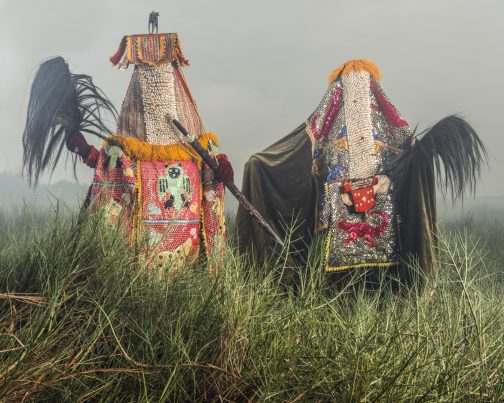
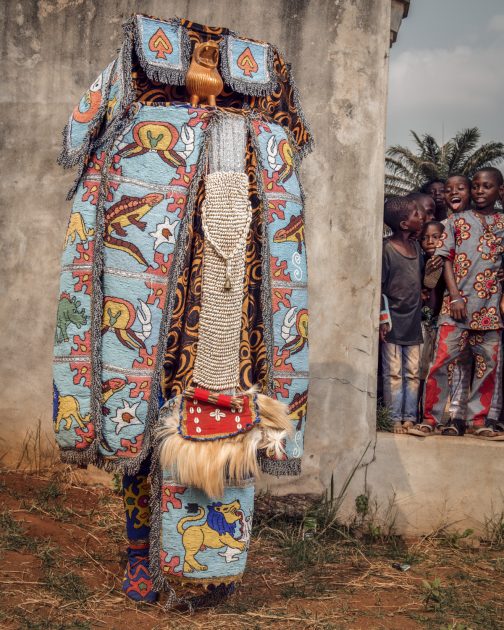
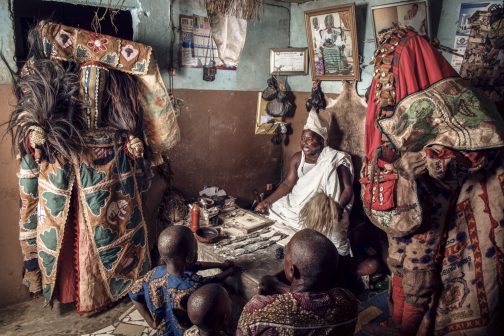
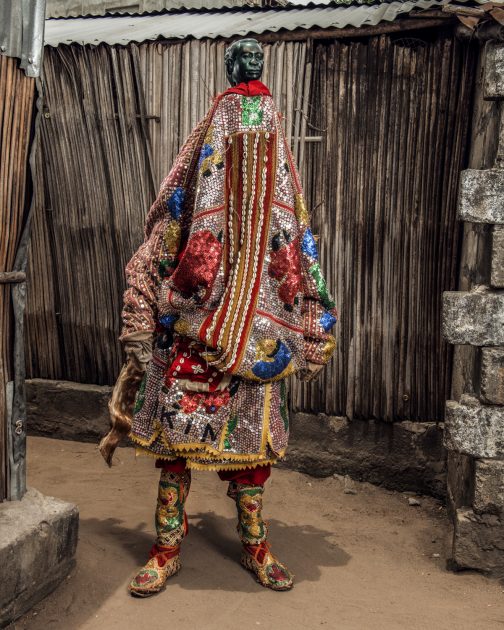
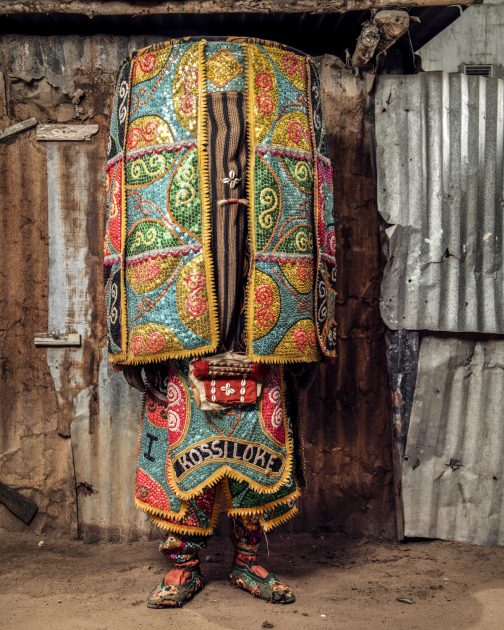
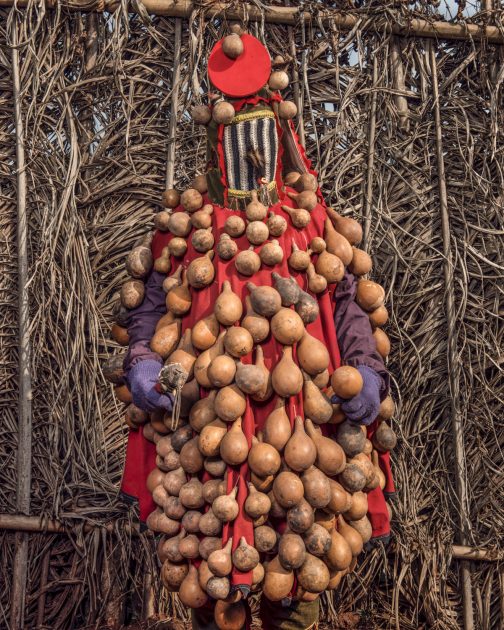
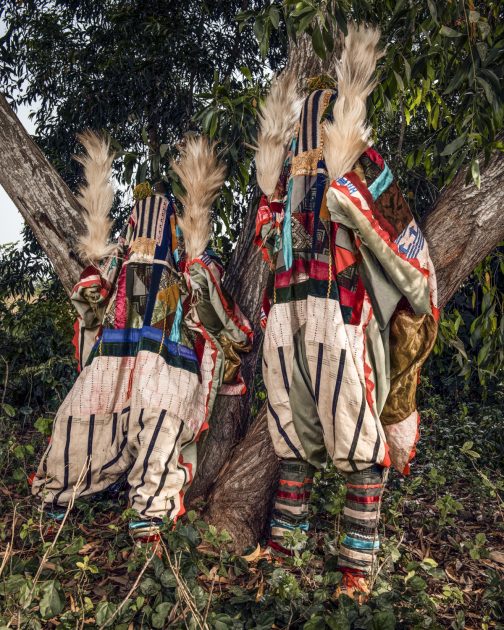
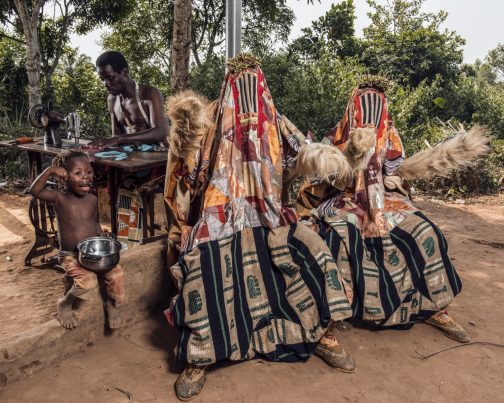
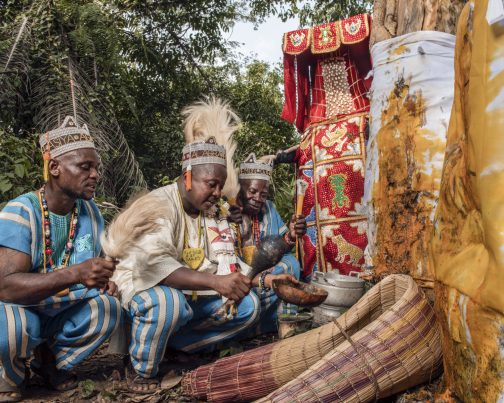
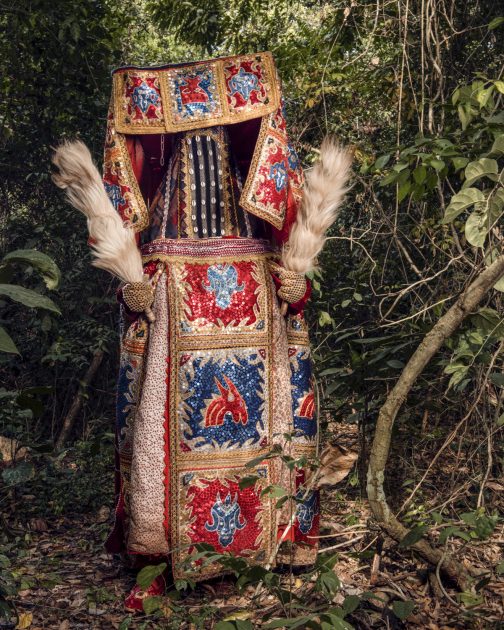
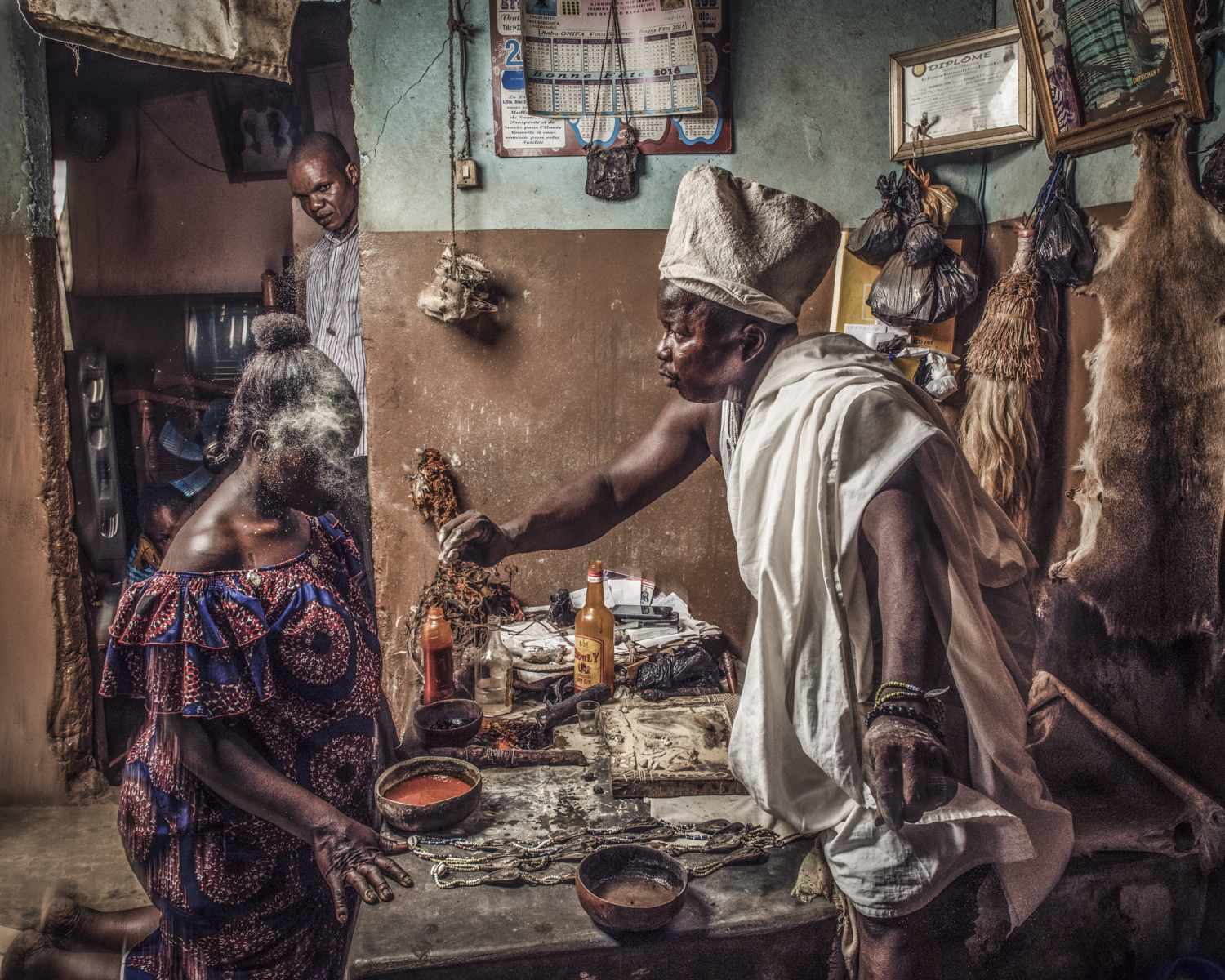
Egungun: Ancestor worship
In Africa, the dead of the family must be honored. For in many African cultures, death does not really exist; the spirit leaves the body to continue its life in the world of the dead, that of the ancestors.
Among the Yoruba, these dead manifest themselves to their descendants through an entity called EGOUN.
It is the spirit of the dead who returns to earth under beautiful loincloths decorated with applications of cut fabric, embroidered and adorned with shells and sequins, bone, and magic wood.
Family and clan societies, strictly reserved for men, have been formed around Egoun the revenant. They evoke the dead, call them and take care of them on earth.
Égoun serves as an intermediary with the souls in the afterlife.
He appears to certain families a few days after the death of one of its members, or during ceremonies performed to honor their memory; he also comes to bring the blessing of the ancestors to the marriages of their descendants and, in certain cases, to welcome a newborn child.
Offerings of food, drink and money are always made to him during his appearances.
EGOUN speaks with a deep, husky voice and dances readily to the sound of Bata or Ogbon drums.
The contact of his loincloth can be fatal to the living, so the MARIWOS (the guardians), members of the EGOUN society, always accompany them, carrying large engraved wooden sticks (lshan) to ward off the unwary. This stick symbolizes the border between the world of the dead (Kou-tome) and the world of the living. Ancestor worship in Africa is directed only to that part of the family that does not go back beyond the founder of the village or the house, that is, to the dynasty of the owners of the inhabited place.
With the exception of the royal families whose members are often deified and therefore have a more important lineage.
This cult is addressed to the deified ancestors and forms a vast system that unites the dead and the living in a continuous and united family whole.
The gods and the dead mix with the living, listen to their complaints, advise them, grant them graces, solve their difficulties and give them remedies for their pains and consolations for their misfortunes. The celestial world is not distant, nor is it superior, and the believer can speak directly with his gods and with his ancestors and benefit from their benevolence.
Each Yoruba clan honors its deceased ancestors in the hope of benefiting from their protection, avoiding their wrath, and keeping the ghosts away from the living.
He therefore regularly brings back the spirit of the ancestors from the realm of the dead (Kou-Tomé)
Each family clan of the ancestor cult has a convent.
It is a sacred place where the masks of the ghosts are kept. It is there that the adepts are trained in secret and that they put on the masks during the ceremonies.
The clan designates those who will be initiated and will have the responsibility of lending their bodies to the spirits of the ancestors and thus, will ensure the dialogue with the ancestors who have become protective deities.
Thus, one or more members of the family are designated, sometimes very young, to be these messengers of the afterlife.
They are taught in secret in a convent for several years, even decades.
There they learn the trance necessary to lend their bodies to the deities, a language that allows them to communicate with the invisible, and to create an appearance...
They emerge from it initiated to the rank of Egungun.
Apart from the initiates, no one knows who is Egungun because during the trances, they appear masked, their bodies totally hidden by their ceremonial costume.
The convent is exclusively reserved for initiates and men, on pain of death. The convent is directed by the Bale, who is generally the head of the family.
The general Alagba is the supreme chief, the king of the Egungun of a city, he watches over the convents of the city.
Egungun: Ancestor worship
In Africa, the dead of the family must be honored. For in many African cultures, death does not really exist; the spirit leaves the body to continue its life in the world of the dead, that of the ancestors.
Among the Yoruba, these dead manifest themselves to their descendants through an entity called EGOUN.
It is the spirit of the dead who returns to earth under beautiful loincloths decorated with applications of cut fabric, embroidered and adorned with shells and sequins, bone, and magic wood.
Family and clan societies, strictly reserved for men, have been formed around Egoun the revenant. They evoke the dead, call them and take care of them on earth.
Égoun serves as an intermediary with the souls in the afterlife.
He appears to certain families a few days after the death of one of its members, or during ceremonies performed to honor their memory; he also comes to bring the blessing of the ancestors to the marriages of their descendants and, in certain cases, to welcome a newborn child.
Offerings of food, drink and money are always made to him during his appearances.
EGOUN speaks with a deep, husky voice and dances readily to the sound of Bata or Ogbon drums.
The contact of his loincloth can be fatal to the living, so the MARIWOS (the guardians), members of the EGOUN society, always accompany them, carrying large engraved wooden sticks (lshan) to ward off the unwary. This stick symbolizes the border between the world of the dead (Kou-tome) and the world of the living. Ancestor worship in Africa is directed only to that part of the family that does not go back beyond the founder of the village or the house, that is, to the dynasty of the owners of the inhabited place.
With the exception of the royal families whose members are often deified and therefore have a more important lineage.
This cult is addressed to the deified ancestors and forms a vast system that unites the dead and the living in a continuous and united family whole.
The gods and the dead mix with the living, listen to their complaints, advise them, grant them graces, solve their difficulties and give them remedies for their pains and consolations for their misfortunes. The celestial world is not distant, nor is it superior, and the believer can speak directly with his gods and with his ancestors and benefit from their benevolence.
Each Yoruba clan honors its deceased ancestors in the hope of benefiting from their protection, avoiding their wrath, and keeping the ghosts away from the living.
He therefore regularly brings back the spirit of the ancestors from the realm of the dead (Kou-Tomé)
Each family clan of the ancestor cult has a convent.
It is a sacred place where the masks of the ghosts are kept. It is there that the adepts are trained in secret and that they put on the masks during the ceremonies.
The clan designates those who will be initiated and will have the responsibility of lending their bodies to the spirits of the ancestors and thus, will ensure the dialogue with the ancestors who have become protective deities.
Thus, one or more members of the family are designated, sometimes very young, to be these messengers of the afterlife.
They are taught in secret in a convent for several years, even decades.
There they learn the trance necessary to lend their bodies to the deities, a language that allows them to communicate with the invisible, and to create an appearance...
They emerge from it initiated to the rank of Egungun.
Apart from the initiates, no one knows who is Egungun because during the trances, they appear masked, their bodies totally hidden by their ceremonial costume.
The convent is exclusively reserved for initiates and men, on pain of death. The convent is directed by the Bale, who is generally the head of the family.
The general Alagba is the supreme chief, the king of the Egungun of a city, he watches over the convents of the city.
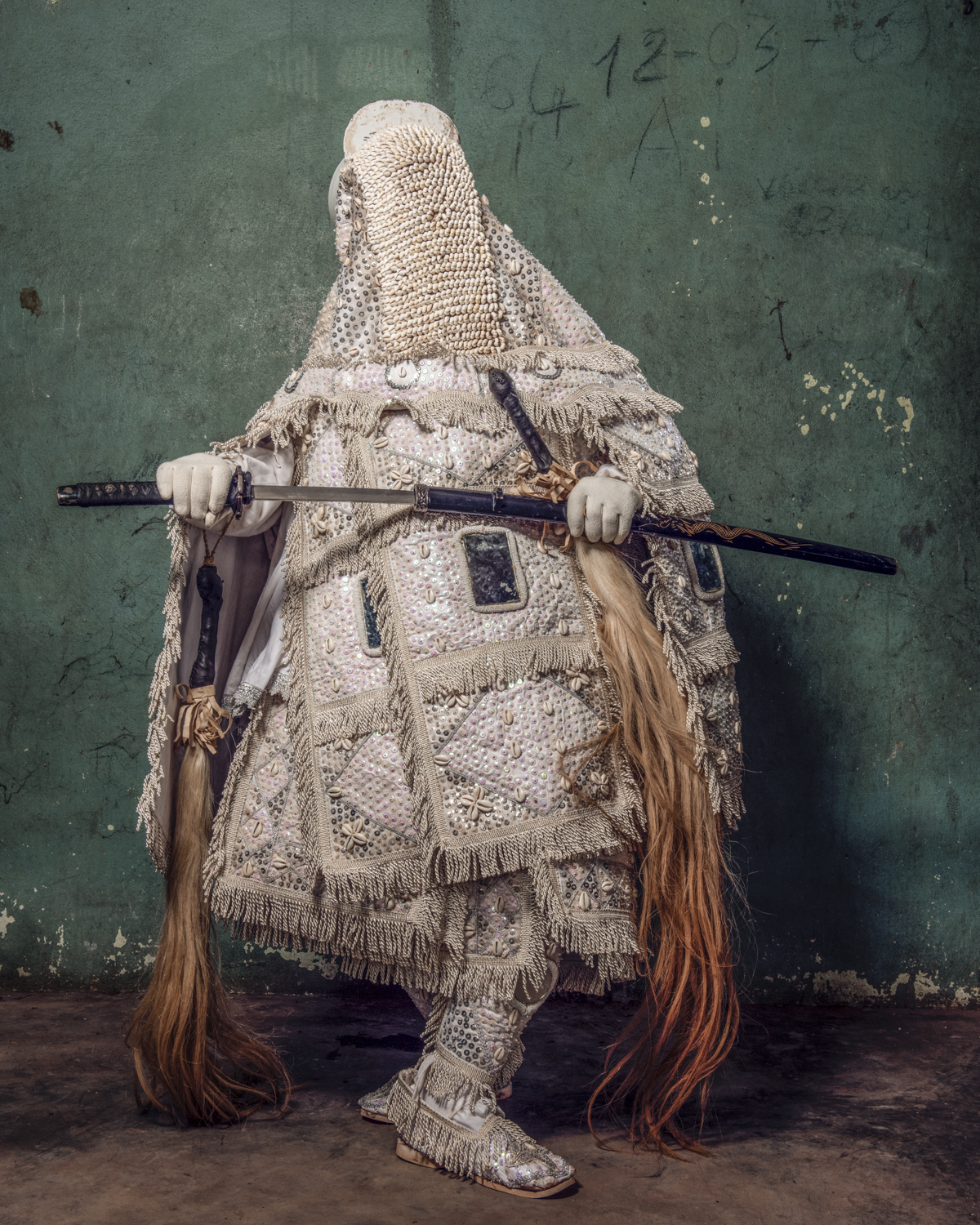
Egungun: Ancestor worship
In Africa, the dead of the family must be honored. For in many African cultures, death does not really exist; the spirit leaves the body to continue its life in the world of the dead, that of the ancestors.
Among the Yoruba, these dead manifest themselves to their descendants through an entity called EGOUN.
It is the spirit of the dead who returns to earth under beautiful loincloths decorated with applications of cut fabric, embroidered and adorned with shells and sequins, bone, and magic wood.
Family and clan societies, strictly reserved for men, have been formed around Egoun the revenant. They evoke the dead, call them and take care of them on earth.
Égoun serves as an intermediary with the souls in the afterlife.
He appears to certain families a few days after the death of one of its members, or during ceremonies performed to honor their memory; he also comes to bring the blessing of the ancestors to the marriages of their descendants and, in certain cases, to welcome a newborn child.
Offerings of food, drink and money are always made to him during his appearances.
EGOUN speaks with a deep, husky voice and dances readily to the sound of Bata or Ogbon drums.
The contact of his loincloth can be fatal to the living, so the MARIWOS (the guardians), members of the EGOUN society, always accompany them, carrying large engraved wooden sticks (lshan) to ward off the unwary. This stick symbolizes the border between the world of the dead (Kou-tome) and the world of the living. Ancestor worship in Africa is directed only to that part of the family that does not go back beyond the founder of the village or the house, that is, to the dynasty of the owners of the inhabited place.
With the exception of the royal families whose members are often deified and therefore have a more important lineage.
This cult is addressed to the deified ancestors and forms a vast system that unites the dead and the living in a continuous and united family whole.
The gods and the dead mix with the living, listen to their complaints, advise them, grant them graces, solve their difficulties and give them remedies for their pains and consolations for their misfortunes. The celestial world is not distant, nor is it superior, and the believer can speak directly with his gods and with his ancestors and benefit from their benevolence.
Each Yoruba clan honors its deceased ancestors in the hope of benefiting from their protection, avoiding their wrath, and keeping the ghosts away from the living.
He therefore regularly brings back the spirit of the ancestors from the realm of the dead (Kou-Tomé)
Each family clan of the ancestor cult has a convent.
It is a sacred place where the masks of the ghosts are kept. It is there that the adepts are trained in secret and that they put on the masks during the ceremonies.
The clan designates those who will be initiated and will have the responsibility of lending their bodies to the spirits of the ancestors and thus, will ensure the dialogue with the ancestors who have become protective deities.
Thus, one or more members of the family are designated, sometimes very young, to be these messengers of the afterlife.
They are taught in secret in a convent for several years, even decades.
There they learn the trance necessary to lend their bodies to the deities, a language that allows them to communicate with the invisible, and to create an appearance...
They emerge from it initiated to the rank of Egungun.
Apart from the initiates, no one knows who is Egungun because during the trances, they appear masked, their bodies totally hidden by their ceremonial costume.
The convent is exclusively reserved for initiates and men, on pain of death. The convent is directed by the Bale, who is generally the head of the family.
The general Alagba is the supreme chief, the king of the Egungun of a city, he watches over the convents of the city.
Egungun: Ancestor worship
In Africa, the dead of the family must be honored. For in many African cultures, death does not really exist; the spirit leaves the body to continue its life in the world of the dead, that of the ancestors.
Among the Yoruba, these dead manifest themselves to their descendants through an entity called EGOUN.
It is the spirit of the dead who returns to earth under beautiful loincloths decorated with applications of cut fabric, embroidered and adorned with shells and sequins, bone, and magic wood.
Family and clan societies, strictly reserved for men, have been formed around Egoun the revenant. They evoke the dead, call them and take care of them on earth.
Égoun serves as an intermediary with the souls in the afterlife.
He appears to certain families a few days after the death of one of its members, or during ceremonies performed to honor their memory; he also comes to bring the blessing of the ancestors to the marriages of their descendants and, in certain cases, to welcome a newborn child.
Offerings of food, drink and money are always made to him during his appearances.
EGOUN speaks with a deep, husky voice and dances readily to the sound of Bata or Ogbon drums.
The contact of his loincloth can be fatal to the living, so the MARIWOS (the guardians), members of the EGOUN society, always accompany them, carrying large engraved wooden sticks (lshan) to ward off the unwary. This stick symbolizes the border between the world of the dead (Kou-tome) and the world of the living. Ancestor worship in Africa is directed only to that part of the family that does not go back beyond the founder of the village or the house, that is, to the dynasty of the owners of the inhabited place.
With the exception of the royal families whose members are often deified and therefore have a more important lineage.
This cult is addressed to the deified ancestors and forms a vast system that unites the dead and the living in a continuous and united family whole.
The gods and the dead mix with the living, listen to their complaints, advise them, grant them graces, solve their difficulties and give them remedies for their pains and consolations for their misfortunes. The celestial world is not distant, nor is it superior, and the believer can speak directly with his gods and with his ancestors and benefit from their benevolence.
Each Yoruba clan honors its deceased ancestors in the hope of benefiting from their protection, avoiding their wrath, and keeping the ghosts away from the living.
He therefore regularly brings back the spirit of the ancestors from the realm of the dead (Kou-Tomé)
Each family clan of the ancestor cult has a convent.
It is a sacred place where the masks of the ghosts are kept. It is there that the adepts are trained in secret and that they put on the masks during the ceremonies.
The clan designates those who will be initiated and will have the responsibility of lending their bodies to the spirits of the ancestors and thus, will ensure the dialogue with the ancestors who have become protective deities.
Thus, one or more members of the family are designated, sometimes very young, to be these messengers of the afterlife.
They are taught in secret in a convent for several years, even decades.
There they learn the trance necessary to lend their bodies to the deities, a language that allows them to communicate with the invisible, and to create an appearance...
They emerge from it initiated to the rank of Egungun.
Apart from the initiates, no one knows who is Egungun because during the trances, they appear masked, their bodies totally hidden by their ceremonial costume.
The convent is exclusively reserved for initiates and men, on pain of death. The convent is directed by the Bale, who is generally the head of the family.
The general Alagba is the supreme chief, the king of the Egungun of a city, he watches over the convents of the city.
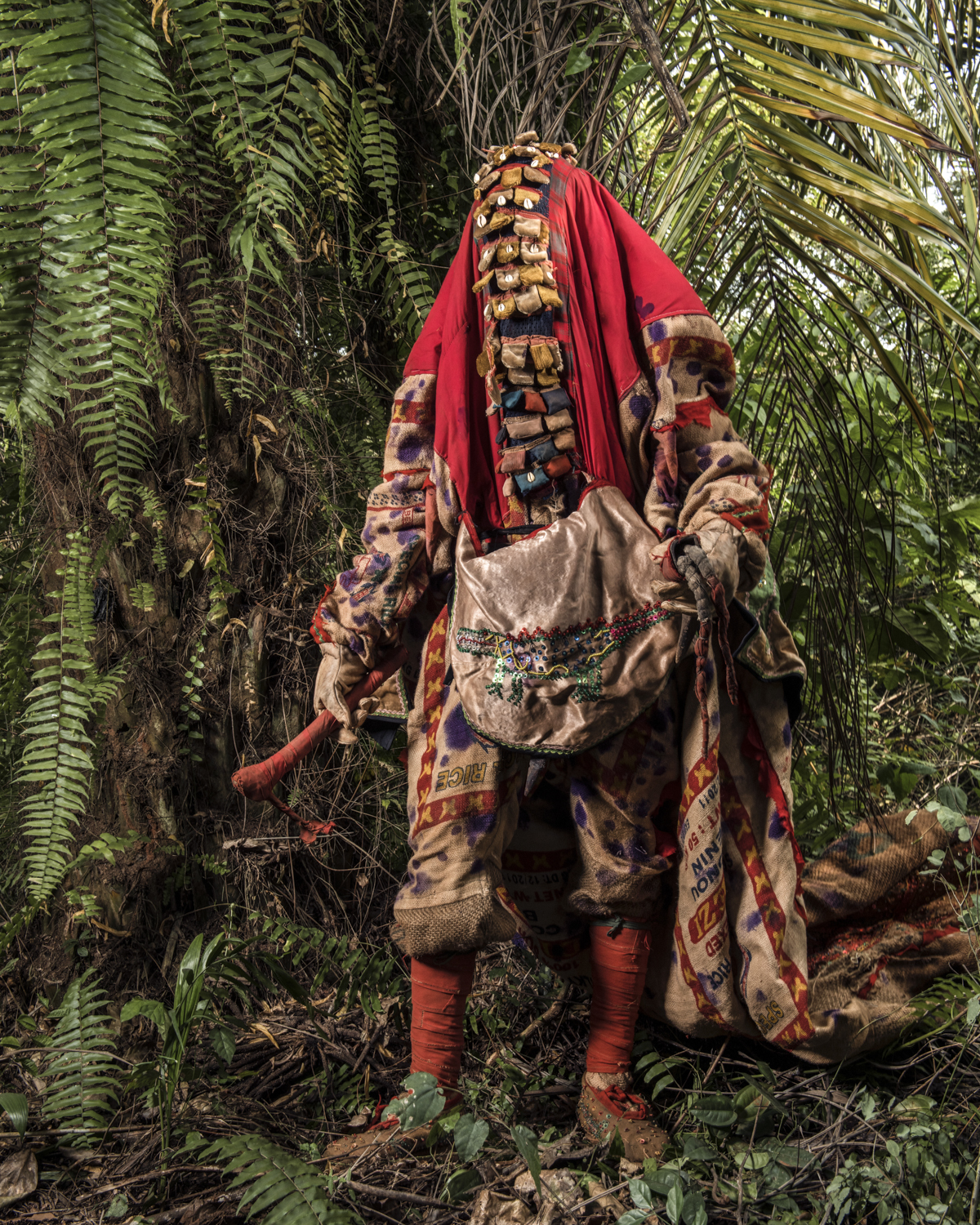
Egungun: Ancestor worship
In Africa, the dead of the family must be honored. For in many African cultures, death does not really exist; the spirit leaves the body to continue its life in the world of the dead, that of the ancestors.
Among the Yoruba, these dead manifest themselves to their descendants through an entity called EGOUN.
It is the spirit of the dead who returns to earth under beautiful loincloths decorated with applications of cut fabric, embroidered and adorned with shells and sequins, bone, and magic wood.
Family and clan societies, strictly reserved for men, have been formed around Egoun the revenant. They evoke the dead, call them and take care of them on earth.
Égoun serves as an intermediary with the souls in the afterlife.
He appears to certain families a few days after the death of one of its members, or during ceremonies performed to honor their memory; he also comes to bring the blessing of the ancestors to the marriages of their descendants and, in certain cases, to welcome a newborn child.
Offerings of food, drink and money are always made to him during his appearances.
EGOUN speaks with a deep, husky voice and dances readily to the sound of Bata or Ogbon drums.
The contact of his loincloth can be fatal to the living, so the MARIWOS (the guardians), members of the EGOUN society, always accompany them, carrying large engraved wooden sticks (lshan) to ward off the unwary. This stick symbolizes the border between the world of the dead (Kou-tome) and the world of the living. Ancestor worship in Africa is directed only to that part of the family that does not go back beyond the founder of the village or the house, that is, to the dynasty of the owners of the inhabited place.
With the exception of the royal families whose members are often deified and therefore have a more important lineage.
This cult is addressed to the deified ancestors and forms a vast system that unites the dead and the living in a continuous and united family whole.
The gods and the dead mix with the living, listen to their complaints, advise them, grant them graces, solve their difficulties and give them remedies for their pains and consolations for their misfortunes. The celestial world is not distant, nor is it superior, and the believer can speak directly with his gods and with his ancestors and benefit from their benevolence.
Each Yoruba clan honors its deceased ancestors in the hope of benefiting from their protection, avoiding their wrath, and keeping the ghosts away from the living.
He therefore regularly brings back the spirit of the ancestors from the realm of the dead (Kou-Tomé)
Each family clan of the ancestor cult has a convent.
It is a sacred place where the masks of the ghosts are kept. It is there that the adepts are trained in secret and that they put on the masks during the ceremonies.
The clan designates those who will be initiated and will have the responsibility of lending their bodies to the spirits of the ancestors and thus, will ensure the dialogue with the ancestors who have become protective deities.
Thus, one or more members of the family are designated, sometimes very young, to be these messengers of the afterlife.
They are taught in secret in a convent for several years, even decades.
There they learn the trance necessary to lend their bodies to the deities, a language that allows them to communicate with the invisible, and to create an appearance...
They emerge from it initiated to the rank of Egungun.
Apart from the initiates, no one knows who is Egungun because during the trances, they appear masked, their bodies totally hidden by their ceremonial costume.
The convent is exclusively reserved for initiates and men, on pain of death. The convent is directed by the Bale, who is generally the head of the family.
The general Alagba is the supreme chief, the king of the Egungun of a city, he watches over the convents of the city.
Egungun: Ancestor worship
In Africa, the dead of the family must be honored. For in many African cultures, death does not really exist; the spirit leaves the body to continue its life in the world of the dead, that of the ancestors.
Among the Yoruba, these dead manifest themselves to their descendants through an entity called EGOUN.
It is the spirit of the dead who returns to earth under beautiful loincloths decorated with applications of cut fabric, embroidered and adorned with shells and sequins, bone, and magic wood.
Family and clan societies, strictly reserved for men, have been formed around Egoun the revenant. They evoke the dead, call them and take care of them on earth.
Égoun serves as an intermediary with the souls in the afterlife.
He appears to certain families a few days after the death of one of its members, or during ceremonies performed to honor their memory; he also comes to bring the blessing of the ancestors to the marriages of their descendants and, in certain cases, to welcome a newborn child.
Offerings of food, drink and money are always made to him during his appearances.
EGOUN speaks with a deep, husky voice and dances readily to the sound of Bata or Ogbon drums.
The contact of his loincloth can be fatal to the living, so the MARIWOS (the guardians), members of the EGOUN society, always accompany them, carrying large engraved wooden sticks (lshan) to ward off the unwary. This stick symbolizes the border between the world of the dead (Kou-tome) and the world of the living. Ancestor worship in Africa is directed only to that part of the family that does not go back beyond the founder of the village or the house, that is, to the dynasty of the owners of the inhabited place.
With the exception of the royal families whose members are often deified and therefore have a more important lineage.
This cult is addressed to the deified ancestors and forms a vast system that unites the dead and the living in a continuous and united family whole.
The gods and the dead mix with the living, listen to their complaints, advise them, grant them graces, solve their difficulties and give them remedies for their pains and consolations for their misfortunes. The celestial world is not distant, nor is it superior, and the believer can speak directly with his gods and with his ancestors and benefit from their benevolence.
Each Yoruba clan honors its deceased ancestors in the hope of benefiting from their protection, avoiding their wrath, and keeping the ghosts away from the living.
He therefore regularly brings back the spirit of the ancestors from the realm of the dead (Kou-Tomé)
Each family clan of the ancestor cult has a convent.
It is a sacred place where the masks of the ghosts are kept. It is there that the adepts are trained in secret and that they put on the masks during the ceremonies.
The clan designates those who will be initiated and will have the responsibility of lending their bodies to the spirits of the ancestors and thus, will ensure the dialogue with the ancestors who have become protective deities.
Thus, one or more members of the family are designated, sometimes very young, to be these messengers of the afterlife.
They are taught in secret in a convent for several years, even decades.
There they learn the trance necessary to lend their bodies to the deities, a language that allows them to communicate with the invisible, and to create an appearance...
They emerge from it initiated to the rank of Egungun.
Apart from the initiates, no one knows who is Egungun because during the trances, they appear masked, their bodies totally hidden by their ceremonial costume.
The convent is exclusively reserved for initiates and men, on pain of death. The convent is directed by the Bale, who is generally the head of the family.
The general Alagba is the supreme chief, the king of the Egungun of a city, he watches over the convents of the city.
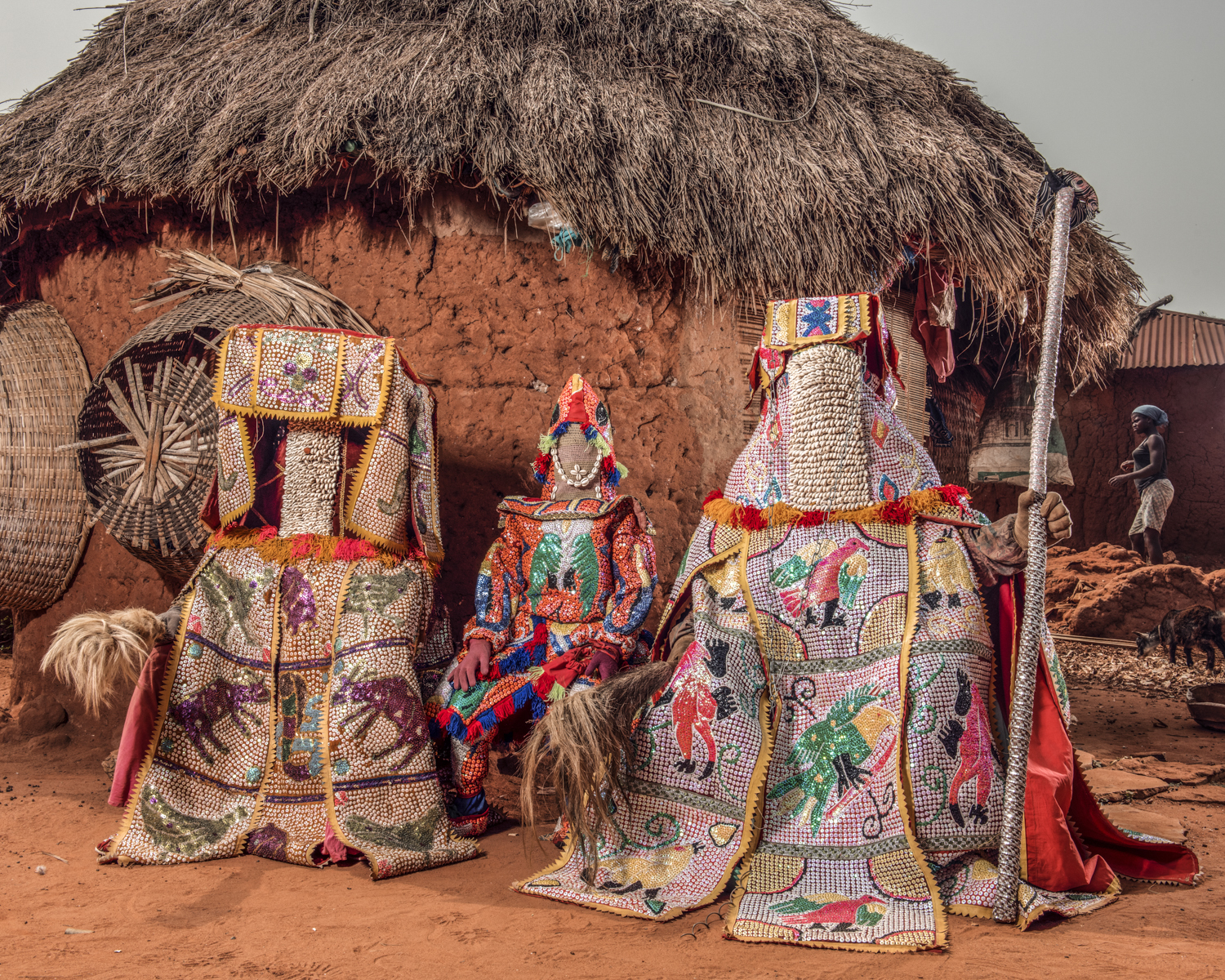
Egungun: Ancestor worship
In Africa, the dead of the family must be honored. For in many African cultures, death does not really exist; the spirit leaves the body to continue its life in the world of the dead, that of the ancestors.
Among the Yoruba, these dead manifest themselves to their descendants through an entity called EGOUN.
It is the spirit of the dead who returns to earth under beautiful loincloths decorated with applications of cut fabric, embroidered and adorned with shells and sequins, bone, and magic wood.
Family and clan societies, strictly reserved for men, have been formed around Egoun the revenant. They evoke the dead, call them and take care of them on earth.
Égoun serves as an intermediary with the souls in the afterlife.
He appears to certain families a few days after the death of one of its members, or during ceremonies performed to honor their memory; he also comes to bring the blessing of the ancestors to the marriages of their descendants and, in certain cases, to welcome a newborn child.
Offerings of food, drink and money are always made to him during his appearances.
EGOUN speaks with a deep, husky voice and dances readily to the sound of Bata or Ogbon drums.
The contact of his loincloth can be fatal to the living, so the MARIWOS (the guardians), members of the EGOUN society, always accompany them, carrying large engraved wooden sticks (lshan) to ward off the unwary. This stick symbolizes the border between the world of the dead (Kou-tome) and the world of the living. Ancestor worship in Africa is directed only to that part of the family that does not go back beyond the founder of the village or the house, that is, to the dynasty of the owners of the inhabited place.
With the exception of the royal families whose members are often deified and therefore have a more important lineage.
This cult is addressed to the deified ancestors and forms a vast system that unites the dead and the living in a continuous and united family whole.
The gods and the dead mix with the living, listen to their complaints, advise them, grant them graces, solve their difficulties and give them remedies for their pains and consolations for their misfortunes. The celestial world is not distant, nor is it superior, and the believer can speak directly with his gods and with his ancestors and benefit from their benevolence.
Each Yoruba clan honors its deceased ancestors in the hope of benefiting from their protection, avoiding their wrath, and keeping the ghosts away from the living.
He therefore regularly brings back the spirit of the ancestors from the realm of the dead (Kou-Tomé)
Each family clan of the ancestor cult has a convent.
It is a sacred place where the masks of the ghosts are kept. It is there that the adepts are trained in secret and that they put on the masks during the ceremonies.
The clan designates those who will be initiated and will have the responsibility of lending their bodies to the spirits of the ancestors and thus, will ensure the dialogue with the ancestors who have become protective deities.
Thus, one or more members of the family are designated, sometimes very young, to be these messengers of the afterlife.
They are taught in secret in a convent for several years, even decades.
There they learn the trance necessary to lend their bodies to the deities, a language that allows them to communicate with the invisible, and to create an appearance...
They emerge from it initiated to the rank of Egungun.
Apart from the initiates, no one knows who is Egungun because during the trances, they appear masked, their bodies totally hidden by their ceremonial costume.
The convent is exclusively reserved for initiates and men, on pain of death. The convent is directed by the Bale, who is generally the head of the family.
The general Alagba is the supreme chief, the king of the Egungun of a city, he watches over the convents of the city.
Egungun: Ancestor worship
In Africa, the dead of the family must be honored. For in many African cultures, death does not really exist; the spirit leaves the body to continue its life in the world of the dead, that of the ancestors.
Among the Yoruba, these dead manifest themselves to their descendants through an entity called EGOUN.
It is the spirit of the dead who returns to earth under beautiful loincloths decorated with applications of cut fabric, embroidered and adorned with shells and sequins, bone, and magic wood.
Family and clan societies, strictly reserved for men, have been formed around Egoun the revenant. They evoke the dead, call them and take care of them on earth.
Égoun serves as an intermediary with the souls in the afterlife.
He appears to certain families a few days after the death of one of its members, or during ceremonies performed to honor their memory; he also comes to bring the blessing of the ancestors to the marriages of their descendants and, in certain cases, to welcome a newborn child.
Offerings of food, drink and money are always made to him during his appearances.
EGOUN speaks with a deep, husky voice and dances readily to the sound of Bata or Ogbon drums.
The contact of his loincloth can be fatal to the living, so the MARIWOS (the guardians), members of the EGOUN society, always accompany them, carrying large engraved wooden sticks (lshan) to ward off the unwary. This stick symbolizes the border between the world of the dead (Kou-tome) and the world of the living. Ancestor worship in Africa is directed only to that part of the family that does not go back beyond the founder of the village or the house, that is, to the dynasty of the owners of the inhabited place.
With the exception of the royal families whose members are often deified and therefore have a more important lineage.
This cult is addressed to the deified ancestors and forms a vast system that unites the dead and the living in a continuous and united family whole.
The gods and the dead mix with the living, listen to their complaints, advise them, grant them graces, solve their difficulties and give them remedies for their pains and consolations for their misfortunes. The celestial world is not distant, nor is it superior, and the believer can speak directly with his gods and with his ancestors and benefit from their benevolence.
Each Yoruba clan honors its deceased ancestors in the hope of benefiting from their protection, avoiding their wrath, and keeping the ghosts away from the living.
He therefore regularly brings back the spirit of the ancestors from the realm of the dead (Kou-Tomé)
Each family clan of the ancestor cult has a convent.
It is a sacred place where the masks of the ghosts are kept. It is there that the adepts are trained in secret and that they put on the masks during the ceremonies.
The clan designates those who will be initiated and will have the responsibility of lending their bodies to the spirits of the ancestors and thus, will ensure the dialogue with the ancestors who have become protective deities.
Thus, one or more members of the family are designated, sometimes very young, to be these messengers of the afterlife.
They are taught in secret in a convent for several years, even decades.
There they learn the trance necessary to lend their bodies to the deities, a language that allows them to communicate with the invisible, and to create an appearance...
They emerge from it initiated to the rank of Egungun.
Apart from the initiates, no one knows who is Egungun because during the trances, they appear masked, their bodies totally hidden by their ceremonial costume.
The convent is exclusively reserved for initiates and men, on pain of death. The convent is directed by the Bale, who is generally the head of the family.
The general Alagba is the supreme chief, the king of the Egungun of a city, he watches over the convents of the city.
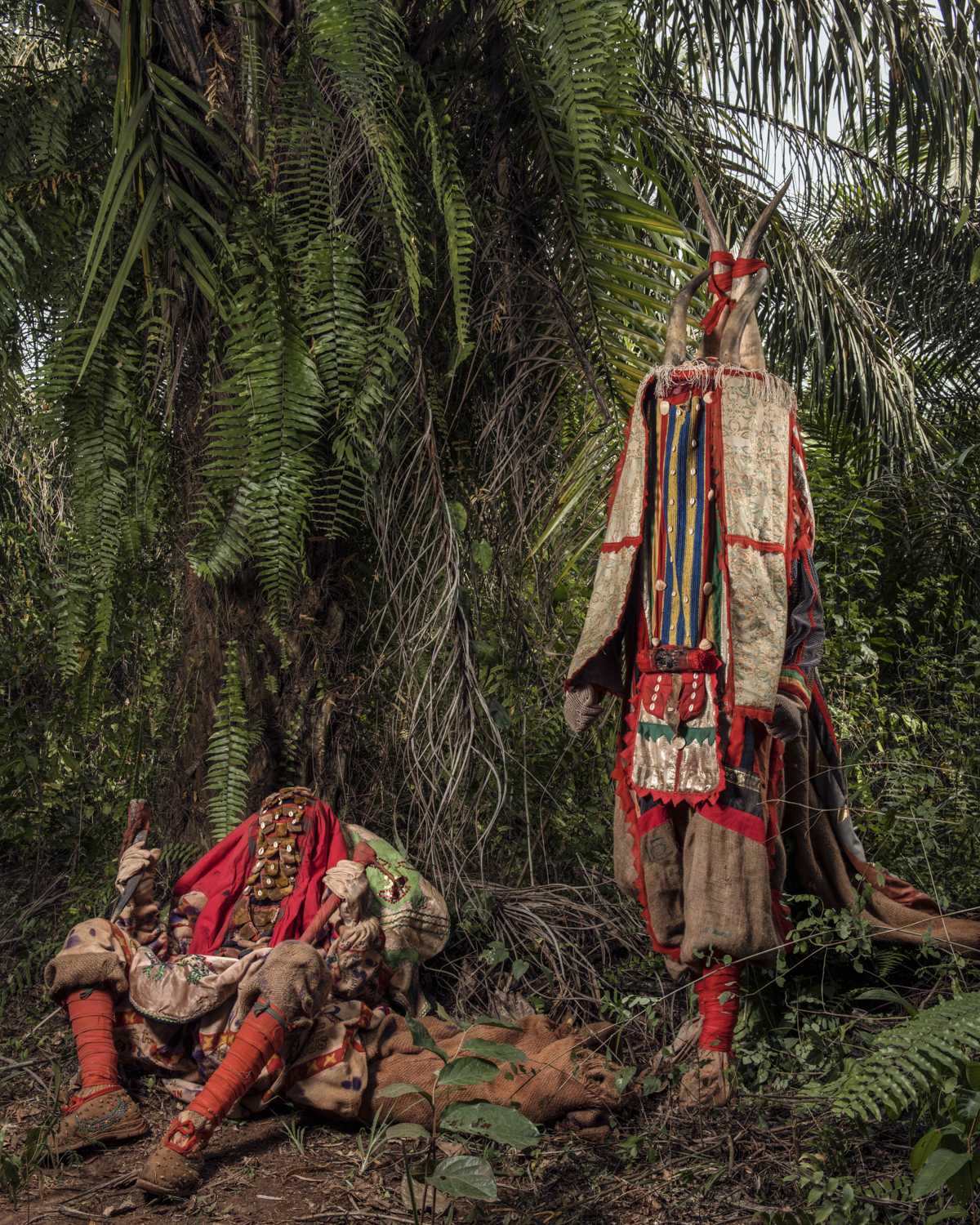
Egungun: Ancestor worship
In Africa, the dead of the family must be honored. For in many African cultures, death does not really exist; the spirit leaves the body to continue its life in the world of the dead, that of the ancestors.
Among the Yoruba, these dead manifest themselves to their descendants through an entity called EGOUN.
It is the spirit of the dead who returns to earth under beautiful loincloths decorated with applications of cut fabric, embroidered and adorned with shells and sequins, bone, and magic wood.
Family and clan societies, strictly reserved for men, have been formed around Egoun the revenant. They evoke the dead, call them and take care of them on earth.
Égoun serves as an intermediary with the souls in the afterlife.
He appears to certain families a few days after the death of one of its members, or during ceremonies performed to honor their memory; he also comes to bring the blessing of the ancestors to the marriages of their descendants and, in certain cases, to welcome a newborn child.
Offerings of food, drink and money are always made to him during his appearances.
EGOUN speaks with a deep, husky voice and dances readily to the sound of Bata or Ogbon drums.
The contact of his loincloth can be fatal to the living, so the MARIWOS (the guardians), members of the EGOUN society, always accompany them, carrying large engraved wooden sticks (lshan) to ward off the unwary. This stick symbolizes the border between the world of the dead (Kou-tome) and the world of the living. Ancestor worship in Africa is directed only to that part of the family that does not go back beyond the founder of the village or the house, that is, to the dynasty of the owners of the inhabited place.
With the exception of the royal families whose members are often deified and therefore have a more important lineage.
This cult is addressed to the deified ancestors and forms a vast system that unites the dead and the living in a continuous and united family whole.
The gods and the dead mix with the living, listen to their complaints, advise them, grant them graces, solve their difficulties and give them remedies for their pains and consolations for their misfortunes. The celestial world is not distant, nor is it superior, and the believer can speak directly with his gods and with his ancestors and benefit from their benevolence.
Each Yoruba clan honors its deceased ancestors in the hope of benefiting from their protection, avoiding their wrath, and keeping the ghosts away from the living.
He therefore regularly brings back the spirit of the ancestors from the realm of the dead (Kou-Tomé)
Each family clan of the ancestor cult has a convent.
It is a sacred place where the masks of the ghosts are kept. It is there that the adepts are trained in secret and that they put on the masks during the ceremonies.
The clan designates those who will be initiated and will have the responsibility of lending their bodies to the spirits of the ancestors and thus, will ensure the dialogue with the ancestors who have become protective deities.
Thus, one or more members of the family are designated, sometimes very young, to be these messengers of the afterlife.
They are taught in secret in a convent for several years, even decades.
There they learn the trance necessary to lend their bodies to the deities, a language that allows them to communicate with the invisible, and to create an appearance...
They emerge from it initiated to the rank of Egungun.
Apart from the initiates, no one knows who is Egungun because during the trances, they appear masked, their bodies totally hidden by their ceremonial costume.
The convent is exclusively reserved for initiates and men, on pain of death. The convent is directed by the Bale, who is generally the head of the family.
The general Alagba is the supreme chief, the king of the Egungun of a city, he watches over the convents of the city.
Egungun: Ancestor worship
In Africa, the dead of the family must be honored. For in many African cultures, death does not really exist; the spirit leaves the body to continue its life in the world of the dead, that of the ancestors.
Among the Yoruba, these dead manifest themselves to their descendants through an entity called EGOUN.
It is the spirit of the dead who returns to earth under beautiful loincloths decorated with applications of cut fabric, embroidered and adorned with shells and sequins, bone, and magic wood.
Family and clan societies, strictly reserved for men, have been formed around Egoun the revenant. They evoke the dead, call them and take care of them on earth.
Égoun serves as an intermediary with the souls in the afterlife.
He appears to certain families a few days after the death of one of its members, or during ceremonies performed to honor their memory; he also comes to bring the blessing of the ancestors to the marriages of their descendants and, in certain cases, to welcome a newborn child.
Offerings of food, drink and money are always made to him during his appearances.
EGOUN speaks with a deep, husky voice and dances readily to the sound of Bata or Ogbon drums.
The contact of his loincloth can be fatal to the living, so the MARIWOS (the guardians), members of the EGOUN society, always accompany them, carrying large engraved wooden sticks (lshan) to ward off the unwary. This stick symbolizes the border between the world of the dead (Kou-tome) and the world of the living. Ancestor worship in Africa is directed only to that part of the family that does not go back beyond the founder of the village or the house, that is, to the dynasty of the owners of the inhabited place.
With the exception of the royal families whose members are often deified and therefore have a more important lineage.
This cult is addressed to the deified ancestors and forms a vast system that unites the dead and the living in a continuous and united family whole.
The gods and the dead mix with the living, listen to their complaints, advise them, grant them graces, solve their difficulties and give them remedies for their pains and consolations for their misfortunes. The celestial world is not distant, nor is it superior, and the believer can speak directly with his gods and with his ancestors and benefit from their benevolence.
Each Yoruba clan honors its deceased ancestors in the hope of benefiting from their protection, avoiding their wrath, and keeping the ghosts away from the living.
He therefore regularly brings back the spirit of the ancestors from the realm of the dead (Kou-Tomé)
Each family clan of the ancestor cult has a convent.
It is a sacred place where the masks of the ghosts are kept. It is there that the adepts are trained in secret and that they put on the masks during the ceremonies.
The clan designates those who will be initiated and will have the responsibility of lending their bodies to the spirits of the ancestors and thus, will ensure the dialogue with the ancestors who have become protective deities.
Thus, one or more members of the family are designated, sometimes very young, to be these messengers of the afterlife.
They are taught in secret in a convent for several years, even decades.
There they learn the trance necessary to lend their bodies to the deities, a language that allows them to communicate with the invisible, and to create an appearance...
They emerge from it initiated to the rank of Egungun.
Apart from the initiates, no one knows who is Egungun because during the trances, they appear masked, their bodies totally hidden by their ceremonial costume.
The convent is exclusively reserved for initiates and men, on pain of death. The convent is directed by the Bale, who is generally the head of the family.
The general Alagba is the supreme chief, the king of the Egungun of a city, he watches over the convents of the city.

Egungun: Ancestor worship
In Africa, the dead of the family must be honored. For in many African cultures, death does not really exist; the spirit leaves the body to continue its life in the world of the dead, that of the ancestors.
Among the Yoruba, these dead manifest themselves to their descendants through an entity called EGOUN.
It is the spirit of the dead who returns to earth under beautiful loincloths decorated with applications of cut fabric, embroidered and adorned with shells and sequins, bone, and magic wood.
Family and clan societies, strictly reserved for men, have been formed around Egoun the revenant. They evoke the dead, call them and take care of them on earth.
Égoun serves as an intermediary with the souls in the afterlife.
He appears to certain families a few days after the death of one of its members, or during ceremonies performed to honor their memory; he also comes to bring the blessing of the ancestors to the marriages of their descendants and, in certain cases, to welcome a newborn child.
Offerings of food, drink and money are always made to him during his appearances.
EGOUN speaks with a deep, husky voice and dances readily to the sound of Bata or Ogbon drums.
The contact of his loincloth can be fatal to the living, so the MARIWOS (the guardians), members of the EGOUN society, always accompany them, carrying large engraved wooden sticks (lshan) to ward off the unwary. This stick symbolizes the border between the world of the dead (Kou-tome) and the world of the living. Ancestor worship in Africa is directed only to that part of the family that does not go back beyond the founder of the village or the house, that is, to the dynasty of the owners of the inhabited place.
With the exception of the royal families whose members are often deified and therefore have a more important lineage.
This cult is addressed to the deified ancestors and forms a vast system that unites the dead and the living in a continuous and united family whole.
The gods and the dead mix with the living, listen to their complaints, advise them, grant them graces, solve their difficulties and give them remedies for their pains and consolations for their misfortunes. The celestial world is not distant, nor is it superior, and the believer can speak directly with his gods and with his ancestors and benefit from their benevolence.
Each Yoruba clan honors its deceased ancestors in the hope of benefiting from their protection, avoiding their wrath, and keeping the ghosts away from the living.
He therefore regularly brings back the spirit of the ancestors from the realm of the dead (Kou-Tomé)
Each family clan of the ancestor cult has a convent.
It is a sacred place where the masks of the ghosts are kept. It is there that the adepts are trained in secret and that they put on the masks during the ceremonies.
The clan designates those who will be initiated and will have the responsibility of lending their bodies to the spirits of the ancestors and thus, will ensure the dialogue with the ancestors who have become protective deities.
Thus, one or more members of the family are designated, sometimes very young, to be these messengers of the afterlife.
They are taught in secret in a convent for several years, even decades.
There they learn the trance necessary to lend their bodies to the deities, a language that allows them to communicate with the invisible, and to create an appearance...
They emerge from it initiated to the rank of Egungun.
Apart from the initiates, no one knows who is Egungun because during the trances, they appear masked, their bodies totally hidden by their ceremonial costume.
The convent is exclusively reserved for initiates and men, on pain of death. The convent is directed by the Bale, who is generally the head of the family.
The general Alagba is the supreme chief, the king of the Egungun of a city, he watches over the convents of the city.
Egungun: Ancestor worship
In Africa, the dead of the family must be honored. For in many African cultures, death does not really exist; the spirit leaves the body to continue its life in the world of the dead, that of the ancestors.
Among the Yoruba, these dead manifest themselves to their descendants through an entity called EGOUN.
It is the spirit of the dead who returns to earth under beautiful loincloths decorated with applications of cut fabric, embroidered and adorned with shells and sequins, bone, and magic wood.
Family and clan societies, strictly reserved for men, have been formed around Egoun the revenant. They evoke the dead, call them and take care of them on earth.
Égoun serves as an intermediary with the souls in the afterlife.
He appears to certain families a few days after the death of one of its members, or during ceremonies performed to honor their memory; he also comes to bring the blessing of the ancestors to the marriages of their descendants and, in certain cases, to welcome a newborn child.
Offerings of food, drink and money are always made to him during his appearances.
EGOUN speaks with a deep, husky voice and dances readily to the sound of Bata or Ogbon drums.
The contact of his loincloth can be fatal to the living, so the MARIWOS (the guardians), members of the EGOUN society, always accompany them, carrying large engraved wooden sticks (lshan) to ward off the unwary. This stick symbolizes the border between the world of the dead (Kou-tome) and the world of the living. Ancestor worship in Africa is directed only to that part of the family that does not go back beyond the founder of the village or the house, that is, to the dynasty of the owners of the inhabited place.
With the exception of the royal families whose members are often deified and therefore have a more important lineage.
This cult is addressed to the deified ancestors and forms a vast system that unites the dead and the living in a continuous and united family whole.
The gods and the dead mix with the living, listen to their complaints, advise them, grant them graces, solve their difficulties and give them remedies for their pains and consolations for their misfortunes. The celestial world is not distant, nor is it superior, and the believer can speak directly with his gods and with his ancestors and benefit from their benevolence.
Each Yoruba clan honors its deceased ancestors in the hope of benefiting from their protection, avoiding their wrath, and keeping the ghosts away from the living.
He therefore regularly brings back the spirit of the ancestors from the realm of the dead (Kou-Tomé)
Each family clan of the ancestor cult has a convent.
It is a sacred place where the masks of the ghosts are kept. It is there that the adepts are trained in secret and that they put on the masks during the ceremonies.
The clan designates those who will be initiated and will have the responsibility of lending their bodies to the spirits of the ancestors and thus, will ensure the dialogue with the ancestors who have become protective deities.
Thus, one or more members of the family are designated, sometimes very young, to be these messengers of the afterlife.
They are taught in secret in a convent for several years, even decades.
There they learn the trance necessary to lend their bodies to the deities, a language that allows them to communicate with the invisible, and to create an appearance...
They emerge from it initiated to the rank of Egungun.
Apart from the initiates, no one knows who is Egungun because during the trances, they appear masked, their bodies totally hidden by their ceremonial costume.
The convent is exclusively reserved for initiates and men, on pain of death. The convent is directed by the Bale, who is generally the head of the family.
The general Alagba is the supreme chief, the king of the Egungun of a city, he watches over the convents of the city.
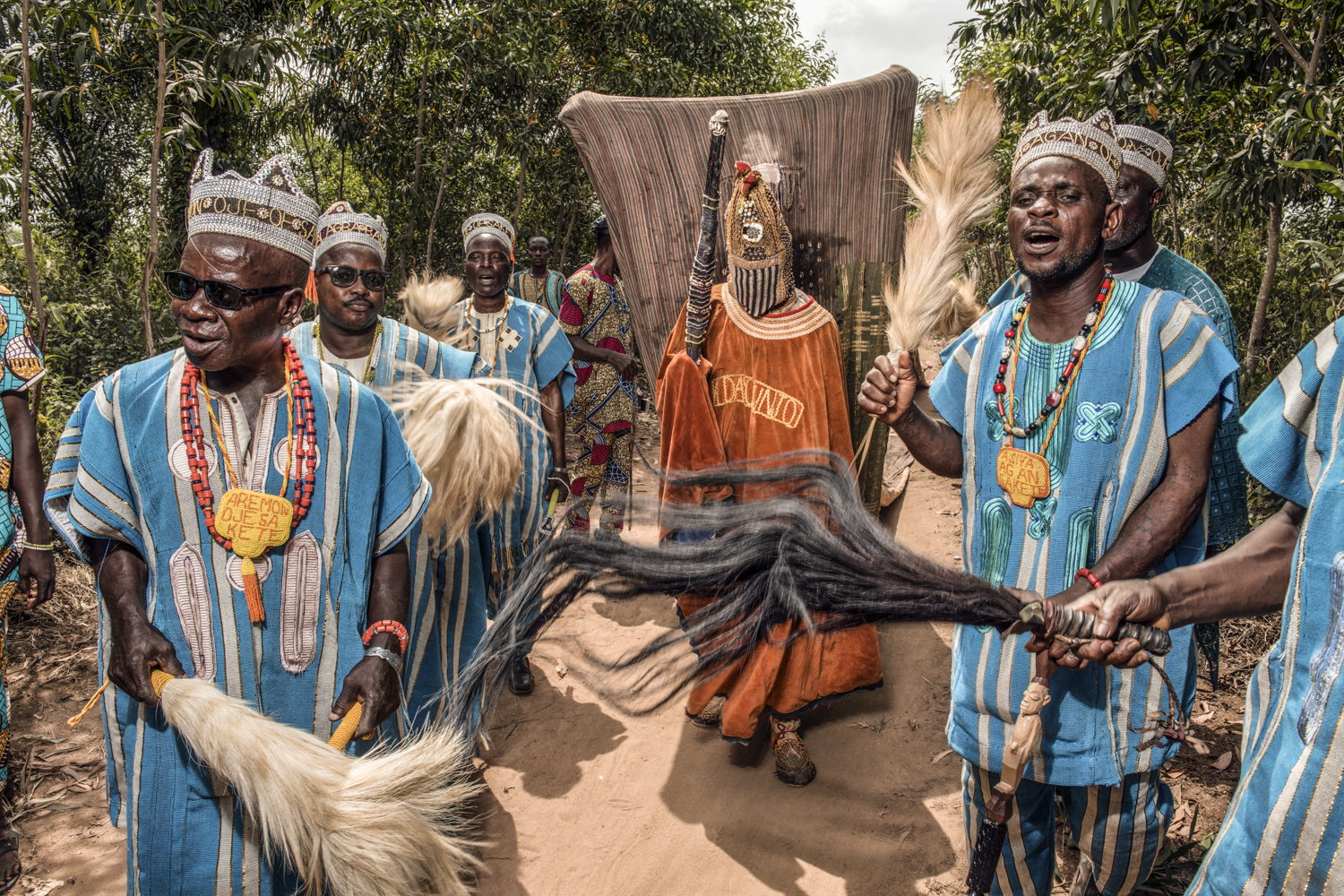
Egungun: Ancestor worship
In Africa, the dead of the family must be honored. For in many African cultures, death does not really exist; the spirit leaves the body to continue its life in the world of the dead, that of the ancestors.
Among the Yoruba, these dead manifest themselves to their descendants through an entity called EGOUN.
It is the spirit of the dead who returns to earth under beautiful loincloths decorated with applications of cut fabric, embroidered and adorned with shells and sequins, bone, and magic wood.
Family and clan societies, strictly reserved for men, have been formed around Egoun the revenant. They evoke the dead, call them and take care of them on earth.
Égoun serves as an intermediary with the souls in the afterlife.
He appears to certain families a few days after the death of one of its members, or during ceremonies performed to honor their memory; he also comes to bring the blessing of the ancestors to the marriages of their descendants and, in certain cases, to welcome a newborn child.
Offerings of food, drink and money are always made to him during his appearances.
EGOUN speaks with a deep, husky voice and dances readily to the sound of Bata or Ogbon drums.
The contact of his loincloth can be fatal to the living, so the MARIWOS (the guardians), members of the EGOUN society, always accompany them, carrying large engraved wooden sticks (lshan) to ward off the unwary. This stick symbolizes the border between the world of the dead (Kou-tome) and the world of the living. Ancestor worship in Africa is directed only to that part of the family that does not go back beyond the founder of the village or the house, that is, to the dynasty of the owners of the inhabited place.
With the exception of the royal families whose members are often deified and therefore have a more important lineage.
This cult is addressed to the deified ancestors and forms a vast system that unites the dead and the living in a continuous and united family whole.
The gods and the dead mix with the living, listen to their complaints, advise them, grant them graces, solve their difficulties and give them remedies for their pains and consolations for their misfortunes. The celestial world is not distant, nor is it superior, and the believer can speak directly with his gods and with his ancestors and benefit from their benevolence.
Each Yoruba clan honors its deceased ancestors in the hope of benefiting from their protection, avoiding their wrath, and keeping the ghosts away from the living.
He therefore regularly brings back the spirit of the ancestors from the realm of the dead (Kou-Tomé)
Each family clan of the ancestor cult has a convent.
It is a sacred place where the masks of the ghosts are kept. It is there that the adepts are trained in secret and that they put on the masks during the ceremonies.
The clan designates those who will be initiated and will have the responsibility of lending their bodies to the spirits of the ancestors and thus, will ensure the dialogue with the ancestors who have become protective deities.
Thus, one or more members of the family are designated, sometimes very young, to be these messengers of the afterlife.
They are taught in secret in a convent for several years, even decades.
There they learn the trance necessary to lend their bodies to the deities, a language that allows them to communicate with the invisible, and to create an appearance...
They emerge from it initiated to the rank of Egungun.
Apart from the initiates, no one knows who is Egungun because during the trances, they appear masked, their bodies totally hidden by their ceremonial costume.
The convent is exclusively reserved for initiates and men, on pain of death. The convent is directed by the Bale, who is generally the head of the family.
The general Alagba is the supreme chief, the king of the Egungun of a city, he watches over the convents of the city.
Egungun: Ancestor worship
In Africa, the dead of the family must be honored. For in many African cultures, death does not really exist; the spirit leaves the body to continue its life in the world of the dead, that of the ancestors.
Among the Yoruba, these dead manifest themselves to their descendants through an entity called EGOUN.
It is the spirit of the dead who returns to earth under beautiful loincloths decorated with applications of cut fabric, embroidered and adorned with shells and sequins, bone, and magic wood.
Family and clan societies, strictly reserved for men, have been formed around Egoun the revenant. They evoke the dead, call them and take care of them on earth.
Égoun serves as an intermediary with the souls in the afterlife.
He appears to certain families a few days after the death of one of its members, or during ceremonies performed to honor their memory; he also comes to bring the blessing of the ancestors to the marriages of their descendants and, in certain cases, to welcome a newborn child.
Offerings of food, drink and money are always made to him during his appearances.
EGOUN speaks with a deep, husky voice and dances readily to the sound of Bata or Ogbon drums.
The contact of his loincloth can be fatal to the living, so the MARIWOS (the guardians), members of the EGOUN society, always accompany them, carrying large engraved wooden sticks (lshan) to ward off the unwary. This stick symbolizes the border between the world of the dead (Kou-tome) and the world of the living. Ancestor worship in Africa is directed only to that part of the family that does not go back beyond the founder of the village or the house, that is, to the dynasty of the owners of the inhabited place.
With the exception of the royal families whose members are often deified and therefore have a more important lineage.
This cult is addressed to the deified ancestors and forms a vast system that unites the dead and the living in a continuous and united family whole.
The gods and the dead mix with the living, listen to their complaints, advise them, grant them graces, solve their difficulties and give them remedies for their pains and consolations for their misfortunes. The celestial world is not distant, nor is it superior, and the believer can speak directly with his gods and with his ancestors and benefit from their benevolence.
Each Yoruba clan honors its deceased ancestors in the hope of benefiting from their protection, avoiding their wrath, and keeping the ghosts away from the living.
He therefore regularly brings back the spirit of the ancestors from the realm of the dead (Kou-Tomé)
Each family clan of the ancestor cult has a convent.
It is a sacred place where the masks of the ghosts are kept. It is there that the adepts are trained in secret and that they put on the masks during the ceremonies.
The clan designates those who will be initiated and will have the responsibility of lending their bodies to the spirits of the ancestors and thus, will ensure the dialogue with the ancestors who have become protective deities.
Thus, one or more members of the family are designated, sometimes very young, to be these messengers of the afterlife.
They are taught in secret in a convent for several years, even decades.
There they learn the trance necessary to lend their bodies to the deities, a language that allows them to communicate with the invisible, and to create an appearance...
They emerge from it initiated to the rank of Egungun.
Apart from the initiates, no one knows who is Egungun because during the trances, they appear masked, their bodies totally hidden by their ceremonial costume.
The convent is exclusively reserved for initiates and men, on pain of death. The convent is directed by the Bale, who is generally the head of the family.
The general Alagba is the supreme chief, the king of the Egungun of a city, he watches over the convents of the city.
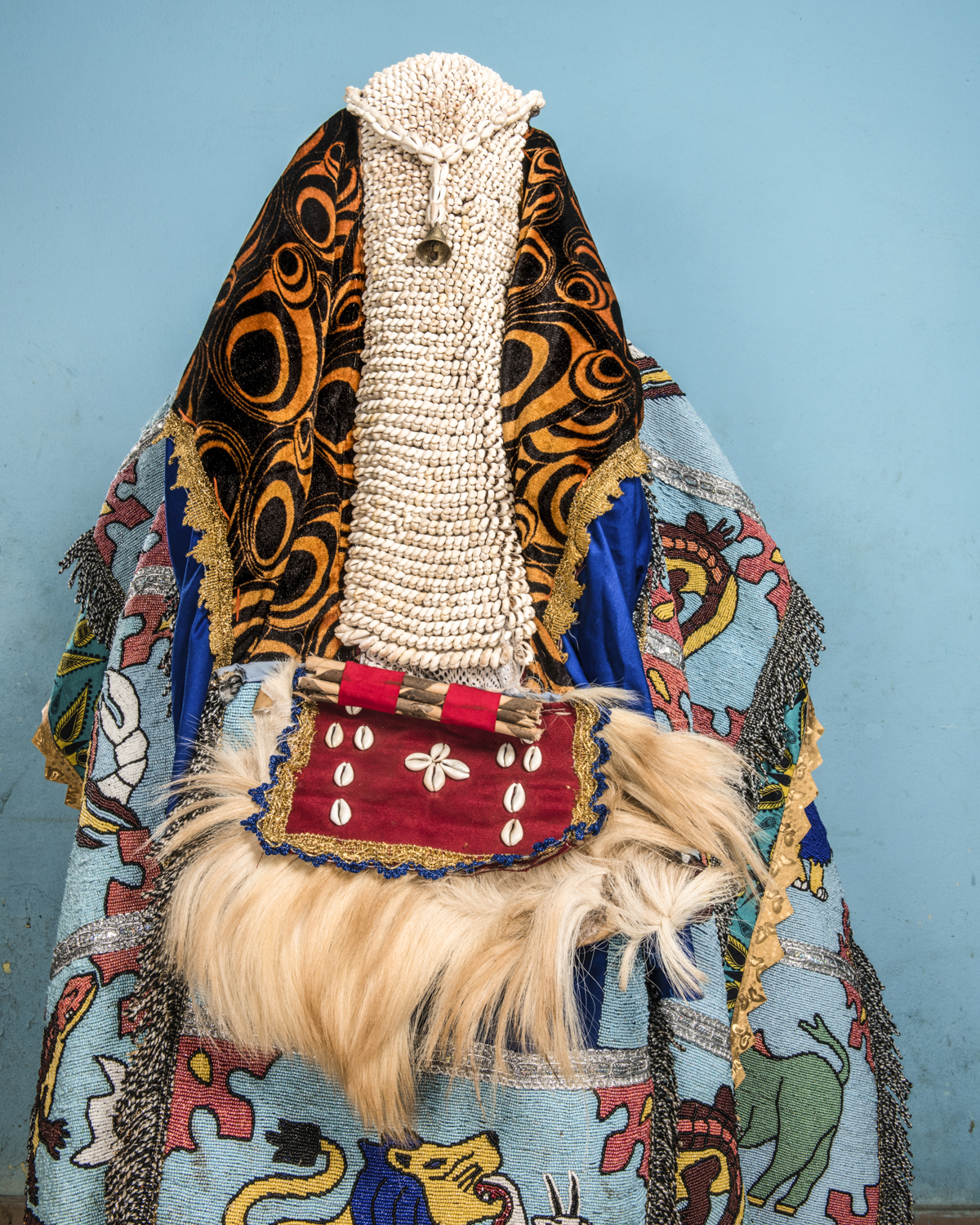
Egungun: Ancestor worship
In Africa, the dead of the family must be honored. For in many African cultures, death does not really exist; the spirit leaves the body to continue its life in the world of the dead, that of the ancestors.
Among the Yoruba, these dead manifest themselves to their descendants through an entity called EGOUN.
It is the spirit of the dead who returns to earth under beautiful loincloths decorated with applications of cut fabric, embroidered and adorned with shells and sequins, bone, and magic wood.
Family and clan societies, strictly reserved for men, have been formed around Egoun the revenant. They evoke the dead, call them and take care of them on earth.
Égoun serves as an intermediary with the souls in the afterlife.
He appears to certain families a few days after the death of one of its members, or during ceremonies performed to honor their memory; he also comes to bring the blessing of the ancestors to the marriages of their descendants and, in certain cases, to welcome a newborn child.
Offerings of food, drink and money are always made to him during his appearances.
EGOUN speaks with a deep, husky voice and dances readily to the sound of Bata or Ogbon drums.
The contact of his loincloth can be fatal to the living, so the MARIWOS (the guardians), members of the EGOUN society, always accompany them, carrying large engraved wooden sticks (lshan) to ward off the unwary. This stick symbolizes the border between the world of the dead (Kou-tome) and the world of the living. Ancestor worship in Africa is directed only to that part of the family that does not go back beyond the founder of the village or the house, that is, to the dynasty of the owners of the inhabited place.
With the exception of the royal families whose members are often deified and therefore have a more important lineage.
This cult is addressed to the deified ancestors and forms a vast system that unites the dead and the living in a continuous and united family whole.
The gods and the dead mix with the living, listen to their complaints, advise them, grant them graces, solve their difficulties and give them remedies for their pains and consolations for their misfortunes. The celestial world is not distant, nor is it superior, and the believer can speak directly with his gods and with his ancestors and benefit from their benevolence.
Each Yoruba clan honors its deceased ancestors in the hope of benefiting from their protection, avoiding their wrath, and keeping the ghosts away from the living.
He therefore regularly brings back the spirit of the ancestors from the realm of the dead (Kou-Tomé)
Each family clan of the ancestor cult has a convent.
It is a sacred place where the masks of the ghosts are kept. It is there that the adepts are trained in secret and that they put on the masks during the ceremonies.
The clan designates those who will be initiated and will have the responsibility of lending their bodies to the spirits of the ancestors and thus, will ensure the dialogue with the ancestors who have become protective deities.
Thus, one or more members of the family are designated, sometimes very young, to be these messengers of the afterlife.
They are taught in secret in a convent for several years, even decades.
There they learn the trance necessary to lend their bodies to the deities, a language that allows them to communicate with the invisible, and to create an appearance...
They emerge from it initiated to the rank of Egungun.
Apart from the initiates, no one knows who is Egungun because during the trances, they appear masked, their bodies totally hidden by their ceremonial costume.
The convent is exclusively reserved for initiates and men, on pain of death. The convent is directed by the Bale, who is generally the head of the family.
The general Alagba is the supreme chief, the king of the Egungun of a city, he watches over the convents of the city.
Egungun: Ancestor worship
In Africa, the dead of the family must be honored. For in many African cultures, death does not really exist; the spirit leaves the body to continue its life in the world of the dead, that of the ancestors.
Among the Yoruba, these dead manifest themselves to their descendants through an entity called EGOUN.
It is the spirit of the dead who returns to earth under beautiful loincloths decorated with applications of cut fabric, embroidered and adorned with shells and sequins, bone, and magic wood.
Family and clan societies, strictly reserved for men, have been formed around Egoun the revenant. They evoke the dead, call them and take care of them on earth.
Égoun serves as an intermediary with the souls in the afterlife.
He appears to certain families a few days after the death of one of its members, or during ceremonies performed to honor their memory; he also comes to bring the blessing of the ancestors to the marriages of their descendants and, in certain cases, to welcome a newborn child.
Offerings of food, drink and money are always made to him during his appearances.
EGOUN speaks with a deep, husky voice and dances readily to the sound of Bata or Ogbon drums.
The contact of his loincloth can be fatal to the living, so the MARIWOS (the guardians), members of the EGOUN society, always accompany them, carrying large engraved wooden sticks (lshan) to ward off the unwary. This stick symbolizes the border between the world of the dead (Kou-tome) and the world of the living. Ancestor worship in Africa is directed only to that part of the family that does not go back beyond the founder of the village or the house, that is, to the dynasty of the owners of the inhabited place.
With the exception of the royal families whose members are often deified and therefore have a more important lineage.
This cult is addressed to the deified ancestors and forms a vast system that unites the dead and the living in a continuous and united family whole.
The gods and the dead mix with the living, listen to their complaints, advise them, grant them graces, solve their difficulties and give them remedies for their pains and consolations for their misfortunes. The celestial world is not distant, nor is it superior, and the believer can speak directly with his gods and with his ancestors and benefit from their benevolence.
Each Yoruba clan honors its deceased ancestors in the hope of benefiting from their protection, avoiding their wrath, and keeping the ghosts away from the living.
He therefore regularly brings back the spirit of the ancestors from the realm of the dead (Kou-Tomé)
Each family clan of the ancestor cult has a convent.
It is a sacred place where the masks of the ghosts are kept. It is there that the adepts are trained in secret and that they put on the masks during the ceremonies.
The clan designates those who will be initiated and will have the responsibility of lending their bodies to the spirits of the ancestors and thus, will ensure the dialogue with the ancestors who have become protective deities.
Thus, one or more members of the family are designated, sometimes very young, to be these messengers of the afterlife.
They are taught in secret in a convent for several years, even decades.
There they learn the trance necessary to lend their bodies to the deities, a language that allows them to communicate with the invisible, and to create an appearance...
They emerge from it initiated to the rank of Egungun.
Apart from the initiates, no one knows who is Egungun because during the trances, they appear masked, their bodies totally hidden by their ceremonial costume.
The convent is exclusively reserved for initiates and men, on pain of death. The convent is directed by the Bale, who is generally the head of the family.
The general Alagba is the supreme chief, the king of the Egungun of a city, he watches over the convents of the city.
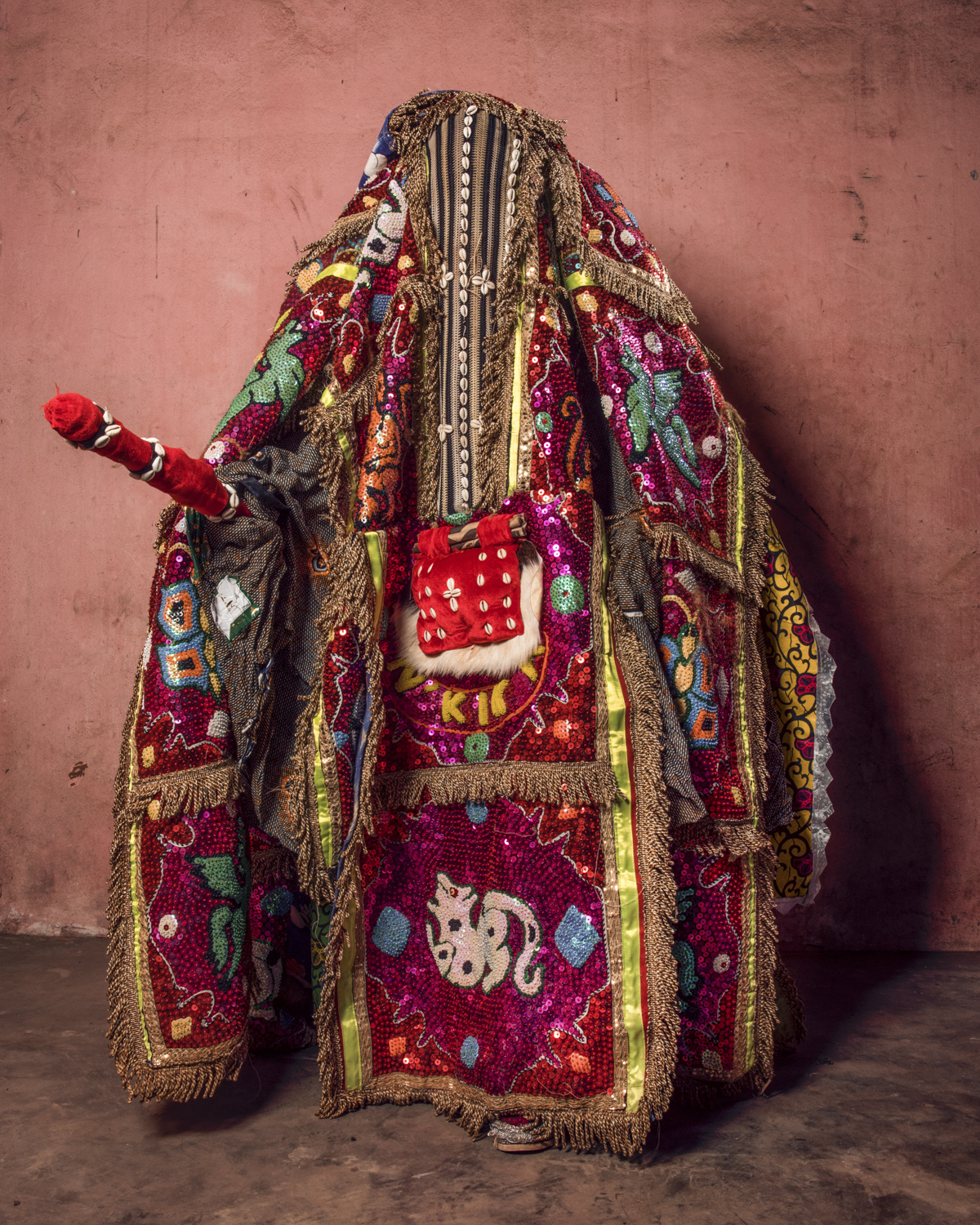
Egungun: Ancestor worship
In Africa, the dead of the family must be honored. For in many African cultures, death does not really exist; the spirit leaves the body to continue its life in the world of the dead, that of the ancestors.
Among the Yoruba, these dead manifest themselves to their descendants through an entity called EGOUN.
It is the spirit of the dead who returns to earth under beautiful loincloths decorated with applications of cut fabric, embroidered and adorned with shells and sequins, bone, and magic wood.
Family and clan societies, strictly reserved for men, have been formed around Egoun the revenant. They evoke the dead, call them and take care of them on earth.
Égoun serves as an intermediary with the souls in the afterlife.
He appears to certain families a few days after the death of one of its members, or during ceremonies performed to honor their memory; he also comes to bring the blessing of the ancestors to the marriages of their descendants and, in certain cases, to welcome a newborn child.
Offerings of food, drink and money are always made to him during his appearances.
EGOUN speaks with a deep, husky voice and dances readily to the sound of Bata or Ogbon drums.
The contact of his loincloth can be fatal to the living, so the MARIWOS (the guardians), members of the EGOUN society, always accompany them, carrying large engraved wooden sticks (lshan) to ward off the unwary. This stick symbolizes the border between the world of the dead (Kou-tome) and the world of the living. Ancestor worship in Africa is directed only to that part of the family that does not go back beyond the founder of the village or the house, that is, to the dynasty of the owners of the inhabited place.
With the exception of the royal families whose members are often deified and therefore have a more important lineage.
This cult is addressed to the deified ancestors and forms a vast system that unites the dead and the living in a continuous and united family whole.
The gods and the dead mix with the living, listen to their complaints, advise them, grant them graces, solve their difficulties and give them remedies for their pains and consolations for their misfortunes. The celestial world is not distant, nor is it superior, and the believer can speak directly with his gods and with his ancestors and benefit from their benevolence.
Each Yoruba clan honors its deceased ancestors in the hope of benefiting from their protection, avoiding their wrath, and keeping the ghosts away from the living.
He therefore regularly brings back the spirit of the ancestors from the realm of the dead (Kou-Tomé)
Each family clan of the ancestor cult has a convent.
It is a sacred place where the masks of the ghosts are kept. It is there that the adepts are trained in secret and that they put on the masks during the ceremonies.
The clan designates those who will be initiated and will have the responsibility of lending their bodies to the spirits of the ancestors and thus, will ensure the dialogue with the ancestors who have become protective deities.
Thus, one or more members of the family are designated, sometimes very young, to be these messengers of the afterlife.
They are taught in secret in a convent for several years, even decades.
There they learn the trance necessary to lend their bodies to the deities, a language that allows them to communicate with the invisible, and to create an appearance...
They emerge from it initiated to the rank of Egungun.
Apart from the initiates, no one knows who is Egungun because during the trances, they appear masked, their bodies totally hidden by their ceremonial costume.
The convent is exclusively reserved for initiates and men, on pain of death. The convent is directed by the Bale, who is generally the head of the family.
The general Alagba is the supreme chief, the king of the Egungun of a city, he watches over the convents of the city.
Egungun: Ancestor worship
In Africa, the dead of the family must be honored. For in many African cultures, death does not really exist; the spirit leaves the body to continue its life in the world of the dead, that of the ancestors.
Among the Yoruba, these dead manifest themselves to their descendants through an entity called EGOUN.
It is the spirit of the dead who returns to earth under beautiful loincloths decorated with applications of cut fabric, embroidered and adorned with shells and sequins, bone, and magic wood.
Family and clan societies, strictly reserved for men, have been formed around Egoun the revenant. They evoke the dead, call them and take care of them on earth.
Égoun serves as an intermediary with the souls in the afterlife.
He appears to certain families a few days after the death of one of its members, or during ceremonies performed to honor their memory; he also comes to bring the blessing of the ancestors to the marriages of their descendants and, in certain cases, to welcome a newborn child.
Offerings of food, drink and money are always made to him during his appearances.
EGOUN speaks with a deep, husky voice and dances readily to the sound of Bata or Ogbon drums.
The contact of his loincloth can be fatal to the living, so the MARIWOS (the guardians), members of the EGOUN society, always accompany them, carrying large engraved wooden sticks (lshan) to ward off the unwary. This stick symbolizes the border between the world of the dead (Kou-tome) and the world of the living. Ancestor worship in Africa is directed only to that part of the family that does not go back beyond the founder of the village or the house, that is, to the dynasty of the owners of the inhabited place.
With the exception of the royal families whose members are often deified and therefore have a more important lineage.
This cult is addressed to the deified ancestors and forms a vast system that unites the dead and the living in a continuous and united family whole.
The gods and the dead mix with the living, listen to their complaints, advise them, grant them graces, solve their difficulties and give them remedies for their pains and consolations for their misfortunes. The celestial world is not distant, nor is it superior, and the believer can speak directly with his gods and with his ancestors and benefit from their benevolence.
Each Yoruba clan honors its deceased ancestors in the hope of benefiting from their protection, avoiding their wrath, and keeping the ghosts away from the living.
He therefore regularly brings back the spirit of the ancestors from the realm of the dead (Kou-Tomé)
Each family clan of the ancestor cult has a convent.
It is a sacred place where the masks of the ghosts are kept. It is there that the adepts are trained in secret and that they put on the masks during the ceremonies.
The clan designates those who will be initiated and will have the responsibility of lending their bodies to the spirits of the ancestors and thus, will ensure the dialogue with the ancestors who have become protective deities.
Thus, one or more members of the family are designated, sometimes very young, to be these messengers of the afterlife.
They are taught in secret in a convent for several years, even decades.
There they learn the trance necessary to lend their bodies to the deities, a language that allows them to communicate with the invisible, and to create an appearance...
They emerge from it initiated to the rank of Egungun.
Apart from the initiates, no one knows who is Egungun because during the trances, they appear masked, their bodies totally hidden by their ceremonial costume.
The convent is exclusively reserved for initiates and men, on pain of death. The convent is directed by the Bale, who is generally the head of the family.
The general Alagba is the supreme chief, the king of the Egungun of a city, he watches over the convents of the city.
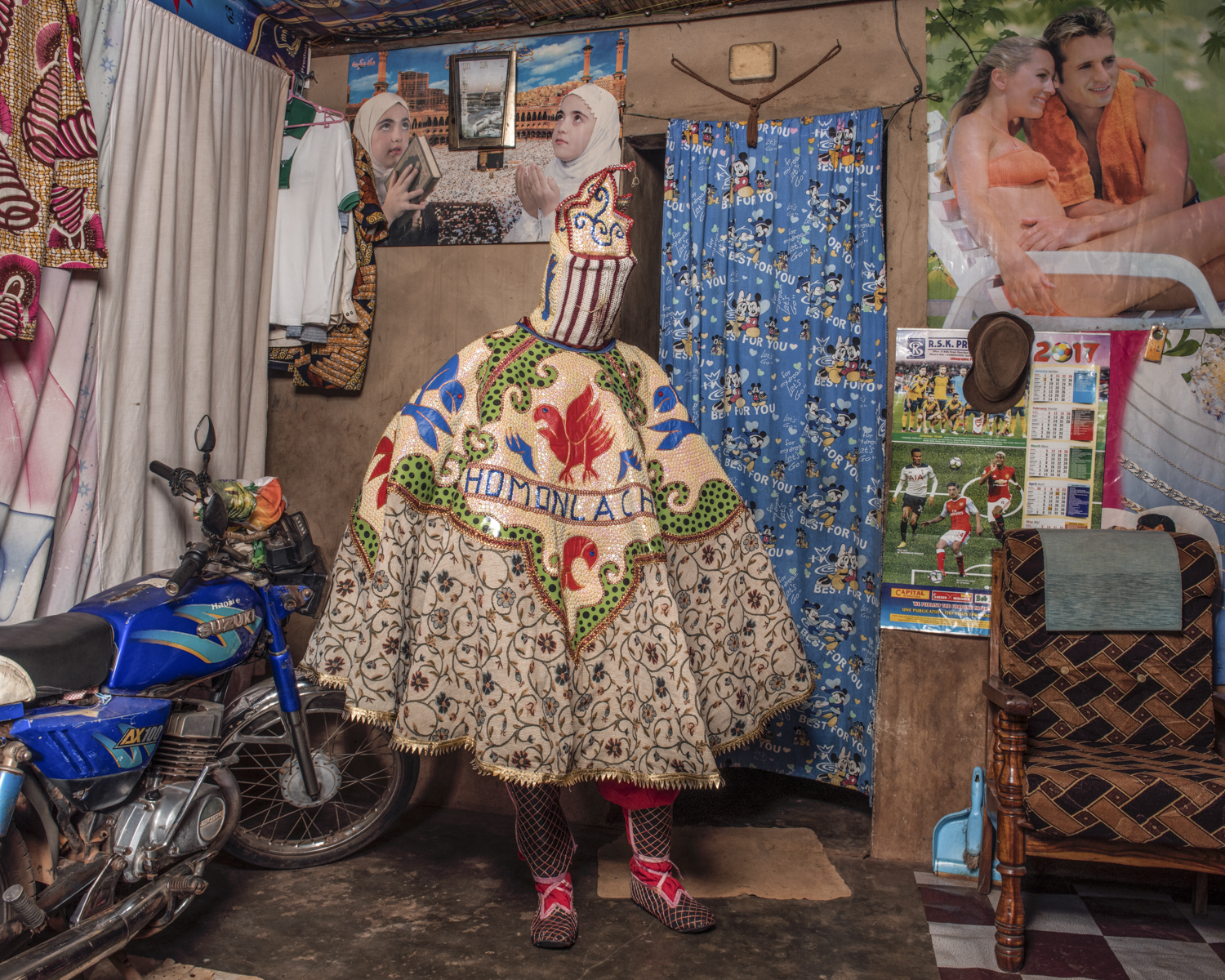
Egungun: Ancestor worship
In Africa, the dead of the family must be honored. For in many African cultures, death does not really exist; the spirit leaves the body to continue its life in the world of the dead, that of the ancestors.
Among the Yoruba, these dead manifest themselves to their descendants through an entity called EGOUN.
It is the spirit of the dead who returns to earth under beautiful loincloths decorated with applications of cut fabric, embroidered and adorned with shells and sequins, bone, and magic wood.
Family and clan societies, strictly reserved for men, have been formed around Egoun the revenant. They evoke the dead, call them and take care of them on earth.
Égoun serves as an intermediary with the souls in the afterlife.
He appears to certain families a few days after the death of one of its members, or during ceremonies performed to honor their memory; he also comes to bring the blessing of the ancestors to the marriages of their descendants and, in certain cases, to welcome a newborn child.
Offerings of food, drink and money are always made to him during his appearances.
EGOUN speaks with a deep, husky voice and dances readily to the sound of Bata or Ogbon drums.
The contact of his loincloth can be fatal to the living, so the MARIWOS (the guardians), members of the EGOUN society, always accompany them, carrying large engraved wooden sticks (lshan) to ward off the unwary. This stick symbolizes the border between the world of the dead (Kou-tome) and the world of the living. Ancestor worship in Africa is directed only to that part of the family that does not go back beyond the founder of the village or the house, that is, to the dynasty of the owners of the inhabited place.
With the exception of the royal families whose members are often deified and therefore have a more important lineage.
This cult is addressed to the deified ancestors and forms a vast system that unites the dead and the living in a continuous and united family whole.
The gods and the dead mix with the living, listen to their complaints, advise them, grant them graces, solve their difficulties and give them remedies for their pains and consolations for their misfortunes. The celestial world is not distant, nor is it superior, and the believer can speak directly with his gods and with his ancestors and benefit from their benevolence.
Each Yoruba clan honors its deceased ancestors in the hope of benefiting from their protection, avoiding their wrath, and keeping the ghosts away from the living.
He therefore regularly brings back the spirit of the ancestors from the realm of the dead (Kou-Tomé)
Each family clan of the ancestor cult has a convent.
It is a sacred place where the masks of the ghosts are kept. It is there that the adepts are trained in secret and that they put on the masks during the ceremonies.
The clan designates those who will be initiated and will have the responsibility of lending their bodies to the spirits of the ancestors and thus, will ensure the dialogue with the ancestors who have become protective deities.
Thus, one or more members of the family are designated, sometimes very young, to be these messengers of the afterlife.
They are taught in secret in a convent for several years, even decades.
There they learn the trance necessary to lend their bodies to the deities, a language that allows them to communicate with the invisible, and to create an appearance...
They emerge from it initiated to the rank of Egungun.
Apart from the initiates, no one knows who is Egungun because during the trances, they appear masked, their bodies totally hidden by their ceremonial costume.
The convent is exclusively reserved for initiates and men, on pain of death. The convent is directed by the Bale, who is generally the head of the family.
The general Alagba is the supreme chief, the king of the Egungun of a city, he watches over the convents of the city.
Egungun: Ancestor worship
In Africa, the dead of the family must be honored. For in many African cultures, death does not really exist; the spirit leaves the body to continue its life in the world of the dead, that of the ancestors.
Among the Yoruba, these dead manifest themselves to their descendants through an entity called EGOUN.
It is the spirit of the dead who returns to earth under beautiful loincloths decorated with applications of cut fabric, embroidered and adorned with shells and sequins, bone, and magic wood.
Family and clan societies, strictly reserved for men, have been formed around Egoun the revenant. They evoke the dead, call them and take care of them on earth.
Égoun serves as an intermediary with the souls in the afterlife.
He appears to certain families a few days after the death of one of its members, or during ceremonies performed to honor their memory; he also comes to bring the blessing of the ancestors to the marriages of their descendants and, in certain cases, to welcome a newborn child.
Offerings of food, drink and money are always made to him during his appearances.
EGOUN speaks with a deep, husky voice and dances readily to the sound of Bata or Ogbon drums.
The contact of his loincloth can be fatal to the living, so the MARIWOS (the guardians), members of the EGOUN society, always accompany them, carrying large engraved wooden sticks (lshan) to ward off the unwary. This stick symbolizes the border between the world of the dead (Kou-tome) and the world of the living. Ancestor worship in Africa is directed only to that part of the family that does not go back beyond the founder of the village or the house, that is, to the dynasty of the owners of the inhabited place.
With the exception of the royal families whose members are often deified and therefore have a more important lineage.
This cult is addressed to the deified ancestors and forms a vast system that unites the dead and the living in a continuous and united family whole.
The gods and the dead mix with the living, listen to their complaints, advise them, grant them graces, solve their difficulties and give them remedies for their pains and consolations for their misfortunes. The celestial world is not distant, nor is it superior, and the believer can speak directly with his gods and with his ancestors and benefit from their benevolence.
Each Yoruba clan honors its deceased ancestors in the hope of benefiting from their protection, avoiding their wrath, and keeping the ghosts away from the living.
He therefore regularly brings back the spirit of the ancestors from the realm of the dead (Kou-Tomé)
Each family clan of the ancestor cult has a convent.
It is a sacred place where the masks of the ghosts are kept. It is there that the adepts are trained in secret and that they put on the masks during the ceremonies.
The clan designates those who will be initiated and will have the responsibility of lending their bodies to the spirits of the ancestors and thus, will ensure the dialogue with the ancestors who have become protective deities.
Thus, one or more members of the family are designated, sometimes very young, to be these messengers of the afterlife.
They are taught in secret in a convent for several years, even decades.
There they learn the trance necessary to lend their bodies to the deities, a language that allows them to communicate with the invisible, and to create an appearance...
They emerge from it initiated to the rank of Egungun.
Apart from the initiates, no one knows who is Egungun because during the trances, they appear masked, their bodies totally hidden by their ceremonial costume.
The convent is exclusively reserved for initiates and men, on pain of death. The convent is directed by the Bale, who is generally the head of the family.
The general Alagba is the supreme chief, the king of the Egungun of a city, he watches over the convents of the city.
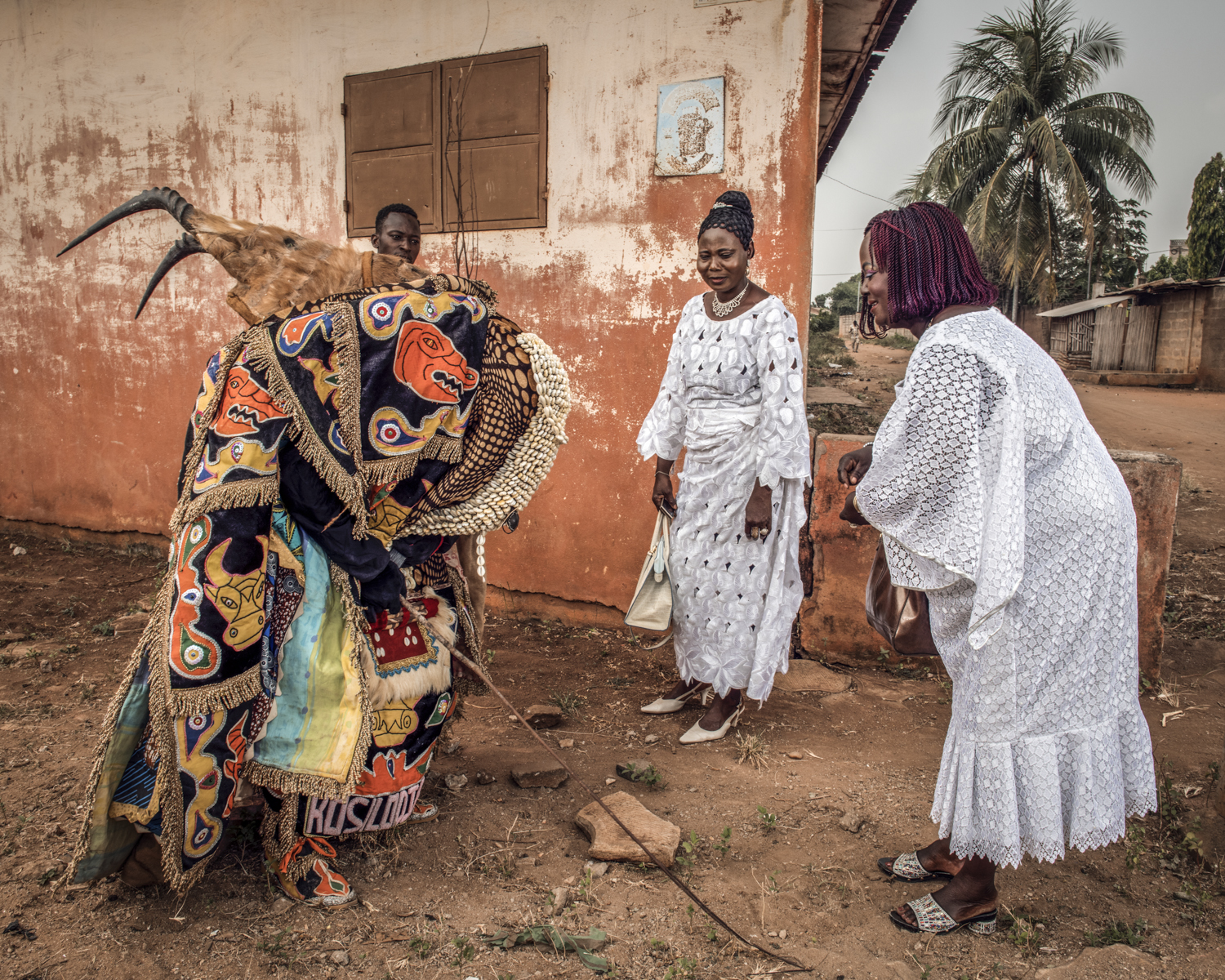
Egungun: Ancestor worship
In Africa, the dead of the family must be honored. For in many African cultures, death does not really exist; the spirit leaves the body to continue its life in the world of the dead, that of the ancestors.
Among the Yoruba, these dead manifest themselves to their descendants through an entity called EGOUN.
It is the spirit of the dead who returns to earth under beautiful loincloths decorated with applications of cut fabric, embroidered and adorned with shells and sequins, bone, and magic wood.
Family and clan societies, strictly reserved for men, have been formed around Egoun the revenant. They evoke the dead, call them and take care of them on earth.
Égoun serves as an intermediary with the souls in the afterlife.
He appears to certain families a few days after the death of one of its members, or during ceremonies performed to honor their memory; he also comes to bring the blessing of the ancestors to the marriages of their descendants and, in certain cases, to welcome a newborn child.
Offerings of food, drink and money are always made to him during his appearances.
EGOUN speaks with a deep, husky voice and dances readily to the sound of Bata or Ogbon drums.
The contact of his loincloth can be fatal to the living, so the MARIWOS (the guardians), members of the EGOUN society, always accompany them, carrying large engraved wooden sticks (lshan) to ward off the unwary. This stick symbolizes the border between the world of the dead (Kou-tome) and the world of the living. Ancestor worship in Africa is directed only to that part of the family that does not go back beyond the founder of the village or the house, that is, to the dynasty of the owners of the inhabited place.
With the exception of the royal families whose members are often deified and therefore have a more important lineage.
This cult is addressed to the deified ancestors and forms a vast system that unites the dead and the living in a continuous and united family whole.
The gods and the dead mix with the living, listen to their complaints, advise them, grant them graces, solve their difficulties and give them remedies for their pains and consolations for their misfortunes. The celestial world is not distant, nor is it superior, and the believer can speak directly with his gods and with his ancestors and benefit from their benevolence.
Each Yoruba clan honors its deceased ancestors in the hope of benefiting from their protection, avoiding their wrath, and keeping the ghosts away from the living.
He therefore regularly brings back the spirit of the ancestors from the realm of the dead (Kou-Tomé)
Each family clan of the ancestor cult has a convent.
It is a sacred place where the masks of the ghosts are kept. It is there that the adepts are trained in secret and that they put on the masks during the ceremonies.
The clan designates those who will be initiated and will have the responsibility of lending their bodies to the spirits of the ancestors and thus, will ensure the dialogue with the ancestors who have become protective deities.
Thus, one or more members of the family are designated, sometimes very young, to be these messengers of the afterlife.
They are taught in secret in a convent for several years, even decades.
There they learn the trance necessary to lend their bodies to the deities, a language that allows them to communicate with the invisible, and to create an appearance...
They emerge from it initiated to the rank of Egungun.
Apart from the initiates, no one knows who is Egungun because during the trances, they appear masked, their bodies totally hidden by their ceremonial costume.
The convent is exclusively reserved for initiates and men, on pain of death. The convent is directed by the Bale, who is generally the head of the family.
The general Alagba is the supreme chief, the king of the Egungun of a city, he watches over the convents of the city.
Egungun: Ancestor worship
In Africa, the dead of the family must be honored. For in many African cultures, death does not really exist; the spirit leaves the body to continue its life in the world of the dead, that of the ancestors.
Among the Yoruba, these dead manifest themselves to their descendants through an entity called EGOUN.
It is the spirit of the dead who returns to earth under beautiful loincloths decorated with applications of cut fabric, embroidered and adorned with shells and sequins, bone, and magic wood.
Family and clan societies, strictly reserved for men, have been formed around Egoun the revenant. They evoke the dead, call them and take care of them on earth.
Égoun serves as an intermediary with the souls in the afterlife.
He appears to certain families a few days after the death of one of its members, or during ceremonies performed to honor their memory; he also comes to bring the blessing of the ancestors to the marriages of their descendants and, in certain cases, to welcome a newborn child.
Offerings of food, drink and money are always made to him during his appearances.
EGOUN speaks with a deep, husky voice and dances readily to the sound of Bata or Ogbon drums.
The contact of his loincloth can be fatal to the living, so the MARIWOS (the guardians), members of the EGOUN society, always accompany them, carrying large engraved wooden sticks (lshan) to ward off the unwary. This stick symbolizes the border between the world of the dead (Kou-tome) and the world of the living. Ancestor worship in Africa is directed only to that part of the family that does not go back beyond the founder of the village or the house, that is, to the dynasty of the owners of the inhabited place.
With the exception of the royal families whose members are often deified and therefore have a more important lineage.
This cult is addressed to the deified ancestors and forms a vast system that unites the dead and the living in a continuous and united family whole.
The gods and the dead mix with the living, listen to their complaints, advise them, grant them graces, solve their difficulties and give them remedies for their pains and consolations for their misfortunes. The celestial world is not distant, nor is it superior, and the believer can speak directly with his gods and with his ancestors and benefit from their benevolence.
Each Yoruba clan honors its deceased ancestors in the hope of benefiting from their protection, avoiding their wrath, and keeping the ghosts away from the living.
He therefore regularly brings back the spirit of the ancestors from the realm of the dead (Kou-Tomé)
Each family clan of the ancestor cult has a convent.
It is a sacred place where the masks of the ghosts are kept. It is there that the adepts are trained in secret and that they put on the masks during the ceremonies.
The clan designates those who will be initiated and will have the responsibility of lending their bodies to the spirits of the ancestors and thus, will ensure the dialogue with the ancestors who have become protective deities.
Thus, one or more members of the family are designated, sometimes very young, to be these messengers of the afterlife.
They are taught in secret in a convent for several years, even decades.
There they learn the trance necessary to lend their bodies to the deities, a language that allows them to communicate with the invisible, and to create an appearance...
They emerge from it initiated to the rank of Egungun.
Apart from the initiates, no one knows who is Egungun because during the trances, they appear masked, their bodies totally hidden by their ceremonial costume.
The convent is exclusively reserved for initiates and men, on pain of death. The convent is directed by the Bale, who is generally the head of the family.
The general Alagba is the supreme chief, the king of the Egungun of a city, he watches over the convents of the city.
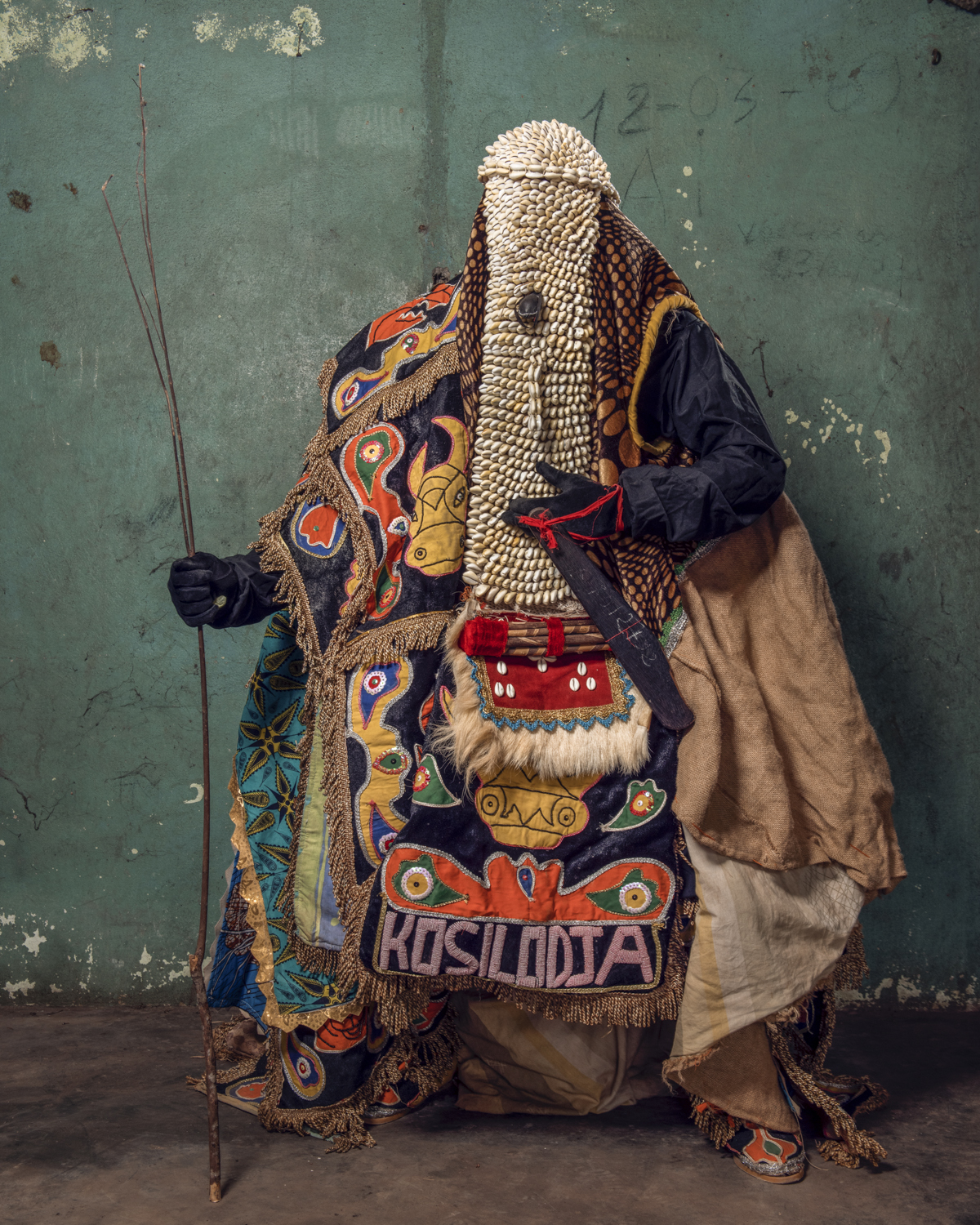
Egungun: Ancestor worship
In Africa, the dead of the family must be honored. For in many African cultures, death does not really exist; the spirit leaves the body to continue its life in the world of the dead, that of the ancestors.
Among the Yoruba, these dead manifest themselves to their descendants through an entity called EGOUN.
It is the spirit of the dead who returns to earth under beautiful loincloths decorated with applications of cut fabric, embroidered and adorned with shells and sequins, bone, and magic wood.
Family and clan societies, strictly reserved for men, have been formed around Egoun the revenant. They evoke the dead, call them and take care of them on earth.
Égoun serves as an intermediary with the souls in the afterlife.
He appears to certain families a few days after the death of one of its members, or during ceremonies performed to honor their memory; he also comes to bring the blessing of the ancestors to the marriages of their descendants and, in certain cases, to welcome a newborn child.
Offerings of food, drink and money are always made to him during his appearances.
EGOUN speaks with a deep, husky voice and dances readily to the sound of Bata or Ogbon drums.
The contact of his loincloth can be fatal to the living, so the MARIWOS (the guardians), members of the EGOUN society, always accompany them, carrying large engraved wooden sticks (lshan) to ward off the unwary. This stick symbolizes the border between the world of the dead (Kou-tome) and the world of the living. Ancestor worship in Africa is directed only to that part of the family that does not go back beyond the founder of the village or the house, that is, to the dynasty of the owners of the inhabited place.
With the exception of the royal families whose members are often deified and therefore have a more important lineage.
This cult is addressed to the deified ancestors and forms a vast system that unites the dead and the living in a continuous and united family whole.
The gods and the dead mix with the living, listen to their complaints, advise them, grant them graces, solve their difficulties and give them remedies for their pains and consolations for their misfortunes. The celestial world is not distant, nor is it superior, and the believer can speak directly with his gods and with his ancestors and benefit from their benevolence.
Each Yoruba clan honors its deceased ancestors in the hope of benefiting from their protection, avoiding their wrath, and keeping the ghosts away from the living.
He therefore regularly brings back the spirit of the ancestors from the realm of the dead (Kou-Tomé)
Each family clan of the ancestor cult has a convent.
It is a sacred place where the masks of the ghosts are kept. It is there that the adepts are trained in secret and that they put on the masks during the ceremonies.
The clan designates those who will be initiated and will have the responsibility of lending their bodies to the spirits of the ancestors and thus, will ensure the dialogue with the ancestors who have become protective deities.
Thus, one or more members of the family are designated, sometimes very young, to be these messengers of the afterlife.
They are taught in secret in a convent for several years, even decades.
There they learn the trance necessary to lend their bodies to the deities, a language that allows them to communicate with the invisible, and to create an appearance...
They emerge from it initiated to the rank of Egungun.
Apart from the initiates, no one knows who is Egungun because during the trances, they appear masked, their bodies totally hidden by their ceremonial costume.
The convent is exclusively reserved for initiates and men, on pain of death. The convent is directed by the Bale, who is generally the head of the family.
The general Alagba is the supreme chief, the king of the Egungun of a city, he watches over the convents of the city.
Egungun: Ancestor worship
In Africa, the dead of the family must be honored. For in many African cultures, death does not really exist; the spirit leaves the body to continue its life in the world of the dead, that of the ancestors.
Among the Yoruba, these dead manifest themselves to their descendants through an entity called EGOUN.
It is the spirit of the dead who returns to earth under beautiful loincloths decorated with applications of cut fabric, embroidered and adorned with shells and sequins, bone, and magic wood.
Family and clan societies, strictly reserved for men, have been formed around Egoun the revenant. They evoke the dead, call them and take care of them on earth.
Égoun serves as an intermediary with the souls in the afterlife.
He appears to certain families a few days after the death of one of its members, or during ceremonies performed to honor their memory; he also comes to bring the blessing of the ancestors to the marriages of their descendants and, in certain cases, to welcome a newborn child.
Offerings of food, drink and money are always made to him during his appearances.
EGOUN speaks with a deep, husky voice and dances readily to the sound of Bata or Ogbon drums.
The contact of his loincloth can be fatal to the living, so the MARIWOS (the guardians), members of the EGOUN society, always accompany them, carrying large engraved wooden sticks (lshan) to ward off the unwary. This stick symbolizes the border between the world of the dead (Kou-tome) and the world of the living. Ancestor worship in Africa is directed only to that part of the family that does not go back beyond the founder of the village or the house, that is, to the dynasty of the owners of the inhabited place.
With the exception of the royal families whose members are often deified and therefore have a more important lineage.
This cult is addressed to the deified ancestors and forms a vast system that unites the dead and the living in a continuous and united family whole.
The gods and the dead mix with the living, listen to their complaints, advise them, grant them graces, solve their difficulties and give them remedies for their pains and consolations for their misfortunes. The celestial world is not distant, nor is it superior, and the believer can speak directly with his gods and with his ancestors and benefit from their benevolence.
Each Yoruba clan honors its deceased ancestors in the hope of benefiting from their protection, avoiding their wrath, and keeping the ghosts away from the living.
He therefore regularly brings back the spirit of the ancestors from the realm of the dead (Kou-Tomé)
Each family clan of the ancestor cult has a convent.
It is a sacred place where the masks of the ghosts are kept. It is there that the adepts are trained in secret and that they put on the masks during the ceremonies.
The clan designates those who will be initiated and will have the responsibility of lending their bodies to the spirits of the ancestors and thus, will ensure the dialogue with the ancestors who have become protective deities.
Thus, one or more members of the family are designated, sometimes very young, to be these messengers of the afterlife.
They are taught in secret in a convent for several years, even decades.
There they learn the trance necessary to lend their bodies to the deities, a language that allows them to communicate with the invisible, and to create an appearance...
They emerge from it initiated to the rank of Egungun.
Apart from the initiates, no one knows who is Egungun because during the trances, they appear masked, their bodies totally hidden by their ceremonial costume.
The convent is exclusively reserved for initiates and men, on pain of death. The convent is directed by the Bale, who is generally the head of the family.
The general Alagba is the supreme chief, the king of the Egungun of a city, he watches over the convents of the city.
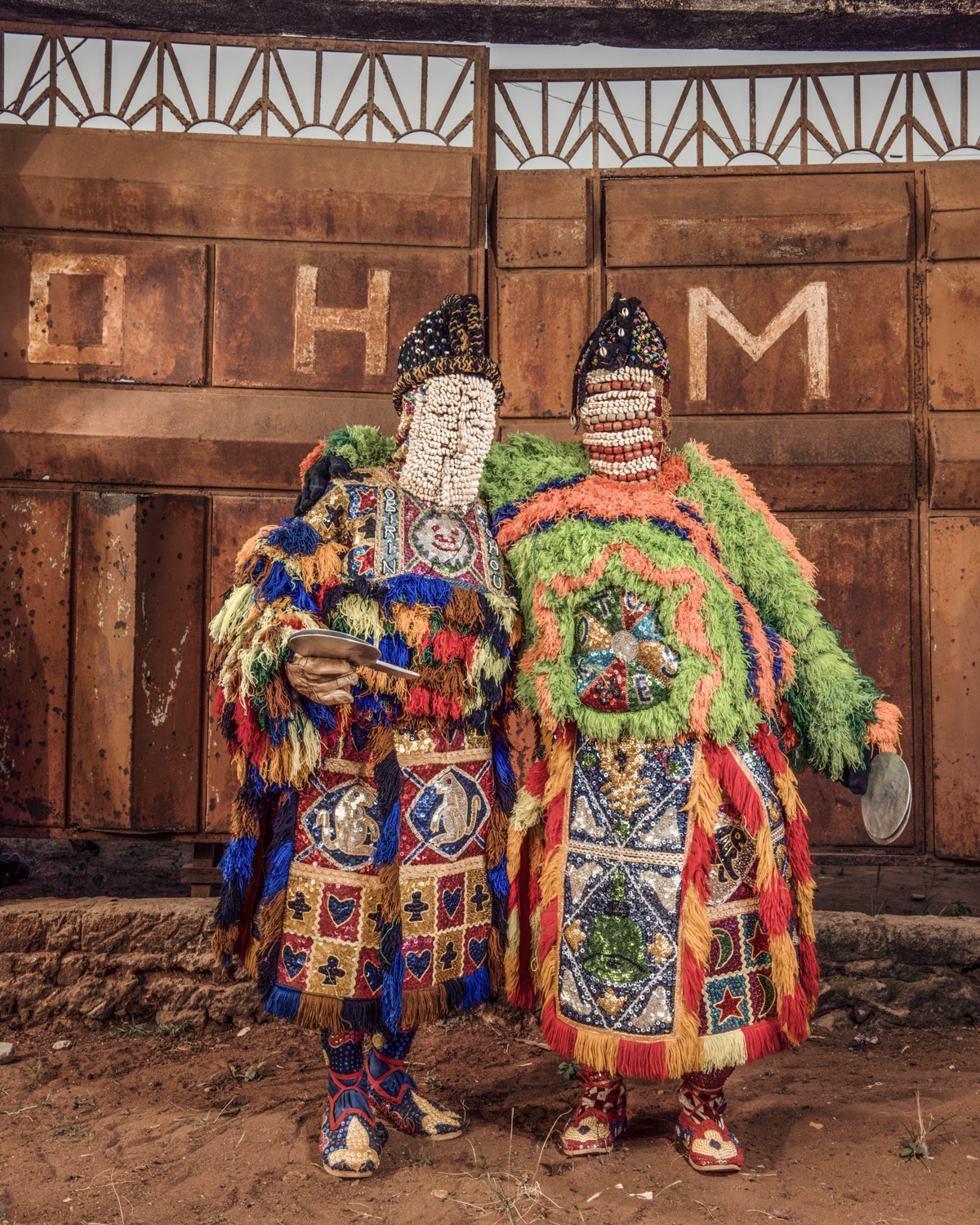
Egungun: Ancestor worship
In Africa, the dead of the family must be honored. For in many African cultures, death does not really exist; the spirit leaves the body to continue its life in the world of the dead, that of the ancestors.
Among the Yoruba, these dead manifest themselves to their descendants through an entity called EGOUN.
It is the spirit of the dead who returns to earth under beautiful loincloths decorated with applications of cut fabric, embroidered and adorned with shells and sequins, bone, and magic wood.
Family and clan societies, strictly reserved for men, have been formed around Egoun the revenant. They evoke the dead, call them and take care of them on earth.
Égoun serves as an intermediary with the souls in the afterlife.
He appears to certain families a few days after the death of one of its members, or during ceremonies performed to honor their memory; he also comes to bring the blessing of the ancestors to the marriages of their descendants and, in certain cases, to welcome a newborn child.
Offerings of food, drink and money are always made to him during his appearances.
EGOUN speaks with a deep, husky voice and dances readily to the sound of Bata or Ogbon drums.
The contact of his loincloth can be fatal to the living, so the MARIWOS (the guardians), members of the EGOUN society, always accompany them, carrying large engraved wooden sticks (lshan) to ward off the unwary. This stick symbolizes the border between the world of the dead (Kou-tome) and the world of the living. Ancestor worship in Africa is directed only to that part of the family that does not go back beyond the founder of the village or the house, that is, to the dynasty of the owners of the inhabited place.
With the exception of the royal families whose members are often deified and therefore have a more important lineage.
This cult is addressed to the deified ancestors and forms a vast system that unites the dead and the living in a continuous and united family whole.
The gods and the dead mix with the living, listen to their complaints, advise them, grant them graces, solve their difficulties and give them remedies for their pains and consolations for their misfortunes. The celestial world is not distant, nor is it superior, and the believer can speak directly with his gods and with his ancestors and benefit from their benevolence.
Each Yoruba clan honors its deceased ancestors in the hope of benefiting from their protection, avoiding their wrath, and keeping the ghosts away from the living.
He therefore regularly brings back the spirit of the ancestors from the realm of the dead (Kou-Tomé)
Each family clan of the ancestor cult has a convent.
It is a sacred place where the masks of the ghosts are kept. It is there that the adepts are trained in secret and that they put on the masks during the ceremonies.
The clan designates those who will be initiated and will have the responsibility of lending their bodies to the spirits of the ancestors and thus, will ensure the dialogue with the ancestors who have become protective deities.
Thus, one or more members of the family are designated, sometimes very young, to be these messengers of the afterlife.
They are taught in secret in a convent for several years, even decades.
There they learn the trance necessary to lend their bodies to the deities, a language that allows them to communicate with the invisible, and to create an appearance...
They emerge from it initiated to the rank of Egungun.
Apart from the initiates, no one knows who is Egungun because during the trances, they appear masked, their bodies totally hidden by their ceremonial costume.
The convent is exclusively reserved for initiates and men, on pain of death. The convent is directed by the Bale, who is generally the head of the family.
The general Alagba is the supreme chief, the king of the Egungun of a city, he watches over the convents of the city.
Egungun: Ancestor worship
In Africa, the dead of the family must be honored. For in many African cultures, death does not really exist; the spirit leaves the body to continue its life in the world of the dead, that of the ancestors.
Among the Yoruba, these dead manifest themselves to their descendants through an entity called EGOUN.
It is the spirit of the dead who returns to earth under beautiful loincloths decorated with applications of cut fabric, embroidered and adorned with shells and sequins, bone, and magic wood.
Family and clan societies, strictly reserved for men, have been formed around Egoun the revenant. They evoke the dead, call them and take care of them on earth.
Égoun serves as an intermediary with the souls in the afterlife.
He appears to certain families a few days after the death of one of its members, or during ceremonies performed to honor their memory; he also comes to bring the blessing of the ancestors to the marriages of their descendants and, in certain cases, to welcome a newborn child.
Offerings of food, drink and money are always made to him during his appearances.
EGOUN speaks with a deep, husky voice and dances readily to the sound of Bata or Ogbon drums.
The contact of his loincloth can be fatal to the living, so the MARIWOS (the guardians), members of the EGOUN society, always accompany them, carrying large engraved wooden sticks (lshan) to ward off the unwary. This stick symbolizes the border between the world of the dead (Kou-tome) and the world of the living. Ancestor worship in Africa is directed only to that part of the family that does not go back beyond the founder of the village or the house, that is, to the dynasty of the owners of the inhabited place.
With the exception of the royal families whose members are often deified and therefore have a more important lineage.
This cult is addressed to the deified ancestors and forms a vast system that unites the dead and the living in a continuous and united family whole.
The gods and the dead mix with the living, listen to their complaints, advise them, grant them graces, solve their difficulties and give them remedies for their pains and consolations for their misfortunes. The celestial world is not distant, nor is it superior, and the believer can speak directly with his gods and with his ancestors and benefit from their benevolence.
Each Yoruba clan honors its deceased ancestors in the hope of benefiting from their protection, avoiding their wrath, and keeping the ghosts away from the living.
He therefore regularly brings back the spirit of the ancestors from the realm of the dead (Kou-Tomé)
Each family clan of the ancestor cult has a convent.
It is a sacred place where the masks of the ghosts are kept. It is there that the adepts are trained in secret and that they put on the masks during the ceremonies.
The clan designates those who will be initiated and will have the responsibility of lending their bodies to the spirits of the ancestors and thus, will ensure the dialogue with the ancestors who have become protective deities.
Thus, one or more members of the family are designated, sometimes very young, to be these messengers of the afterlife.
They are taught in secret in a convent for several years, even decades.
There they learn the trance necessary to lend their bodies to the deities, a language that allows them to communicate with the invisible, and to create an appearance...
They emerge from it initiated to the rank of Egungun.
Apart from the initiates, no one knows who is Egungun because during the trances, they appear masked, their bodies totally hidden by their ceremonial costume.
The convent is exclusively reserved for initiates and men, on pain of death. The convent is directed by the Bale, who is generally the head of the family.
The general Alagba is the supreme chief, the king of the Egungun of a city, he watches over the convents of the city.
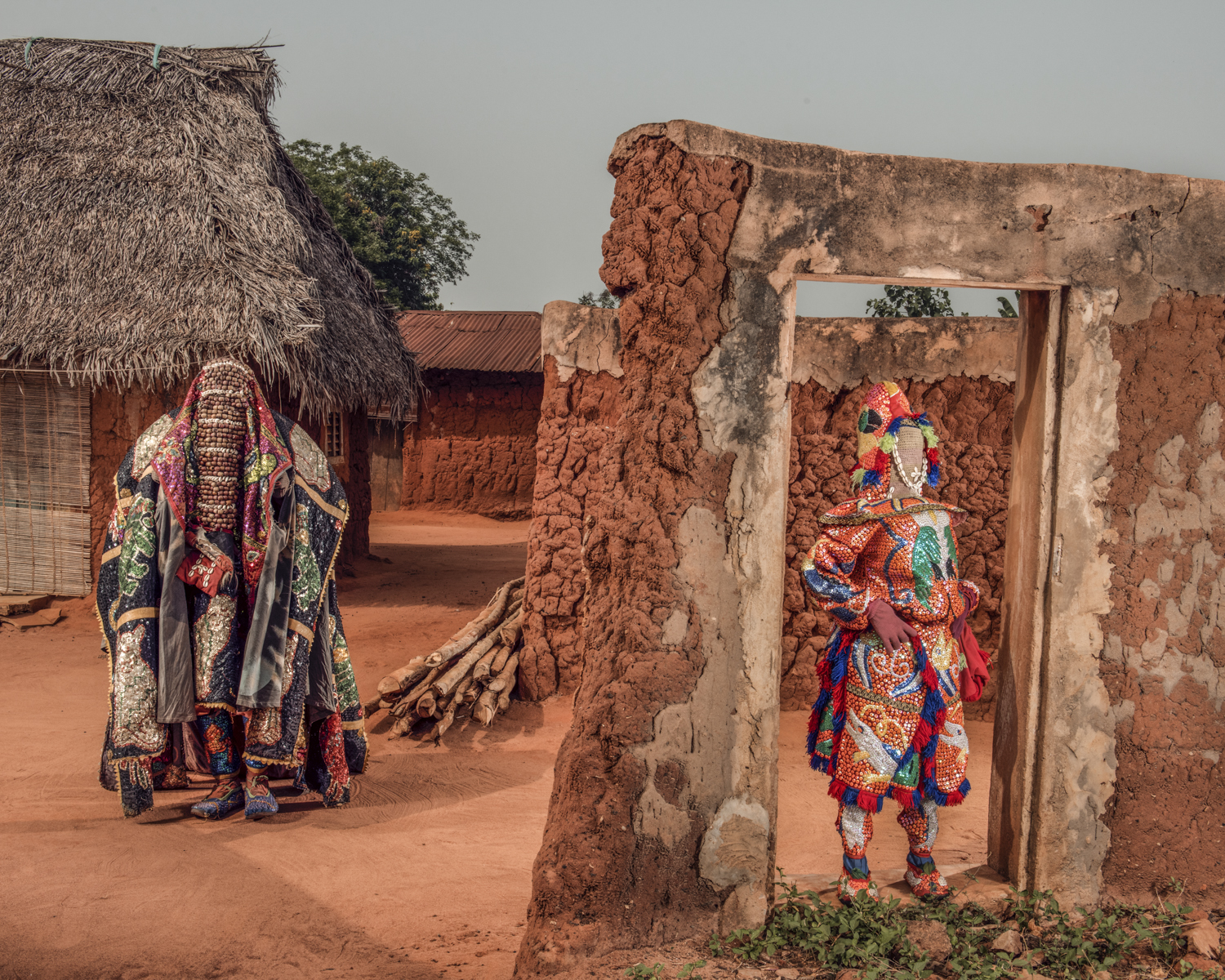
Egungun: Ancestor worship
In Africa, the dead of the family must be honored. For in many African cultures, death does not really exist; the spirit leaves the body to continue its life in the world of the dead, that of the ancestors.
Among the Yoruba, these dead manifest themselves to their descendants through an entity called EGOUN.
It is the spirit of the dead who returns to earth under beautiful loincloths decorated with applications of cut fabric, embroidered and adorned with shells and sequins, bone, and magic wood.
Family and clan societies, strictly reserved for men, have been formed around Egoun the revenant. They evoke the dead, call them and take care of them on earth.
Égoun serves as an intermediary with the souls in the afterlife.
He appears to certain families a few days after the death of one of its members, or during ceremonies performed to honor their memory; he also comes to bring the blessing of the ancestors to the marriages of their descendants and, in certain cases, to welcome a newborn child.
Offerings of food, drink and money are always made to him during his appearances.
EGOUN speaks with a deep, husky voice and dances readily to the sound of Bata or Ogbon drums.
The contact of his loincloth can be fatal to the living, so the MARIWOS (the guardians), members of the EGOUN society, always accompany them, carrying large engraved wooden sticks (lshan) to ward off the unwary. This stick symbolizes the border between the world of the dead (Kou-tome) and the world of the living. Ancestor worship in Africa is directed only to that part of the family that does not go back beyond the founder of the village or the house, that is, to the dynasty of the owners of the inhabited place.
With the exception of the royal families whose members are often deified and therefore have a more important lineage.
This cult is addressed to the deified ancestors and forms a vast system that unites the dead and the living in a continuous and united family whole.
The gods and the dead mix with the living, listen to their complaints, advise them, grant them graces, solve their difficulties and give them remedies for their pains and consolations for their misfortunes. The celestial world is not distant, nor is it superior, and the believer can speak directly with his gods and with his ancestors and benefit from their benevolence.
Each Yoruba clan honors its deceased ancestors in the hope of benefiting from their protection, avoiding their wrath, and keeping the ghosts away from the living.
He therefore regularly brings back the spirit of the ancestors from the realm of the dead (Kou-Tomé)
Each family clan of the ancestor cult has a convent.
It is a sacred place where the masks of the ghosts are kept. It is there that the adepts are trained in secret and that they put on the masks during the ceremonies.
The clan designates those who will be initiated and will have the responsibility of lending their bodies to the spirits of the ancestors and thus, will ensure the dialogue with the ancestors who have become protective deities.
Thus, one or more members of the family are designated, sometimes very young, to be these messengers of the afterlife.
They are taught in secret in a convent for several years, even decades.
There they learn the trance necessary to lend their bodies to the deities, a language that allows them to communicate with the invisible, and to create an appearance...
They emerge from it initiated to the rank of Egungun.
Apart from the initiates, no one knows who is Egungun because during the trances, they appear masked, their bodies totally hidden by their ceremonial costume.
The convent is exclusively reserved for initiates and men, on pain of death. The convent is directed by the Bale, who is generally the head of the family.
The general Alagba is the supreme chief, the king of the Egungun of a city, he watches over the convents of the city.
Egungun: Ancestor worship
In Africa, the dead of the family must be honored. For in many African cultures, death does not really exist; the spirit leaves the body to continue its life in the world of the dead, that of the ancestors.
Among the Yoruba, these dead manifest themselves to their descendants through an entity called EGOUN.
It is the spirit of the dead who returns to earth under beautiful loincloths decorated with applications of cut fabric, embroidered and adorned with shells and sequins, bone, and magic wood.
Family and clan societies, strictly reserved for men, have been formed around Egoun the revenant. They evoke the dead, call them and take care of them on earth.
Égoun serves as an intermediary with the souls in the afterlife.
He appears to certain families a few days after the death of one of its members, or during ceremonies performed to honor their memory; he also comes to bring the blessing of the ancestors to the marriages of their descendants and, in certain cases, to welcome a newborn child.
Offerings of food, drink and money are always made to him during his appearances.
EGOUN speaks with a deep, husky voice and dances readily to the sound of Bata or Ogbon drums.
The contact of his loincloth can be fatal to the living, so the MARIWOS (the guardians), members of the EGOUN society, always accompany them, carrying large engraved wooden sticks (lshan) to ward off the unwary. This stick symbolizes the border between the world of the dead (Kou-tome) and the world of the living. Ancestor worship in Africa is directed only to that part of the family that does not go back beyond the founder of the village or the house, that is, to the dynasty of the owners of the inhabited place.
With the exception of the royal families whose members are often deified and therefore have a more important lineage.
This cult is addressed to the deified ancestors and forms a vast system that unites the dead and the living in a continuous and united family whole.
The gods and the dead mix with the living, listen to their complaints, advise them, grant them graces, solve their difficulties and give them remedies for their pains and consolations for their misfortunes. The celestial world is not distant, nor is it superior, and the believer can speak directly with his gods and with his ancestors and benefit from their benevolence.
Each Yoruba clan honors its deceased ancestors in the hope of benefiting from their protection, avoiding their wrath, and keeping the ghosts away from the living.
He therefore regularly brings back the spirit of the ancestors from the realm of the dead (Kou-Tomé)
Each family clan of the ancestor cult has a convent.
It is a sacred place where the masks of the ghosts are kept. It is there that the adepts are trained in secret and that they put on the masks during the ceremonies.
The clan designates those who will be initiated and will have the responsibility of lending their bodies to the spirits of the ancestors and thus, will ensure the dialogue with the ancestors who have become protective deities.
Thus, one or more members of the family are designated, sometimes very young, to be these messengers of the afterlife.
They are taught in secret in a convent for several years, even decades.
There they learn the trance necessary to lend their bodies to the deities, a language that allows them to communicate with the invisible, and to create an appearance...
They emerge from it initiated to the rank of Egungun.
Apart from the initiates, no one knows who is Egungun because during the trances, they appear masked, their bodies totally hidden by their ceremonial costume.
The convent is exclusively reserved for initiates and men, on pain of death. The convent is directed by the Bale, who is generally the head of the family.
The general Alagba is the supreme chief, the king of the Egungun of a city, he watches over the convents of the city.
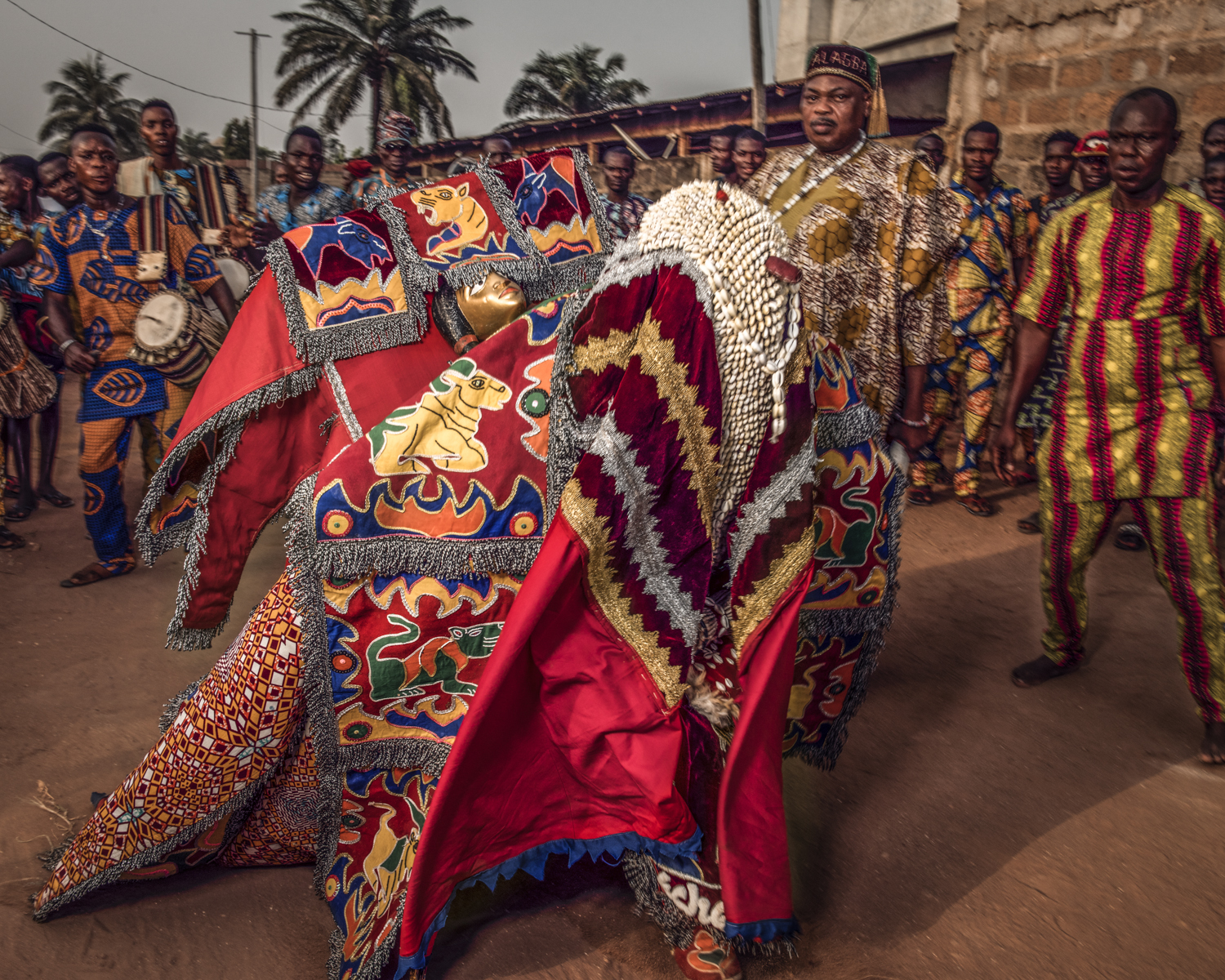
Egungun: Ancestor worship
In Africa, the dead of the family must be honored. For in many African cultures, death does not really exist; the spirit leaves the body to continue its life in the world of the dead, that of the ancestors.
Among the Yoruba, these dead manifest themselves to their descendants through an entity called EGOUN.
It is the spirit of the dead who returns to earth under beautiful loincloths decorated with applications of cut fabric, embroidered and adorned with shells and sequins, bone, and magic wood.
Family and clan societies, strictly reserved for men, have been formed around Egoun the revenant. They evoke the dead, call them and take care of them on earth.
Égoun serves as an intermediary with the souls in the afterlife.
He appears to certain families a few days after the death of one of its members, or during ceremonies performed to honor their memory; he also comes to bring the blessing of the ancestors to the marriages of their descendants and, in certain cases, to welcome a newborn child.
Offerings of food, drink and money are always made to him during his appearances.
EGOUN speaks with a deep, husky voice and dances readily to the sound of Bata or Ogbon drums.
The contact of his loincloth can be fatal to the living, so the MARIWOS (the guardians), members of the EGOUN society, always accompany them, carrying large engraved wooden sticks (lshan) to ward off the unwary. This stick symbolizes the border between the world of the dead (Kou-tome) and the world of the living. Ancestor worship in Africa is directed only to that part of the family that does not go back beyond the founder of the village or the house, that is, to the dynasty of the owners of the inhabited place.
With the exception of the royal families whose members are often deified and therefore have a more important lineage.
This cult is addressed to the deified ancestors and forms a vast system that unites the dead and the living in a continuous and united family whole.
The gods and the dead mix with the living, listen to their complaints, advise them, grant them graces, solve their difficulties and give them remedies for their pains and consolations for their misfortunes. The celestial world is not distant, nor is it superior, and the believer can speak directly with his gods and with his ancestors and benefit from their benevolence.
Each Yoruba clan honors its deceased ancestors in the hope of benefiting from their protection, avoiding their wrath, and keeping the ghosts away from the living.
He therefore regularly brings back the spirit of the ancestors from the realm of the dead (Kou-Tomé)
Each family clan of the ancestor cult has a convent.
It is a sacred place where the masks of the ghosts are kept. It is there that the adepts are trained in secret and that they put on the masks during the ceremonies.
The clan designates those who will be initiated and will have the responsibility of lending their bodies to the spirits of the ancestors and thus, will ensure the dialogue with the ancestors who have become protective deities.
Thus, one or more members of the family are designated, sometimes very young, to be these messengers of the afterlife.
They are taught in secret in a convent for several years, even decades.
There they learn the trance necessary to lend their bodies to the deities, a language that allows them to communicate with the invisible, and to create an appearance...
They emerge from it initiated to the rank of Egungun.
Apart from the initiates, no one knows who is Egungun because during the trances, they appear masked, their bodies totally hidden by their ceremonial costume.
The convent is exclusively reserved for initiates and men, on pain of death. The convent is directed by the Bale, who is generally the head of the family.
The general Alagba is the supreme chief, the king of the Egungun of a city, he watches over the convents of the city.
Egungun: Ancestor worship
In Africa, the dead of the family must be honored. For in many African cultures, death does not really exist; the spirit leaves the body to continue its life in the world of the dead, that of the ancestors.
Among the Yoruba, these dead manifest themselves to their descendants through an entity called EGOUN.
It is the spirit of the dead who returns to earth under beautiful loincloths decorated with applications of cut fabric, embroidered and adorned with shells and sequins, bone, and magic wood.
Family and clan societies, strictly reserved for men, have been formed around Egoun the revenant. They evoke the dead, call them and take care of them on earth.
Égoun serves as an intermediary with the souls in the afterlife.
He appears to certain families a few days after the death of one of its members, or during ceremonies performed to honor their memory; he also comes to bring the blessing of the ancestors to the marriages of their descendants and, in certain cases, to welcome a newborn child.
Offerings of food, drink and money are always made to him during his appearances.
EGOUN speaks with a deep, husky voice and dances readily to the sound of Bata or Ogbon drums.
The contact of his loincloth can be fatal to the living, so the MARIWOS (the guardians), members of the EGOUN society, always accompany them, carrying large engraved wooden sticks (lshan) to ward off the unwary. This stick symbolizes the border between the world of the dead (Kou-tome) and the world of the living. Ancestor worship in Africa is directed only to that part of the family that does not go back beyond the founder of the village or the house, that is, to the dynasty of the owners of the inhabited place.
With the exception of the royal families whose members are often deified and therefore have a more important lineage.
This cult is addressed to the deified ancestors and forms a vast system that unites the dead and the living in a continuous and united family whole.
The gods and the dead mix with the living, listen to their complaints, advise them, grant them graces, solve their difficulties and give them remedies for their pains and consolations for their misfortunes. The celestial world is not distant, nor is it superior, and the believer can speak directly with his gods and with his ancestors and benefit from their benevolence.
Each Yoruba clan honors its deceased ancestors in the hope of benefiting from their protection, avoiding their wrath, and keeping the ghosts away from the living.
He therefore regularly brings back the spirit of the ancestors from the realm of the dead (Kou-Tomé)
Each family clan of the ancestor cult has a convent.
It is a sacred place where the masks of the ghosts are kept. It is there that the adepts are trained in secret and that they put on the masks during the ceremonies.
The clan designates those who will be initiated and will have the responsibility of lending their bodies to the spirits of the ancestors and thus, will ensure the dialogue with the ancestors who have become protective deities.
Thus, one or more members of the family are designated, sometimes very young, to be these messengers of the afterlife.
They are taught in secret in a convent for several years, even decades.
There they learn the trance necessary to lend their bodies to the deities, a language that allows them to communicate with the invisible, and to create an appearance...
They emerge from it initiated to the rank of Egungun.
Apart from the initiates, no one knows who is Egungun because during the trances, they appear masked, their bodies totally hidden by their ceremonial costume.
The convent is exclusively reserved for initiates and men, on pain of death. The convent is directed by the Bale, who is generally the head of the family.
The general Alagba is the supreme chief, the king of the Egungun of a city, he watches over the convents of the city.
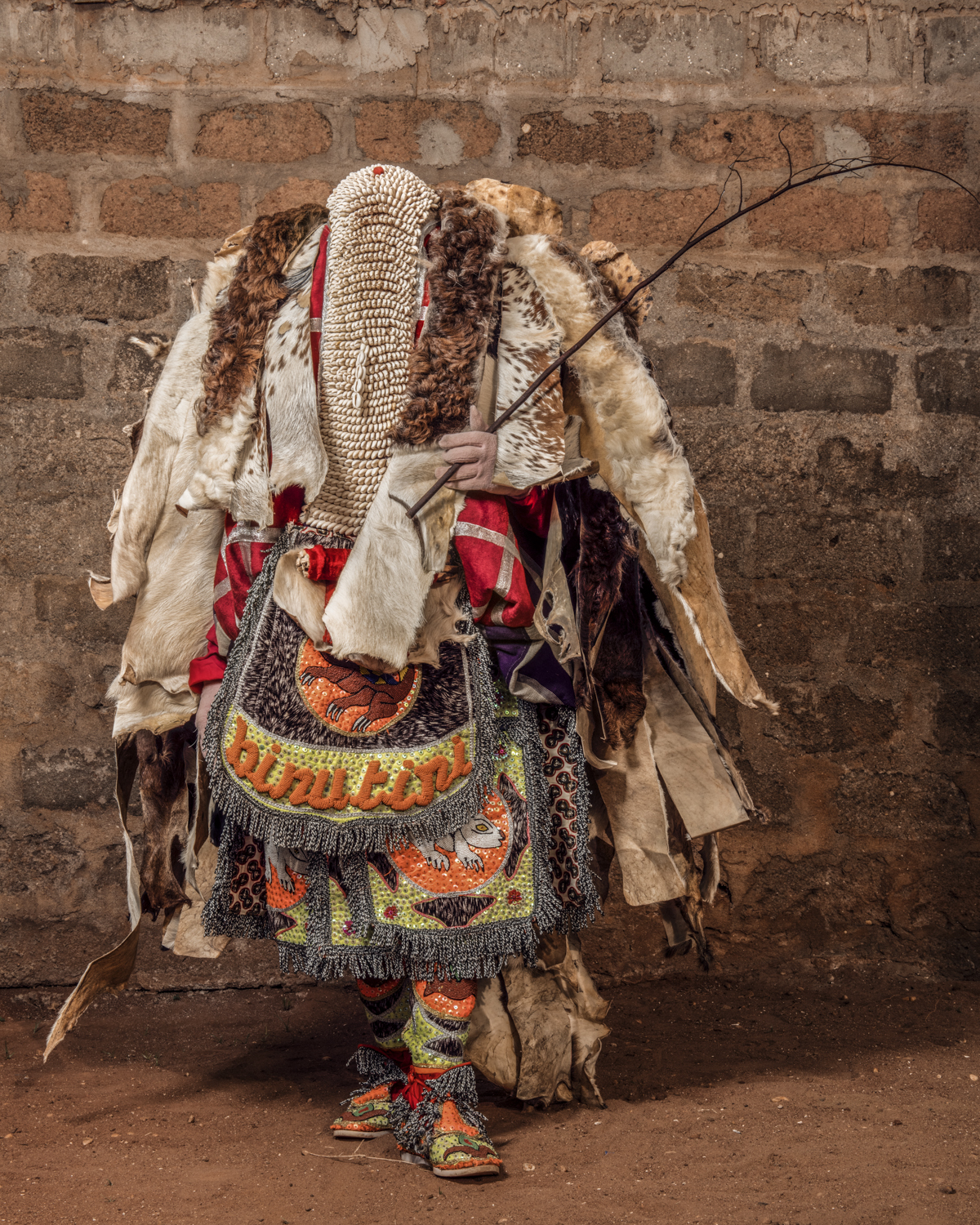
Egungun: Ancestor worship
In Africa, the dead of the family must be honored. For in many African cultures, death does not really exist; the spirit leaves the body to continue its life in the world of the dead, that of the ancestors.
Among the Yoruba, these dead manifest themselves to their descendants through an entity called EGOUN.
It is the spirit of the dead who returns to earth under beautiful loincloths decorated with applications of cut fabric, embroidered and adorned with shells and sequins, bone, and magic wood.
Family and clan societies, strictly reserved for men, have been formed around Egoun the revenant. They evoke the dead, call them and take care of them on earth.
Égoun serves as an intermediary with the souls in the afterlife.
He appears to certain families a few days after the death of one of its members, or during ceremonies performed to honor their memory; he also comes to bring the blessing of the ancestors to the marriages of their descendants and, in certain cases, to welcome a newborn child.
Offerings of food, drink and money are always made to him during his appearances.
EGOUN speaks with a deep, husky voice and dances readily to the sound of Bata or Ogbon drums.
The contact of his loincloth can be fatal to the living, so the MARIWOS (the guardians), members of the EGOUN society, always accompany them, carrying large engraved wooden sticks (lshan) to ward off the unwary. This stick symbolizes the border between the world of the dead (Kou-tome) and the world of the living. Ancestor worship in Africa is directed only to that part of the family that does not go back beyond the founder of the village or the house, that is, to the dynasty of the owners of the inhabited place.
With the exception of the royal families whose members are often deified and therefore have a more important lineage.
This cult is addressed to the deified ancestors and forms a vast system that unites the dead and the living in a continuous and united family whole.
The gods and the dead mix with the living, listen to their complaints, advise them, grant them graces, solve their difficulties and give them remedies for their pains and consolations for their misfortunes. The celestial world is not distant, nor is it superior, and the believer can speak directly with his gods and with his ancestors and benefit from their benevolence.
Each Yoruba clan honors its deceased ancestors in the hope of benefiting from their protection, avoiding their wrath, and keeping the ghosts away from the living.
He therefore regularly brings back the spirit of the ancestors from the realm of the dead (Kou-Tomé)
Each family clan of the ancestor cult has a convent.
It is a sacred place where the masks of the ghosts are kept. It is there that the adepts are trained in secret and that they put on the masks during the ceremonies.
The clan designates those who will be initiated and will have the responsibility of lending their bodies to the spirits of the ancestors and thus, will ensure the dialogue with the ancestors who have become protective deities.
Thus, one or more members of the family are designated, sometimes very young, to be these messengers of the afterlife.
They are taught in secret in a convent for several years, even decades.
There they learn the trance necessary to lend their bodies to the deities, a language that allows them to communicate with the invisible, and to create an appearance...
They emerge from it initiated to the rank of Egungun.
Apart from the initiates, no one knows who is Egungun because during the trances, they appear masked, their bodies totally hidden by their ceremonial costume.
The convent is exclusively reserved for initiates and men, on pain of death. The convent is directed by the Bale, who is generally the head of the family.
The general Alagba is the supreme chief, the king of the Egungun of a city, he watches over the convents of the city.
Egungun: Ancestor worship
In Africa, the dead of the family must be honored. For in many African cultures, death does not really exist; the spirit leaves the body to continue its life in the world of the dead, that of the ancestors.
Among the Yoruba, these dead manifest themselves to their descendants through an entity called EGOUN.
It is the spirit of the dead who returns to earth under beautiful loincloths decorated with applications of cut fabric, embroidered and adorned with shells and sequins, bone, and magic wood.
Family and clan societies, strictly reserved for men, have been formed around Egoun the revenant. They evoke the dead, call them and take care of them on earth.
Égoun serves as an intermediary with the souls in the afterlife.
He appears to certain families a few days after the death of one of its members, or during ceremonies performed to honor their memory; he also comes to bring the blessing of the ancestors to the marriages of their descendants and, in certain cases, to welcome a newborn child.
Offerings of food, drink and money are always made to him during his appearances.
EGOUN speaks with a deep, husky voice and dances readily to the sound of Bata or Ogbon drums.
The contact of his loincloth can be fatal to the living, so the MARIWOS (the guardians), members of the EGOUN society, always accompany them, carrying large engraved wooden sticks (lshan) to ward off the unwary. This stick symbolizes the border between the world of the dead (Kou-tome) and the world of the living. Ancestor worship in Africa is directed only to that part of the family that does not go back beyond the founder of the village or the house, that is, to the dynasty of the owners of the inhabited place.
With the exception of the royal families whose members are often deified and therefore have a more important lineage.
This cult is addressed to the deified ancestors and forms a vast system that unites the dead and the living in a continuous and united family whole.
The gods and the dead mix with the living, listen to their complaints, advise them, grant them graces, solve their difficulties and give them remedies for their pains and consolations for their misfortunes. The celestial world is not distant, nor is it superior, and the believer can speak directly with his gods and with his ancestors and benefit from their benevolence.
Each Yoruba clan honors its deceased ancestors in the hope of benefiting from their protection, avoiding their wrath, and keeping the ghosts away from the living.
He therefore regularly brings back the spirit of the ancestors from the realm of the dead (Kou-Tomé)
Each family clan of the ancestor cult has a convent.
It is a sacred place where the masks of the ghosts are kept. It is there that the adepts are trained in secret and that they put on the masks during the ceremonies.
The clan designates those who will be initiated and will have the responsibility of lending their bodies to the spirits of the ancestors and thus, will ensure the dialogue with the ancestors who have become protective deities.
Thus, one or more members of the family are designated, sometimes very young, to be these messengers of the afterlife.
They are taught in secret in a convent for several years, even decades.
There they learn the trance necessary to lend their bodies to the deities, a language that allows them to communicate with the invisible, and to create an appearance...
They emerge from it initiated to the rank of Egungun.
Apart from the initiates, no one knows who is Egungun because during the trances, they appear masked, their bodies totally hidden by their ceremonial costume.
The convent is exclusively reserved for initiates and men, on pain of death. The convent is directed by the Bale, who is generally the head of the family.
The general Alagba is the supreme chief, the king of the Egungun of a city, he watches over the convents of the city.
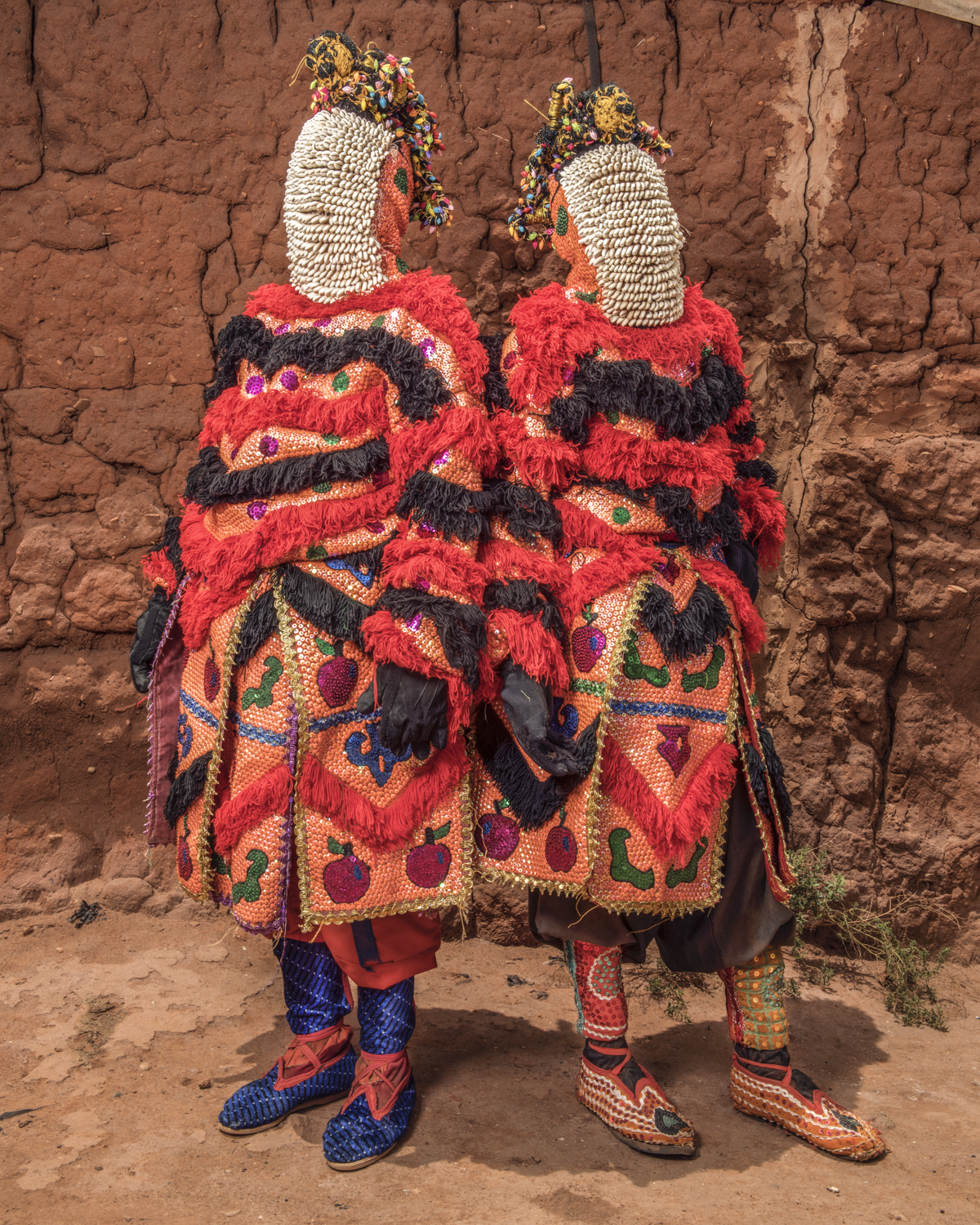
Egungun: Ancestor worship
In Africa, the dead of the family must be honored. For in many African cultures, death does not really exist; the spirit leaves the body to continue its life in the world of the dead, that of the ancestors.
Among the Yoruba, these dead manifest themselves to their descendants through an entity called EGOUN.
It is the spirit of the dead who returns to earth under beautiful loincloths decorated with applications of cut fabric, embroidered and adorned with shells and sequins, bone, and magic wood.
Family and clan societies, strictly reserved for men, have been formed around Egoun the revenant. They evoke the dead, call them and take care of them on earth.
Égoun serves as an intermediary with the souls in the afterlife.
He appears to certain families a few days after the death of one of its members, or during ceremonies performed to honor their memory; he also comes to bring the blessing of the ancestors to the marriages of their descendants and, in certain cases, to welcome a newborn child.
Offerings of food, drink and money are always made to him during his appearances.
EGOUN speaks with a deep, husky voice and dances readily to the sound of Bata or Ogbon drums.
The contact of his loincloth can be fatal to the living, so the MARIWOS (the guardians), members of the EGOUN society, always accompany them, carrying large engraved wooden sticks (lshan) to ward off the unwary. This stick symbolizes the border between the world of the dead (Kou-tome) and the world of the living. Ancestor worship in Africa is directed only to that part of the family that does not go back beyond the founder of the village or the house, that is, to the dynasty of the owners of the inhabited place.
With the exception of the royal families whose members are often deified and therefore have a more important lineage.
This cult is addressed to the deified ancestors and forms a vast system that unites the dead and the living in a continuous and united family whole.
The gods and the dead mix with the living, listen to their complaints, advise them, grant them graces, solve their difficulties and give them remedies for their pains and consolations for their misfortunes. The celestial world is not distant, nor is it superior, and the believer can speak directly with his gods and with his ancestors and benefit from their benevolence.
Each Yoruba clan honors its deceased ancestors in the hope of benefiting from their protection, avoiding their wrath, and keeping the ghosts away from the living.
He therefore regularly brings back the spirit of the ancestors from the realm of the dead (Kou-Tomé)
Each family clan of the ancestor cult has a convent.
It is a sacred place where the masks of the ghosts are kept. It is there that the adepts are trained in secret and that they put on the masks during the ceremonies.
The clan designates those who will be initiated and will have the responsibility of lending their bodies to the spirits of the ancestors and thus, will ensure the dialogue with the ancestors who have become protective deities.
Thus, one or more members of the family are designated, sometimes very young, to be these messengers of the afterlife.
They are taught in secret in a convent for several years, even decades.
There they learn the trance necessary to lend their bodies to the deities, a language that allows them to communicate with the invisible, and to create an appearance...
They emerge from it initiated to the rank of Egungun.
Apart from the initiates, no one knows who is Egungun because during the trances, they appear masked, their bodies totally hidden by their ceremonial costume.
The convent is exclusively reserved for initiates and men, on pain of death. The convent is directed by the Bale, who is generally the head of the family.
The general Alagba is the supreme chief, the king of the Egungun of a city, he watches over the convents of the city.
Egungun: Ancestor worship
In Africa, the dead of the family must be honored. For in many African cultures, death does not really exist; the spirit leaves the body to continue its life in the world of the dead, that of the ancestors.
Among the Yoruba, these dead manifest themselves to their descendants through an entity called EGOUN.
It is the spirit of the dead who returns to earth under beautiful loincloths decorated with applications of cut fabric, embroidered and adorned with shells and sequins, bone, and magic wood.
Family and clan societies, strictly reserved for men, have been formed around Egoun the revenant. They evoke the dead, call them and take care of them on earth.
Égoun serves as an intermediary with the souls in the afterlife.
He appears to certain families a few days after the death of one of its members, or during ceremonies performed to honor their memory; he also comes to bring the blessing of the ancestors to the marriages of their descendants and, in certain cases, to welcome a newborn child.
Offerings of food, drink and money are always made to him during his appearances.
EGOUN speaks with a deep, husky voice and dances readily to the sound of Bata or Ogbon drums.
The contact of his loincloth can be fatal to the living, so the MARIWOS (the guardians), members of the EGOUN society, always accompany them, carrying large engraved wooden sticks (lshan) to ward off the unwary. This stick symbolizes the border between the world of the dead (Kou-tome) and the world of the living. Ancestor worship in Africa is directed only to that part of the family that does not go back beyond the founder of the village or the house, that is, to the dynasty of the owners of the inhabited place.
With the exception of the royal families whose members are often deified and therefore have a more important lineage.
This cult is addressed to the deified ancestors and forms a vast system that unites the dead and the living in a continuous and united family whole.
The gods and the dead mix with the living, listen to their complaints, advise them, grant them graces, solve their difficulties and give them remedies for their pains and consolations for their misfortunes. The celestial world is not distant, nor is it superior, and the believer can speak directly with his gods and with his ancestors and benefit from their benevolence.
Each Yoruba clan honors its deceased ancestors in the hope of benefiting from their protection, avoiding their wrath, and keeping the ghosts away from the living.
He therefore regularly brings back the spirit of the ancestors from the realm of the dead (Kou-Tomé)
Each family clan of the ancestor cult has a convent.
It is a sacred place where the masks of the ghosts are kept. It is there that the adepts are trained in secret and that they put on the masks during the ceremonies.
The clan designates those who will be initiated and will have the responsibility of lending their bodies to the spirits of the ancestors and thus, will ensure the dialogue with the ancestors who have become protective deities.
Thus, one or more members of the family are designated, sometimes very young, to be these messengers of the afterlife.
They are taught in secret in a convent for several years, even decades.
There they learn the trance necessary to lend their bodies to the deities, a language that allows them to communicate with the invisible, and to create an appearance...
They emerge from it initiated to the rank of Egungun.
Apart from the initiates, no one knows who is Egungun because during the trances, they appear masked, their bodies totally hidden by their ceremonial costume.
The convent is exclusively reserved for initiates and men, on pain of death. The convent is directed by the Bale, who is generally the head of the family.
The general Alagba is the supreme chief, the king of the Egungun of a city, he watches over the convents of the city.
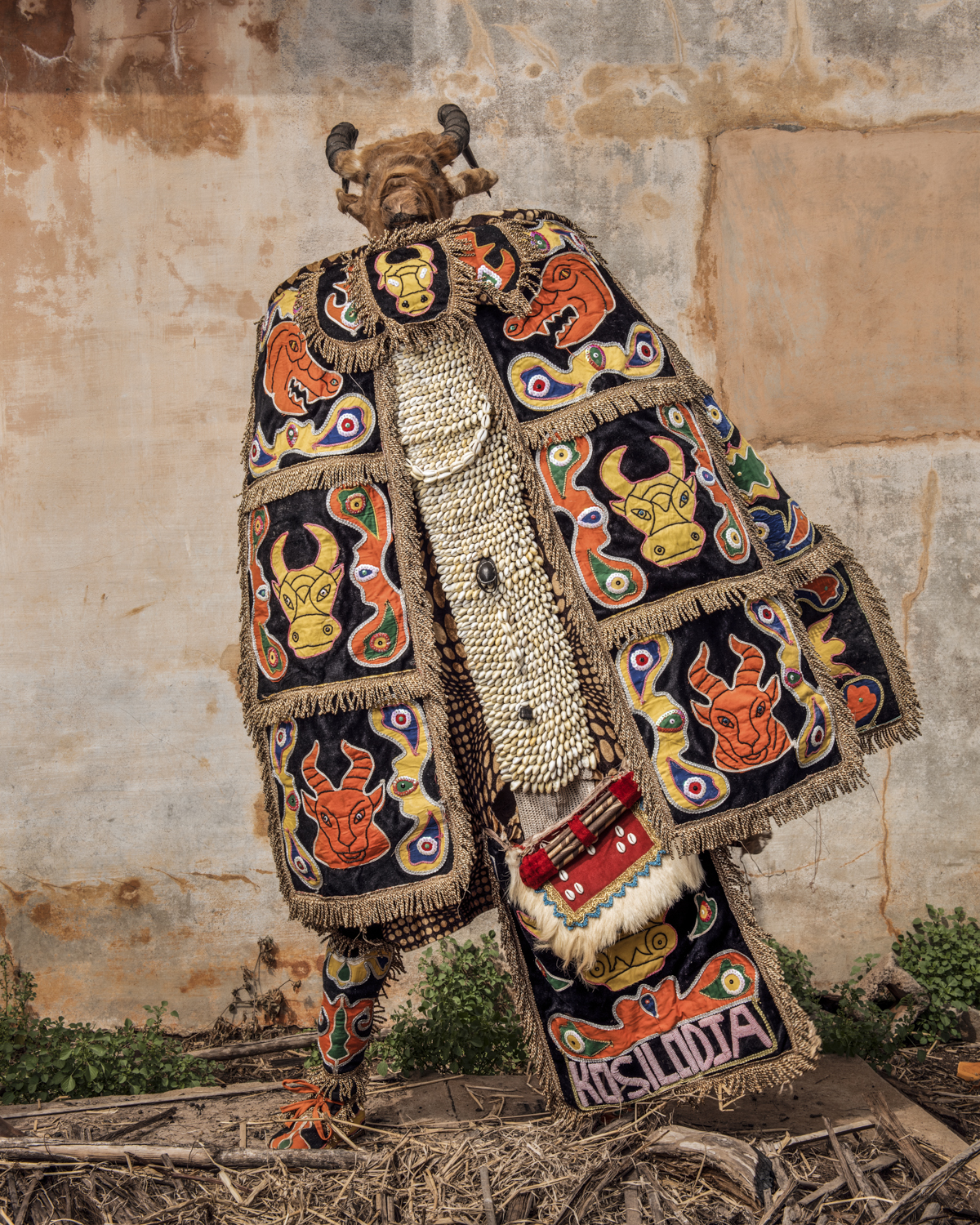
Egungun: Ancestor worship
In Africa, the dead of the family must be honored. For in many African cultures, death does not really exist; the spirit leaves the body to continue its life in the world of the dead, that of the ancestors.
Among the Yoruba, these dead manifest themselves to their descendants through an entity called EGOUN.
It is the spirit of the dead who returns to earth under beautiful loincloths decorated with applications of cut fabric, embroidered and adorned with shells and sequins, bone, and magic wood.
Family and clan societies, strictly reserved for men, have been formed around Egoun the revenant. They evoke the dead, call them and take care of them on earth.
Égoun serves as an intermediary with the souls in the afterlife.
He appears to certain families a few days after the death of one of its members, or during ceremonies performed to honor their memory; he also comes to bring the blessing of the ancestors to the marriages of their descendants and, in certain cases, to welcome a newborn child.
Offerings of food, drink and money are always made to him during his appearances.
EGOUN speaks with a deep, husky voice and dances readily to the sound of Bata or Ogbon drums.
The contact of his loincloth can be fatal to the living, so the MARIWOS (the guardians), members of the EGOUN society, always accompany them, carrying large engraved wooden sticks (lshan) to ward off the unwary. This stick symbolizes the border between the world of the dead (Kou-tome) and the world of the living. Ancestor worship in Africa is directed only to that part of the family that does not go back beyond the founder of the village or the house, that is, to the dynasty of the owners of the inhabited place.
With the exception of the royal families whose members are often deified and therefore have a more important lineage.
This cult is addressed to the deified ancestors and forms a vast system that unites the dead and the living in a continuous and united family whole.
The gods and the dead mix with the living, listen to their complaints, advise them, grant them graces, solve their difficulties and give them remedies for their pains and consolations for their misfortunes. The celestial world is not distant, nor is it superior, and the believer can speak directly with his gods and with his ancestors and benefit from their benevolence.
Each Yoruba clan honors its deceased ancestors in the hope of benefiting from their protection, avoiding their wrath, and keeping the ghosts away from the living.
He therefore regularly brings back the spirit of the ancestors from the realm of the dead (Kou-Tomé)
Each family clan of the ancestor cult has a convent.
It is a sacred place where the masks of the ghosts are kept. It is there that the adepts are trained in secret and that they put on the masks during the ceremonies.
The clan designates those who will be initiated and will have the responsibility of lending their bodies to the spirits of the ancestors and thus, will ensure the dialogue with the ancestors who have become protective deities.
Thus, one or more members of the family are designated, sometimes very young, to be these messengers of the afterlife.
They are taught in secret in a convent for several years, even decades.
There they learn the trance necessary to lend their bodies to the deities, a language that allows them to communicate with the invisible, and to create an appearance...
They emerge from it initiated to the rank of Egungun.
Apart from the initiates, no one knows who is Egungun because during the trances, they appear masked, their bodies totally hidden by their ceremonial costume.
The convent is exclusively reserved for initiates and men, on pain of death. The convent is directed by the Bale, who is generally the head of the family.
The general Alagba is the supreme chief, the king of the Egungun of a city, he watches over the convents of the city.
Egungun: Ancestor worship
In Africa, the dead of the family must be honored. For in many African cultures, death does not really exist; the spirit leaves the body to continue its life in the world of the dead, that of the ancestors.
Among the Yoruba, these dead manifest themselves to their descendants through an entity called EGOUN.
It is the spirit of the dead who returns to earth under beautiful loincloths decorated with applications of cut fabric, embroidered and adorned with shells and sequins, bone, and magic wood.
Family and clan societies, strictly reserved for men, have been formed around Egoun the revenant. They evoke the dead, call them and take care of them on earth.
Égoun serves as an intermediary with the souls in the afterlife.
He appears to certain families a few days after the death of one of its members, or during ceremonies performed to honor their memory; he also comes to bring the blessing of the ancestors to the marriages of their descendants and, in certain cases, to welcome a newborn child.
Offerings of food, drink and money are always made to him during his appearances.
EGOUN speaks with a deep, husky voice and dances readily to the sound of Bata or Ogbon drums.
The contact of his loincloth can be fatal to the living, so the MARIWOS (the guardians), members of the EGOUN society, always accompany them, carrying large engraved wooden sticks (lshan) to ward off the unwary. This stick symbolizes the border between the world of the dead (Kou-tome) and the world of the living. Ancestor worship in Africa is directed only to that part of the family that does not go back beyond the founder of the village or the house, that is, to the dynasty of the owners of the inhabited place.
With the exception of the royal families whose members are often deified and therefore have a more important lineage.
This cult is addressed to the deified ancestors and forms a vast system that unites the dead and the living in a continuous and united family whole.
The gods and the dead mix with the living, listen to their complaints, advise them, grant them graces, solve their difficulties and give them remedies for their pains and consolations for their misfortunes. The celestial world is not distant, nor is it superior, and the believer can speak directly with his gods and with his ancestors and benefit from their benevolence.
Each Yoruba clan honors its deceased ancestors in the hope of benefiting from their protection, avoiding their wrath, and keeping the ghosts away from the living.
He therefore regularly brings back the spirit of the ancestors from the realm of the dead (Kou-Tomé)
Each family clan of the ancestor cult has a convent.
It is a sacred place where the masks of the ghosts are kept. It is there that the adepts are trained in secret and that they put on the masks during the ceremonies.
The clan designates those who will be initiated and will have the responsibility of lending their bodies to the spirits of the ancestors and thus, will ensure the dialogue with the ancestors who have become protective deities.
Thus, one or more members of the family are designated, sometimes very young, to be these messengers of the afterlife.
They are taught in secret in a convent for several years, even decades.
There they learn the trance necessary to lend their bodies to the deities, a language that allows them to communicate with the invisible, and to create an appearance...
They emerge from it initiated to the rank of Egungun.
Apart from the initiates, no one knows who is Egungun because during the trances, they appear masked, their bodies totally hidden by their ceremonial costume.
The convent is exclusively reserved for initiates and men, on pain of death. The convent is directed by the Bale, who is generally the head of the family.
The general Alagba is the supreme chief, the king of the Egungun of a city, he watches over the convents of the city.
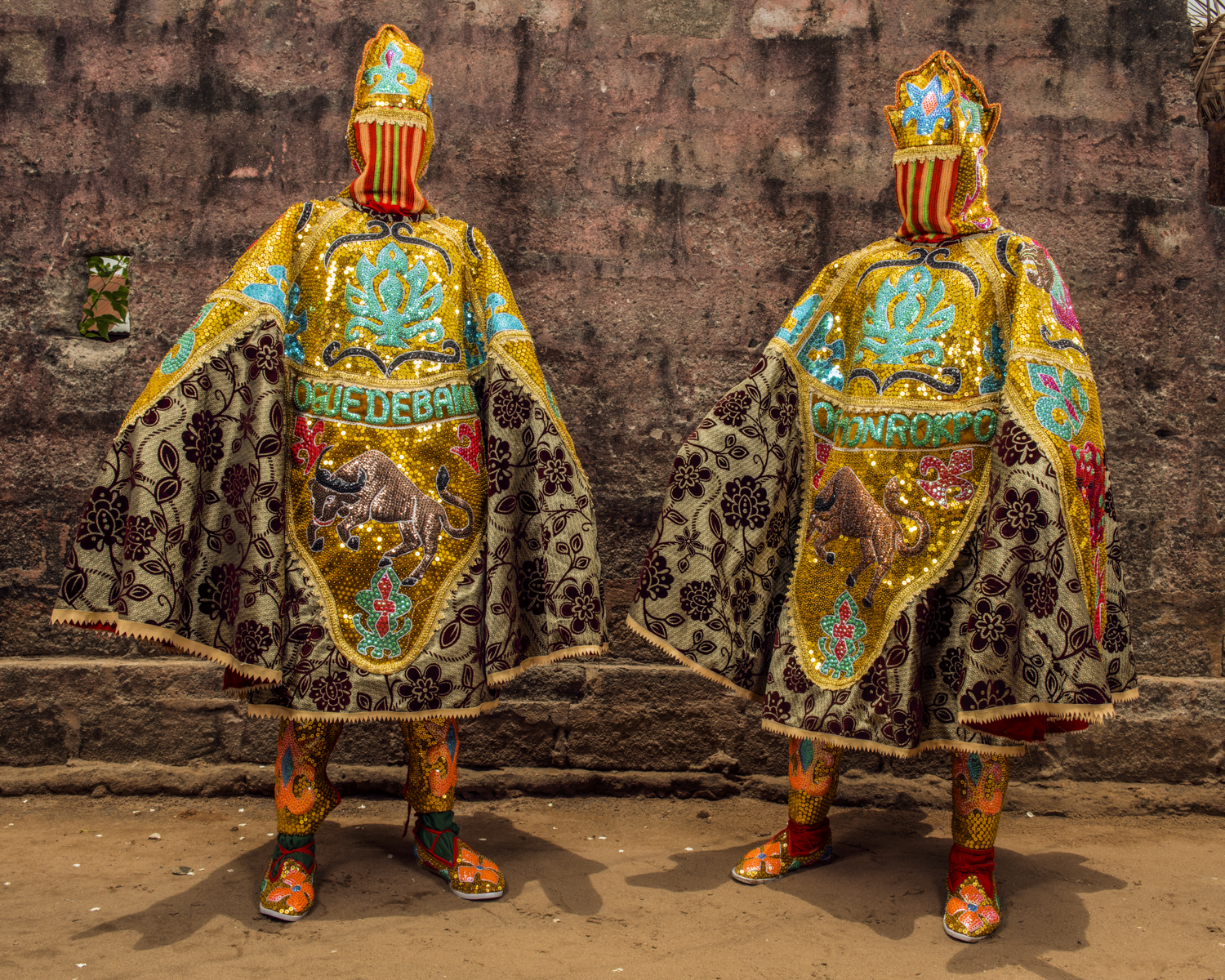
Egungun: Ancestor worship
In Africa, the dead of the family must be honored. For in many African cultures, death does not really exist; the spirit leaves the body to continue its life in the world of the dead, that of the ancestors.
Among the Yoruba, these dead manifest themselves to their descendants through an entity called EGOUN.
It is the spirit of the dead who returns to earth under beautiful loincloths decorated with applications of cut fabric, embroidered and adorned with shells and sequins, bone, and magic wood.
Family and clan societies, strictly reserved for men, have been formed around Egoun the revenant. They evoke the dead, call them and take care of them on earth.
Égoun serves as an intermediary with the souls in the afterlife.
He appears to certain families a few days after the death of one of its members, or during ceremonies performed to honor their memory; he also comes to bring the blessing of the ancestors to the marriages of their descendants and, in certain cases, to welcome a newborn child.
Offerings of food, drink and money are always made to him during his appearances.
EGOUN speaks with a deep, husky voice and dances readily to the sound of Bata or Ogbon drums.
The contact of his loincloth can be fatal to the living, so the MARIWOS (the guardians), members of the EGOUN society, always accompany them, carrying large engraved wooden sticks (lshan) to ward off the unwary. This stick symbolizes the border between the world of the dead (Kou-tome) and the world of the living. Ancestor worship in Africa is directed only to that part of the family that does not go back beyond the founder of the village or the house, that is, to the dynasty of the owners of the inhabited place.
With the exception of the royal families whose members are often deified and therefore have a more important lineage.
This cult is addressed to the deified ancestors and forms a vast system that unites the dead and the living in a continuous and united family whole.
The gods and the dead mix with the living, listen to their complaints, advise them, grant them graces, solve their difficulties and give them remedies for their pains and consolations for their misfortunes. The celestial world is not distant, nor is it superior, and the believer can speak directly with his gods and with his ancestors and benefit from their benevolence.
Each Yoruba clan honors its deceased ancestors in the hope of benefiting from their protection, avoiding their wrath, and keeping the ghosts away from the living.
He therefore regularly brings back the spirit of the ancestors from the realm of the dead (Kou-Tomé)
Each family clan of the ancestor cult has a convent.
It is a sacred place where the masks of the ghosts are kept. It is there that the adepts are trained in secret and that they put on the masks during the ceremonies.
The clan designates those who will be initiated and will have the responsibility of lending their bodies to the spirits of the ancestors and thus, will ensure the dialogue with the ancestors who have become protective deities.
Thus, one or more members of the family are designated, sometimes very young, to be these messengers of the afterlife.
They are taught in secret in a convent for several years, even decades.
There they learn the trance necessary to lend their bodies to the deities, a language that allows them to communicate with the invisible, and to create an appearance...
They emerge from it initiated to the rank of Egungun.
Apart from the initiates, no one knows who is Egungun because during the trances, they appear masked, their bodies totally hidden by their ceremonial costume.
The convent is exclusively reserved for initiates and men, on pain of death. The convent is directed by the Bale, who is generally the head of the family.
The general Alagba is the supreme chief, the king of the Egungun of a city, he watches over the convents of the city.
Egungun: Ancestor worship
In Africa, the dead of the family must be honored. For in many African cultures, death does not really exist; the spirit leaves the body to continue its life in the world of the dead, that of the ancestors.
Among the Yoruba, these dead manifest themselves to their descendants through an entity called EGOUN.
It is the spirit of the dead who returns to earth under beautiful loincloths decorated with applications of cut fabric, embroidered and adorned with shells and sequins, bone, and magic wood.
Family and clan societies, strictly reserved for men, have been formed around Egoun the revenant. They evoke the dead, call them and take care of them on earth.
Égoun serves as an intermediary with the souls in the afterlife.
He appears to certain families a few days after the death of one of its members, or during ceremonies performed to honor their memory; he also comes to bring the blessing of the ancestors to the marriages of their descendants and, in certain cases, to welcome a newborn child.
Offerings of food, drink and money are always made to him during his appearances.
EGOUN speaks with a deep, husky voice and dances readily to the sound of Bata or Ogbon drums.
The contact of his loincloth can be fatal to the living, so the MARIWOS (the guardians), members of the EGOUN society, always accompany them, carrying large engraved wooden sticks (lshan) to ward off the unwary. This stick symbolizes the border between the world of the dead (Kou-tome) and the world of the living. Ancestor worship in Africa is directed only to that part of the family that does not go back beyond the founder of the village or the house, that is, to the dynasty of the owners of the inhabited place.
With the exception of the royal families whose members are often deified and therefore have a more important lineage.
This cult is addressed to the deified ancestors and forms a vast system that unites the dead and the living in a continuous and united family whole.
The gods and the dead mix with the living, listen to their complaints, advise them, grant them graces, solve their difficulties and give them remedies for their pains and consolations for their misfortunes. The celestial world is not distant, nor is it superior, and the believer can speak directly with his gods and with his ancestors and benefit from their benevolence.
Each Yoruba clan honors its deceased ancestors in the hope of benefiting from their protection, avoiding their wrath, and keeping the ghosts away from the living.
He therefore regularly brings back the spirit of the ancestors from the realm of the dead (Kou-Tomé)
Each family clan of the ancestor cult has a convent.
It is a sacred place where the masks of the ghosts are kept. It is there that the adepts are trained in secret and that they put on the masks during the ceremonies.
The clan designates those who will be initiated and will have the responsibility of lending their bodies to the spirits of the ancestors and thus, will ensure the dialogue with the ancestors who have become protective deities.
Thus, one or more members of the family are designated, sometimes very young, to be these messengers of the afterlife.
They are taught in secret in a convent for several years, even decades.
There they learn the trance necessary to lend their bodies to the deities, a language that allows them to communicate with the invisible, and to create an appearance...
They emerge from it initiated to the rank of Egungun.
Apart from the initiates, no one knows who is Egungun because during the trances, they appear masked, their bodies totally hidden by their ceremonial costume.
The convent is exclusively reserved for initiates and men, on pain of death. The convent is directed by the Bale, who is generally the head of the family.
The general Alagba is the supreme chief, the king of the Egungun of a city, he watches over the convents of the city.
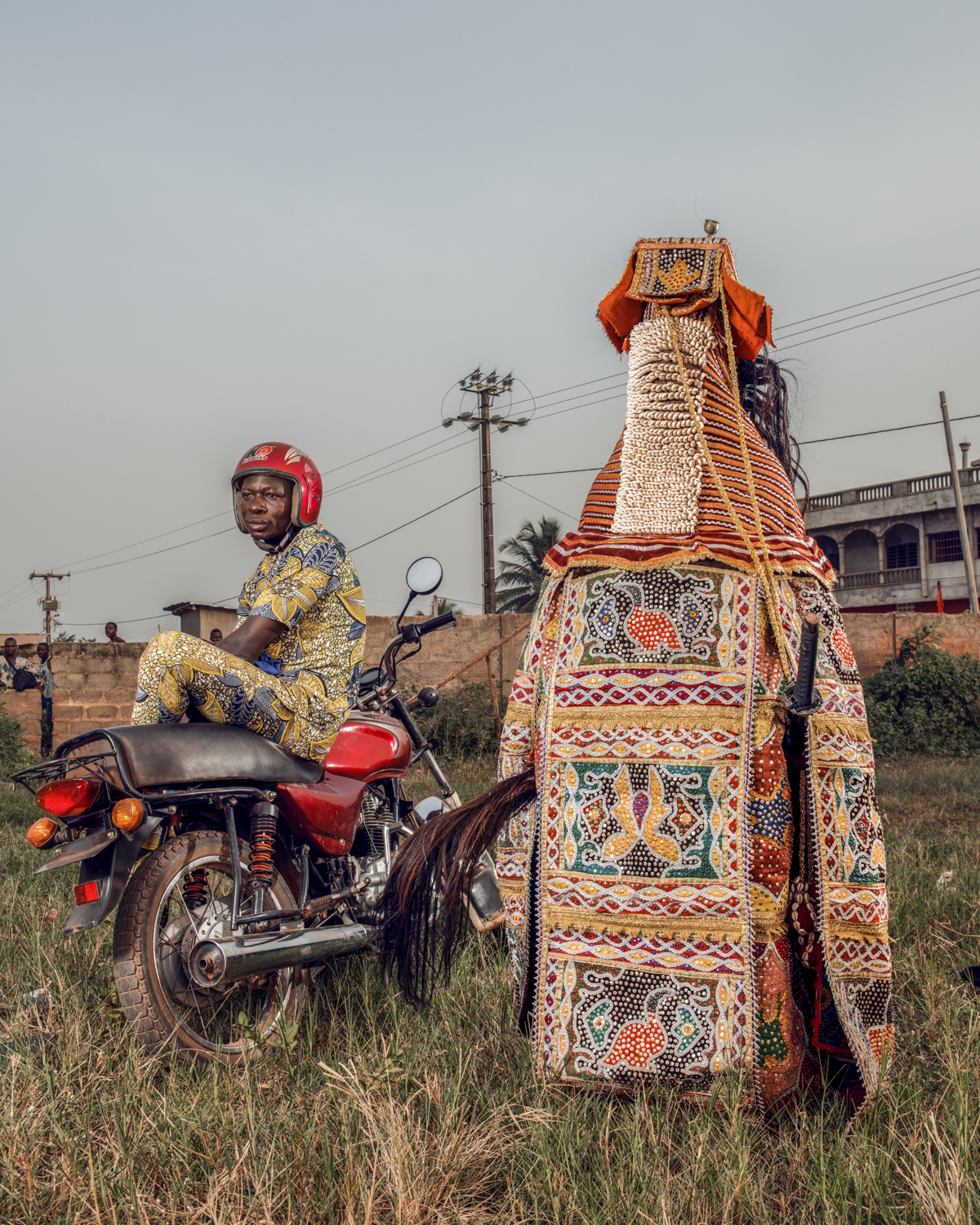
Egungun: Ancestor worship
In Africa, the dead of the family must be honored. For in many African cultures, death does not really exist; the spirit leaves the body to continue its life in the world of the dead, that of the ancestors.
Among the Yoruba, these dead manifest themselves to their descendants through an entity called EGOUN.
It is the spirit of the dead who returns to earth under beautiful loincloths decorated with applications of cut fabric, embroidered and adorned with shells and sequins, bone, and magic wood.
Family and clan societies, strictly reserved for men, have been formed around Egoun the revenant. They evoke the dead, call them and take care of them on earth.
Égoun serves as an intermediary with the souls in the afterlife.
He appears to certain families a few days after the death of one of its members, or during ceremonies performed to honor their memory; he also comes to bring the blessing of the ancestors to the marriages of their descendants and, in certain cases, to welcome a newborn child.
Offerings of food, drink and money are always made to him during his appearances.
EGOUN speaks with a deep, husky voice and dances readily to the sound of Bata or Ogbon drums.
The contact of his loincloth can be fatal to the living, so the MARIWOS (the guardians), members of the EGOUN society, always accompany them, carrying large engraved wooden sticks (lshan) to ward off the unwary. This stick symbolizes the border between the world of the dead (Kou-tome) and the world of the living. Ancestor worship in Africa is directed only to that part of the family that does not go back beyond the founder of the village or the house, that is, to the dynasty of the owners of the inhabited place.
With the exception of the royal families whose members are often deified and therefore have a more important lineage.
This cult is addressed to the deified ancestors and forms a vast system that unites the dead and the living in a continuous and united family whole.
The gods and the dead mix with the living, listen to their complaints, advise them, grant them graces, solve their difficulties and give them remedies for their pains and consolations for their misfortunes. The celestial world is not distant, nor is it superior, and the believer can speak directly with his gods and with his ancestors and benefit from their benevolence.
Each Yoruba clan honors its deceased ancestors in the hope of benefiting from their protection, avoiding their wrath, and keeping the ghosts away from the living.
He therefore regularly brings back the spirit of the ancestors from the realm of the dead (Kou-Tomé)
Each family clan of the ancestor cult has a convent.
It is a sacred place where the masks of the ghosts are kept. It is there that the adepts are trained in secret and that they put on the masks during the ceremonies.
The clan designates those who will be initiated and will have the responsibility of lending their bodies to the spirits of the ancestors and thus, will ensure the dialogue with the ancestors who have become protective deities.
Thus, one or more members of the family are designated, sometimes very young, to be these messengers of the afterlife.
They are taught in secret in a convent for several years, even decades.
There they learn the trance necessary to lend their bodies to the deities, a language that allows them to communicate with the invisible, and to create an appearance...
They emerge from it initiated to the rank of Egungun.
Apart from the initiates, no one knows who is Egungun because during the trances, they appear masked, their bodies totally hidden by their ceremonial costume.
The convent is exclusively reserved for initiates and men, on pain of death. The convent is directed by the Bale, who is generally the head of the family.
The general Alagba is the supreme chief, the king of the Egungun of a city, he watches over the convents of the city.
Egungun: Ancestor worship
In Africa, the dead of the family must be honored. For in many African cultures, death does not really exist; the spirit leaves the body to continue its life in the world of the dead, that of the ancestors.
Among the Yoruba, these dead manifest themselves to their descendants through an entity called EGOUN.
It is the spirit of the dead who returns to earth under beautiful loincloths decorated with applications of cut fabric, embroidered and adorned with shells and sequins, bone, and magic wood.
Family and clan societies, strictly reserved for men, have been formed around Egoun the revenant. They evoke the dead, call them and take care of them on earth.
Égoun serves as an intermediary with the souls in the afterlife.
He appears to certain families a few days after the death of one of its members, or during ceremonies performed to honor their memory; he also comes to bring the blessing of the ancestors to the marriages of their descendants and, in certain cases, to welcome a newborn child.
Offerings of food, drink and money are always made to him during his appearances.
EGOUN speaks with a deep, husky voice and dances readily to the sound of Bata or Ogbon drums.
The contact of his loincloth can be fatal to the living, so the MARIWOS (the guardians), members of the EGOUN society, always accompany them, carrying large engraved wooden sticks (lshan) to ward off the unwary. This stick symbolizes the border between the world of the dead (Kou-tome) and the world of the living. Ancestor worship in Africa is directed only to that part of the family that does not go back beyond the founder of the village or the house, that is, to the dynasty of the owners of the inhabited place.
With the exception of the royal families whose members are often deified and therefore have a more important lineage.
This cult is addressed to the deified ancestors and forms a vast system that unites the dead and the living in a continuous and united family whole.
The gods and the dead mix with the living, listen to their complaints, advise them, grant them graces, solve their difficulties and give them remedies for their pains and consolations for their misfortunes. The celestial world is not distant, nor is it superior, and the believer can speak directly with his gods and with his ancestors and benefit from their benevolence.
Each Yoruba clan honors its deceased ancestors in the hope of benefiting from their protection, avoiding their wrath, and keeping the ghosts away from the living.
He therefore regularly brings back the spirit of the ancestors from the realm of the dead (Kou-Tomé)
Each family clan of the ancestor cult has a convent.
It is a sacred place where the masks of the ghosts are kept. It is there that the adepts are trained in secret and that they put on the masks during the ceremonies.
The clan designates those who will be initiated and will have the responsibility of lending their bodies to the spirits of the ancestors and thus, will ensure the dialogue with the ancestors who have become protective deities.
Thus, one or more members of the family are designated, sometimes very young, to be these messengers of the afterlife.
They are taught in secret in a convent for several years, even decades.
There they learn the trance necessary to lend their bodies to the deities, a language that allows them to communicate with the invisible, and to create an appearance...
They emerge from it initiated to the rank of Egungun.
Apart from the initiates, no one knows who is Egungun because during the trances, they appear masked, their bodies totally hidden by their ceremonial costume.
The convent is exclusively reserved for initiates and men, on pain of death. The convent is directed by the Bale, who is generally the head of the family.
The general Alagba is the supreme chief, the king of the Egungun of a city, he watches over the convents of the city.
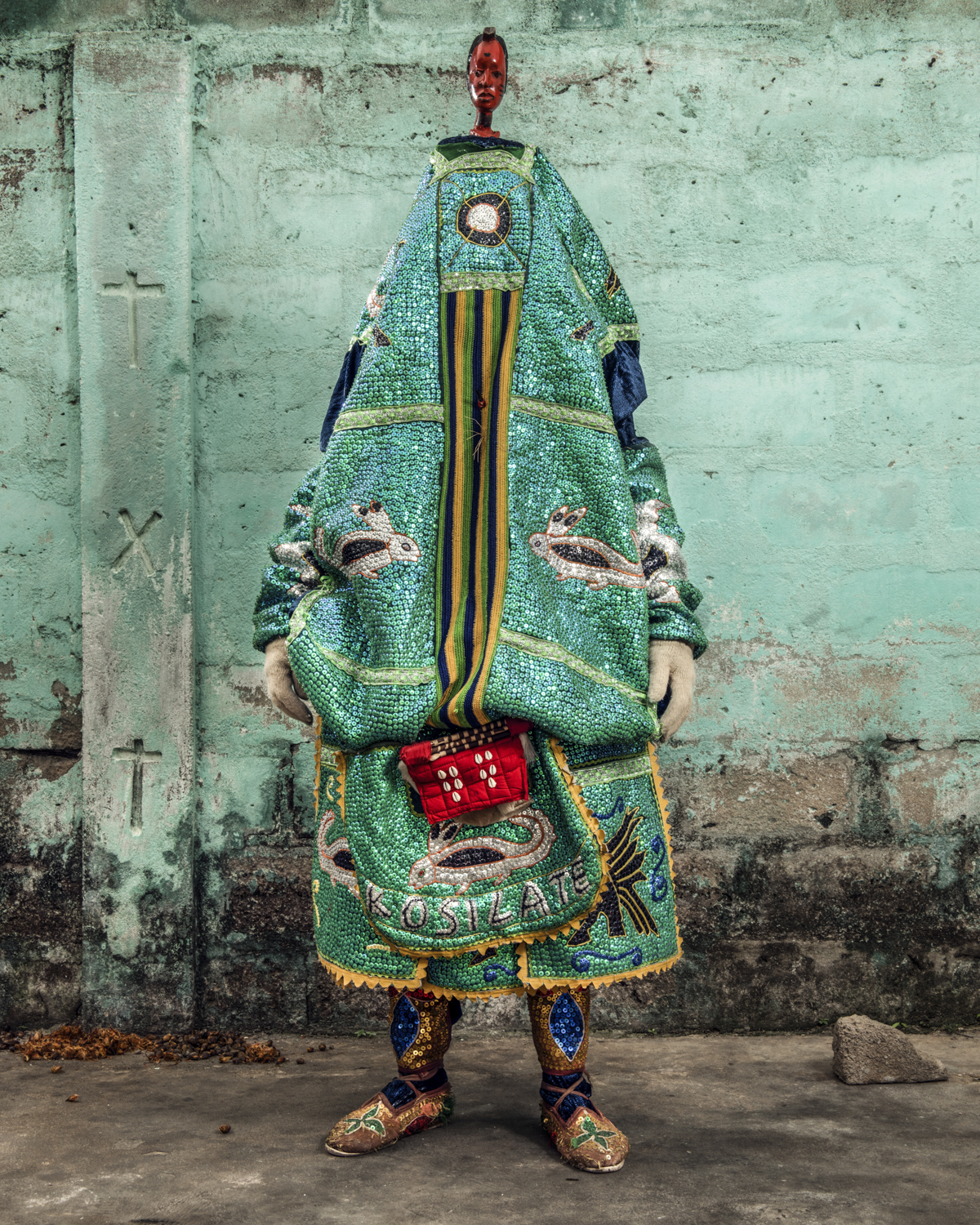
Egungun: Ancestor worship
In Africa, the dead of the family must be honored. For in many African cultures, death does not really exist; the spirit leaves the body to continue its life in the world of the dead, that of the ancestors.
Among the Yoruba, these dead manifest themselves to their descendants through an entity called EGOUN.
It is the spirit of the dead who returns to earth under beautiful loincloths decorated with applications of cut fabric, embroidered and adorned with shells and sequins, bone, and magic wood.
Family and clan societies, strictly reserved for men, have been formed around Egoun the revenant. They evoke the dead, call them and take care of them on earth.
Égoun serves as an intermediary with the souls in the afterlife.
He appears to certain families a few days after the death of one of its members, or during ceremonies performed to honor their memory; he also comes to bring the blessing of the ancestors to the marriages of their descendants and, in certain cases, to welcome a newborn child.
Offerings of food, drink and money are always made to him during his appearances.
EGOUN speaks with a deep, husky voice and dances readily to the sound of Bata or Ogbon drums.
The contact of his loincloth can be fatal to the living, so the MARIWOS (the guardians), members of the EGOUN society, always accompany them, carrying large engraved wooden sticks (lshan) to ward off the unwary. This stick symbolizes the border between the world of the dead (Kou-tome) and the world of the living. Ancestor worship in Africa is directed only to that part of the family that does not go back beyond the founder of the village or the house, that is, to the dynasty of the owners of the inhabited place.
With the exception of the royal families whose members are often deified and therefore have a more important lineage.
This cult is addressed to the deified ancestors and forms a vast system that unites the dead and the living in a continuous and united family whole.
The gods and the dead mix with the living, listen to their complaints, advise them, grant them graces, solve their difficulties and give them remedies for their pains and consolations for their misfortunes. The celestial world is not distant, nor is it superior, and the believer can speak directly with his gods and with his ancestors and benefit from their benevolence.
Each Yoruba clan honors its deceased ancestors in the hope of benefiting from their protection, avoiding their wrath, and keeping the ghosts away from the living.
He therefore regularly brings back the spirit of the ancestors from the realm of the dead (Kou-Tomé)
Each family clan of the ancestor cult has a convent.
It is a sacred place where the masks of the ghosts are kept. It is there that the adepts are trained in secret and that they put on the masks during the ceremonies.
The clan designates those who will be initiated and will have the responsibility of lending their bodies to the spirits of the ancestors and thus, will ensure the dialogue with the ancestors who have become protective deities.
Thus, one or more members of the family are designated, sometimes very young, to be these messengers of the afterlife.
They are taught in secret in a convent for several years, even decades.
There they learn the trance necessary to lend their bodies to the deities, a language that allows them to communicate with the invisible, and to create an appearance...
They emerge from it initiated to the rank of Egungun.
Apart from the initiates, no one knows who is Egungun because during the trances, they appear masked, their bodies totally hidden by their ceremonial costume.
The convent is exclusively reserved for initiates and men, on pain of death. The convent is directed by the Bale, who is generally the head of the family.
The general Alagba is the supreme chief, the king of the Egungun of a city, he watches over the convents of the city.
Egungun: Ancestor worship
In Africa, the dead of the family must be honored. For in many African cultures, death does not really exist; the spirit leaves the body to continue its life in the world of the dead, that of the ancestors.
Among the Yoruba, these dead manifest themselves to their descendants through an entity called EGOUN.
It is the spirit of the dead who returns to earth under beautiful loincloths decorated with applications of cut fabric, embroidered and adorned with shells and sequins, bone, and magic wood.
Family and clan societies, strictly reserved for men, have been formed around Egoun the revenant. They evoke the dead, call them and take care of them on earth.
Égoun serves as an intermediary with the souls in the afterlife.
He appears to certain families a few days after the death of one of its members, or during ceremonies performed to honor their memory; he also comes to bring the blessing of the ancestors to the marriages of their descendants and, in certain cases, to welcome a newborn child.
Offerings of food, drink and money are always made to him during his appearances.
EGOUN speaks with a deep, husky voice and dances readily to the sound of Bata or Ogbon drums.
The contact of his loincloth can be fatal to the living, so the MARIWOS (the guardians), members of the EGOUN society, always accompany them, carrying large engraved wooden sticks (lshan) to ward off the unwary. This stick symbolizes the border between the world of the dead (Kou-tome) and the world of the living. Ancestor worship in Africa is directed only to that part of the family that does not go back beyond the founder of the village or the house, that is, to the dynasty of the owners of the inhabited place.
With the exception of the royal families whose members are often deified and therefore have a more important lineage.
This cult is addressed to the deified ancestors and forms a vast system that unites the dead and the living in a continuous and united family whole.
The gods and the dead mix with the living, listen to their complaints, advise them, grant them graces, solve their difficulties and give them remedies for their pains and consolations for their misfortunes. The celestial world is not distant, nor is it superior, and the believer can speak directly with his gods and with his ancestors and benefit from their benevolence.
Each Yoruba clan honors its deceased ancestors in the hope of benefiting from their protection, avoiding their wrath, and keeping the ghosts away from the living.
He therefore regularly brings back the spirit of the ancestors from the realm of the dead (Kou-Tomé)
Each family clan of the ancestor cult has a convent.
It is a sacred place where the masks of the ghosts are kept. It is there that the adepts are trained in secret and that they put on the masks during the ceremonies.
The clan designates those who will be initiated and will have the responsibility of lending their bodies to the spirits of the ancestors and thus, will ensure the dialogue with the ancestors who have become protective deities.
Thus, one or more members of the family are designated, sometimes very young, to be these messengers of the afterlife.
They are taught in secret in a convent for several years, even decades.
There they learn the trance necessary to lend their bodies to the deities, a language that allows them to communicate with the invisible, and to create an appearance...
They emerge from it initiated to the rank of Egungun.
Apart from the initiates, no one knows who is Egungun because during the trances, they appear masked, their bodies totally hidden by their ceremonial costume.
The convent is exclusively reserved for initiates and men, on pain of death. The convent is directed by the Bale, who is generally the head of the family.
The general Alagba is the supreme chief, the king of the Egungun of a city, he watches over the convents of the city.
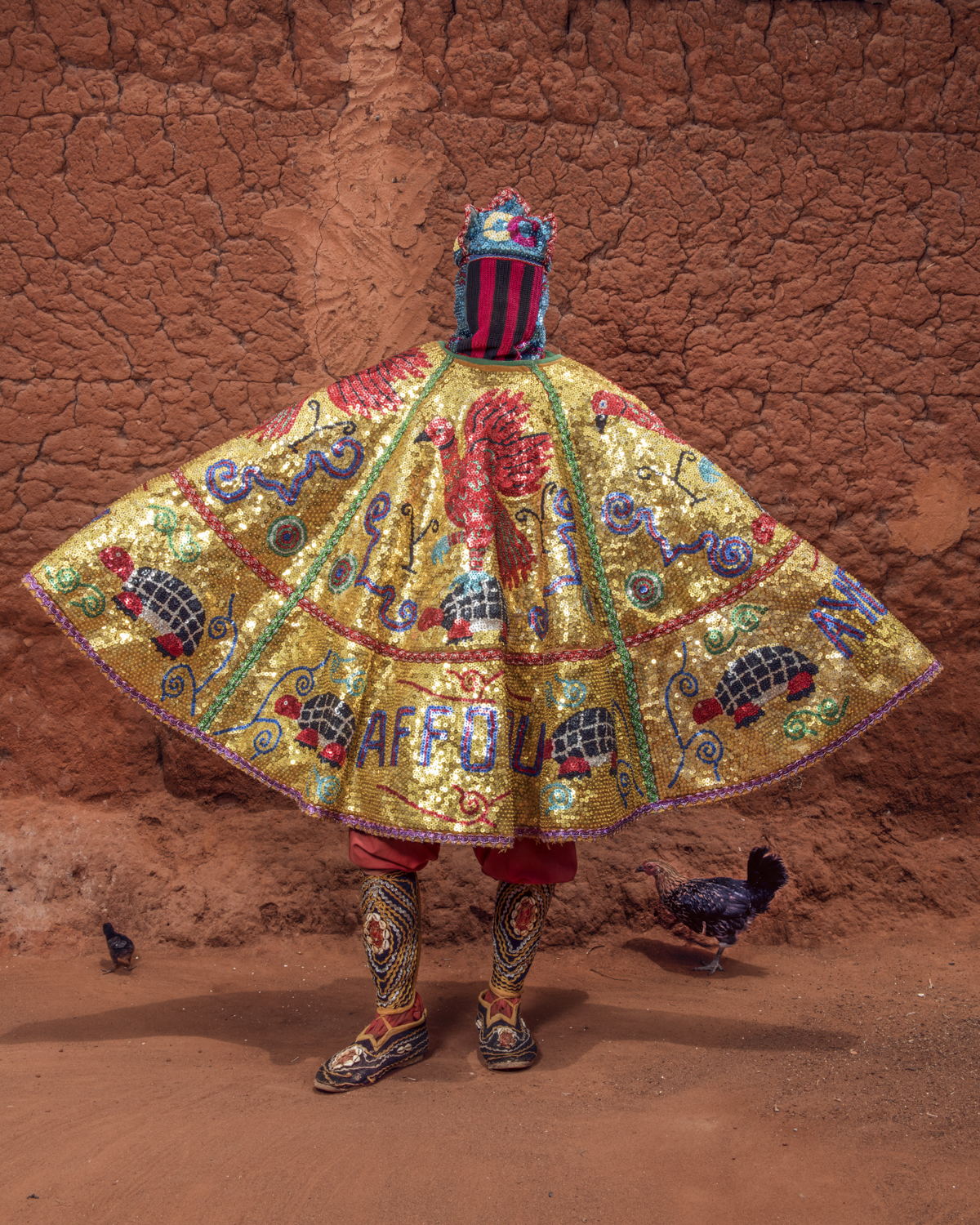
Egungun: Ancestor worship
In Africa, the dead of the family must be honored. For in many African cultures, death does not really exist; the spirit leaves the body to continue its life in the world of the dead, that of the ancestors.
Among the Yoruba, these dead manifest themselves to their descendants through an entity called EGOUN.
It is the spirit of the dead who returns to earth under beautiful loincloths decorated with applications of cut fabric, embroidered and adorned with shells and sequins, bone, and magic wood.
Family and clan societies, strictly reserved for men, have been formed around Egoun the revenant. They evoke the dead, call them and take care of them on earth.
Égoun serves as an intermediary with the souls in the afterlife.
He appears to certain families a few days after the death of one of its members, or during ceremonies performed to honor their memory; he also comes to bring the blessing of the ancestors to the marriages of their descendants and, in certain cases, to welcome a newborn child.
Offerings of food, drink and money are always made to him during his appearances.
EGOUN speaks with a deep, husky voice and dances readily to the sound of Bata or Ogbon drums.
The contact of his loincloth can be fatal to the living, so the MARIWOS (the guardians), members of the EGOUN society, always accompany them, carrying large engraved wooden sticks (lshan) to ward off the unwary. This stick symbolizes the border between the world of the dead (Kou-tome) and the world of the living. Ancestor worship in Africa is directed only to that part of the family that does not go back beyond the founder of the village or the house, that is, to the dynasty of the owners of the inhabited place.
With the exception of the royal families whose members are often deified and therefore have a more important lineage.
This cult is addressed to the deified ancestors and forms a vast system that unites the dead and the living in a continuous and united family whole.
The gods and the dead mix with the living, listen to their complaints, advise them, grant them graces, solve their difficulties and give them remedies for their pains and consolations for their misfortunes. The celestial world is not distant, nor is it superior, and the believer can speak directly with his gods and with his ancestors and benefit from their benevolence.
Each Yoruba clan honors its deceased ancestors in the hope of benefiting from their protection, avoiding their wrath, and keeping the ghosts away from the living.
He therefore regularly brings back the spirit of the ancestors from the realm of the dead (Kou-Tomé)
Each family clan of the ancestor cult has a convent.
It is a sacred place where the masks of the ghosts are kept. It is there that the adepts are trained in secret and that they put on the masks during the ceremonies.
The clan designates those who will be initiated and will have the responsibility of lending their bodies to the spirits of the ancestors and thus, will ensure the dialogue with the ancestors who have become protective deities.
Thus, one or more members of the family are designated, sometimes very young, to be these messengers of the afterlife.
They are taught in secret in a convent for several years, even decades.
There they learn the trance necessary to lend their bodies to the deities, a language that allows them to communicate with the invisible, and to create an appearance...
They emerge from it initiated to the rank of Egungun.
Apart from the initiates, no one knows who is Egungun because during the trances, they appear masked, their bodies totally hidden by their ceremonial costume.
The convent is exclusively reserved for initiates and men, on pain of death. The convent is directed by the Bale, who is generally the head of the family.
The general Alagba is the supreme chief, the king of the Egungun of a city, he watches over the convents of the city.
Egungun: Ancestor worship
In Africa, the dead of the family must be honored. For in many African cultures, death does not really exist; the spirit leaves the body to continue its life in the world of the dead, that of the ancestors.
Among the Yoruba, these dead manifest themselves to their descendants through an entity called EGOUN.
It is the spirit of the dead who returns to earth under beautiful loincloths decorated with applications of cut fabric, embroidered and adorned with shells and sequins, bone, and magic wood.
Family and clan societies, strictly reserved for men, have been formed around Egoun the revenant. They evoke the dead, call them and take care of them on earth.
Égoun serves as an intermediary with the souls in the afterlife.
He appears to certain families a few days after the death of one of its members, or during ceremonies performed to honor their memory; he also comes to bring the blessing of the ancestors to the marriages of their descendants and, in certain cases, to welcome a newborn child.
Offerings of food, drink and money are always made to him during his appearances.
EGOUN speaks with a deep, husky voice and dances readily to the sound of Bata or Ogbon drums.
The contact of his loincloth can be fatal to the living, so the MARIWOS (the guardians), members of the EGOUN society, always accompany them, carrying large engraved wooden sticks (lshan) to ward off the unwary. This stick symbolizes the border between the world of the dead (Kou-tome) and the world of the living. Ancestor worship in Africa is directed only to that part of the family that does not go back beyond the founder of the village or the house, that is, to the dynasty of the owners of the inhabited place.
With the exception of the royal families whose members are often deified and therefore have a more important lineage.
This cult is addressed to the deified ancestors and forms a vast system that unites the dead and the living in a continuous and united family whole.
The gods and the dead mix with the living, listen to their complaints, advise them, grant them graces, solve their difficulties and give them remedies for their pains and consolations for their misfortunes. The celestial world is not distant, nor is it superior, and the believer can speak directly with his gods and with his ancestors and benefit from their benevolence.
Each Yoruba clan honors its deceased ancestors in the hope of benefiting from their protection, avoiding their wrath, and keeping the ghosts away from the living.
He therefore regularly brings back the spirit of the ancestors from the realm of the dead (Kou-Tomé)
Each family clan of the ancestor cult has a convent.
It is a sacred place where the masks of the ghosts are kept. It is there that the adepts are trained in secret and that they put on the masks during the ceremonies.
The clan designates those who will be initiated and will have the responsibility of lending their bodies to the spirits of the ancestors and thus, will ensure the dialogue with the ancestors who have become protective deities.
Thus, one or more members of the family are designated, sometimes very young, to be these messengers of the afterlife.
They are taught in secret in a convent for several years, even decades.
There they learn the trance necessary to lend their bodies to the deities, a language that allows them to communicate with the invisible, and to create an appearance...
They emerge from it initiated to the rank of Egungun.
Apart from the initiates, no one knows who is Egungun because during the trances, they appear masked, their bodies totally hidden by their ceremonial costume.
The convent is exclusively reserved for initiates and men, on pain of death. The convent is directed by the Bale, who is generally the head of the family.
The general Alagba is the supreme chief, the king of the Egungun of a city, he watches over the convents of the city.
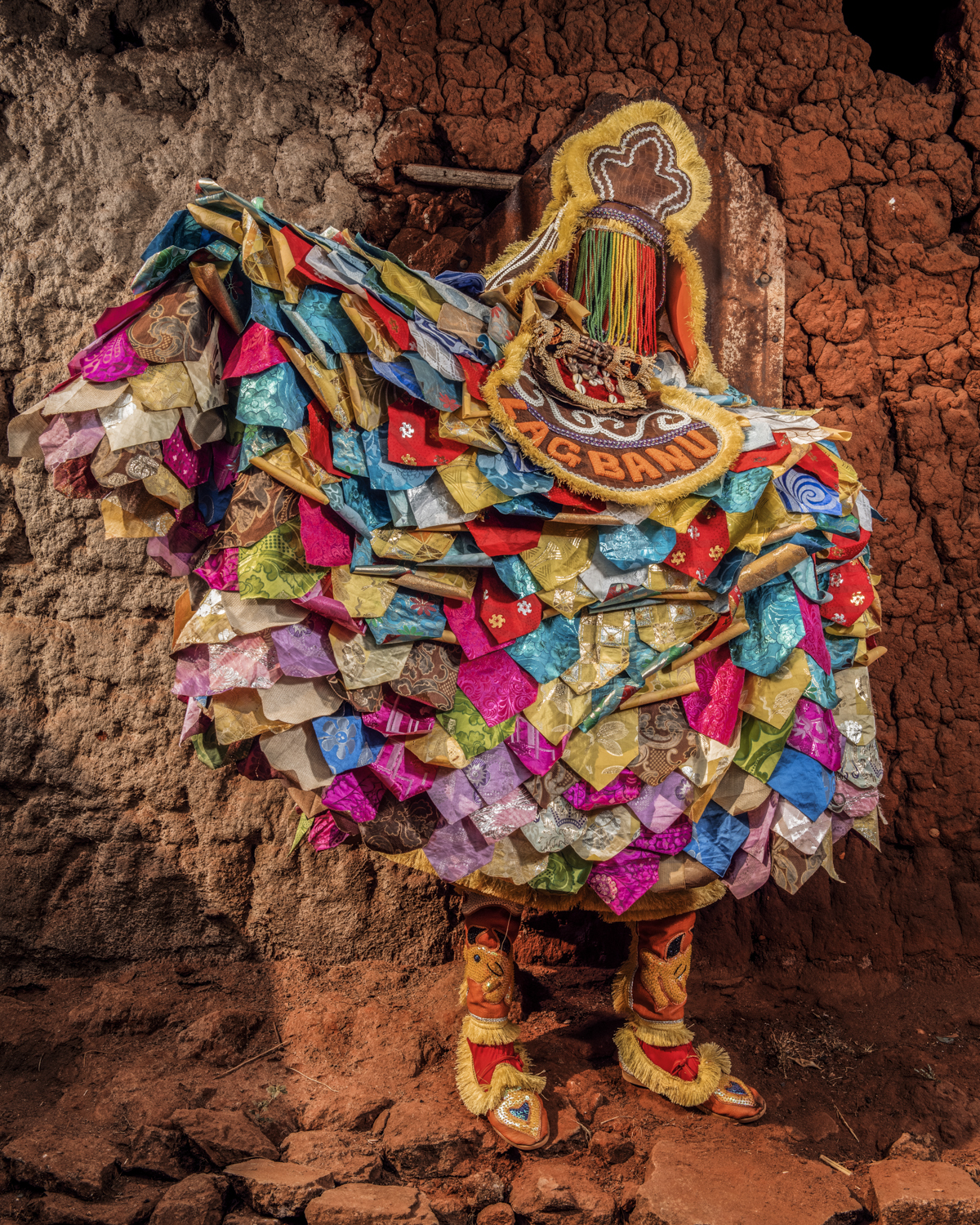
Egungun: Ancestor worship
In Africa, the dead of the family must be honored. For in many African cultures, death does not really exist; the spirit leaves the body to continue its life in the world of the dead, that of the ancestors.
Among the Yoruba, these dead manifest themselves to their descendants through an entity called EGOUN.
It is the spirit of the dead who returns to earth under beautiful loincloths decorated with applications of cut fabric, embroidered and adorned with shells and sequins, bone, and magic wood.
Family and clan societies, strictly reserved for men, have been formed around Egoun the revenant. They evoke the dead, call them and take care of them on earth.
Égoun serves as an intermediary with the souls in the afterlife.
He appears to certain families a few days after the death of one of its members, or during ceremonies performed to honor their memory; he also comes to bring the blessing of the ancestors to the marriages of their descendants and, in certain cases, to welcome a newborn child.
Offerings of food, drink and money are always made to him during his appearances.
EGOUN speaks with a deep, husky voice and dances readily to the sound of Bata or Ogbon drums.
The contact of his loincloth can be fatal to the living, so the MARIWOS (the guardians), members of the EGOUN society, always accompany them, carrying large engraved wooden sticks (lshan) to ward off the unwary. This stick symbolizes the border between the world of the dead (Kou-tome) and the world of the living. Ancestor worship in Africa is directed only to that part of the family that does not go back beyond the founder of the village or the house, that is, to the dynasty of the owners of the inhabited place.
With the exception of the royal families whose members are often deified and therefore have a more important lineage.
This cult is addressed to the deified ancestors and forms a vast system that unites the dead and the living in a continuous and united family whole.
The gods and the dead mix with the living, listen to their complaints, advise them, grant them graces, solve their difficulties and give them remedies for their pains and consolations for their misfortunes. The celestial world is not distant, nor is it superior, and the believer can speak directly with his gods and with his ancestors and benefit from their benevolence.
Each Yoruba clan honors its deceased ancestors in the hope of benefiting from their protection, avoiding their wrath, and keeping the ghosts away from the living.
He therefore regularly brings back the spirit of the ancestors from the realm of the dead (Kou-Tomé)
Each family clan of the ancestor cult has a convent.
It is a sacred place where the masks of the ghosts are kept. It is there that the adepts are trained in secret and that they put on the masks during the ceremonies.
The clan designates those who will be initiated and will have the responsibility of lending their bodies to the spirits of the ancestors and thus, will ensure the dialogue with the ancestors who have become protective deities.
Thus, one or more members of the family are designated, sometimes very young, to be these messengers of the afterlife.
They are taught in secret in a convent for several years, even decades.
There they learn the trance necessary to lend their bodies to the deities, a language that allows them to communicate with the invisible, and to create an appearance...
They emerge from it initiated to the rank of Egungun.
Apart from the initiates, no one knows who is Egungun because during the trances, they appear masked, their bodies totally hidden by their ceremonial costume.
The convent is exclusively reserved for initiates and men, on pain of death. The convent is directed by the Bale, who is generally the head of the family.
The general Alagba is the supreme chief, the king of the Egungun of a city, he watches over the convents of the city.
Egungun: Ancestor worship
In Africa, the dead of the family must be honored. For in many African cultures, death does not really exist; the spirit leaves the body to continue its life in the world of the dead, that of the ancestors.
Among the Yoruba, these dead manifest themselves to their descendants through an entity called EGOUN.
It is the spirit of the dead who returns to earth under beautiful loincloths decorated with applications of cut fabric, embroidered and adorned with shells and sequins, bone, and magic wood.
Family and clan societies, strictly reserved for men, have been formed around Egoun the revenant. They evoke the dead, call them and take care of them on earth.
Égoun serves as an intermediary with the souls in the afterlife.
He appears to certain families a few days after the death of one of its members, or during ceremonies performed to honor their memory; he also comes to bring the blessing of the ancestors to the marriages of their descendants and, in certain cases, to welcome a newborn child.
Offerings of food, drink and money are always made to him during his appearances.
EGOUN speaks with a deep, husky voice and dances readily to the sound of Bata or Ogbon drums.
The contact of his loincloth can be fatal to the living, so the MARIWOS (the guardians), members of the EGOUN society, always accompany them, carrying large engraved wooden sticks (lshan) to ward off the unwary. This stick symbolizes the border between the world of the dead (Kou-tome) and the world of the living. Ancestor worship in Africa is directed only to that part of the family that does not go back beyond the founder of the village or the house, that is, to the dynasty of the owners of the inhabited place.
With the exception of the royal families whose members are often deified and therefore have a more important lineage.
This cult is addressed to the deified ancestors and forms a vast system that unites the dead and the living in a continuous and united family whole.
The gods and the dead mix with the living, listen to their complaints, advise them, grant them graces, solve their difficulties and give them remedies for their pains and consolations for their misfortunes. The celestial world is not distant, nor is it superior, and the believer can speak directly with his gods and with his ancestors and benefit from their benevolence.
Each Yoruba clan honors its deceased ancestors in the hope of benefiting from their protection, avoiding their wrath, and keeping the ghosts away from the living.
He therefore regularly brings back the spirit of the ancestors from the realm of the dead (Kou-Tomé)
Each family clan of the ancestor cult has a convent.
It is a sacred place where the masks of the ghosts are kept. It is there that the adepts are trained in secret and that they put on the masks during the ceremonies.
The clan designates those who will be initiated and will have the responsibility of lending their bodies to the spirits of the ancestors and thus, will ensure the dialogue with the ancestors who have become protective deities.
Thus, one or more members of the family are designated, sometimes very young, to be these messengers of the afterlife.
They are taught in secret in a convent for several years, even decades.
There they learn the trance necessary to lend their bodies to the deities, a language that allows them to communicate with the invisible, and to create an appearance...
They emerge from it initiated to the rank of Egungun.
Apart from the initiates, no one knows who is Egungun because during the trances, they appear masked, their bodies totally hidden by their ceremonial costume.
The convent is exclusively reserved for initiates and men, on pain of death. The convent is directed by the Bale, who is generally the head of the family.
The general Alagba is the supreme chief, the king of the Egungun of a city, he watches over the convents of the city.
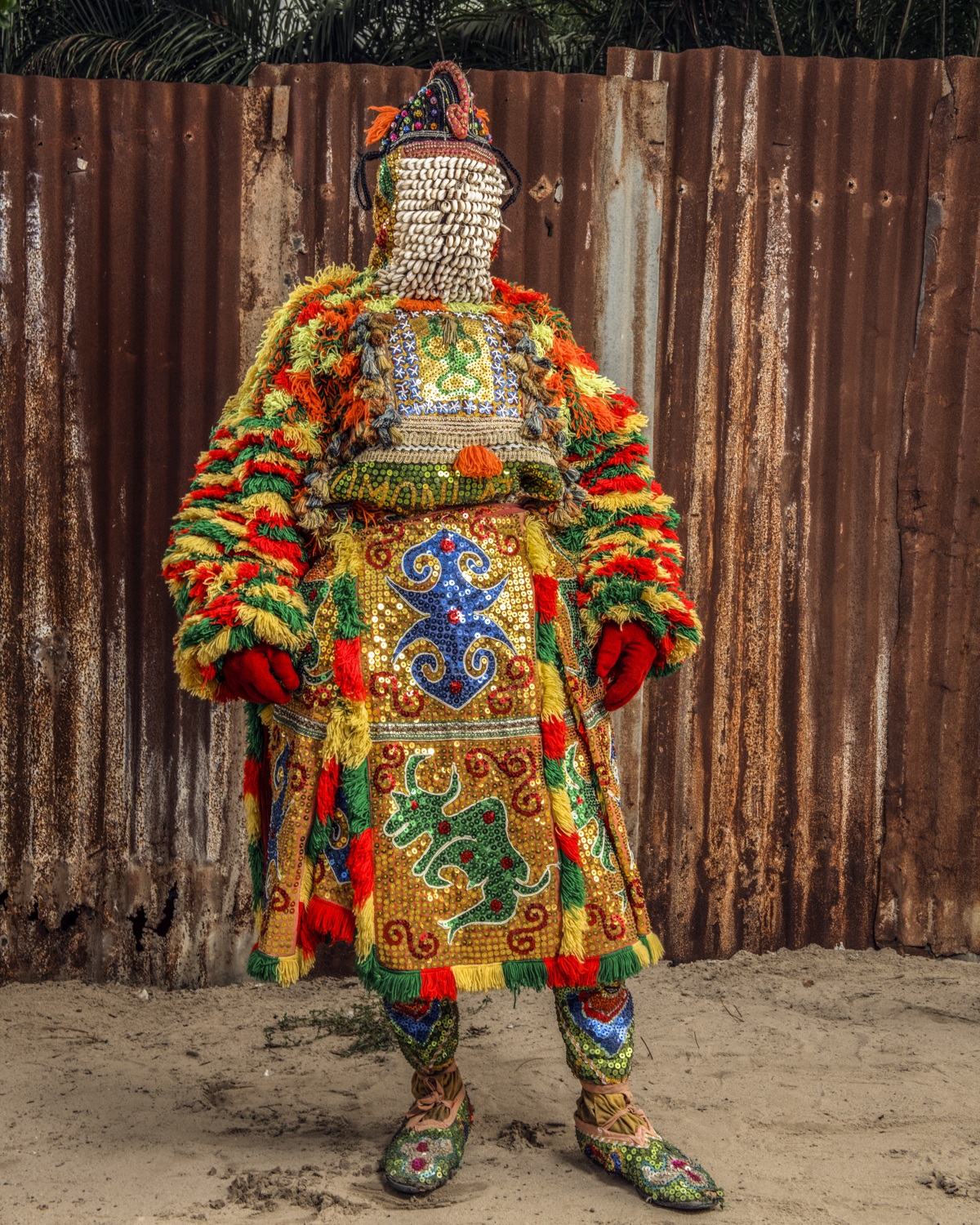
Egungun: Ancestor worship
In Africa, the dead of the family must be honored. For in many African cultures, death does not really exist; the spirit leaves the body to continue its life in the world of the dead, that of the ancestors.
Among the Yoruba, these dead manifest themselves to their descendants through an entity called EGOUN.
It is the spirit of the dead who returns to earth under beautiful loincloths decorated with applications of cut fabric, embroidered and adorned with shells and sequins, bone, and magic wood.
Family and clan societies, strictly reserved for men, have been formed around Egoun the revenant. They evoke the dead, call them and take care of them on earth.
Égoun serves as an intermediary with the souls in the afterlife.
He appears to certain families a few days after the death of one of its members, or during ceremonies performed to honor their memory; he also comes to bring the blessing of the ancestors to the marriages of their descendants and, in certain cases, to welcome a newborn child.
Offerings of food, drink and money are always made to him during his appearances.
EGOUN speaks with a deep, husky voice and dances readily to the sound of Bata or Ogbon drums.
The contact of his loincloth can be fatal to the living, so the MARIWOS (the guardians), members of the EGOUN society, always accompany them, carrying large engraved wooden sticks (lshan) to ward off the unwary. This stick symbolizes the border between the world of the dead (Kou-tome) and the world of the living. Ancestor worship in Africa is directed only to that part of the family that does not go back beyond the founder of the village or the house, that is, to the dynasty of the owners of the inhabited place.
With the exception of the royal families whose members are often deified and therefore have a more important lineage.
This cult is addressed to the deified ancestors and forms a vast system that unites the dead and the living in a continuous and united family whole.
The gods and the dead mix with the living, listen to their complaints, advise them, grant them graces, solve their difficulties and give them remedies for their pains and consolations for their misfortunes. The celestial world is not distant, nor is it superior, and the believer can speak directly with his gods and with his ancestors and benefit from their benevolence.
Each Yoruba clan honors its deceased ancestors in the hope of benefiting from their protection, avoiding their wrath, and keeping the ghosts away from the living.
He therefore regularly brings back the spirit of the ancestors from the realm of the dead (Kou-Tomé)
Each family clan of the ancestor cult has a convent.
It is a sacred place where the masks of the ghosts are kept. It is there that the adepts are trained in secret and that they put on the masks during the ceremonies.
The clan designates those who will be initiated and will have the responsibility of lending their bodies to the spirits of the ancestors and thus, will ensure the dialogue with the ancestors who have become protective deities.
Thus, one or more members of the family are designated, sometimes very young, to be these messengers of the afterlife.
They are taught in secret in a convent for several years, even decades.
There they learn the trance necessary to lend their bodies to the deities, a language that allows them to communicate with the invisible, and to create an appearance...
They emerge from it initiated to the rank of Egungun.
Apart from the initiates, no one knows who is Egungun because during the trances, they appear masked, their bodies totally hidden by their ceremonial costume.
The convent is exclusively reserved for initiates and men, on pain of death. The convent is directed by the Bale, who is generally the head of the family.
The general Alagba is the supreme chief, the king of the Egungun of a city, he watches over the convents of the city.
Egungun: Ancestor worship
In Africa, the dead of the family must be honored. For in many African cultures, death does not really exist; the spirit leaves the body to continue its life in the world of the dead, that of the ancestors.
Among the Yoruba, these dead manifest themselves to their descendants through an entity called EGOUN.
It is the spirit of the dead who returns to earth under beautiful loincloths decorated with applications of cut fabric, embroidered and adorned with shells and sequins, bone, and magic wood.
Family and clan societies, strictly reserved for men, have been formed around Egoun the revenant. They evoke the dead, call them and take care of them on earth.
Égoun serves as an intermediary with the souls in the afterlife.
He appears to certain families a few days after the death of one of its members, or during ceremonies performed to honor their memory; he also comes to bring the blessing of the ancestors to the marriages of their descendants and, in certain cases, to welcome a newborn child.
Offerings of food, drink and money are always made to him during his appearances.
EGOUN speaks with a deep, husky voice and dances readily to the sound of Bata or Ogbon drums.
The contact of his loincloth can be fatal to the living, so the MARIWOS (the guardians), members of the EGOUN society, always accompany them, carrying large engraved wooden sticks (lshan) to ward off the unwary. This stick symbolizes the border between the world of the dead (Kou-tome) and the world of the living. Ancestor worship in Africa is directed only to that part of the family that does not go back beyond the founder of the village or the house, that is, to the dynasty of the owners of the inhabited place.
With the exception of the royal families whose members are often deified and therefore have a more important lineage.
This cult is addressed to the deified ancestors and forms a vast system that unites the dead and the living in a continuous and united family whole.
The gods and the dead mix with the living, listen to their complaints, advise them, grant them graces, solve their difficulties and give them remedies for their pains and consolations for their misfortunes. The celestial world is not distant, nor is it superior, and the believer can speak directly with his gods and with his ancestors and benefit from their benevolence.
Each Yoruba clan honors its deceased ancestors in the hope of benefiting from their protection, avoiding their wrath, and keeping the ghosts away from the living.
He therefore regularly brings back the spirit of the ancestors from the realm of the dead (Kou-Tomé)
Each family clan of the ancestor cult has a convent.
It is a sacred place where the masks of the ghosts are kept. It is there that the adepts are trained in secret and that they put on the masks during the ceremonies.
The clan designates those who will be initiated and will have the responsibility of lending their bodies to the spirits of the ancestors and thus, will ensure the dialogue with the ancestors who have become protective deities.
Thus, one or more members of the family are designated, sometimes very young, to be these messengers of the afterlife.
They are taught in secret in a convent for several years, even decades.
There they learn the trance necessary to lend their bodies to the deities, a language that allows them to communicate with the invisible, and to create an appearance...
They emerge from it initiated to the rank of Egungun.
Apart from the initiates, no one knows who is Egungun because during the trances, they appear masked, their bodies totally hidden by their ceremonial costume.
The convent is exclusively reserved for initiates and men, on pain of death. The convent is directed by the Bale, who is generally the head of the family.
The general Alagba is the supreme chief, the king of the Egungun of a city, he watches over the convents of the city.
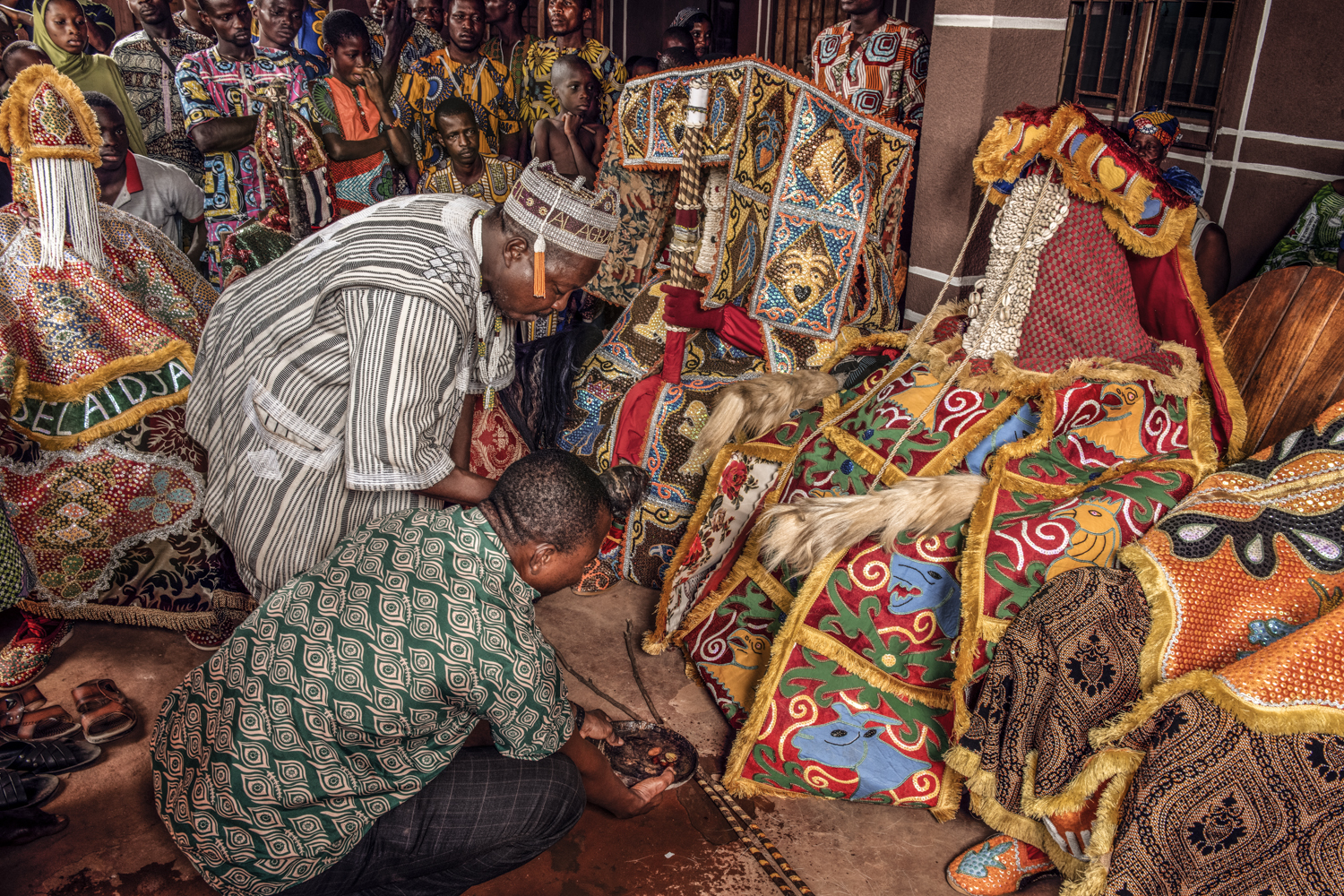
Egungun: Ancestor worship
In Africa, the dead of the family must be honored. For in many African cultures, death does not really exist; the spirit leaves the body to continue its life in the world of the dead, that of the ancestors.
Among the Yoruba, these dead manifest themselves to their descendants through an entity called EGOUN.
It is the spirit of the dead who returns to earth under beautiful loincloths decorated with applications of cut fabric, embroidered and adorned with shells and sequins, bone, and magic wood.
Family and clan societies, strictly reserved for men, have been formed around Egoun the revenant. They evoke the dead, call them and take care of them on earth.
Égoun serves as an intermediary with the souls in the afterlife.
He appears to certain families a few days after the death of one of its members, or during ceremonies performed to honor their memory; he also comes to bring the blessing of the ancestors to the marriages of their descendants and, in certain cases, to welcome a newborn child.
Offerings of food, drink and money are always made to him during his appearances.
EGOUN speaks with a deep, husky voice and dances readily to the sound of Bata or Ogbon drums.
The contact of his loincloth can be fatal to the living, so the MARIWOS (the guardians), members of the EGOUN society, always accompany them, carrying large engraved wooden sticks (lshan) to ward off the unwary. This stick symbolizes the border between the world of the dead (Kou-tome) and the world of the living. Ancestor worship in Africa is directed only to that part of the family that does not go back beyond the founder of the village or the house, that is, to the dynasty of the owners of the inhabited place.
With the exception of the royal families whose members are often deified and therefore have a more important lineage.
This cult is addressed to the deified ancestors and forms a vast system that unites the dead and the living in a continuous and united family whole.
The gods and the dead mix with the living, listen to their complaints, advise them, grant them graces, solve their difficulties and give them remedies for their pains and consolations for their misfortunes. The celestial world is not distant, nor is it superior, and the believer can speak directly with his gods and with his ancestors and benefit from their benevolence.
Each Yoruba clan honors its deceased ancestors in the hope of benefiting from their protection, avoiding their wrath, and keeping the ghosts away from the living.
He therefore regularly brings back the spirit of the ancestors from the realm of the dead (Kou-Tomé)
Each family clan of the ancestor cult has a convent.
It is a sacred place where the masks of the ghosts are kept. It is there that the adepts are trained in secret and that they put on the masks during the ceremonies.
The clan designates those who will be initiated and will have the responsibility of lending their bodies to the spirits of the ancestors and thus, will ensure the dialogue with the ancestors who have become protective deities.
Thus, one or more members of the family are designated, sometimes very young, to be these messengers of the afterlife.
They are taught in secret in a convent for several years, even decades.
There they learn the trance necessary to lend their bodies to the deities, a language that allows them to communicate with the invisible, and to create an appearance...
They emerge from it initiated to the rank of Egungun.
Apart from the initiates, no one knows who is Egungun because during the trances, they appear masked, their bodies totally hidden by their ceremonial costume.
The convent is exclusively reserved for initiates and men, on pain of death. The convent is directed by the Bale, who is generally the head of the family.
The general Alagba is the supreme chief, the king of the Egungun of a city, he watches over the convents of the city.
Egungun: Ancestor worship
In Africa, the dead of the family must be honored. For in many African cultures, death does not really exist; the spirit leaves the body to continue its life in the world of the dead, that of the ancestors.
Among the Yoruba, these dead manifest themselves to their descendants through an entity called EGOUN.
It is the spirit of the dead who returns to earth under beautiful loincloths decorated with applications of cut fabric, embroidered and adorned with shells and sequins, bone, and magic wood.
Family and clan societies, strictly reserved for men, have been formed around Egoun the revenant. They evoke the dead, call them and take care of them on earth.
Égoun serves as an intermediary with the souls in the afterlife.
He appears to certain families a few days after the death of one of its members, or during ceremonies performed to honor their memory; he also comes to bring the blessing of the ancestors to the marriages of their descendants and, in certain cases, to welcome a newborn child.
Offerings of food, drink and money are always made to him during his appearances.
EGOUN speaks with a deep, husky voice and dances readily to the sound of Bata or Ogbon drums.
The contact of his loincloth can be fatal to the living, so the MARIWOS (the guardians), members of the EGOUN society, always accompany them, carrying large engraved wooden sticks (lshan) to ward off the unwary. This stick symbolizes the border between the world of the dead (Kou-tome) and the world of the living. Ancestor worship in Africa is directed only to that part of the family that does not go back beyond the founder of the village or the house, that is, to the dynasty of the owners of the inhabited place.
With the exception of the royal families whose members are often deified and therefore have a more important lineage.
This cult is addressed to the deified ancestors and forms a vast system that unites the dead and the living in a continuous and united family whole.
The gods and the dead mix with the living, listen to their complaints, advise them, grant them graces, solve their difficulties and give them remedies for their pains and consolations for their misfortunes. The celestial world is not distant, nor is it superior, and the believer can speak directly with his gods and with his ancestors and benefit from their benevolence.
Each Yoruba clan honors its deceased ancestors in the hope of benefiting from their protection, avoiding their wrath, and keeping the ghosts away from the living.
He therefore regularly brings back the spirit of the ancestors from the realm of the dead (Kou-Tomé)
Each family clan of the ancestor cult has a convent.
It is a sacred place where the masks of the ghosts are kept. It is there that the adepts are trained in secret and that they put on the masks during the ceremonies.
The clan designates those who will be initiated and will have the responsibility of lending their bodies to the spirits of the ancestors and thus, will ensure the dialogue with the ancestors who have become protective deities.
Thus, one or more members of the family are designated, sometimes very young, to be these messengers of the afterlife.
They are taught in secret in a convent for several years, even decades.
There they learn the trance necessary to lend their bodies to the deities, a language that allows them to communicate with the invisible, and to create an appearance...
They emerge from it initiated to the rank of Egungun.
Apart from the initiates, no one knows who is Egungun because during the trances, they appear masked, their bodies totally hidden by their ceremonial costume.
The convent is exclusively reserved for initiates and men, on pain of death. The convent is directed by the Bale, who is generally the head of the family.
The general Alagba is the supreme chief, the king of the Egungun of a city, he watches over the convents of the city.
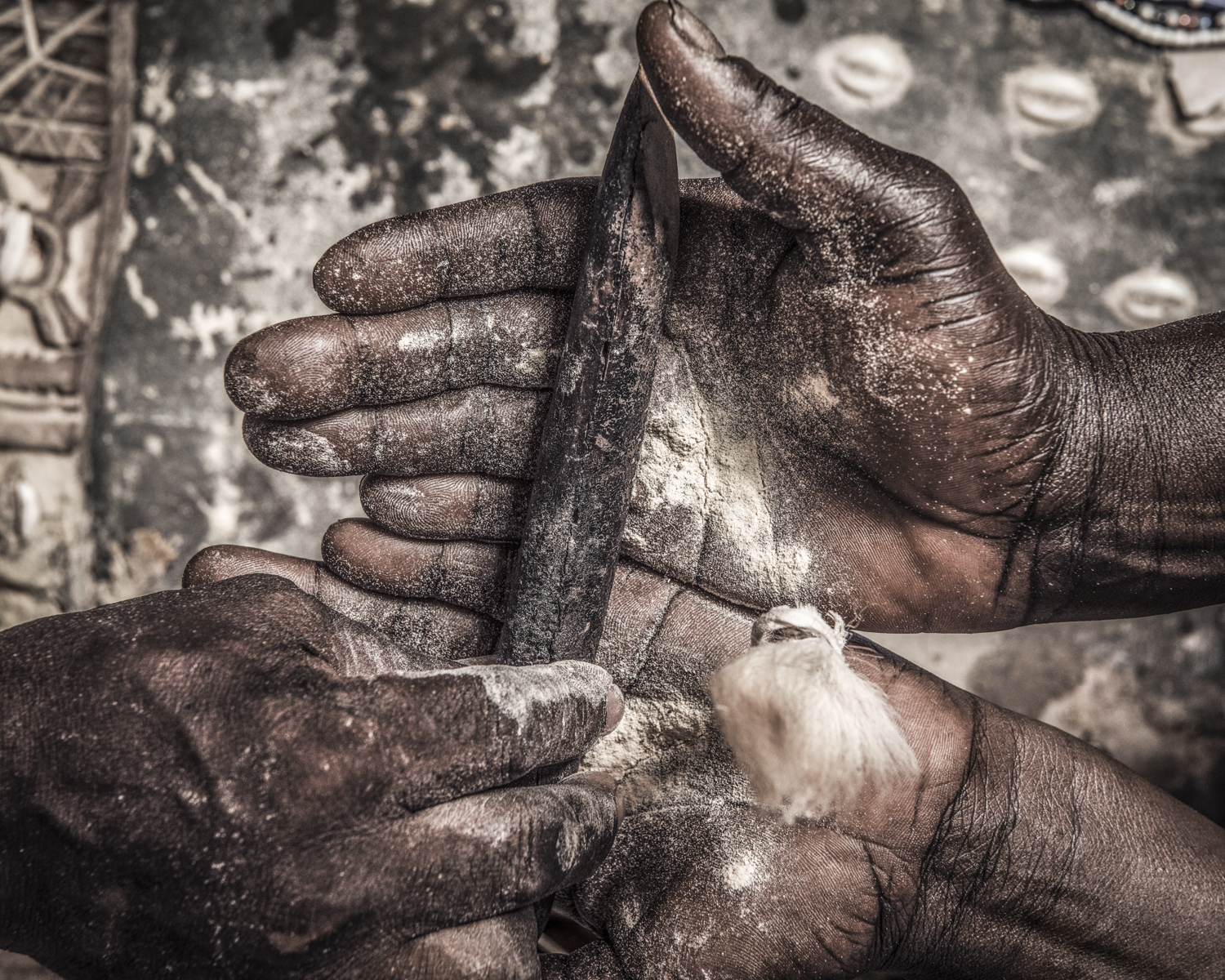
Egungun: Ancestor worship
In Africa, the dead of the family must be honored. For in many African cultures, death does not really exist; the spirit leaves the body to continue its life in the world of the dead, that of the ancestors.
Among the Yoruba, these dead manifest themselves to their descendants through an entity called EGOUN.
It is the spirit of the dead who returns to earth under beautiful loincloths decorated with applications of cut fabric, embroidered and adorned with shells and sequins, bone, and magic wood.
Family and clan societies, strictly reserved for men, have been formed around Egoun the revenant. They evoke the dead, call them and take care of them on earth.
Égoun serves as an intermediary with the souls in the afterlife.
He appears to certain families a few days after the death of one of its members, or during ceremonies performed to honor their memory; he also comes to bring the blessing of the ancestors to the marriages of their descendants and, in certain cases, to welcome a newborn child.
Offerings of food, drink and money are always made to him during his appearances.
EGOUN speaks with a deep, husky voice and dances readily to the sound of Bata or Ogbon drums.
The contact of his loincloth can be fatal to the living, so the MARIWOS (the guardians), members of the EGOUN society, always accompany them, carrying large engraved wooden sticks (lshan) to ward off the unwary. This stick symbolizes the border between the world of the dead (Kou-tome) and the world of the living. Ancestor worship in Africa is directed only to that part of the family that does not go back beyond the founder of the village or the house, that is, to the dynasty of the owners of the inhabited place.
With the exception of the royal families whose members are often deified and therefore have a more important lineage.
This cult is addressed to the deified ancestors and forms a vast system that unites the dead and the living in a continuous and united family whole.
The gods and the dead mix with the living, listen to their complaints, advise them, grant them graces, solve their difficulties and give them remedies for their pains and consolations for their misfortunes. The celestial world is not distant, nor is it superior, and the believer can speak directly with his gods and with his ancestors and benefit from their benevolence.
Each Yoruba clan honors its deceased ancestors in the hope of benefiting from their protection, avoiding their wrath, and keeping the ghosts away from the living.
He therefore regularly brings back the spirit of the ancestors from the realm of the dead (Kou-Tomé)
Each family clan of the ancestor cult has a convent.
It is a sacred place where the masks of the ghosts are kept. It is there that the adepts are trained in secret and that they put on the masks during the ceremonies.
The clan designates those who will be initiated and will have the responsibility of lending their bodies to the spirits of the ancestors and thus, will ensure the dialogue with the ancestors who have become protective deities.
Thus, one or more members of the family are designated, sometimes very young, to be these messengers of the afterlife.
They are taught in secret in a convent for several years, even decades.
There they learn the trance necessary to lend their bodies to the deities, a language that allows them to communicate with the invisible, and to create an appearance...
They emerge from it initiated to the rank of Egungun.
Apart from the initiates, no one knows who is Egungun because during the trances, they appear masked, their bodies totally hidden by their ceremonial costume.
The convent is exclusively reserved for initiates and men, on pain of death. The convent is directed by the Bale, who is generally the head of the family.
The general Alagba is the supreme chief, the king of the Egungun of a city, he watches over the convents of the city.
Egungun: Ancestor worship
In Africa, the dead of the family must be honored. For in many African cultures, death does not really exist; the spirit leaves the body to continue its life in the world of the dead, that of the ancestors.
Among the Yoruba, these dead manifest themselves to their descendants through an entity called EGOUN.
It is the spirit of the dead who returns to earth under beautiful loincloths decorated with applications of cut fabric, embroidered and adorned with shells and sequins, bone, and magic wood.
Family and clan societies, strictly reserved for men, have been formed around Egoun the revenant. They evoke the dead, call them and take care of them on earth.
Égoun serves as an intermediary with the souls in the afterlife.
He appears to certain families a few days after the death of one of its members, or during ceremonies performed to honor their memory; he also comes to bring the blessing of the ancestors to the marriages of their descendants and, in certain cases, to welcome a newborn child.
Offerings of food, drink and money are always made to him during his appearances.
EGOUN speaks with a deep, husky voice and dances readily to the sound of Bata or Ogbon drums.
The contact of his loincloth can be fatal to the living, so the MARIWOS (the guardians), members of the EGOUN society, always accompany them, carrying large engraved wooden sticks (lshan) to ward off the unwary. This stick symbolizes the border between the world of the dead (Kou-tome) and the world of the living. Ancestor worship in Africa is directed only to that part of the family that does not go back beyond the founder of the village or the house, that is, to the dynasty of the owners of the inhabited place.
With the exception of the royal families whose members are often deified and therefore have a more important lineage.
This cult is addressed to the deified ancestors and forms a vast system that unites the dead and the living in a continuous and united family whole.
The gods and the dead mix with the living, listen to their complaints, advise them, grant them graces, solve their difficulties and give them remedies for their pains and consolations for their misfortunes. The celestial world is not distant, nor is it superior, and the believer can speak directly with his gods and with his ancestors and benefit from their benevolence.
Each Yoruba clan honors its deceased ancestors in the hope of benefiting from their protection, avoiding their wrath, and keeping the ghosts away from the living.
He therefore regularly brings back the spirit of the ancestors from the realm of the dead (Kou-Tomé)
Each family clan of the ancestor cult has a convent.
It is a sacred place where the masks of the ghosts are kept. It is there that the adepts are trained in secret and that they put on the masks during the ceremonies.
The clan designates those who will be initiated and will have the responsibility of lending their bodies to the spirits of the ancestors and thus, will ensure the dialogue with the ancestors who have become protective deities.
Thus, one or more members of the family are designated, sometimes very young, to be these messengers of the afterlife.
They are taught in secret in a convent for several years, even decades.
There they learn the trance necessary to lend their bodies to the deities, a language that allows them to communicate with the invisible, and to create an appearance...
They emerge from it initiated to the rank of Egungun.
Apart from the initiates, no one knows who is Egungun because during the trances, they appear masked, their bodies totally hidden by their ceremonial costume.
The convent is exclusively reserved for initiates and men, on pain of death. The convent is directed by the Bale, who is generally the head of the family.
The general Alagba is the supreme chief, the king of the Egungun of a city, he watches over the convents of the city.
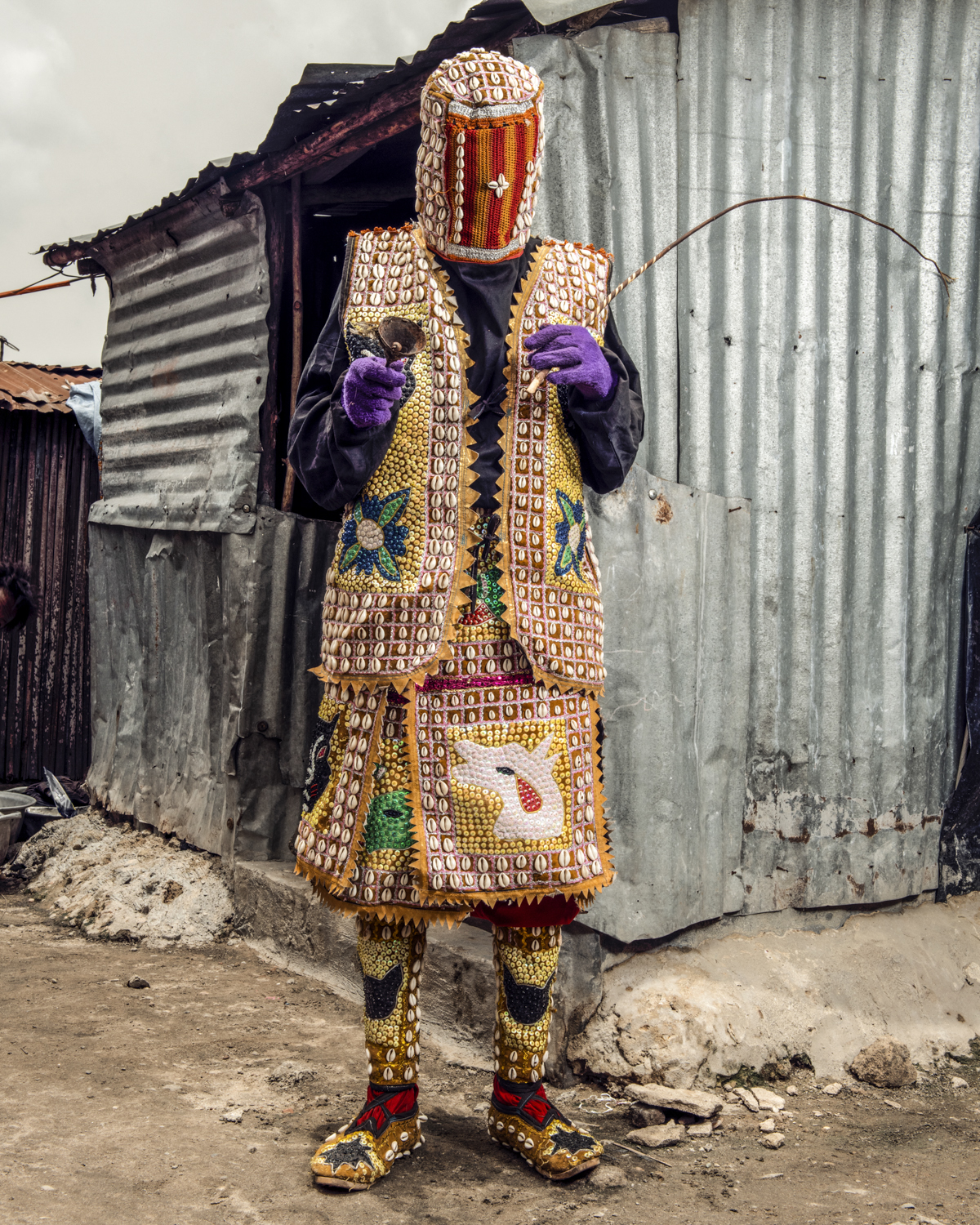
Egungun: Ancestor worship
In Africa, the dead of the family must be honored. For in many African cultures, death does not really exist; the spirit leaves the body to continue its life in the world of the dead, that of the ancestors.
Among the Yoruba, these dead manifest themselves to their descendants through an entity called EGOUN.
It is the spirit of the dead who returns to earth under beautiful loincloths decorated with applications of cut fabric, embroidered and adorned with shells and sequins, bone, and magic wood.
Family and clan societies, strictly reserved for men, have been formed around Egoun the revenant. They evoke the dead, call them and take care of them on earth.
Égoun serves as an intermediary with the souls in the afterlife.
He appears to certain families a few days after the death of one of its members, or during ceremonies performed to honor their memory; he also comes to bring the blessing of the ancestors to the marriages of their descendants and, in certain cases, to welcome a newborn child.
Offerings of food, drink and money are always made to him during his appearances.
EGOUN speaks with a deep, husky voice and dances readily to the sound of Bata or Ogbon drums.
The contact of his loincloth can be fatal to the living, so the MARIWOS (the guardians), members of the EGOUN society, always accompany them, carrying large engraved wooden sticks (lshan) to ward off the unwary. This stick symbolizes the border between the world of the dead (Kou-tome) and the world of the living. Ancestor worship in Africa is directed only to that part of the family that does not go back beyond the founder of the village or the house, that is, to the dynasty of the owners of the inhabited place.
With the exception of the royal families whose members are often deified and therefore have a more important lineage.
This cult is addressed to the deified ancestors and forms a vast system that unites the dead and the living in a continuous and united family whole.
The gods and the dead mix with the living, listen to their complaints, advise them, grant them graces, solve their difficulties and give them remedies for their pains and consolations for their misfortunes. The celestial world is not distant, nor is it superior, and the believer can speak directly with his gods and with his ancestors and benefit from their benevolence.
Each Yoruba clan honors its deceased ancestors in the hope of benefiting from their protection, avoiding their wrath, and keeping the ghosts away from the living.
He therefore regularly brings back the spirit of the ancestors from the realm of the dead (Kou-Tomé)
Each family clan of the ancestor cult has a convent.
It is a sacred place where the masks of the ghosts are kept. It is there that the adepts are trained in secret and that they put on the masks during the ceremonies.
The clan designates those who will be initiated and will have the responsibility of lending their bodies to the spirits of the ancestors and thus, will ensure the dialogue with the ancestors who have become protective deities.
Thus, one or more members of the family are designated, sometimes very young, to be these messengers of the afterlife.
They are taught in secret in a convent for several years, even decades.
There they learn the trance necessary to lend their bodies to the deities, a language that allows them to communicate with the invisible, and to create an appearance...
They emerge from it initiated to the rank of Egungun.
Apart from the initiates, no one knows who is Egungun because during the trances, they appear masked, their bodies totally hidden by their ceremonial costume.
The convent is exclusively reserved for initiates and men, on pain of death. The convent is directed by the Bale, who is generally the head of the family.
The general Alagba is the supreme chief, the king of the Egungun of a city, he watches over the convents of the city.
Egungun: Ancestor worship
In Africa, the dead of the family must be honored. For in many African cultures, death does not really exist; the spirit leaves the body to continue its life in the world of the dead, that of the ancestors.
Among the Yoruba, these dead manifest themselves to their descendants through an entity called EGOUN.
It is the spirit of the dead who returns to earth under beautiful loincloths decorated with applications of cut fabric, embroidered and adorned with shells and sequins, bone, and magic wood.
Family and clan societies, strictly reserved for men, have been formed around Egoun the revenant. They evoke the dead, call them and take care of them on earth.
Égoun serves as an intermediary with the souls in the afterlife.
He appears to certain families a few days after the death of one of its members, or during ceremonies performed to honor their memory; he also comes to bring the blessing of the ancestors to the marriages of their descendants and, in certain cases, to welcome a newborn child.
Offerings of food, drink and money are always made to him during his appearances.
EGOUN speaks with a deep, husky voice and dances readily to the sound of Bata or Ogbon drums.
The contact of his loincloth can be fatal to the living, so the MARIWOS (the guardians), members of the EGOUN society, always accompany them, carrying large engraved wooden sticks (lshan) to ward off the unwary. This stick symbolizes the border between the world of the dead (Kou-tome) and the world of the living. Ancestor worship in Africa is directed only to that part of the family that does not go back beyond the founder of the village or the house, that is, to the dynasty of the owners of the inhabited place.
With the exception of the royal families whose members are often deified and therefore have a more important lineage.
This cult is addressed to the deified ancestors and forms a vast system that unites the dead and the living in a continuous and united family whole.
The gods and the dead mix with the living, listen to their complaints, advise them, grant them graces, solve their difficulties and give them remedies for their pains and consolations for their misfortunes. The celestial world is not distant, nor is it superior, and the believer can speak directly with his gods and with his ancestors and benefit from their benevolence.
Each Yoruba clan honors its deceased ancestors in the hope of benefiting from their protection, avoiding their wrath, and keeping the ghosts away from the living.
He therefore regularly brings back the spirit of the ancestors from the realm of the dead (Kou-Tomé)
Each family clan of the ancestor cult has a convent.
It is a sacred place where the masks of the ghosts are kept. It is there that the adepts are trained in secret and that they put on the masks during the ceremonies.
The clan designates those who will be initiated and will have the responsibility of lending their bodies to the spirits of the ancestors and thus, will ensure the dialogue with the ancestors who have become protective deities.
Thus, one or more members of the family are designated, sometimes very young, to be these messengers of the afterlife.
They are taught in secret in a convent for several years, even decades.
There they learn the trance necessary to lend their bodies to the deities, a language that allows them to communicate with the invisible, and to create an appearance...
They emerge from it initiated to the rank of Egungun.
Apart from the initiates, no one knows who is Egungun because during the trances, they appear masked, their bodies totally hidden by their ceremonial costume.
The convent is exclusively reserved for initiates and men, on pain of death. The convent is directed by the Bale, who is generally the head of the family.
The general Alagba is the supreme chief, the king of the Egungun of a city, he watches over the convents of the city.

Egungun: Ancestor worship
In Africa, the dead of the family must be honored. For in many African cultures, death does not really exist; the spirit leaves the body to continue its life in the world of the dead, that of the ancestors.
Among the Yoruba, these dead manifest themselves to their descendants through an entity called EGOUN.
It is the spirit of the dead who returns to earth under beautiful loincloths decorated with applications of cut fabric, embroidered and adorned with shells and sequins, bone, and magic wood.
Family and clan societies, strictly reserved for men, have been formed around Egoun the revenant. They evoke the dead, call them and take care of them on earth.
Égoun serves as an intermediary with the souls in the afterlife.
He appears to certain families a few days after the death of one of its members, or during ceremonies performed to honor their memory; he also comes to bring the blessing of the ancestors to the marriages of their descendants and, in certain cases, to welcome a newborn child.
Offerings of food, drink and money are always made to him during his appearances.
EGOUN speaks with a deep, husky voice and dances readily to the sound of Bata or Ogbon drums.
The contact of his loincloth can be fatal to the living, so the MARIWOS (the guardians), members of the EGOUN society, always accompany them, carrying large engraved wooden sticks (lshan) to ward off the unwary. This stick symbolizes the border between the world of the dead (Kou-tome) and the world of the living. Ancestor worship in Africa is directed only to that part of the family that does not go back beyond the founder of the village or the house, that is, to the dynasty of the owners of the inhabited place.
With the exception of the royal families whose members are often deified and therefore have a more important lineage.
This cult is addressed to the deified ancestors and forms a vast system that unites the dead and the living in a continuous and united family whole.
The gods and the dead mix with the living, listen to their complaints, advise them, grant them graces, solve their difficulties and give them remedies for their pains and consolations for their misfortunes. The celestial world is not distant, nor is it superior, and the believer can speak directly with his gods and with his ancestors and benefit from their benevolence.
Each Yoruba clan honors its deceased ancestors in the hope of benefiting from their protection, avoiding their wrath, and keeping the ghosts away from the living.
He therefore regularly brings back the spirit of the ancestors from the realm of the dead (Kou-Tomé)
Each family clan of the ancestor cult has a convent.
It is a sacred place where the masks of the ghosts are kept. It is there that the adepts are trained in secret and that they put on the masks during the ceremonies.
The clan designates those who will be initiated and will have the responsibility of lending their bodies to the spirits of the ancestors and thus, will ensure the dialogue with the ancestors who have become protective deities.
Thus, one or more members of the family are designated, sometimes very young, to be these messengers of the afterlife.
They are taught in secret in a convent for several years, even decades.
There they learn the trance necessary to lend their bodies to the deities, a language that allows them to communicate with the invisible, and to create an appearance...
They emerge from it initiated to the rank of Egungun.
Apart from the initiates, no one knows who is Egungun because during the trances, they appear masked, their bodies totally hidden by their ceremonial costume.
The convent is exclusively reserved for initiates and men, on pain of death. The convent is directed by the Bale, who is generally the head of the family.
The general Alagba is the supreme chief, the king of the Egungun of a city, he watches over the convents of the city.
Egungun: Ancestor worship
In Africa, the dead of the family must be honored. For in many African cultures, death does not really exist; the spirit leaves the body to continue its life in the world of the dead, that of the ancestors.
Among the Yoruba, these dead manifest themselves to their descendants through an entity called EGOUN.
It is the spirit of the dead who returns to earth under beautiful loincloths decorated with applications of cut fabric, embroidered and adorned with shells and sequins, bone, and magic wood.
Family and clan societies, strictly reserved for men, have been formed around Egoun the revenant. They evoke the dead, call them and take care of them on earth.
Égoun serves as an intermediary with the souls in the afterlife.
He appears to certain families a few days after the death of one of its members, or during ceremonies performed to honor their memory; he also comes to bring the blessing of the ancestors to the marriages of their descendants and, in certain cases, to welcome a newborn child.
Offerings of food, drink and money are always made to him during his appearances.
EGOUN speaks with a deep, husky voice and dances readily to the sound of Bata or Ogbon drums.
The contact of his loincloth can be fatal to the living, so the MARIWOS (the guardians), members of the EGOUN society, always accompany them, carrying large engraved wooden sticks (lshan) to ward off the unwary. This stick symbolizes the border between the world of the dead (Kou-tome) and the world of the living. Ancestor worship in Africa is directed only to that part of the family that does not go back beyond the founder of the village or the house, that is, to the dynasty of the owners of the inhabited place.
With the exception of the royal families whose members are often deified and therefore have a more important lineage.
This cult is addressed to the deified ancestors and forms a vast system that unites the dead and the living in a continuous and united family whole.
The gods and the dead mix with the living, listen to their complaints, advise them, grant them graces, solve their difficulties and give them remedies for their pains and consolations for their misfortunes. The celestial world is not distant, nor is it superior, and the believer can speak directly with his gods and with his ancestors and benefit from their benevolence.
Each Yoruba clan honors its deceased ancestors in the hope of benefiting from their protection, avoiding their wrath, and keeping the ghosts away from the living.
He therefore regularly brings back the spirit of the ancestors from the realm of the dead (Kou-Tomé)
Each family clan of the ancestor cult has a convent.
It is a sacred place where the masks of the ghosts are kept. It is there that the adepts are trained in secret and that they put on the masks during the ceremonies.
The clan designates those who will be initiated and will have the responsibility of lending their bodies to the spirits of the ancestors and thus, will ensure the dialogue with the ancestors who have become protective deities.
Thus, one or more members of the family are designated, sometimes very young, to be these messengers of the afterlife.
They are taught in secret in a convent for several years, even decades.
There they learn the trance necessary to lend their bodies to the deities, a language that allows them to communicate with the invisible, and to create an appearance...
They emerge from it initiated to the rank of Egungun.
Apart from the initiates, no one knows who is Egungun because during the trances, they appear masked, their bodies totally hidden by their ceremonial costume.
The convent is exclusively reserved for initiates and men, on pain of death. The convent is directed by the Bale, who is generally the head of the family.
The general Alagba is the supreme chief, the king of the Egungun of a city, he watches over the convents of the city.
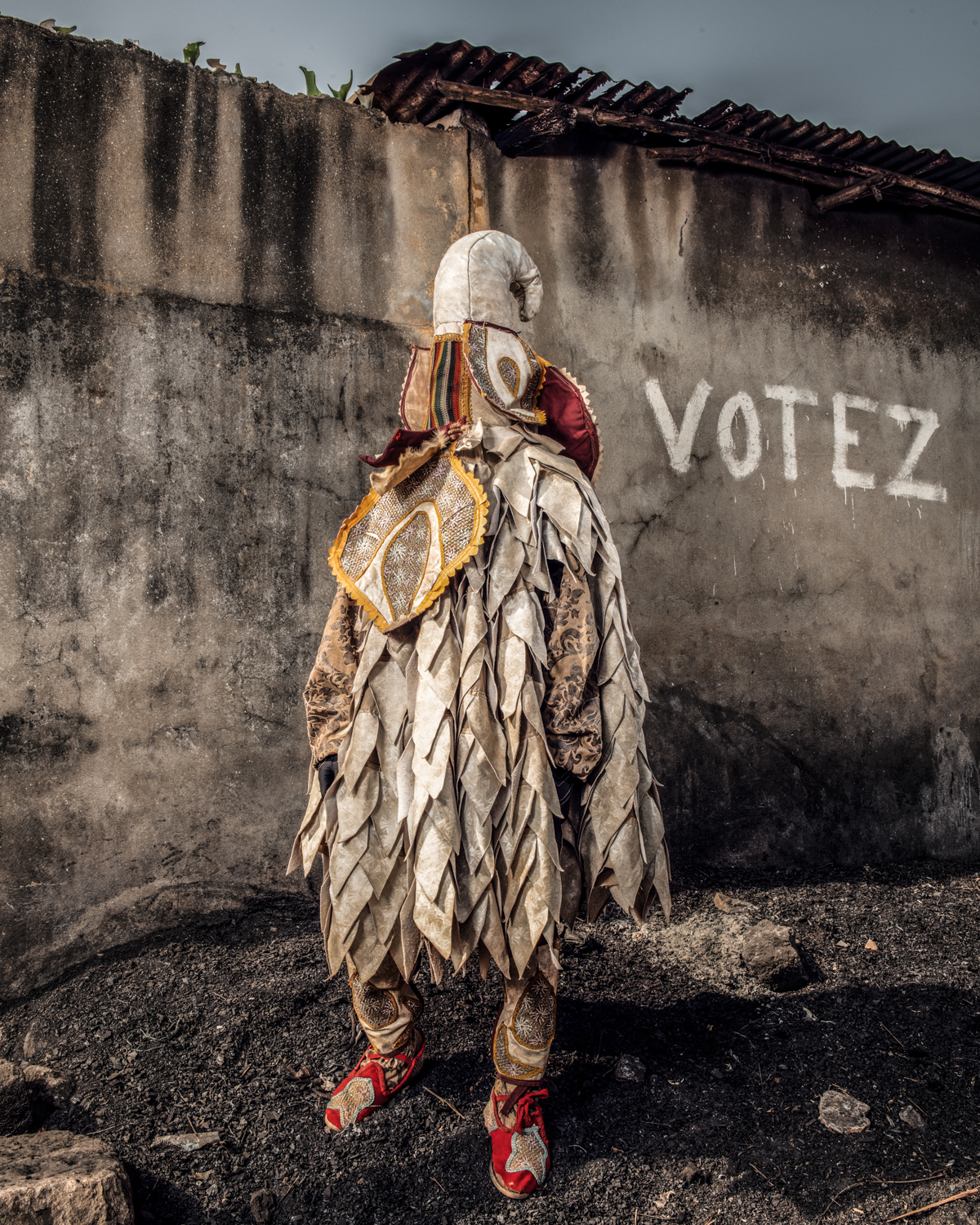
Egungun: Ancestor worship
In Africa, the dead of the family must be honored. For in many African cultures, death does not really exist; the spirit leaves the body to continue its life in the world of the dead, that of the ancestors.
Among the Yoruba, these dead manifest themselves to their descendants through an entity called EGOUN.
It is the spirit of the dead who returns to earth under beautiful loincloths decorated with applications of cut fabric, embroidered and adorned with shells and sequins, bone, and magic wood.
Family and clan societies, strictly reserved for men, have been formed around Egoun the revenant. They evoke the dead, call them and take care of them on earth.
Égoun serves as an intermediary with the souls in the afterlife.
He appears to certain families a few days after the death of one of its members, or during ceremonies performed to honor their memory; he also comes to bring the blessing of the ancestors to the marriages of their descendants and, in certain cases, to welcome a newborn child.
Offerings of food, drink and money are always made to him during his appearances.
EGOUN speaks with a deep, husky voice and dances readily to the sound of Bata or Ogbon drums.
The contact of his loincloth can be fatal to the living, so the MARIWOS (the guardians), members of the EGOUN society, always accompany them, carrying large engraved wooden sticks (lshan) to ward off the unwary. This stick symbolizes the border between the world of the dead (Kou-tome) and the world of the living. Ancestor worship in Africa is directed only to that part of the family that does not go back beyond the founder of the village or the house, that is, to the dynasty of the owners of the inhabited place.
With the exception of the royal families whose members are often deified and therefore have a more important lineage.
This cult is addressed to the deified ancestors and forms a vast system that unites the dead and the living in a continuous and united family whole.
The gods and the dead mix with the living, listen to their complaints, advise them, grant them graces, solve their difficulties and give them remedies for their pains and consolations for their misfortunes. The celestial world is not distant, nor is it superior, and the believer can speak directly with his gods and with his ancestors and benefit from their benevolence.
Each Yoruba clan honors its deceased ancestors in the hope of benefiting from their protection, avoiding their wrath, and keeping the ghosts away from the living.
He therefore regularly brings back the spirit of the ancestors from the realm of the dead (Kou-Tomé)
Each family clan of the ancestor cult has a convent.
It is a sacred place where the masks of the ghosts are kept. It is there that the adepts are trained in secret and that they put on the masks during the ceremonies.
The clan designates those who will be initiated and will have the responsibility of lending their bodies to the spirits of the ancestors and thus, will ensure the dialogue with the ancestors who have become protective deities.
Thus, one or more members of the family are designated, sometimes very young, to be these messengers of the afterlife.
They are taught in secret in a convent for several years, even decades.
There they learn the trance necessary to lend their bodies to the deities, a language that allows them to communicate with the invisible, and to create an appearance...
They emerge from it initiated to the rank of Egungun.
Apart from the initiates, no one knows who is Egungun because during the trances, they appear masked, their bodies totally hidden by their ceremonial costume.
The convent is exclusively reserved for initiates and men, on pain of death. The convent is directed by the Bale, who is generally the head of the family.
The general Alagba is the supreme chief, the king of the Egungun of a city, he watches over the convents of the city.
Egungun: Ancestor worship
In Africa, the dead of the family must be honored. For in many African cultures, death does not really exist; the spirit leaves the body to continue its life in the world of the dead, that of the ancestors.
Among the Yoruba, these dead manifest themselves to their descendants through an entity called EGOUN.
It is the spirit of the dead who returns to earth under beautiful loincloths decorated with applications of cut fabric, embroidered and adorned with shells and sequins, bone, and magic wood.
Family and clan societies, strictly reserved for men, have been formed around Egoun the revenant. They evoke the dead, call them and take care of them on earth.
Égoun serves as an intermediary with the souls in the afterlife.
He appears to certain families a few days after the death of one of its members, or during ceremonies performed to honor their memory; he also comes to bring the blessing of the ancestors to the marriages of their descendants and, in certain cases, to welcome a newborn child.
Offerings of food, drink and money are always made to him during his appearances.
EGOUN speaks with a deep, husky voice and dances readily to the sound of Bata or Ogbon drums.
The contact of his loincloth can be fatal to the living, so the MARIWOS (the guardians), members of the EGOUN society, always accompany them, carrying large engraved wooden sticks (lshan) to ward off the unwary. This stick symbolizes the border between the world of the dead (Kou-tome) and the world of the living. Ancestor worship in Africa is directed only to that part of the family that does not go back beyond the founder of the village or the house, that is, to the dynasty of the owners of the inhabited place.
With the exception of the royal families whose members are often deified and therefore have a more important lineage.
This cult is addressed to the deified ancestors and forms a vast system that unites the dead and the living in a continuous and united family whole.
The gods and the dead mix with the living, listen to their complaints, advise them, grant them graces, solve their difficulties and give them remedies for their pains and consolations for their misfortunes. The celestial world is not distant, nor is it superior, and the believer can speak directly with his gods and with his ancestors and benefit from their benevolence.
Each Yoruba clan honors its deceased ancestors in the hope of benefiting from their protection, avoiding their wrath, and keeping the ghosts away from the living.
He therefore regularly brings back the spirit of the ancestors from the realm of the dead (Kou-Tomé)
Each family clan of the ancestor cult has a convent.
It is a sacred place where the masks of the ghosts are kept. It is there that the adepts are trained in secret and that they put on the masks during the ceremonies.
The clan designates those who will be initiated and will have the responsibility of lending their bodies to the spirits of the ancestors and thus, will ensure the dialogue with the ancestors who have become protective deities.
Thus, one or more members of the family are designated, sometimes very young, to be these messengers of the afterlife.
They are taught in secret in a convent for several years, even decades.
There they learn the trance necessary to lend their bodies to the deities, a language that allows them to communicate with the invisible, and to create an appearance...
They emerge from it initiated to the rank of Egungun.
Apart from the initiates, no one knows who is Egungun because during the trances, they appear masked, their bodies totally hidden by their ceremonial costume.
The convent is exclusively reserved for initiates and men, on pain of death. The convent is directed by the Bale, who is generally the head of the family.
The general Alagba is the supreme chief, the king of the Egungun of a city, he watches over the convents of the city.
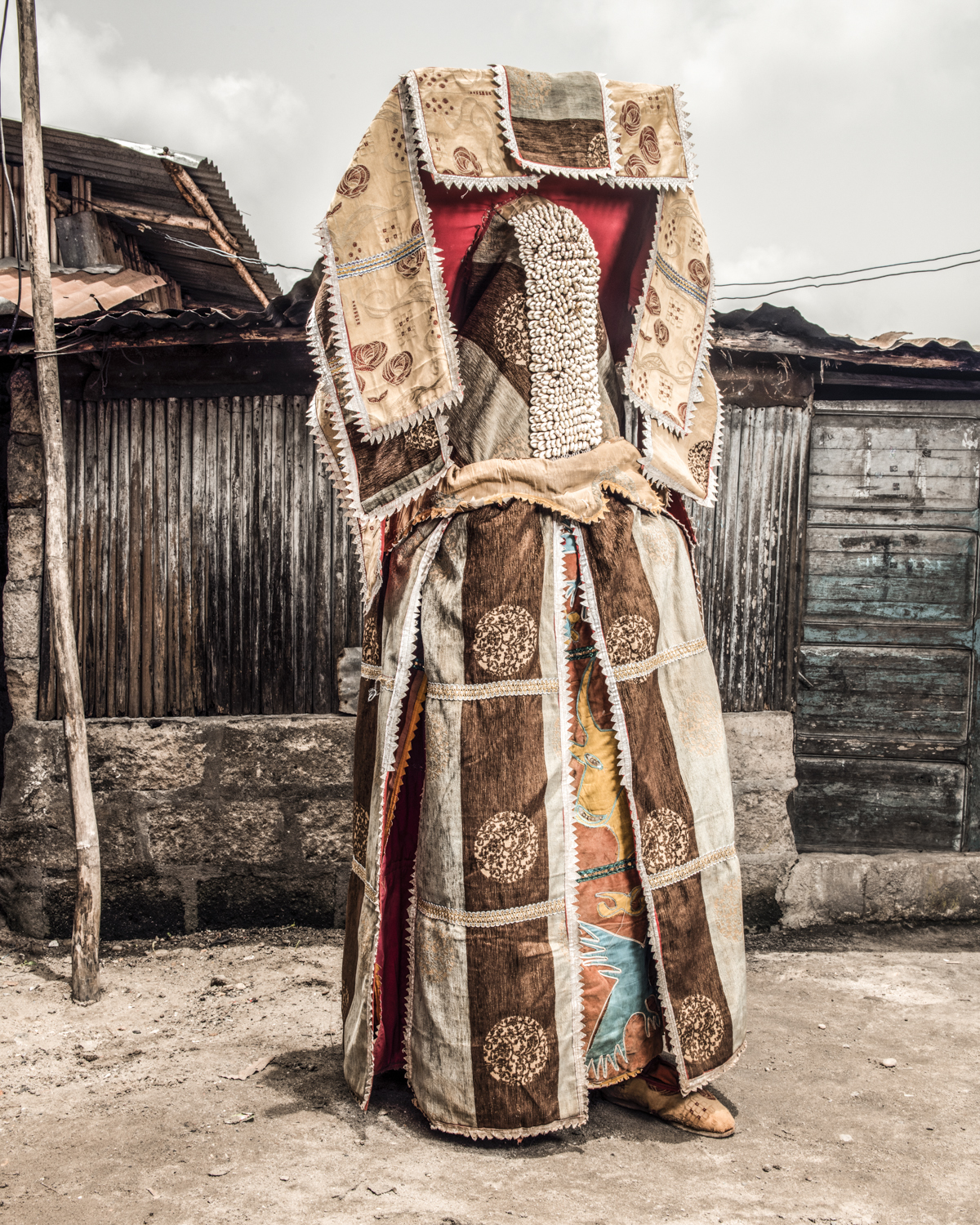
Egungun: Ancestor worship
In Africa, the dead of the family must be honored. For in many African cultures, death does not really exist; the spirit leaves the body to continue its life in the world of the dead, that of the ancestors.
Among the Yoruba, these dead manifest themselves to their descendants through an entity called EGOUN.
It is the spirit of the dead who returns to earth under beautiful loincloths decorated with applications of cut fabric, embroidered and adorned with shells and sequins, bone, and magic wood.
Family and clan societies, strictly reserved for men, have been formed around Egoun the revenant. They evoke the dead, call them and take care of them on earth.
Égoun serves as an intermediary with the souls in the afterlife.
He appears to certain families a few days after the death of one of its members, or during ceremonies performed to honor their memory; he also comes to bring the blessing of the ancestors to the marriages of their descendants and, in certain cases, to welcome a newborn child.
Offerings of food, drink and money are always made to him during his appearances.
EGOUN speaks with a deep, husky voice and dances readily to the sound of Bata or Ogbon drums.
The contact of his loincloth can be fatal to the living, so the MARIWOS (the guardians), members of the EGOUN society, always accompany them, carrying large engraved wooden sticks (lshan) to ward off the unwary. This stick symbolizes the border between the world of the dead (Kou-tome) and the world of the living. Ancestor worship in Africa is directed only to that part of the family that does not go back beyond the founder of the village or the house, that is, to the dynasty of the owners of the inhabited place.
With the exception of the royal families whose members are often deified and therefore have a more important lineage.
This cult is addressed to the deified ancestors and forms a vast system that unites the dead and the living in a continuous and united family whole.
The gods and the dead mix with the living, listen to their complaints, advise them, grant them graces, solve their difficulties and give them remedies for their pains and consolations for their misfortunes. The celestial world is not distant, nor is it superior, and the believer can speak directly with his gods and with his ancestors and benefit from their benevolence.
Each Yoruba clan honors its deceased ancestors in the hope of benefiting from their protection, avoiding their wrath, and keeping the ghosts away from the living.
He therefore regularly brings back the spirit of the ancestors from the realm of the dead (Kou-Tomé)
Each family clan of the ancestor cult has a convent.
It is a sacred place where the masks of the ghosts are kept. It is there that the adepts are trained in secret and that they put on the masks during the ceremonies.
The clan designates those who will be initiated and will have the responsibility of lending their bodies to the spirits of the ancestors and thus, will ensure the dialogue with the ancestors who have become protective deities.
Thus, one or more members of the family are designated, sometimes very young, to be these messengers of the afterlife.
They are taught in secret in a convent for several years, even decades.
There they learn the trance necessary to lend their bodies to the deities, a language that allows them to communicate with the invisible, and to create an appearance...
They emerge from it initiated to the rank of Egungun.
Apart from the initiates, no one knows who is Egungun because during the trances, they appear masked, their bodies totally hidden by their ceremonial costume.
The convent is exclusively reserved for initiates and men, on pain of death. The convent is directed by the Bale, who is generally the head of the family.
The general Alagba is the supreme chief, the king of the Egungun of a city, he watches over the convents of the city.
Egungun: Ancestor worship
In Africa, the dead of the family must be honored. For in many African cultures, death does not really exist; the spirit leaves the body to continue its life in the world of the dead, that of the ancestors.
Among the Yoruba, these dead manifest themselves to their descendants through an entity called EGOUN.
It is the spirit of the dead who returns to earth under beautiful loincloths decorated with applications of cut fabric, embroidered and adorned with shells and sequins, bone, and magic wood.
Family and clan societies, strictly reserved for men, have been formed around Egoun the revenant. They evoke the dead, call them and take care of them on earth.
Égoun serves as an intermediary with the souls in the afterlife.
He appears to certain families a few days after the death of one of its members, or during ceremonies performed to honor their memory; he also comes to bring the blessing of the ancestors to the marriages of their descendants and, in certain cases, to welcome a newborn child.
Offerings of food, drink and money are always made to him during his appearances.
EGOUN speaks with a deep, husky voice and dances readily to the sound of Bata or Ogbon drums.
The contact of his loincloth can be fatal to the living, so the MARIWOS (the guardians), members of the EGOUN society, always accompany them, carrying large engraved wooden sticks (lshan) to ward off the unwary. This stick symbolizes the border between the world of the dead (Kou-tome) and the world of the living. Ancestor worship in Africa is directed only to that part of the family that does not go back beyond the founder of the village or the house, that is, to the dynasty of the owners of the inhabited place.
With the exception of the royal families whose members are often deified and therefore have a more important lineage.
This cult is addressed to the deified ancestors and forms a vast system that unites the dead and the living in a continuous and united family whole.
The gods and the dead mix with the living, listen to their complaints, advise them, grant them graces, solve their difficulties and give them remedies for their pains and consolations for their misfortunes. The celestial world is not distant, nor is it superior, and the believer can speak directly with his gods and with his ancestors and benefit from their benevolence.
Each Yoruba clan honors its deceased ancestors in the hope of benefiting from their protection, avoiding their wrath, and keeping the ghosts away from the living.
He therefore regularly brings back the spirit of the ancestors from the realm of the dead (Kou-Tomé)
Each family clan of the ancestor cult has a convent.
It is a sacred place where the masks of the ghosts are kept. It is there that the adepts are trained in secret and that they put on the masks during the ceremonies.
The clan designates those who will be initiated and will have the responsibility of lending their bodies to the spirits of the ancestors and thus, will ensure the dialogue with the ancestors who have become protective deities.
Thus, one or more members of the family are designated, sometimes very young, to be these messengers of the afterlife.
They are taught in secret in a convent for several years, even decades.
There they learn the trance necessary to lend their bodies to the deities, a language that allows them to communicate with the invisible, and to create an appearance...
They emerge from it initiated to the rank of Egungun.
Apart from the initiates, no one knows who is Egungun because during the trances, they appear masked, their bodies totally hidden by their ceremonial costume.
The convent is exclusively reserved for initiates and men, on pain of death. The convent is directed by the Bale, who is generally the head of the family.
The general Alagba is the supreme chief, the king of the Egungun of a city, he watches over the convents of the city.
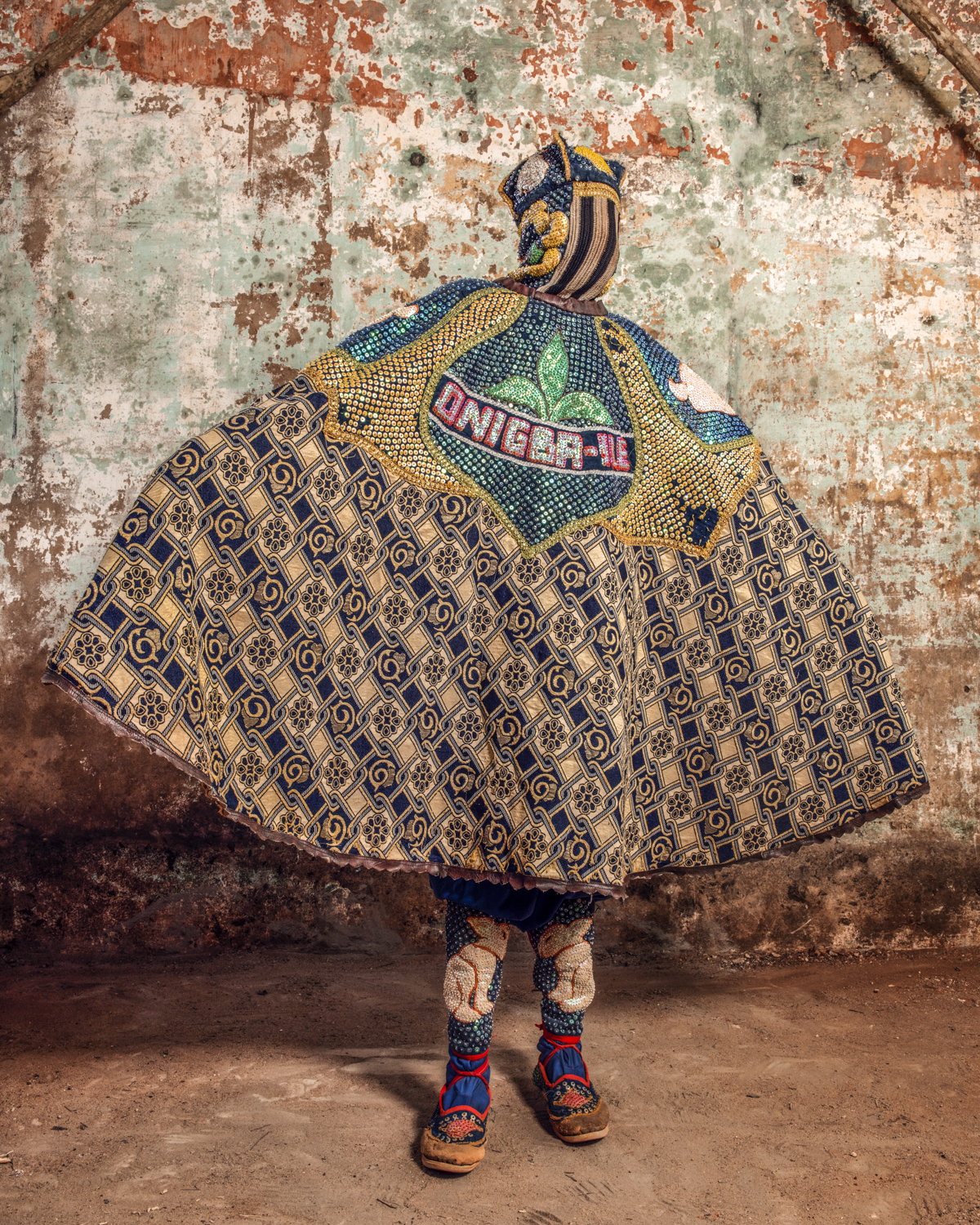
Egungun: Ancestor worship
In Africa, the dead of the family must be honored. For in many African cultures, death does not really exist; the spirit leaves the body to continue its life in the world of the dead, that of the ancestors.
Among the Yoruba, these dead manifest themselves to their descendants through an entity called EGOUN.
It is the spirit of the dead who returns to earth under beautiful loincloths decorated with applications of cut fabric, embroidered and adorned with shells and sequins, bone, and magic wood.
Family and clan societies, strictly reserved for men, have been formed around Egoun the revenant. They evoke the dead, call them and take care of them on earth.
Égoun serves as an intermediary with the souls in the afterlife.
He appears to certain families a few days after the death of one of its members, or during ceremonies performed to honor their memory; he also comes to bring the blessing of the ancestors to the marriages of their descendants and, in certain cases, to welcome a newborn child.
Offerings of food, drink and money are always made to him during his appearances.
EGOUN speaks with a deep, husky voice and dances readily to the sound of Bata or Ogbon drums.
The contact of his loincloth can be fatal to the living, so the MARIWOS (the guardians), members of the EGOUN society, always accompany them, carrying large engraved wooden sticks (lshan) to ward off the unwary. This stick symbolizes the border between the world of the dead (Kou-tome) and the world of the living. Ancestor worship in Africa is directed only to that part of the family that does not go back beyond the founder of the village or the house, that is, to the dynasty of the owners of the inhabited place.
With the exception of the royal families whose members are often deified and therefore have a more important lineage.
This cult is addressed to the deified ancestors and forms a vast system that unites the dead and the living in a continuous and united family whole.
The gods and the dead mix with the living, listen to their complaints, advise them, grant them graces, solve their difficulties and give them remedies for their pains and consolations for their misfortunes. The celestial world is not distant, nor is it superior, and the believer can speak directly with his gods and with his ancestors and benefit from their benevolence.
Each Yoruba clan honors its deceased ancestors in the hope of benefiting from their protection, avoiding their wrath, and keeping the ghosts away from the living.
He therefore regularly brings back the spirit of the ancestors from the realm of the dead (Kou-Tomé)
Each family clan of the ancestor cult has a convent.
It is a sacred place where the masks of the ghosts are kept. It is there that the adepts are trained in secret and that they put on the masks during the ceremonies.
The clan designates those who will be initiated and will have the responsibility of lending their bodies to the spirits of the ancestors and thus, will ensure the dialogue with the ancestors who have become protective deities.
Thus, one or more members of the family are designated, sometimes very young, to be these messengers of the afterlife.
They are taught in secret in a convent for several years, even decades.
There they learn the trance necessary to lend their bodies to the deities, a language that allows them to communicate with the invisible, and to create an appearance...
They emerge from it initiated to the rank of Egungun.
Apart from the initiates, no one knows who is Egungun because during the trances, they appear masked, their bodies totally hidden by their ceremonial costume.
The convent is exclusively reserved for initiates and men, on pain of death. The convent is directed by the Bale, who is generally the head of the family.
The general Alagba is the supreme chief, the king of the Egungun of a city, he watches over the convents of the city.
Egungun: Ancestor worship
In Africa, the dead of the family must be honored. For in many African cultures, death does not really exist; the spirit leaves the body to continue its life in the world of the dead, that of the ancestors.
Among the Yoruba, these dead manifest themselves to their descendants through an entity called EGOUN.
It is the spirit of the dead who returns to earth under beautiful loincloths decorated with applications of cut fabric, embroidered and adorned with shells and sequins, bone, and magic wood.
Family and clan societies, strictly reserved for men, have been formed around Egoun the revenant. They evoke the dead, call them and take care of them on earth.
Égoun serves as an intermediary with the souls in the afterlife.
He appears to certain families a few days after the death of one of its members, or during ceremonies performed to honor their memory; he also comes to bring the blessing of the ancestors to the marriages of their descendants and, in certain cases, to welcome a newborn child.
Offerings of food, drink and money are always made to him during his appearances.
EGOUN speaks with a deep, husky voice and dances readily to the sound of Bata or Ogbon drums.
The contact of his loincloth can be fatal to the living, so the MARIWOS (the guardians), members of the EGOUN society, always accompany them, carrying large engraved wooden sticks (lshan) to ward off the unwary. This stick symbolizes the border between the world of the dead (Kou-tome) and the world of the living. Ancestor worship in Africa is directed only to that part of the family that does not go back beyond the founder of the village or the house, that is, to the dynasty of the owners of the inhabited place.
With the exception of the royal families whose members are often deified and therefore have a more important lineage.
This cult is addressed to the deified ancestors and forms a vast system that unites the dead and the living in a continuous and united family whole.
The gods and the dead mix with the living, listen to their complaints, advise them, grant them graces, solve their difficulties and give them remedies for their pains and consolations for their misfortunes. The celestial world is not distant, nor is it superior, and the believer can speak directly with his gods and with his ancestors and benefit from their benevolence.
Each Yoruba clan honors its deceased ancestors in the hope of benefiting from their protection, avoiding their wrath, and keeping the ghosts away from the living.
He therefore regularly brings back the spirit of the ancestors from the realm of the dead (Kou-Tomé)
Each family clan of the ancestor cult has a convent.
It is a sacred place where the masks of the ghosts are kept. It is there that the adepts are trained in secret and that they put on the masks during the ceremonies.
The clan designates those who will be initiated and will have the responsibility of lending their bodies to the spirits of the ancestors and thus, will ensure the dialogue with the ancestors who have become protective deities.
Thus, one or more members of the family are designated, sometimes very young, to be these messengers of the afterlife.
They are taught in secret in a convent for several years, even decades.
There they learn the trance necessary to lend their bodies to the deities, a language that allows them to communicate with the invisible, and to create an appearance...
They emerge from it initiated to the rank of Egungun.
Apart from the initiates, no one knows who is Egungun because during the trances, they appear masked, their bodies totally hidden by their ceremonial costume.
The convent is exclusively reserved for initiates and men, on pain of death. The convent is directed by the Bale, who is generally the head of the family.
The general Alagba is the supreme chief, the king of the Egungun of a city, he watches over the convents of the city.
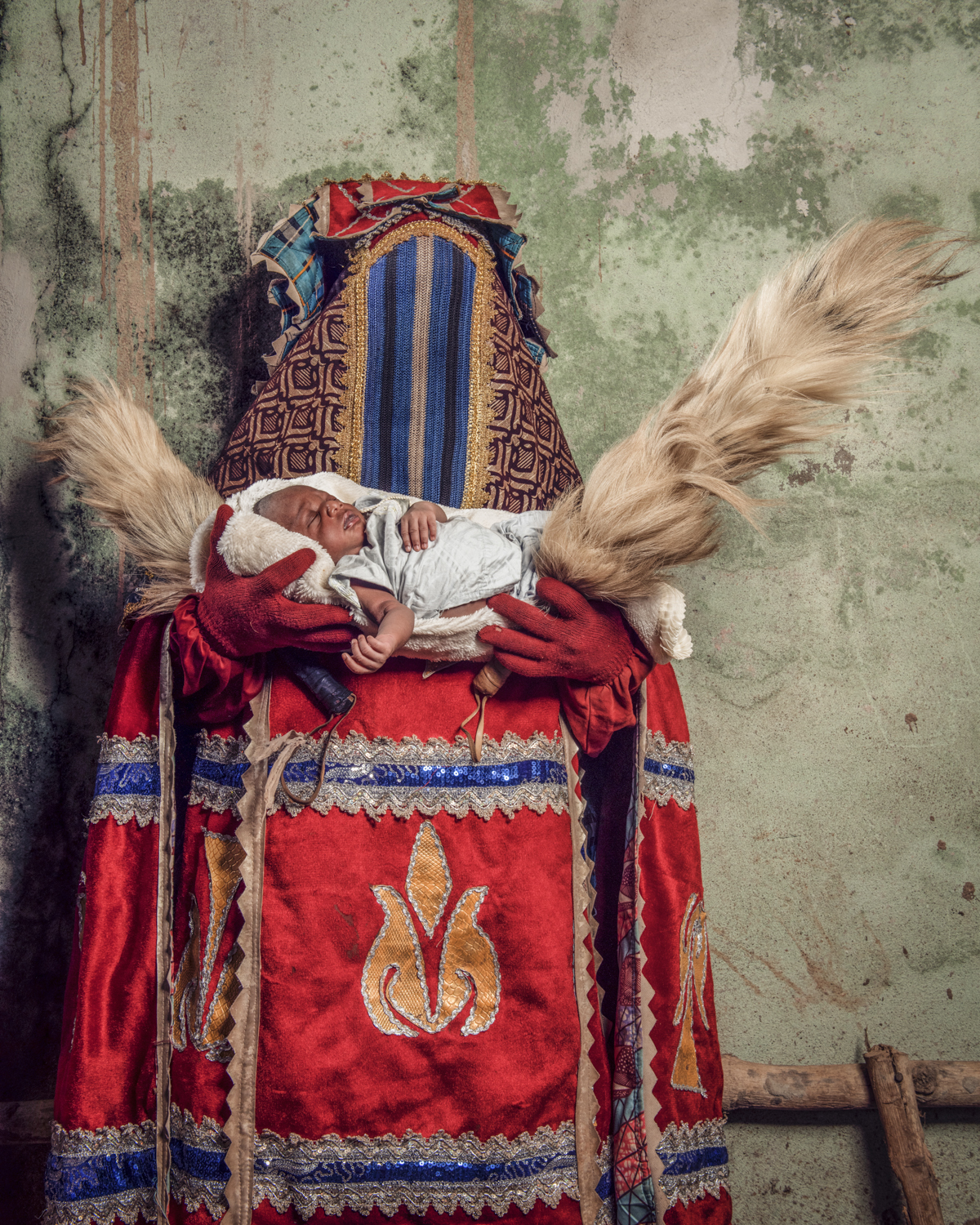
Egungun: Ancestor worship
In Africa, the dead of the family must be honored. For in many African cultures, death does not really exist; the spirit leaves the body to continue its life in the world of the dead, that of the ancestors.
Among the Yoruba, these dead manifest themselves to their descendants through an entity called EGOUN.
It is the spirit of the dead who returns to earth under beautiful loincloths decorated with applications of cut fabric, embroidered and adorned with shells and sequins, bone, and magic wood.
Family and clan societies, strictly reserved for men, have been formed around Egoun the revenant. They evoke the dead, call them and take care of them on earth.
Égoun serves as an intermediary with the souls in the afterlife.
He appears to certain families a few days after the death of one of its members, or during ceremonies performed to honor their memory; he also comes to bring the blessing of the ancestors to the marriages of their descendants and, in certain cases, to welcome a newborn child.
Offerings of food, drink and money are always made to him during his appearances.
EGOUN speaks with a deep, husky voice and dances readily to the sound of Bata or Ogbon drums.
The contact of his loincloth can be fatal to the living, so the MARIWOS (the guardians), members of the EGOUN society, always accompany them, carrying large engraved wooden sticks (lshan) to ward off the unwary. This stick symbolizes the border between the world of the dead (Kou-tome) and the world of the living. Ancestor worship in Africa is directed only to that part of the family that does not go back beyond the founder of the village or the house, that is, to the dynasty of the owners of the inhabited place.
With the exception of the royal families whose members are often deified and therefore have a more important lineage.
This cult is addressed to the deified ancestors and forms a vast system that unites the dead and the living in a continuous and united family whole.
The gods and the dead mix with the living, listen to their complaints, advise them, grant them graces, solve their difficulties and give them remedies for their pains and consolations for their misfortunes. The celestial world is not distant, nor is it superior, and the believer can speak directly with his gods and with his ancestors and benefit from their benevolence.
Each Yoruba clan honors its deceased ancestors in the hope of benefiting from their protection, avoiding their wrath, and keeping the ghosts away from the living.
He therefore regularly brings back the spirit of the ancestors from the realm of the dead (Kou-Tomé)
Each family clan of the ancestor cult has a convent.
It is a sacred place where the masks of the ghosts are kept. It is there that the adepts are trained in secret and that they put on the masks during the ceremonies.
The clan designates those who will be initiated and will have the responsibility of lending their bodies to the spirits of the ancestors and thus, will ensure the dialogue with the ancestors who have become protective deities.
Thus, one or more members of the family are designated, sometimes very young, to be these messengers of the afterlife.
They are taught in secret in a convent for several years, even decades.
There they learn the trance necessary to lend their bodies to the deities, a language that allows them to communicate with the invisible, and to create an appearance...
They emerge from it initiated to the rank of Egungun.
Apart from the initiates, no one knows who is Egungun because during the trances, they appear masked, their bodies totally hidden by their ceremonial costume.
The convent is exclusively reserved for initiates and men, on pain of death. The convent is directed by the Bale, who is generally the head of the family.
The general Alagba is the supreme chief, the king of the Egungun of a city, he watches over the convents of the city.
Egungun: Ancestor worship
In Africa, the dead of the family must be honored. For in many African cultures, death does not really exist; the spirit leaves the body to continue its life in the world of the dead, that of the ancestors.
Among the Yoruba, these dead manifest themselves to their descendants through an entity called EGOUN.
It is the spirit of the dead who returns to earth under beautiful loincloths decorated with applications of cut fabric, embroidered and adorned with shells and sequins, bone, and magic wood.
Family and clan societies, strictly reserved for men, have been formed around Egoun the revenant. They evoke the dead, call them and take care of them on earth.
Égoun serves as an intermediary with the souls in the afterlife.
He appears to certain families a few days after the death of one of its members, or during ceremonies performed to honor their memory; he also comes to bring the blessing of the ancestors to the marriages of their descendants and, in certain cases, to welcome a newborn child.
Offerings of food, drink and money are always made to him during his appearances.
EGOUN speaks with a deep, husky voice and dances readily to the sound of Bata or Ogbon drums.
The contact of his loincloth can be fatal to the living, so the MARIWOS (the guardians), members of the EGOUN society, always accompany them, carrying large engraved wooden sticks (lshan) to ward off the unwary. This stick symbolizes the border between the world of the dead (Kou-tome) and the world of the living. Ancestor worship in Africa is directed only to that part of the family that does not go back beyond the founder of the village or the house, that is, to the dynasty of the owners of the inhabited place.
With the exception of the royal families whose members are often deified and therefore have a more important lineage.
This cult is addressed to the deified ancestors and forms a vast system that unites the dead and the living in a continuous and united family whole.
The gods and the dead mix with the living, listen to their complaints, advise them, grant them graces, solve their difficulties and give them remedies for their pains and consolations for their misfortunes. The celestial world is not distant, nor is it superior, and the believer can speak directly with his gods and with his ancestors and benefit from their benevolence.
Each Yoruba clan honors its deceased ancestors in the hope of benefiting from their protection, avoiding their wrath, and keeping the ghosts away from the living.
He therefore regularly brings back the spirit of the ancestors from the realm of the dead (Kou-Tomé)
Each family clan of the ancestor cult has a convent.
It is a sacred place where the masks of the ghosts are kept. It is there that the adepts are trained in secret and that they put on the masks during the ceremonies.
The clan designates those who will be initiated and will have the responsibility of lending their bodies to the spirits of the ancestors and thus, will ensure the dialogue with the ancestors who have become protective deities.
Thus, one or more members of the family are designated, sometimes very young, to be these messengers of the afterlife.
They are taught in secret in a convent for several years, even decades.
There they learn the trance necessary to lend their bodies to the deities, a language that allows them to communicate with the invisible, and to create an appearance...
They emerge from it initiated to the rank of Egungun.
Apart from the initiates, no one knows who is Egungun because during the trances, they appear masked, their bodies totally hidden by their ceremonial costume.
The convent is exclusively reserved for initiates and men, on pain of death. The convent is directed by the Bale, who is generally the head of the family.
The general Alagba is the supreme chief, the king of the Egungun of a city, he watches over the convents of the city.
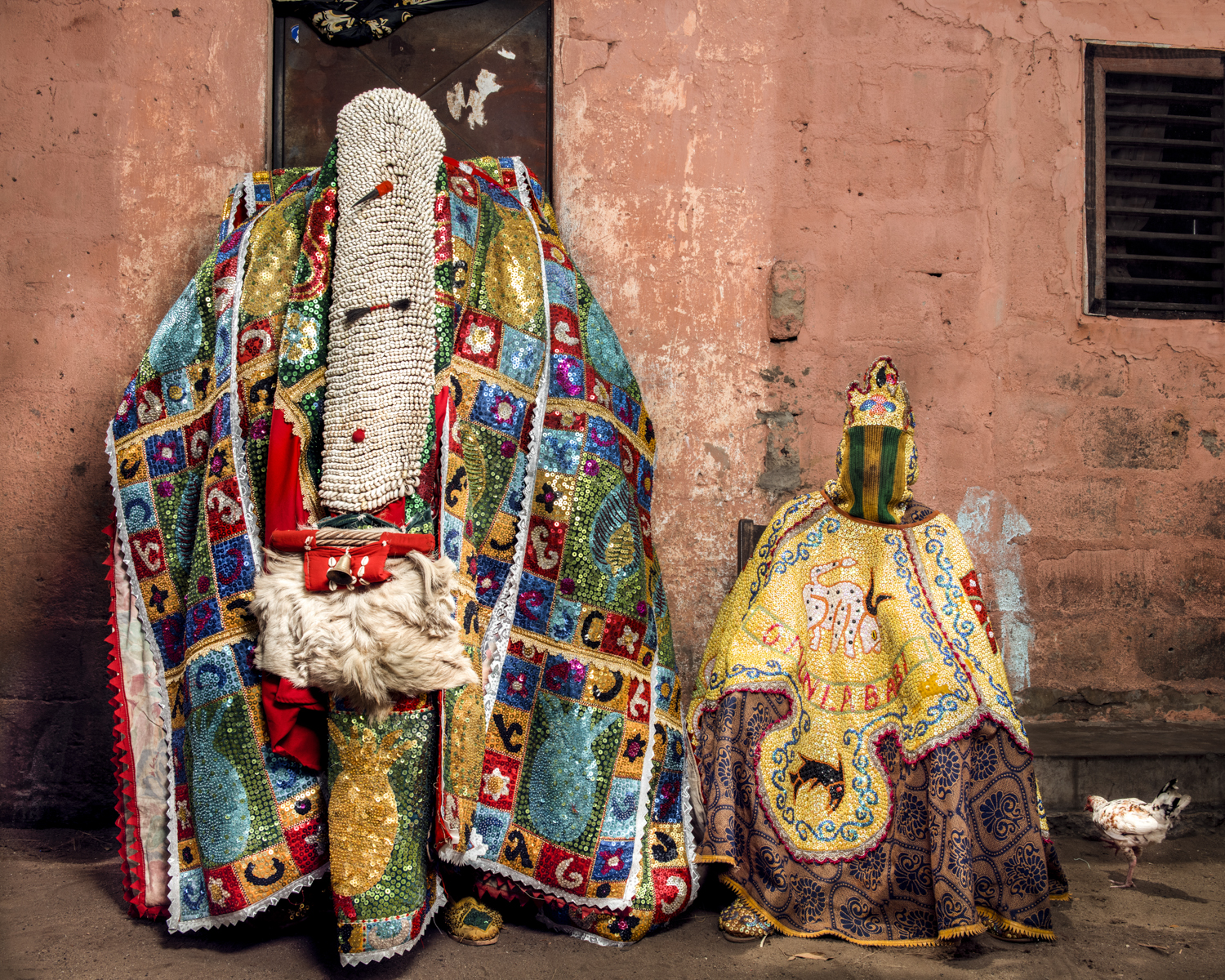
Egungun: Ancestor worship
In Africa, the dead of the family must be honored. For in many African cultures, death does not really exist; the spirit leaves the body to continue its life in the world of the dead, that of the ancestors.
Among the Yoruba, these dead manifest themselves to their descendants through an entity called EGOUN.
It is the spirit of the dead who returns to earth under beautiful loincloths decorated with applications of cut fabric, embroidered and adorned with shells and sequins, bone, and magic wood.
Family and clan societies, strictly reserved for men, have been formed around Egoun the revenant. They evoke the dead, call them and take care of them on earth.
Égoun serves as an intermediary with the souls in the afterlife.
He appears to certain families a few days after the death of one of its members, or during ceremonies performed to honor their memory; he also comes to bring the blessing of the ancestors to the marriages of their descendants and, in certain cases, to welcome a newborn child.
Offerings of food, drink and money are always made to him during his appearances.
EGOUN speaks with a deep, husky voice and dances readily to the sound of Bata or Ogbon drums.
The contact of his loincloth can be fatal to the living, so the MARIWOS (the guardians), members of the EGOUN society, always accompany them, carrying large engraved wooden sticks (lshan) to ward off the unwary. This stick symbolizes the border between the world of the dead (Kou-tome) and the world of the living. Ancestor worship in Africa is directed only to that part of the family that does not go back beyond the founder of the village or the house, that is, to the dynasty of the owners of the inhabited place.
With the exception of the royal families whose members are often deified and therefore have a more important lineage.
This cult is addressed to the deified ancestors and forms a vast system that unites the dead and the living in a continuous and united family whole.
The gods and the dead mix with the living, listen to their complaints, advise them, grant them graces, solve their difficulties and give them remedies for their pains and consolations for their misfortunes. The celestial world is not distant, nor is it superior, and the believer can speak directly with his gods and with his ancestors and benefit from their benevolence.
Each Yoruba clan honors its deceased ancestors in the hope of benefiting from their protection, avoiding their wrath, and keeping the ghosts away from the living.
He therefore regularly brings back the spirit of the ancestors from the realm of the dead (Kou-Tomé)
Each family clan of the ancestor cult has a convent.
It is a sacred place where the masks of the ghosts are kept. It is there that the adepts are trained in secret and that they put on the masks during the ceremonies.
The clan designates those who will be initiated and will have the responsibility of lending their bodies to the spirits of the ancestors and thus, will ensure the dialogue with the ancestors who have become protective deities.
Thus, one or more members of the family are designated, sometimes very young, to be these messengers of the afterlife.
They are taught in secret in a convent for several years, even decades.
There they learn the trance necessary to lend their bodies to the deities, a language that allows them to communicate with the invisible, and to create an appearance...
They emerge from it initiated to the rank of Egungun.
Apart from the initiates, no one knows who is Egungun because during the trances, they appear masked, their bodies totally hidden by their ceremonial costume.
The convent is exclusively reserved for initiates and men, on pain of death. The convent is directed by the Bale, who is generally the head of the family.
The general Alagba is the supreme chief, the king of the Egungun of a city, he watches over the convents of the city.
Egungun: Ancestor worship
In Africa, the dead of the family must be honored. For in many African cultures, death does not really exist; the spirit leaves the body to continue its life in the world of the dead, that of the ancestors.
Among the Yoruba, these dead manifest themselves to their descendants through an entity called EGOUN.
It is the spirit of the dead who returns to earth under beautiful loincloths decorated with applications of cut fabric, embroidered and adorned with shells and sequins, bone, and magic wood.
Family and clan societies, strictly reserved for men, have been formed around Egoun the revenant. They evoke the dead, call them and take care of them on earth.
Égoun serves as an intermediary with the souls in the afterlife.
He appears to certain families a few days after the death of one of its members, or during ceremonies performed to honor their memory; he also comes to bring the blessing of the ancestors to the marriages of their descendants and, in certain cases, to welcome a newborn child.
Offerings of food, drink and money are always made to him during his appearances.
EGOUN speaks with a deep, husky voice and dances readily to the sound of Bata or Ogbon drums.
The contact of his loincloth can be fatal to the living, so the MARIWOS (the guardians), members of the EGOUN society, always accompany them, carrying large engraved wooden sticks (lshan) to ward off the unwary. This stick symbolizes the border between the world of the dead (Kou-tome) and the world of the living. Ancestor worship in Africa is directed only to that part of the family that does not go back beyond the founder of the village or the house, that is, to the dynasty of the owners of the inhabited place.
With the exception of the royal families whose members are often deified and therefore have a more important lineage.
This cult is addressed to the deified ancestors and forms a vast system that unites the dead and the living in a continuous and united family whole.
The gods and the dead mix with the living, listen to their complaints, advise them, grant them graces, solve their difficulties and give them remedies for their pains and consolations for their misfortunes. The celestial world is not distant, nor is it superior, and the believer can speak directly with his gods and with his ancestors and benefit from their benevolence.
Each Yoruba clan honors its deceased ancestors in the hope of benefiting from their protection, avoiding their wrath, and keeping the ghosts away from the living.
He therefore regularly brings back the spirit of the ancestors from the realm of the dead (Kou-Tomé)
Each family clan of the ancestor cult has a convent.
It is a sacred place where the masks of the ghosts are kept. It is there that the adepts are trained in secret and that they put on the masks during the ceremonies.
The clan designates those who will be initiated and will have the responsibility of lending their bodies to the spirits of the ancestors and thus, will ensure the dialogue with the ancestors who have become protective deities.
Thus, one or more members of the family are designated, sometimes very young, to be these messengers of the afterlife.
They are taught in secret in a convent for several years, even decades.
There they learn the trance necessary to lend their bodies to the deities, a language that allows them to communicate with the invisible, and to create an appearance...
They emerge from it initiated to the rank of Egungun.
Apart from the initiates, no one knows who is Egungun because during the trances, they appear masked, their bodies totally hidden by their ceremonial costume.
The convent is exclusively reserved for initiates and men, on pain of death. The convent is directed by the Bale, who is generally the head of the family.
The general Alagba is the supreme chief, the king of the Egungun of a city, he watches over the convents of the city.
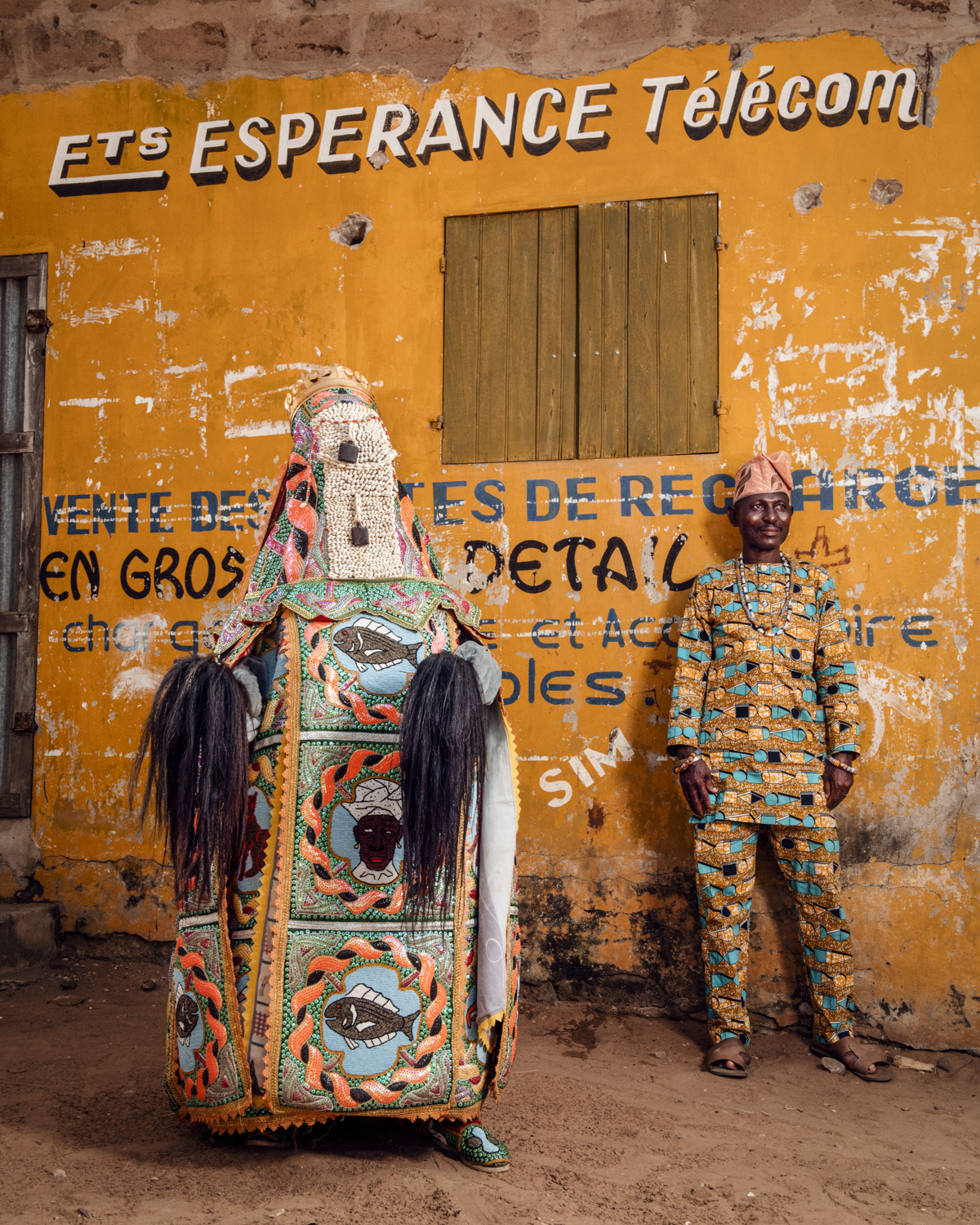
Egungun: Ancestor worship
In Africa, the dead of the family must be honored. For in many African cultures, death does not really exist; the spirit leaves the body to continue its life in the world of the dead, that of the ancestors.
Among the Yoruba, these dead manifest themselves to their descendants through an entity called EGOUN.
It is the spirit of the dead who returns to earth under beautiful loincloths decorated with applications of cut fabric, embroidered and adorned with shells and sequins, bone, and magic wood.
Family and clan societies, strictly reserved for men, have been formed around Egoun the revenant. They evoke the dead, call them and take care of them on earth.
Égoun serves as an intermediary with the souls in the afterlife.
He appears to certain families a few days after the death of one of its members, or during ceremonies performed to honor their memory; he also comes to bring the blessing of the ancestors to the marriages of their descendants and, in certain cases, to welcome a newborn child.
Offerings of food, drink and money are always made to him during his appearances.
EGOUN speaks with a deep, husky voice and dances readily to the sound of Bata or Ogbon drums.
The contact of his loincloth can be fatal to the living, so the MARIWOS (the guardians), members of the EGOUN society, always accompany them, carrying large engraved wooden sticks (lshan) to ward off the unwary. This stick symbolizes the border between the world of the dead (Kou-tome) and the world of the living. Ancestor worship in Africa is directed only to that part of the family that does not go back beyond the founder of the village or the house, that is, to the dynasty of the owners of the inhabited place.
With the exception of the royal families whose members are often deified and therefore have a more important lineage.
This cult is addressed to the deified ancestors and forms a vast system that unites the dead and the living in a continuous and united family whole.
The gods and the dead mix with the living, listen to their complaints, advise them, grant them graces, solve their difficulties and give them remedies for their pains and consolations for their misfortunes. The celestial world is not distant, nor is it superior, and the believer can speak directly with his gods and with his ancestors and benefit from their benevolence.
Each Yoruba clan honors its deceased ancestors in the hope of benefiting from their protection, avoiding their wrath, and keeping the ghosts away from the living.
He therefore regularly brings back the spirit of the ancestors from the realm of the dead (Kou-Tomé)
Each family clan of the ancestor cult has a convent.
It is a sacred place where the masks of the ghosts are kept. It is there that the adepts are trained in secret and that they put on the masks during the ceremonies.
The clan designates those who will be initiated and will have the responsibility of lending their bodies to the spirits of the ancestors and thus, will ensure the dialogue with the ancestors who have become protective deities.
Thus, one or more members of the family are designated, sometimes very young, to be these messengers of the afterlife.
They are taught in secret in a convent for several years, even decades.
There they learn the trance necessary to lend their bodies to the deities, a language that allows them to communicate with the invisible, and to create an appearance...
They emerge from it initiated to the rank of Egungun.
Apart from the initiates, no one knows who is Egungun because during the trances, they appear masked, their bodies totally hidden by their ceremonial costume.
The convent is exclusively reserved for initiates and men, on pain of death. The convent is directed by the Bale, who is generally the head of the family.
The general Alagba is the supreme chief, the king of the Egungun of a city, he watches over the convents of the city.
Egungun: Ancestor worship
In Africa, the dead of the family must be honored. For in many African cultures, death does not really exist; the spirit leaves the body to continue its life in the world of the dead, that of the ancestors.
Among the Yoruba, these dead manifest themselves to their descendants through an entity called EGOUN.
It is the spirit of the dead who returns to earth under beautiful loincloths decorated with applications of cut fabric, embroidered and adorned with shells and sequins, bone, and magic wood.
Family and clan societies, strictly reserved for men, have been formed around Egoun the revenant. They evoke the dead, call them and take care of them on earth.
Égoun serves as an intermediary with the souls in the afterlife.
He appears to certain families a few days after the death of one of its members, or during ceremonies performed to honor their memory; he also comes to bring the blessing of the ancestors to the marriages of their descendants and, in certain cases, to welcome a newborn child.
Offerings of food, drink and money are always made to him during his appearances.
EGOUN speaks with a deep, husky voice and dances readily to the sound of Bata or Ogbon drums.
The contact of his loincloth can be fatal to the living, so the MARIWOS (the guardians), members of the EGOUN society, always accompany them, carrying large engraved wooden sticks (lshan) to ward off the unwary. This stick symbolizes the border between the world of the dead (Kou-tome) and the world of the living. Ancestor worship in Africa is directed only to that part of the family that does not go back beyond the founder of the village or the house, that is, to the dynasty of the owners of the inhabited place.
With the exception of the royal families whose members are often deified and therefore have a more important lineage.
This cult is addressed to the deified ancestors and forms a vast system that unites the dead and the living in a continuous and united family whole.
The gods and the dead mix with the living, listen to their complaints, advise them, grant them graces, solve their difficulties and give them remedies for their pains and consolations for their misfortunes. The celestial world is not distant, nor is it superior, and the believer can speak directly with his gods and with his ancestors and benefit from their benevolence.
Each Yoruba clan honors its deceased ancestors in the hope of benefiting from their protection, avoiding their wrath, and keeping the ghosts away from the living.
He therefore regularly brings back the spirit of the ancestors from the realm of the dead (Kou-Tomé)
Each family clan of the ancestor cult has a convent.
It is a sacred place where the masks of the ghosts are kept. It is there that the adepts are trained in secret and that they put on the masks during the ceremonies.
The clan designates those who will be initiated and will have the responsibility of lending their bodies to the spirits of the ancestors and thus, will ensure the dialogue with the ancestors who have become protective deities.
Thus, one or more members of the family are designated, sometimes very young, to be these messengers of the afterlife.
They are taught in secret in a convent for several years, even decades.
There they learn the trance necessary to lend their bodies to the deities, a language that allows them to communicate with the invisible, and to create an appearance...
They emerge from it initiated to the rank of Egungun.
Apart from the initiates, no one knows who is Egungun because during the trances, they appear masked, their bodies totally hidden by their ceremonial costume.
The convent is exclusively reserved for initiates and men, on pain of death. The convent is directed by the Bale, who is generally the head of the family.
The general Alagba is the supreme chief, the king of the Egungun of a city, he watches over the convents of the city.
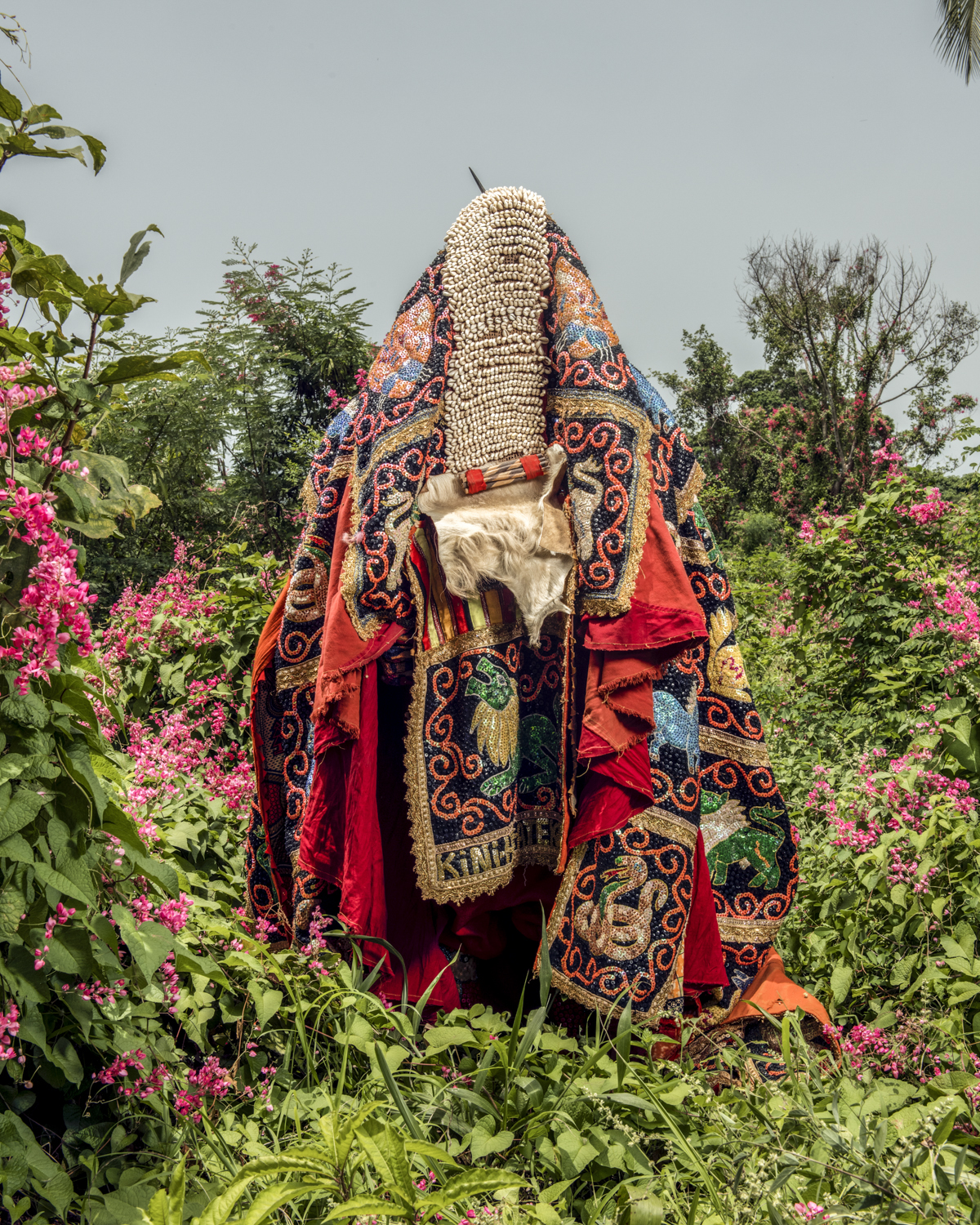
Egungun: Ancestor worship
In Africa, the dead of the family must be honored. For in many African cultures, death does not really exist; the spirit leaves the body to continue its life in the world of the dead, that of the ancestors.
Among the Yoruba, these dead manifest themselves to their descendants through an entity called EGOUN.
It is the spirit of the dead who returns to earth under beautiful loincloths decorated with applications of cut fabric, embroidered and adorned with shells and sequins, bone, and magic wood.
Family and clan societies, strictly reserved for men, have been formed around Egoun the revenant. They evoke the dead, call them and take care of them on earth.
Égoun serves as an intermediary with the souls in the afterlife.
He appears to certain families a few days after the death of one of its members, or during ceremonies performed to honor their memory; he also comes to bring the blessing of the ancestors to the marriages of their descendants and, in certain cases, to welcome a newborn child.
Offerings of food, drink and money are always made to him during his appearances.
EGOUN speaks with a deep, husky voice and dances readily to the sound of Bata or Ogbon drums.
The contact of his loincloth can be fatal to the living, so the MARIWOS (the guardians), members of the EGOUN society, always accompany them, carrying large engraved wooden sticks (lshan) to ward off the unwary. This stick symbolizes the border between the world of the dead (Kou-tome) and the world of the living. Ancestor worship in Africa is directed only to that part of the family that does not go back beyond the founder of the village or the house, that is, to the dynasty of the owners of the inhabited place.
With the exception of the royal families whose members are often deified and therefore have a more important lineage.
This cult is addressed to the deified ancestors and forms a vast system that unites the dead and the living in a continuous and united family whole.
The gods and the dead mix with the living, listen to their complaints, advise them, grant them graces, solve their difficulties and give them remedies for their pains and consolations for their misfortunes. The celestial world is not distant, nor is it superior, and the believer can speak directly with his gods and with his ancestors and benefit from their benevolence.
Each Yoruba clan honors its deceased ancestors in the hope of benefiting from their protection, avoiding their wrath, and keeping the ghosts away from the living.
He therefore regularly brings back the spirit of the ancestors from the realm of the dead (Kou-Tomé)
Each family clan of the ancestor cult has a convent.
It is a sacred place where the masks of the ghosts are kept. It is there that the adepts are trained in secret and that they put on the masks during the ceremonies.
The clan designates those who will be initiated and will have the responsibility of lending their bodies to the spirits of the ancestors and thus, will ensure the dialogue with the ancestors who have become protective deities.
Thus, one or more members of the family are designated, sometimes very young, to be these messengers of the afterlife.
They are taught in secret in a convent for several years, even decades.
There they learn the trance necessary to lend their bodies to the deities, a language that allows them to communicate with the invisible, and to create an appearance...
They emerge from it initiated to the rank of Egungun.
Apart from the initiates, no one knows who is Egungun because during the trances, they appear masked, their bodies totally hidden by their ceremonial costume.
The convent is exclusively reserved for initiates and men, on pain of death. The convent is directed by the Bale, who is generally the head of the family.
The general Alagba is the supreme chief, the king of the Egungun of a city, he watches over the convents of the city.
Egungun: Ancestor worship
In Africa, the dead of the family must be honored. For in many African cultures, death does not really exist; the spirit leaves the body to continue its life in the world of the dead, that of the ancestors.
Among the Yoruba, these dead manifest themselves to their descendants through an entity called EGOUN.
It is the spirit of the dead who returns to earth under beautiful loincloths decorated with applications of cut fabric, embroidered and adorned with shells and sequins, bone, and magic wood.
Family and clan societies, strictly reserved for men, have been formed around Egoun the revenant. They evoke the dead, call them and take care of them on earth.
Égoun serves as an intermediary with the souls in the afterlife.
He appears to certain families a few days after the death of one of its members, or during ceremonies performed to honor their memory; he also comes to bring the blessing of the ancestors to the marriages of their descendants and, in certain cases, to welcome a newborn child.
Offerings of food, drink and money are always made to him during his appearances.
EGOUN speaks with a deep, husky voice and dances readily to the sound of Bata or Ogbon drums.
The contact of his loincloth can be fatal to the living, so the MARIWOS (the guardians), members of the EGOUN society, always accompany them, carrying large engraved wooden sticks (lshan) to ward off the unwary. This stick symbolizes the border between the world of the dead (Kou-tome) and the world of the living. Ancestor worship in Africa is directed only to that part of the family that does not go back beyond the founder of the village or the house, that is, to the dynasty of the owners of the inhabited place.
With the exception of the royal families whose members are often deified and therefore have a more important lineage.
This cult is addressed to the deified ancestors and forms a vast system that unites the dead and the living in a continuous and united family whole.
The gods and the dead mix with the living, listen to their complaints, advise them, grant them graces, solve their difficulties and give them remedies for their pains and consolations for their misfortunes. The celestial world is not distant, nor is it superior, and the believer can speak directly with his gods and with his ancestors and benefit from their benevolence.
Each Yoruba clan honors its deceased ancestors in the hope of benefiting from their protection, avoiding their wrath, and keeping the ghosts away from the living.
He therefore regularly brings back the spirit of the ancestors from the realm of the dead (Kou-Tomé)
Each family clan of the ancestor cult has a convent.
It is a sacred place where the masks of the ghosts are kept. It is there that the adepts are trained in secret and that they put on the masks during the ceremonies.
The clan designates those who will be initiated and will have the responsibility of lending their bodies to the spirits of the ancestors and thus, will ensure the dialogue with the ancestors who have become protective deities.
Thus, one or more members of the family are designated, sometimes very young, to be these messengers of the afterlife.
They are taught in secret in a convent for several years, even decades.
There they learn the trance necessary to lend their bodies to the deities, a language that allows them to communicate with the invisible, and to create an appearance...
They emerge from it initiated to the rank of Egungun.
Apart from the initiates, no one knows who is Egungun because during the trances, they appear masked, their bodies totally hidden by their ceremonial costume.
The convent is exclusively reserved for initiates and men, on pain of death. The convent is directed by the Bale, who is generally the head of the family.
The general Alagba is the supreme chief, the king of the Egungun of a city, he watches over the convents of the city.
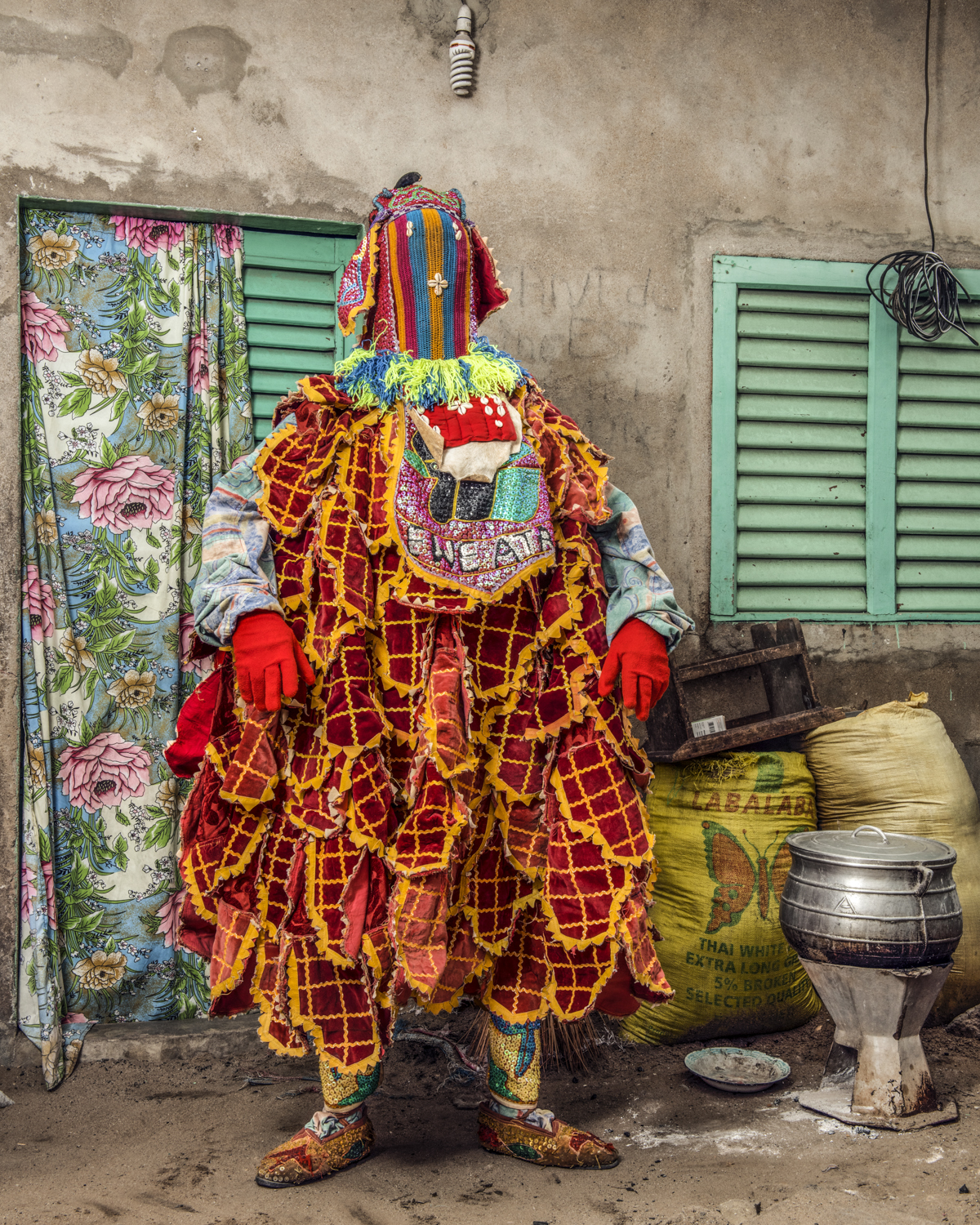
Egungun: Ancestor worship
In Africa, the dead of the family must be honored. For in many African cultures, death does not really exist; the spirit leaves the body to continue its life in the world of the dead, that of the ancestors.
Among the Yoruba, these dead manifest themselves to their descendants through an entity called EGOUN.
It is the spirit of the dead who returns to earth under beautiful loincloths decorated with applications of cut fabric, embroidered and adorned with shells and sequins, bone, and magic wood.
Family and clan societies, strictly reserved for men, have been formed around Egoun the revenant. They evoke the dead, call them and take care of them on earth.
Égoun serves as an intermediary with the souls in the afterlife.
He appears to certain families a few days after the death of one of its members, or during ceremonies performed to honor their memory; he also comes to bring the blessing of the ancestors to the marriages of their descendants and, in certain cases, to welcome a newborn child.
Offerings of food, drink and money are always made to him during his appearances.
EGOUN speaks with a deep, husky voice and dances readily to the sound of Bata or Ogbon drums.
The contact of his loincloth can be fatal to the living, so the MARIWOS (the guardians), members of the EGOUN society, always accompany them, carrying large engraved wooden sticks (lshan) to ward off the unwary. This stick symbolizes the border between the world of the dead (Kou-tome) and the world of the living. Ancestor worship in Africa is directed only to that part of the family that does not go back beyond the founder of the village or the house, that is, to the dynasty of the owners of the inhabited place.
With the exception of the royal families whose members are often deified and therefore have a more important lineage.
This cult is addressed to the deified ancestors and forms a vast system that unites the dead and the living in a continuous and united family whole.
The gods and the dead mix with the living, listen to their complaints, advise them, grant them graces, solve their difficulties and give them remedies for their pains and consolations for their misfortunes. The celestial world is not distant, nor is it superior, and the believer can speak directly with his gods and with his ancestors and benefit from their benevolence.
Each Yoruba clan honors its deceased ancestors in the hope of benefiting from their protection, avoiding their wrath, and keeping the ghosts away from the living.
He therefore regularly brings back the spirit of the ancestors from the realm of the dead (Kou-Tomé)
Each family clan of the ancestor cult has a convent.
It is a sacred place where the masks of the ghosts are kept. It is there that the adepts are trained in secret and that they put on the masks during the ceremonies.
The clan designates those who will be initiated and will have the responsibility of lending their bodies to the spirits of the ancestors and thus, will ensure the dialogue with the ancestors who have become protective deities.
Thus, one or more members of the family are designated, sometimes very young, to be these messengers of the afterlife.
They are taught in secret in a convent for several years, even decades.
There they learn the trance necessary to lend their bodies to the deities, a language that allows them to communicate with the invisible, and to create an appearance...
They emerge from it initiated to the rank of Egungun.
Apart from the initiates, no one knows who is Egungun because during the trances, they appear masked, their bodies totally hidden by their ceremonial costume.
The convent is exclusively reserved for initiates and men, on pain of death. The convent is directed by the Bale, who is generally the head of the family.
The general Alagba is the supreme chief, the king of the Egungun of a city, he watches over the convents of the city.
Egungun: Ancestor worship
In Africa, the dead of the family must be honored. For in many African cultures, death does not really exist; the spirit leaves the body to continue its life in the world of the dead, that of the ancestors.
Among the Yoruba, these dead manifest themselves to their descendants through an entity called EGOUN.
It is the spirit of the dead who returns to earth under beautiful loincloths decorated with applications of cut fabric, embroidered and adorned with shells and sequins, bone, and magic wood.
Family and clan societies, strictly reserved for men, have been formed around Egoun the revenant. They evoke the dead, call them and take care of them on earth.
Égoun serves as an intermediary with the souls in the afterlife.
He appears to certain families a few days after the death of one of its members, or during ceremonies performed to honor their memory; he also comes to bring the blessing of the ancestors to the marriages of their descendants and, in certain cases, to welcome a newborn child.
Offerings of food, drink and money are always made to him during his appearances.
EGOUN speaks with a deep, husky voice and dances readily to the sound of Bata or Ogbon drums.
The contact of his loincloth can be fatal to the living, so the MARIWOS (the guardians), members of the EGOUN society, always accompany them, carrying large engraved wooden sticks (lshan) to ward off the unwary. This stick symbolizes the border between the world of the dead (Kou-tome) and the world of the living. Ancestor worship in Africa is directed only to that part of the family that does not go back beyond the founder of the village or the house, that is, to the dynasty of the owners of the inhabited place.
With the exception of the royal families whose members are often deified and therefore have a more important lineage.
This cult is addressed to the deified ancestors and forms a vast system that unites the dead and the living in a continuous and united family whole.
The gods and the dead mix with the living, listen to their complaints, advise them, grant them graces, solve their difficulties and give them remedies for their pains and consolations for their misfortunes. The celestial world is not distant, nor is it superior, and the believer can speak directly with his gods and with his ancestors and benefit from their benevolence.
Each Yoruba clan honors its deceased ancestors in the hope of benefiting from their protection, avoiding their wrath, and keeping the ghosts away from the living.
He therefore regularly brings back the spirit of the ancestors from the realm of the dead (Kou-Tomé)
Each family clan of the ancestor cult has a convent.
It is a sacred place where the masks of the ghosts are kept. It is there that the adepts are trained in secret and that they put on the masks during the ceremonies.
The clan designates those who will be initiated and will have the responsibility of lending their bodies to the spirits of the ancestors and thus, will ensure the dialogue with the ancestors who have become protective deities.
Thus, one or more members of the family are designated, sometimes very young, to be these messengers of the afterlife.
They are taught in secret in a convent for several years, even decades.
There they learn the trance necessary to lend their bodies to the deities, a language that allows them to communicate with the invisible, and to create an appearance...
They emerge from it initiated to the rank of Egungun.
Apart from the initiates, no one knows who is Egungun because during the trances, they appear masked, their bodies totally hidden by their ceremonial costume.
The convent is exclusively reserved for initiates and men, on pain of death. The convent is directed by the Bale, who is generally the head of the family.
The general Alagba is the supreme chief, the king of the Egungun of a city, he watches over the convents of the city.

Egungun: Ancestor worship
In Africa, the dead of the family must be honored. For in many African cultures, death does not really exist; the spirit leaves the body to continue its life in the world of the dead, that of the ancestors.
Among the Yoruba, these dead manifest themselves to their descendants through an entity called EGOUN.
It is the spirit of the dead who returns to earth under beautiful loincloths decorated with applications of cut fabric, embroidered and adorned with shells and sequins, bone, and magic wood.
Family and clan societies, strictly reserved for men, have been formed around Egoun the revenant. They evoke the dead, call them and take care of them on earth.
Égoun serves as an intermediary with the souls in the afterlife.
He appears to certain families a few days after the death of one of its members, or during ceremonies performed to honor their memory; he also comes to bring the blessing of the ancestors to the marriages of their descendants and, in certain cases, to welcome a newborn child.
Offerings of food, drink and money are always made to him during his appearances.
EGOUN speaks with a deep, husky voice and dances readily to the sound of Bata or Ogbon drums.
The contact of his loincloth can be fatal to the living, so the MARIWOS (the guardians), members of the EGOUN society, always accompany them, carrying large engraved wooden sticks (lshan) to ward off the unwary. This stick symbolizes the border between the world of the dead (Kou-tome) and the world of the living. Ancestor worship in Africa is directed only to that part of the family that does not go back beyond the founder of the village or the house, that is, to the dynasty of the owners of the inhabited place.
With the exception of the royal families whose members are often deified and therefore have a more important lineage.
This cult is addressed to the deified ancestors and forms a vast system that unites the dead and the living in a continuous and united family whole.
The gods and the dead mix with the living, listen to their complaints, advise them, grant them graces, solve their difficulties and give them remedies for their pains and consolations for their misfortunes. The celestial world is not distant, nor is it superior, and the believer can speak directly with his gods and with his ancestors and benefit from their benevolence.
Each Yoruba clan honors its deceased ancestors in the hope of benefiting from their protection, avoiding their wrath, and keeping the ghosts away from the living.
He therefore regularly brings back the spirit of the ancestors from the realm of the dead (Kou-Tomé)
Each family clan of the ancestor cult has a convent.
It is a sacred place where the masks of the ghosts are kept. It is there that the adepts are trained in secret and that they put on the masks during the ceremonies.
The clan designates those who will be initiated and will have the responsibility of lending their bodies to the spirits of the ancestors and thus, will ensure the dialogue with the ancestors who have become protective deities.
Thus, one or more members of the family are designated, sometimes very young, to be these messengers of the afterlife.
They are taught in secret in a convent for several years, even decades.
There they learn the trance necessary to lend their bodies to the deities, a language that allows them to communicate with the invisible, and to create an appearance...
They emerge from it initiated to the rank of Egungun.
Apart from the initiates, no one knows who is Egungun because during the trances, they appear masked, their bodies totally hidden by their ceremonial costume.
The convent is exclusively reserved for initiates and men, on pain of death. The convent is directed by the Bale, who is generally the head of the family.
The general Alagba is the supreme chief, the king of the Egungun of a city, he watches over the convents of the city.
Egungun: Ancestor worship
In Africa, the dead of the family must be honored. For in many African cultures, death does not really exist; the spirit leaves the body to continue its life in the world of the dead, that of the ancestors.
Among the Yoruba, these dead manifest themselves to their descendants through an entity called EGOUN.
It is the spirit of the dead who returns to earth under beautiful loincloths decorated with applications of cut fabric, embroidered and adorned with shells and sequins, bone, and magic wood.
Family and clan societies, strictly reserved for men, have been formed around Egoun the revenant. They evoke the dead, call them and take care of them on earth.
Égoun serves as an intermediary with the souls in the afterlife.
He appears to certain families a few days after the death of one of its members, or during ceremonies performed to honor their memory; he also comes to bring the blessing of the ancestors to the marriages of their descendants and, in certain cases, to welcome a newborn child.
Offerings of food, drink and money are always made to him during his appearances.
EGOUN speaks with a deep, husky voice and dances readily to the sound of Bata or Ogbon drums.
The contact of his loincloth can be fatal to the living, so the MARIWOS (the guardians), members of the EGOUN society, always accompany them, carrying large engraved wooden sticks (lshan) to ward off the unwary. This stick symbolizes the border between the world of the dead (Kou-tome) and the world of the living. Ancestor worship in Africa is directed only to that part of the family that does not go back beyond the founder of the village or the house, that is, to the dynasty of the owners of the inhabited place.
With the exception of the royal families whose members are often deified and therefore have a more important lineage.
This cult is addressed to the deified ancestors and forms a vast system that unites the dead and the living in a continuous and united family whole.
The gods and the dead mix with the living, listen to their complaints, advise them, grant them graces, solve their difficulties and give them remedies for their pains and consolations for their misfortunes. The celestial world is not distant, nor is it superior, and the believer can speak directly with his gods and with his ancestors and benefit from their benevolence.
Each Yoruba clan honors its deceased ancestors in the hope of benefiting from their protection, avoiding their wrath, and keeping the ghosts away from the living.
He therefore regularly brings back the spirit of the ancestors from the realm of the dead (Kou-Tomé)
Each family clan of the ancestor cult has a convent.
It is a sacred place where the masks of the ghosts are kept. It is there that the adepts are trained in secret and that they put on the masks during the ceremonies.
The clan designates those who will be initiated and will have the responsibility of lending their bodies to the spirits of the ancestors and thus, will ensure the dialogue with the ancestors who have become protective deities.
Thus, one or more members of the family are designated, sometimes very young, to be these messengers of the afterlife.
They are taught in secret in a convent for several years, even decades.
There they learn the trance necessary to lend their bodies to the deities, a language that allows them to communicate with the invisible, and to create an appearance...
They emerge from it initiated to the rank of Egungun.
Apart from the initiates, no one knows who is Egungun because during the trances, they appear masked, their bodies totally hidden by their ceremonial costume.
The convent is exclusively reserved for initiates and men, on pain of death. The convent is directed by the Bale, who is generally the head of the family.
The general Alagba is the supreme chief, the king of the Egungun of a city, he watches over the convents of the city.
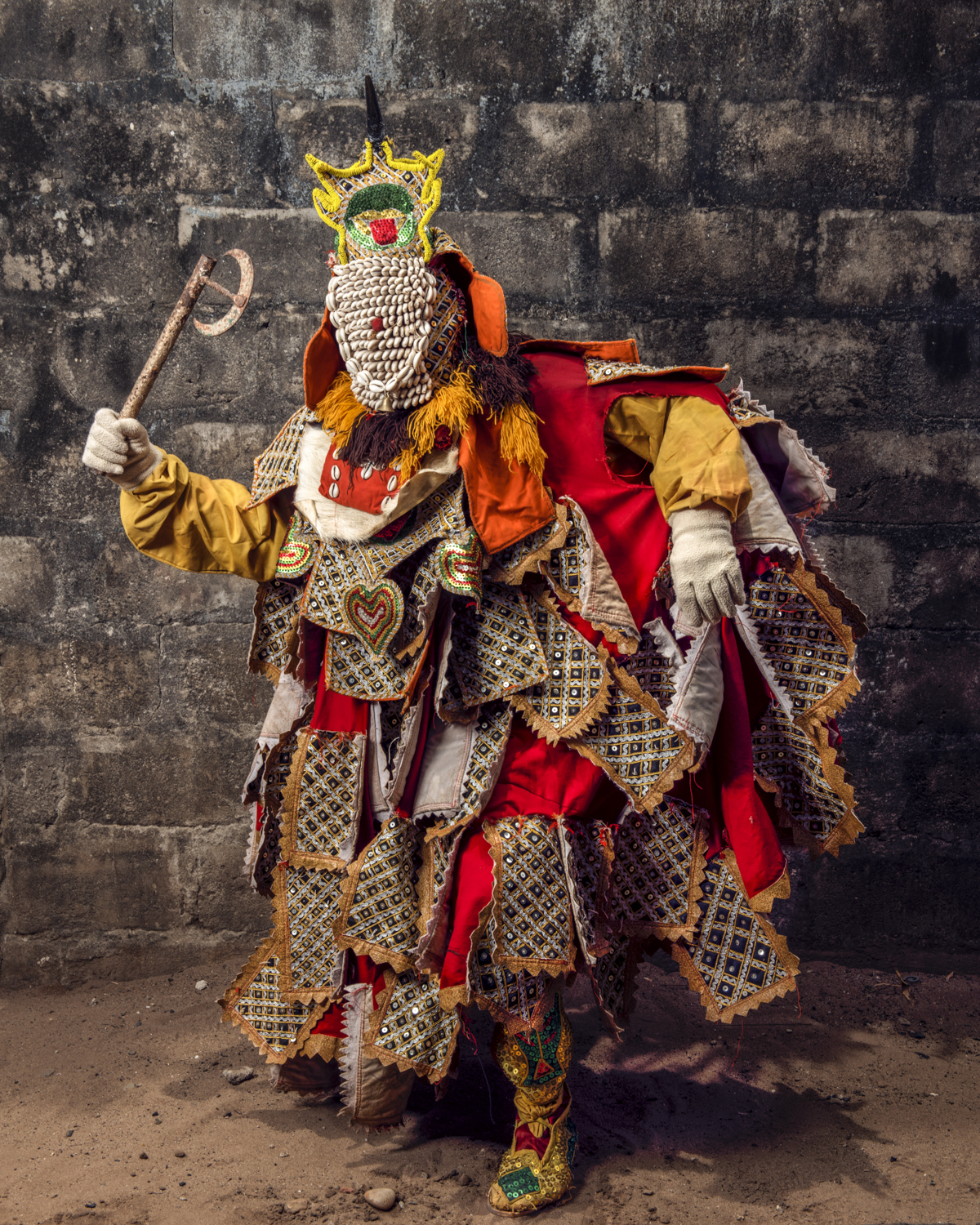
Egungun: Ancestor worship
In Africa, the dead of the family must be honored. For in many African cultures, death does not really exist; the spirit leaves the body to continue its life in the world of the dead, that of the ancestors.
Among the Yoruba, these dead manifest themselves to their descendants through an entity called EGOUN.
It is the spirit of the dead who returns to earth under beautiful loincloths decorated with applications of cut fabric, embroidered and adorned with shells and sequins, bone, and magic wood.
Family and clan societies, strictly reserved for men, have been formed around Egoun the revenant. They evoke the dead, call them and take care of them on earth.
Égoun serves as an intermediary with the souls in the afterlife.
He appears to certain families a few days after the death of one of its members, or during ceremonies performed to honor their memory; he also comes to bring the blessing of the ancestors to the marriages of their descendants and, in certain cases, to welcome a newborn child.
Offerings of food, drink and money are always made to him during his appearances.
EGOUN speaks with a deep, husky voice and dances readily to the sound of Bata or Ogbon drums.
The contact of his loincloth can be fatal to the living, so the MARIWOS (the guardians), members of the EGOUN society, always accompany them, carrying large engraved wooden sticks (lshan) to ward off the unwary. This stick symbolizes the border between the world of the dead (Kou-tome) and the world of the living. Ancestor worship in Africa is directed only to that part of the family that does not go back beyond the founder of the village or the house, that is, to the dynasty of the owners of the inhabited place.
With the exception of the royal families whose members are often deified and therefore have a more important lineage.
This cult is addressed to the deified ancestors and forms a vast system that unites the dead and the living in a continuous and united family whole.
The gods and the dead mix with the living, listen to their complaints, advise them, grant them graces, solve their difficulties and give them remedies for their pains and consolations for their misfortunes. The celestial world is not distant, nor is it superior, and the believer can speak directly with his gods and with his ancestors and benefit from their benevolence.
Each Yoruba clan honors its deceased ancestors in the hope of benefiting from their protection, avoiding their wrath, and keeping the ghosts away from the living.
He therefore regularly brings back the spirit of the ancestors from the realm of the dead (Kou-Tomé)
Each family clan of the ancestor cult has a convent.
It is a sacred place where the masks of the ghosts are kept. It is there that the adepts are trained in secret and that they put on the masks during the ceremonies.
The clan designates those who will be initiated and will have the responsibility of lending their bodies to the spirits of the ancestors and thus, will ensure the dialogue with the ancestors who have become protective deities.
Thus, one or more members of the family are designated, sometimes very young, to be these messengers of the afterlife.
They are taught in secret in a convent for several years, even decades.
There they learn the trance necessary to lend their bodies to the deities, a language that allows them to communicate with the invisible, and to create an appearance...
They emerge from it initiated to the rank of Egungun.
Apart from the initiates, no one knows who is Egungun because during the trances, they appear masked, their bodies totally hidden by their ceremonial costume.
The convent is exclusively reserved for initiates and men, on pain of death. The convent is directed by the Bale, who is generally the head of the family.
The general Alagba is the supreme chief, the king of the Egungun of a city, he watches over the convents of the city.
Egungun: Ancestor worship
In Africa, the dead of the family must be honored. For in many African cultures, death does not really exist; the spirit leaves the body to continue its life in the world of the dead, that of the ancestors.
Among the Yoruba, these dead manifest themselves to their descendants through an entity called EGOUN.
It is the spirit of the dead who returns to earth under beautiful loincloths decorated with applications of cut fabric, embroidered and adorned with shells and sequins, bone, and magic wood.
Family and clan societies, strictly reserved for men, have been formed around Egoun the revenant. They evoke the dead, call them and take care of them on earth.
Égoun serves as an intermediary with the souls in the afterlife.
He appears to certain families a few days after the death of one of its members, or during ceremonies performed to honor their memory; he also comes to bring the blessing of the ancestors to the marriages of their descendants and, in certain cases, to welcome a newborn child.
Offerings of food, drink and money are always made to him during his appearances.
EGOUN speaks with a deep, husky voice and dances readily to the sound of Bata or Ogbon drums.
The contact of his loincloth can be fatal to the living, so the MARIWOS (the guardians), members of the EGOUN society, always accompany them, carrying large engraved wooden sticks (lshan) to ward off the unwary. This stick symbolizes the border between the world of the dead (Kou-tome) and the world of the living. Ancestor worship in Africa is directed only to that part of the family that does not go back beyond the founder of the village or the house, that is, to the dynasty of the owners of the inhabited place.
With the exception of the royal families whose members are often deified and therefore have a more important lineage.
This cult is addressed to the deified ancestors and forms a vast system that unites the dead and the living in a continuous and united family whole.
The gods and the dead mix with the living, listen to their complaints, advise them, grant them graces, solve their difficulties and give them remedies for their pains and consolations for their misfortunes. The celestial world is not distant, nor is it superior, and the believer can speak directly with his gods and with his ancestors and benefit from their benevolence.
Each Yoruba clan honors its deceased ancestors in the hope of benefiting from their protection, avoiding their wrath, and keeping the ghosts away from the living.
He therefore regularly brings back the spirit of the ancestors from the realm of the dead (Kou-Tomé)
Each family clan of the ancestor cult has a convent.
It is a sacred place where the masks of the ghosts are kept. It is there that the adepts are trained in secret and that they put on the masks during the ceremonies.
The clan designates those who will be initiated and will have the responsibility of lending their bodies to the spirits of the ancestors and thus, will ensure the dialogue with the ancestors who have become protective deities.
Thus, one or more members of the family are designated, sometimes very young, to be these messengers of the afterlife.
They are taught in secret in a convent for several years, even decades.
There they learn the trance necessary to lend their bodies to the deities, a language that allows them to communicate with the invisible, and to create an appearance...
They emerge from it initiated to the rank of Egungun.
Apart from the initiates, no one knows who is Egungun because during the trances, they appear masked, their bodies totally hidden by their ceremonial costume.
The convent is exclusively reserved for initiates and men, on pain of death. The convent is directed by the Bale, who is generally the head of the family.
The general Alagba is the supreme chief, the king of the Egungun of a city, he watches over the convents of the city.
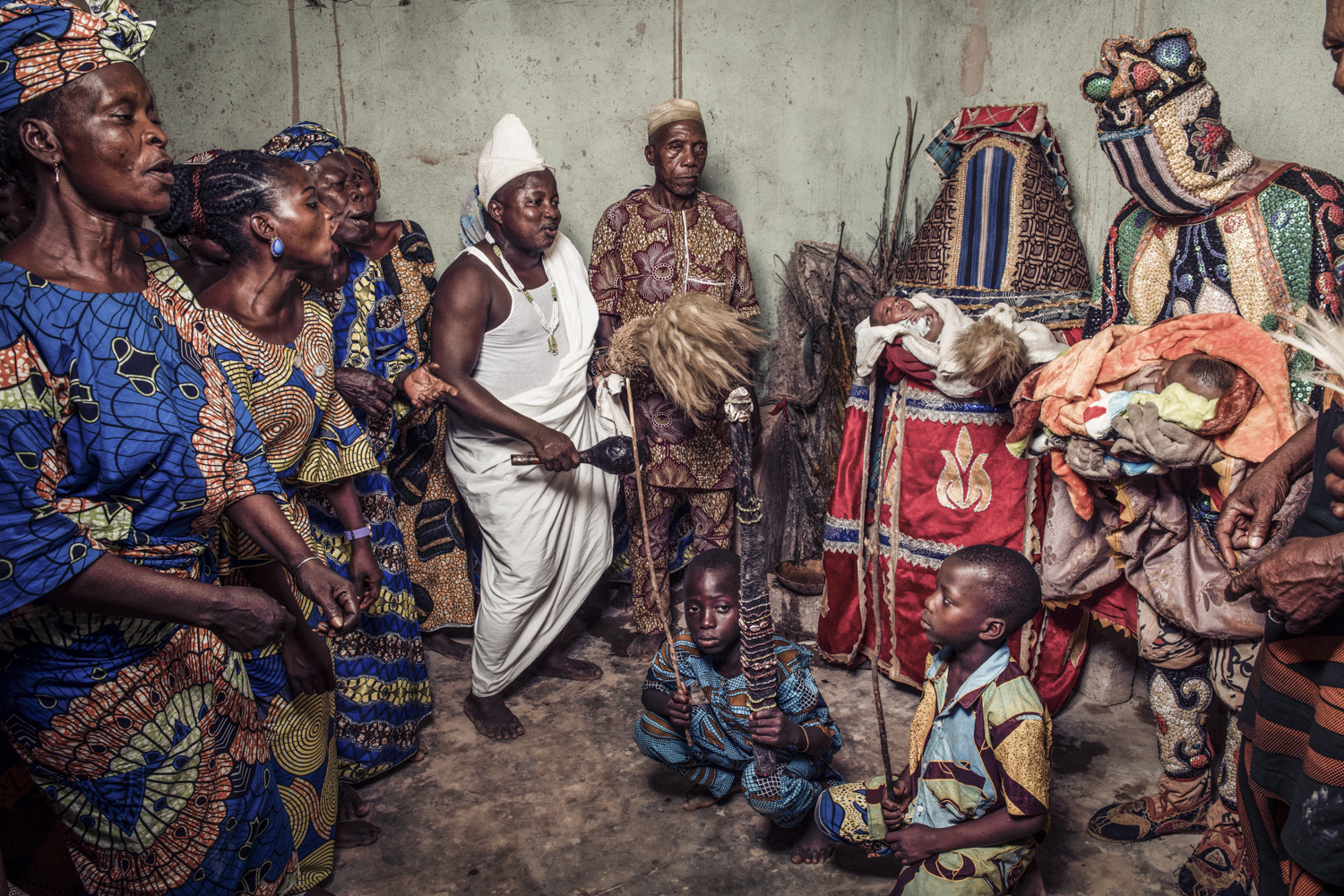
Egungun: Ancestor worship
In Africa, the dead of the family must be honored. For in many African cultures, death does not really exist; the spirit leaves the body to continue its life in the world of the dead, that of the ancestors.
Among the Yoruba, these dead manifest themselves to their descendants through an entity called EGOUN.
It is the spirit of the dead who returns to earth under beautiful loincloths decorated with applications of cut fabric, embroidered and adorned with shells and sequins, bone, and magic wood.
Family and clan societies, strictly reserved for men, have been formed around Egoun the revenant. They evoke the dead, call them and take care of them on earth.
Égoun serves as an intermediary with the souls in the afterlife.
He appears to certain families a few days after the death of one of its members, or during ceremonies performed to honor their memory; he also comes to bring the blessing of the ancestors to the marriages of their descendants and, in certain cases, to welcome a newborn child.
Offerings of food, drink and money are always made to him during his appearances.
EGOUN speaks with a deep, husky voice and dances readily to the sound of Bata or Ogbon drums.
The contact of his loincloth can be fatal to the living, so the MARIWOS (the guardians), members of the EGOUN society, always accompany them, carrying large engraved wooden sticks (lshan) to ward off the unwary. This stick symbolizes the border between the world of the dead (Kou-tome) and the world of the living. Ancestor worship in Africa is directed only to that part of the family that does not go back beyond the founder of the village or the house, that is, to the dynasty of the owners of the inhabited place.
With the exception of the royal families whose members are often deified and therefore have a more important lineage.
This cult is addressed to the deified ancestors and forms a vast system that unites the dead and the living in a continuous and united family whole.
The gods and the dead mix with the living, listen to their complaints, advise them, grant them graces, solve their difficulties and give them remedies for their pains and consolations for their misfortunes. The celestial world is not distant, nor is it superior, and the believer can speak directly with his gods and with his ancestors and benefit from their benevolence.
Each Yoruba clan honors its deceased ancestors in the hope of benefiting from their protection, avoiding their wrath, and keeping the ghosts away from the living.
He therefore regularly brings back the spirit of the ancestors from the realm of the dead (Kou-Tomé)
Each family clan of the ancestor cult has a convent.
It is a sacred place where the masks of the ghosts are kept. It is there that the adepts are trained in secret and that they put on the masks during the ceremonies.
The clan designates those who will be initiated and will have the responsibility of lending their bodies to the spirits of the ancestors and thus, will ensure the dialogue with the ancestors who have become protective deities.
Thus, one or more members of the family are designated, sometimes very young, to be these messengers of the afterlife.
They are taught in secret in a convent for several years, even decades.
There they learn the trance necessary to lend their bodies to the deities, a language that allows them to communicate with the invisible, and to create an appearance...
They emerge from it initiated to the rank of Egungun.
Apart from the initiates, no one knows who is Egungun because during the trances, they appear masked, their bodies totally hidden by their ceremonial costume.
The convent is exclusively reserved for initiates and men, on pain of death. The convent is directed by the Bale, who is generally the head of the family.
The general Alagba is the supreme chief, the king of the Egungun of a city, he watches over the convents of the city.
Egungun: Ancestor worship
In Africa, the dead of the family must be honored. For in many African cultures, death does not really exist; the spirit leaves the body to continue its life in the world of the dead, that of the ancestors.
Among the Yoruba, these dead manifest themselves to their descendants through an entity called EGOUN.
It is the spirit of the dead who returns to earth under beautiful loincloths decorated with applications of cut fabric, embroidered and adorned with shells and sequins, bone, and magic wood.
Family and clan societies, strictly reserved for men, have been formed around Egoun the revenant. They evoke the dead, call them and take care of them on earth.
Égoun serves as an intermediary with the souls in the afterlife.
He appears to certain families a few days after the death of one of its members, or during ceremonies performed to honor their memory; he also comes to bring the blessing of the ancestors to the marriages of their descendants and, in certain cases, to welcome a newborn child.
Offerings of food, drink and money are always made to him during his appearances.
EGOUN speaks with a deep, husky voice and dances readily to the sound of Bata or Ogbon drums.
The contact of his loincloth can be fatal to the living, so the MARIWOS (the guardians), members of the EGOUN society, always accompany them, carrying large engraved wooden sticks (lshan) to ward off the unwary. This stick symbolizes the border between the world of the dead (Kou-tome) and the world of the living. Ancestor worship in Africa is directed only to that part of the family that does not go back beyond the founder of the village or the house, that is, to the dynasty of the owners of the inhabited place.
With the exception of the royal families whose members are often deified and therefore have a more important lineage.
This cult is addressed to the deified ancestors and forms a vast system that unites the dead and the living in a continuous and united family whole.
The gods and the dead mix with the living, listen to their complaints, advise them, grant them graces, solve their difficulties and give them remedies for their pains and consolations for their misfortunes. The celestial world is not distant, nor is it superior, and the believer can speak directly with his gods and with his ancestors and benefit from their benevolence.
Each Yoruba clan honors its deceased ancestors in the hope of benefiting from their protection, avoiding their wrath, and keeping the ghosts away from the living.
He therefore regularly brings back the spirit of the ancestors from the realm of the dead (Kou-Tomé)
Each family clan of the ancestor cult has a convent.
It is a sacred place where the masks of the ghosts are kept. It is there that the adepts are trained in secret and that they put on the masks during the ceremonies.
The clan designates those who will be initiated and will have the responsibility of lending their bodies to the spirits of the ancestors and thus, will ensure the dialogue with the ancestors who have become protective deities.
Thus, one or more members of the family are designated, sometimes very young, to be these messengers of the afterlife.
They are taught in secret in a convent for several years, even decades.
There they learn the trance necessary to lend their bodies to the deities, a language that allows them to communicate with the invisible, and to create an appearance...
They emerge from it initiated to the rank of Egungun.
Apart from the initiates, no one knows who is Egungun because during the trances, they appear masked, their bodies totally hidden by their ceremonial costume.
The convent is exclusively reserved for initiates and men, on pain of death. The convent is directed by the Bale, who is generally the head of the family.
The general Alagba is the supreme chief, the king of the Egungun of a city, he watches over the convents of the city.
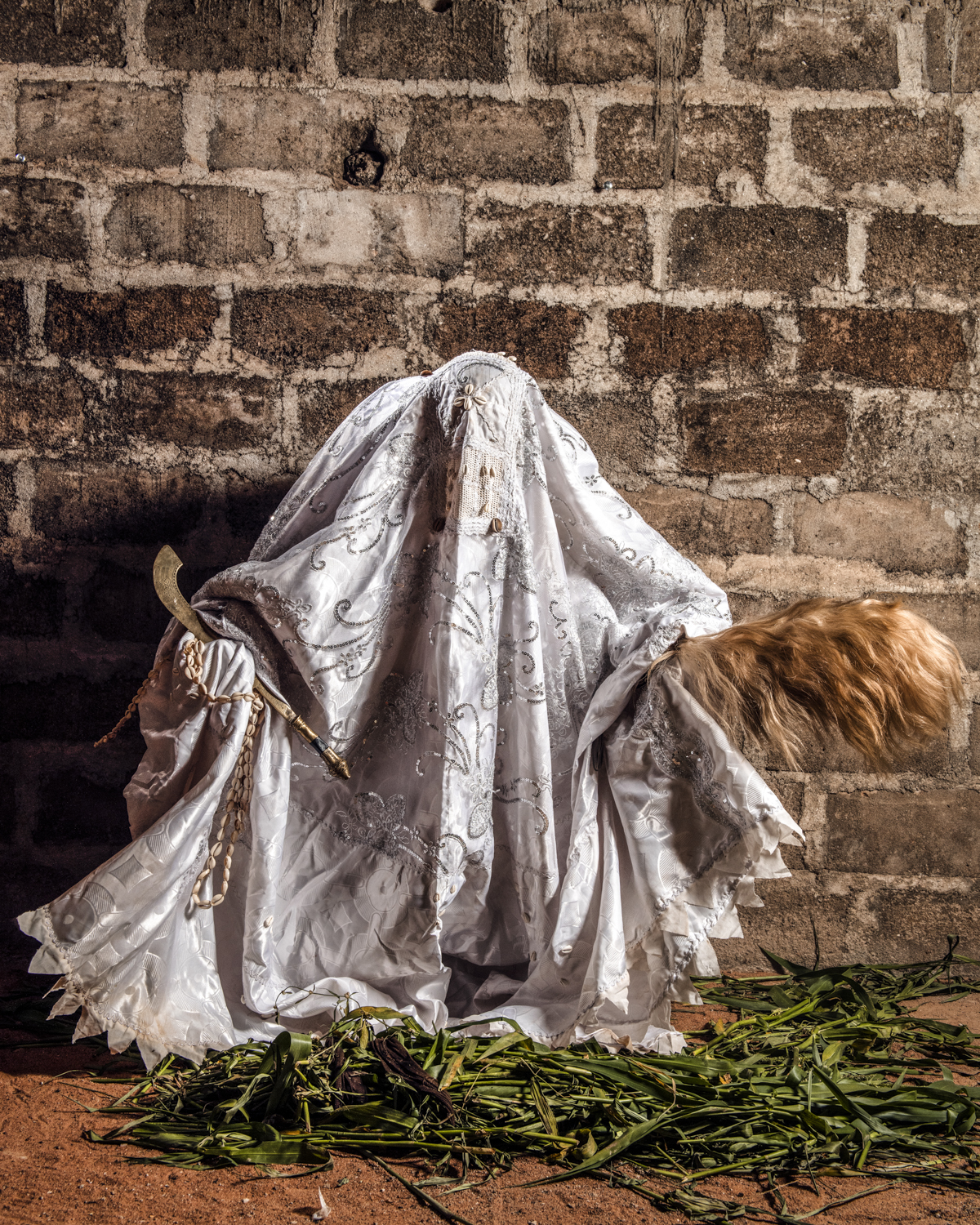
Egungun: Ancestor worship
In Africa, the dead of the family must be honored. For in many African cultures, death does not really exist; the spirit leaves the body to continue its life in the world of the dead, that of the ancestors.
Among the Yoruba, these dead manifest themselves to their descendants through an entity called EGOUN.
It is the spirit of the dead who returns to earth under beautiful loincloths decorated with applications of cut fabric, embroidered and adorned with shells and sequins, bone, and magic wood.
Family and clan societies, strictly reserved for men, have been formed around Egoun the revenant. They evoke the dead, call them and take care of them on earth.
Égoun serves as an intermediary with the souls in the afterlife.
He appears to certain families a few days after the death of one of its members, or during ceremonies performed to honor their memory; he also comes to bring the blessing of the ancestors to the marriages of their descendants and, in certain cases, to welcome a newborn child.
Offerings of food, drink and money are always made to him during his appearances.
EGOUN speaks with a deep, husky voice and dances readily to the sound of Bata or Ogbon drums.
The contact of his loincloth can be fatal to the living, so the MARIWOS (the guardians), members of the EGOUN society, always accompany them, carrying large engraved wooden sticks (lshan) to ward off the unwary. This stick symbolizes the border between the world of the dead (Kou-tome) and the world of the living. Ancestor worship in Africa is directed only to that part of the family that does not go back beyond the founder of the village or the house, that is, to the dynasty of the owners of the inhabited place.
With the exception of the royal families whose members are often deified and therefore have a more important lineage.
This cult is addressed to the deified ancestors and forms a vast system that unites the dead and the living in a continuous and united family whole.
The gods and the dead mix with the living, listen to their complaints, advise them, grant them graces, solve their difficulties and give them remedies for their pains and consolations for their misfortunes. The celestial world is not distant, nor is it superior, and the believer can speak directly with his gods and with his ancestors and benefit from their benevolence.
Each Yoruba clan honors its deceased ancestors in the hope of benefiting from their protection, avoiding their wrath, and keeping the ghosts away from the living.
He therefore regularly brings back the spirit of the ancestors from the realm of the dead (Kou-Tomé)
Each family clan of the ancestor cult has a convent.
It is a sacred place where the masks of the ghosts are kept. It is there that the adepts are trained in secret and that they put on the masks during the ceremonies.
The clan designates those who will be initiated and will have the responsibility of lending their bodies to the spirits of the ancestors and thus, will ensure the dialogue with the ancestors who have become protective deities.
Thus, one or more members of the family are designated, sometimes very young, to be these messengers of the afterlife.
They are taught in secret in a convent for several years, even decades.
There they learn the trance necessary to lend their bodies to the deities, a language that allows them to communicate with the invisible, and to create an appearance...
They emerge from it initiated to the rank of Egungun.
Apart from the initiates, no one knows who is Egungun because during the trances, they appear masked, their bodies totally hidden by their ceremonial costume.
The convent is exclusively reserved for initiates and men, on pain of death. The convent is directed by the Bale, who is generally the head of the family.
The general Alagba is the supreme chief, the king of the Egungun of a city, he watches over the convents of the city.
Egungun: Ancestor worship
In Africa, the dead of the family must be honored. For in many African cultures, death does not really exist; the spirit leaves the body to continue its life in the world of the dead, that of the ancestors.
Among the Yoruba, these dead manifest themselves to their descendants through an entity called EGOUN.
It is the spirit of the dead who returns to earth under beautiful loincloths decorated with applications of cut fabric, embroidered and adorned with shells and sequins, bone, and magic wood.
Family and clan societies, strictly reserved for men, have been formed around Egoun the revenant. They evoke the dead, call them and take care of them on earth.
Égoun serves as an intermediary with the souls in the afterlife.
He appears to certain families a few days after the death of one of its members, or during ceremonies performed to honor their memory; he also comes to bring the blessing of the ancestors to the marriages of their descendants and, in certain cases, to welcome a newborn child.
Offerings of food, drink and money are always made to him during his appearances.
EGOUN speaks with a deep, husky voice and dances readily to the sound of Bata or Ogbon drums.
The contact of his loincloth can be fatal to the living, so the MARIWOS (the guardians), members of the EGOUN society, always accompany them, carrying large engraved wooden sticks (lshan) to ward off the unwary. This stick symbolizes the border between the world of the dead (Kou-tome) and the world of the living. Ancestor worship in Africa is directed only to that part of the family that does not go back beyond the founder of the village or the house, that is, to the dynasty of the owners of the inhabited place.
With the exception of the royal families whose members are often deified and therefore have a more important lineage.
This cult is addressed to the deified ancestors and forms a vast system that unites the dead and the living in a continuous and united family whole.
The gods and the dead mix with the living, listen to their complaints, advise them, grant them graces, solve their difficulties and give them remedies for their pains and consolations for their misfortunes. The celestial world is not distant, nor is it superior, and the believer can speak directly with his gods and with his ancestors and benefit from their benevolence.
Each Yoruba clan honors its deceased ancestors in the hope of benefiting from their protection, avoiding their wrath, and keeping the ghosts away from the living.
He therefore regularly brings back the spirit of the ancestors from the realm of the dead (Kou-Tomé)
Each family clan of the ancestor cult has a convent.
It is a sacred place where the masks of the ghosts are kept. It is there that the adepts are trained in secret and that they put on the masks during the ceremonies.
The clan designates those who will be initiated and will have the responsibility of lending their bodies to the spirits of the ancestors and thus, will ensure the dialogue with the ancestors who have become protective deities.
Thus, one or more members of the family are designated, sometimes very young, to be these messengers of the afterlife.
They are taught in secret in a convent for several years, even decades.
There they learn the trance necessary to lend their bodies to the deities, a language that allows them to communicate with the invisible, and to create an appearance...
They emerge from it initiated to the rank of Egungun.
Apart from the initiates, no one knows who is Egungun because during the trances, they appear masked, their bodies totally hidden by their ceremonial costume.
The convent is exclusively reserved for initiates and men, on pain of death. The convent is directed by the Bale, who is generally the head of the family.
The general Alagba is the supreme chief, the king of the Egungun of a city, he watches over the convents of the city.
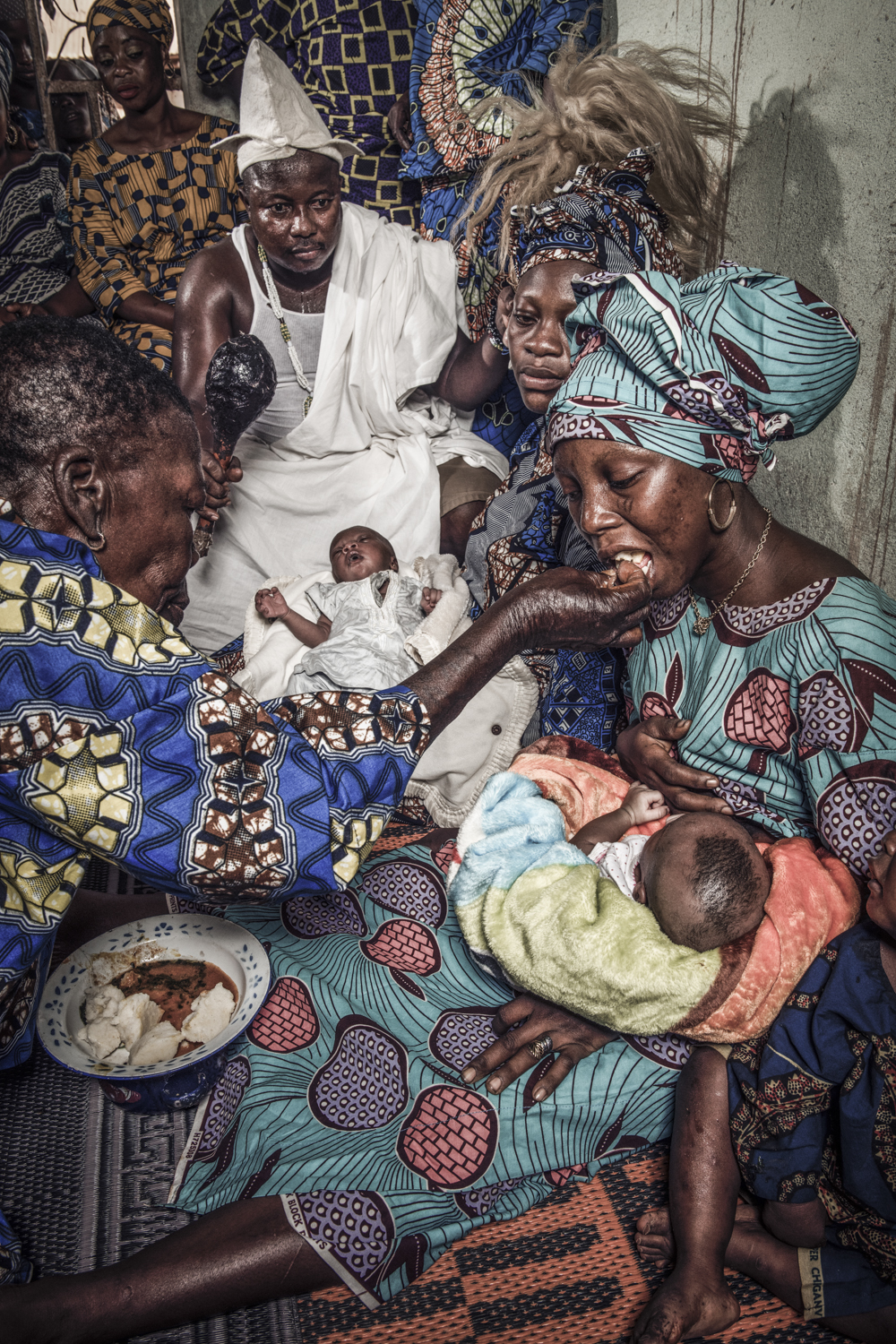
Egungun: Ancestor worship
In Africa, the dead of the family must be honored. For in many African cultures, death does not really exist; the spirit leaves the body to continue its life in the world of the dead, that of the ancestors.
Among the Yoruba, these dead manifest themselves to their descendants through an entity called EGOUN.
It is the spirit of the dead who returns to earth under beautiful loincloths decorated with applications of cut fabric, embroidered and adorned with shells and sequins, bone, and magic wood.
Family and clan societies, strictly reserved for men, have been formed around Egoun the revenant. They evoke the dead, call them and take care of them on earth.
Égoun serves as an intermediary with the souls in the afterlife.
He appears to certain families a few days after the death of one of its members, or during ceremonies performed to honor their memory; he also comes to bring the blessing of the ancestors to the marriages of their descendants and, in certain cases, to welcome a newborn child.
Offerings of food, drink and money are always made to him during his appearances.
EGOUN speaks with a deep, husky voice and dances readily to the sound of Bata or Ogbon drums.
The contact of his loincloth can be fatal to the living, so the MARIWOS (the guardians), members of the EGOUN society, always accompany them, carrying large engraved wooden sticks (lshan) to ward off the unwary. This stick symbolizes the border between the world of the dead (Kou-tome) and the world of the living. Ancestor worship in Africa is directed only to that part of the family that does not go back beyond the founder of the village or the house, that is, to the dynasty of the owners of the inhabited place.
With the exception of the royal families whose members are often deified and therefore have a more important lineage.
This cult is addressed to the deified ancestors and forms a vast system that unites the dead and the living in a continuous and united family whole.
The gods and the dead mix with the living, listen to their complaints, advise them, grant them graces, solve their difficulties and give them remedies for their pains and consolations for their misfortunes. The celestial world is not distant, nor is it superior, and the believer can speak directly with his gods and with his ancestors and benefit from their benevolence.
Each Yoruba clan honors its deceased ancestors in the hope of benefiting from their protection, avoiding their wrath, and keeping the ghosts away from the living.
He therefore regularly brings back the spirit of the ancestors from the realm of the dead (Kou-Tomé)
Each family clan of the ancestor cult has a convent.
It is a sacred place where the masks of the ghosts are kept. It is there that the adepts are trained in secret and that they put on the masks during the ceremonies.
The clan designates those who will be initiated and will have the responsibility of lending their bodies to the spirits of the ancestors and thus, will ensure the dialogue with the ancestors who have become protective deities.
Thus, one or more members of the family are designated, sometimes very young, to be these messengers of the afterlife.
They are taught in secret in a convent for several years, even decades.
There they learn the trance necessary to lend their bodies to the deities, a language that allows them to communicate with the invisible, and to create an appearance...
They emerge from it initiated to the rank of Egungun.
Apart from the initiates, no one knows who is Egungun because during the trances, they appear masked, their bodies totally hidden by their ceremonial costume.
The convent is exclusively reserved for initiates and men, on pain of death. The convent is directed by the Bale, who is generally the head of the family.
The general Alagba is the supreme chief, the king of the Egungun of a city, he watches over the convents of the city.
Egungun: Ancestor worship
In Africa, the dead of the family must be honored. For in many African cultures, death does not really exist; the spirit leaves the body to continue its life in the world of the dead, that of the ancestors.
Among the Yoruba, these dead manifest themselves to their descendants through an entity called EGOUN.
It is the spirit of the dead who returns to earth under beautiful loincloths decorated with applications of cut fabric, embroidered and adorned with shells and sequins, bone, and magic wood.
Family and clan societies, strictly reserved for men, have been formed around Egoun the revenant. They evoke the dead, call them and take care of them on earth.
Égoun serves as an intermediary with the souls in the afterlife.
He appears to certain families a few days after the death of one of its members, or during ceremonies performed to honor their memory; he also comes to bring the blessing of the ancestors to the marriages of their descendants and, in certain cases, to welcome a newborn child.
Offerings of food, drink and money are always made to him during his appearances.
EGOUN speaks with a deep, husky voice and dances readily to the sound of Bata or Ogbon drums.
The contact of his loincloth can be fatal to the living, so the MARIWOS (the guardians), members of the EGOUN society, always accompany them, carrying large engraved wooden sticks (lshan) to ward off the unwary. This stick symbolizes the border between the world of the dead (Kou-tome) and the world of the living. Ancestor worship in Africa is directed only to that part of the family that does not go back beyond the founder of the village or the house, that is, to the dynasty of the owners of the inhabited place.
With the exception of the royal families whose members are often deified and therefore have a more important lineage.
This cult is addressed to the deified ancestors and forms a vast system that unites the dead and the living in a continuous and united family whole.
The gods and the dead mix with the living, listen to their complaints, advise them, grant them graces, solve their difficulties and give them remedies for their pains and consolations for their misfortunes. The celestial world is not distant, nor is it superior, and the believer can speak directly with his gods and with his ancestors and benefit from their benevolence.
Each Yoruba clan honors its deceased ancestors in the hope of benefiting from their protection, avoiding their wrath, and keeping the ghosts away from the living.
He therefore regularly brings back the spirit of the ancestors from the realm of the dead (Kou-Tomé)
Each family clan of the ancestor cult has a convent.
It is a sacred place where the masks of the ghosts are kept. It is there that the adepts are trained in secret and that they put on the masks during the ceremonies.
The clan designates those who will be initiated and will have the responsibility of lending their bodies to the spirits of the ancestors and thus, will ensure the dialogue with the ancestors who have become protective deities.
Thus, one or more members of the family are designated, sometimes very young, to be these messengers of the afterlife.
They are taught in secret in a convent for several years, even decades.
There they learn the trance necessary to lend their bodies to the deities, a language that allows them to communicate with the invisible, and to create an appearance...
They emerge from it initiated to the rank of Egungun.
Apart from the initiates, no one knows who is Egungun because during the trances, they appear masked, their bodies totally hidden by their ceremonial costume.
The convent is exclusively reserved for initiates and men, on pain of death. The convent is directed by the Bale, who is generally the head of the family.
The general Alagba is the supreme chief, the king of the Egungun of a city, he watches over the convents of the city.
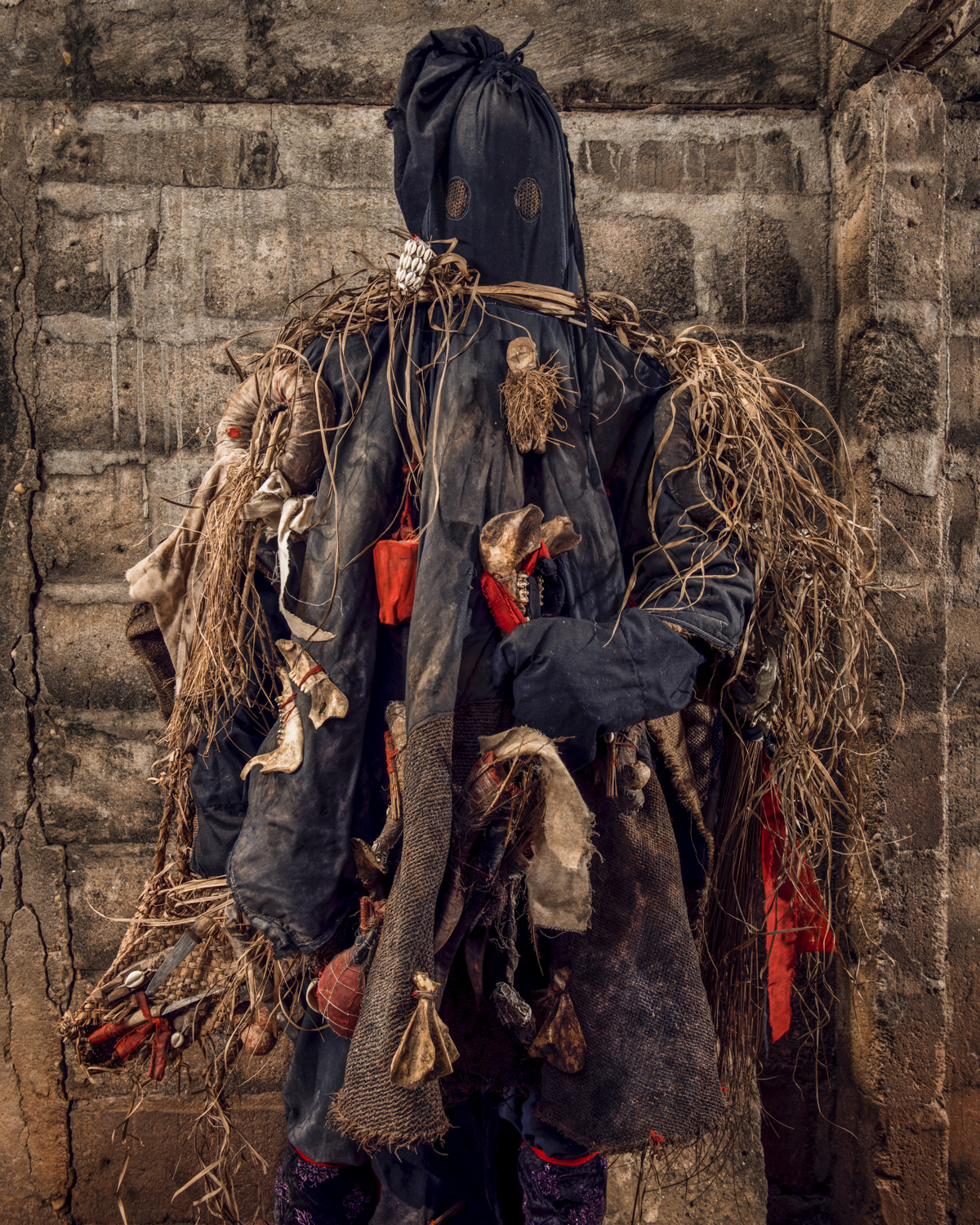
Egungun: Ancestor worship
In Africa, the dead of the family must be honored. For in many African cultures, death does not really exist; the spirit leaves the body to continue its life in the world of the dead, that of the ancestors.
Among the Yoruba, these dead manifest themselves to their descendants through an entity called EGOUN.
It is the spirit of the dead who returns to earth under beautiful loincloths decorated with applications of cut fabric, embroidered and adorned with shells and sequins, bone, and magic wood.
Family and clan societies, strictly reserved for men, have been formed around Egoun the revenant. They evoke the dead, call them and take care of them on earth.
Égoun serves as an intermediary with the souls in the afterlife.
He appears to certain families a few days after the death of one of its members, or during ceremonies performed to honor their memory; he also comes to bring the blessing of the ancestors to the marriages of their descendants and, in certain cases, to welcome a newborn child.
Offerings of food, drink and money are always made to him during his appearances.
EGOUN speaks with a deep, husky voice and dances readily to the sound of Bata or Ogbon drums.
The contact of his loincloth can be fatal to the living, so the MARIWOS (the guardians), members of the EGOUN society, always accompany them, carrying large engraved wooden sticks (lshan) to ward off the unwary. This stick symbolizes the border between the world of the dead (Kou-tome) and the world of the living. Ancestor worship in Africa is directed only to that part of the family that does not go back beyond the founder of the village or the house, that is, to the dynasty of the owners of the inhabited place.
With the exception of the royal families whose members are often deified and therefore have a more important lineage.
This cult is addressed to the deified ancestors and forms a vast system that unites the dead and the living in a continuous and united family whole.
The gods and the dead mix with the living, listen to their complaints, advise them, grant them graces, solve their difficulties and give them remedies for their pains and consolations for their misfortunes. The celestial world is not distant, nor is it superior, and the believer can speak directly with his gods and with his ancestors and benefit from their benevolence.
Each Yoruba clan honors its deceased ancestors in the hope of benefiting from their protection, avoiding their wrath, and keeping the ghosts away from the living.
He therefore regularly brings back the spirit of the ancestors from the realm of the dead (Kou-Tomé)
Each family clan of the ancestor cult has a convent.
It is a sacred place where the masks of the ghosts are kept. It is there that the adepts are trained in secret and that they put on the masks during the ceremonies.
The clan designates those who will be initiated and will have the responsibility of lending their bodies to the spirits of the ancestors and thus, will ensure the dialogue with the ancestors who have become protective deities.
Thus, one or more members of the family are designated, sometimes very young, to be these messengers of the afterlife.
They are taught in secret in a convent for several years, even decades.
There they learn the trance necessary to lend their bodies to the deities, a language that allows them to communicate with the invisible, and to create an appearance...
They emerge from it initiated to the rank of Egungun.
Apart from the initiates, no one knows who is Egungun because during the trances, they appear masked, their bodies totally hidden by their ceremonial costume.
The convent is exclusively reserved for initiates and men, on pain of death. The convent is directed by the Bale, who is generally the head of the family.
The general Alagba is the supreme chief, the king of the Egungun of a city, he watches over the convents of the city.
Egungun: Ancestor worship
In Africa, the dead of the family must be honored. For in many African cultures, death does not really exist; the spirit leaves the body to continue its life in the world of the dead, that of the ancestors.
Among the Yoruba, these dead manifest themselves to their descendants through an entity called EGOUN.
It is the spirit of the dead who returns to earth under beautiful loincloths decorated with applications of cut fabric, embroidered and adorned with shells and sequins, bone, and magic wood.
Family and clan societies, strictly reserved for men, have been formed around Egoun the revenant. They evoke the dead, call them and take care of them on earth.
Égoun serves as an intermediary with the souls in the afterlife.
He appears to certain families a few days after the death of one of its members, or during ceremonies performed to honor their memory; he also comes to bring the blessing of the ancestors to the marriages of their descendants and, in certain cases, to welcome a newborn child.
Offerings of food, drink and money are always made to him during his appearances.
EGOUN speaks with a deep, husky voice and dances readily to the sound of Bata or Ogbon drums.
The contact of his loincloth can be fatal to the living, so the MARIWOS (the guardians), members of the EGOUN society, always accompany them, carrying large engraved wooden sticks (lshan) to ward off the unwary. This stick symbolizes the border between the world of the dead (Kou-tome) and the world of the living. Ancestor worship in Africa is directed only to that part of the family that does not go back beyond the founder of the village or the house, that is, to the dynasty of the owners of the inhabited place.
With the exception of the royal families whose members are often deified and therefore have a more important lineage.
This cult is addressed to the deified ancestors and forms a vast system that unites the dead and the living in a continuous and united family whole.
The gods and the dead mix with the living, listen to their complaints, advise them, grant them graces, solve their difficulties and give them remedies for their pains and consolations for their misfortunes. The celestial world is not distant, nor is it superior, and the believer can speak directly with his gods and with his ancestors and benefit from their benevolence.
Each Yoruba clan honors its deceased ancestors in the hope of benefiting from their protection, avoiding their wrath, and keeping the ghosts away from the living.
He therefore regularly brings back the spirit of the ancestors from the realm of the dead (Kou-Tomé)
Each family clan of the ancestor cult has a convent.
It is a sacred place where the masks of the ghosts are kept. It is there that the adepts are trained in secret and that they put on the masks during the ceremonies.
The clan designates those who will be initiated and will have the responsibility of lending their bodies to the spirits of the ancestors and thus, will ensure the dialogue with the ancestors who have become protective deities.
Thus, one or more members of the family are designated, sometimes very young, to be these messengers of the afterlife.
They are taught in secret in a convent for several years, even decades.
There they learn the trance necessary to lend their bodies to the deities, a language that allows them to communicate with the invisible, and to create an appearance...
They emerge from it initiated to the rank of Egungun.
Apart from the initiates, no one knows who is Egungun because during the trances, they appear masked, their bodies totally hidden by their ceremonial costume.
The convent is exclusively reserved for initiates and men, on pain of death. The convent is directed by the Bale, who is generally the head of the family.
The general Alagba is the supreme chief, the king of the Egungun of a city, he watches over the convents of the city.
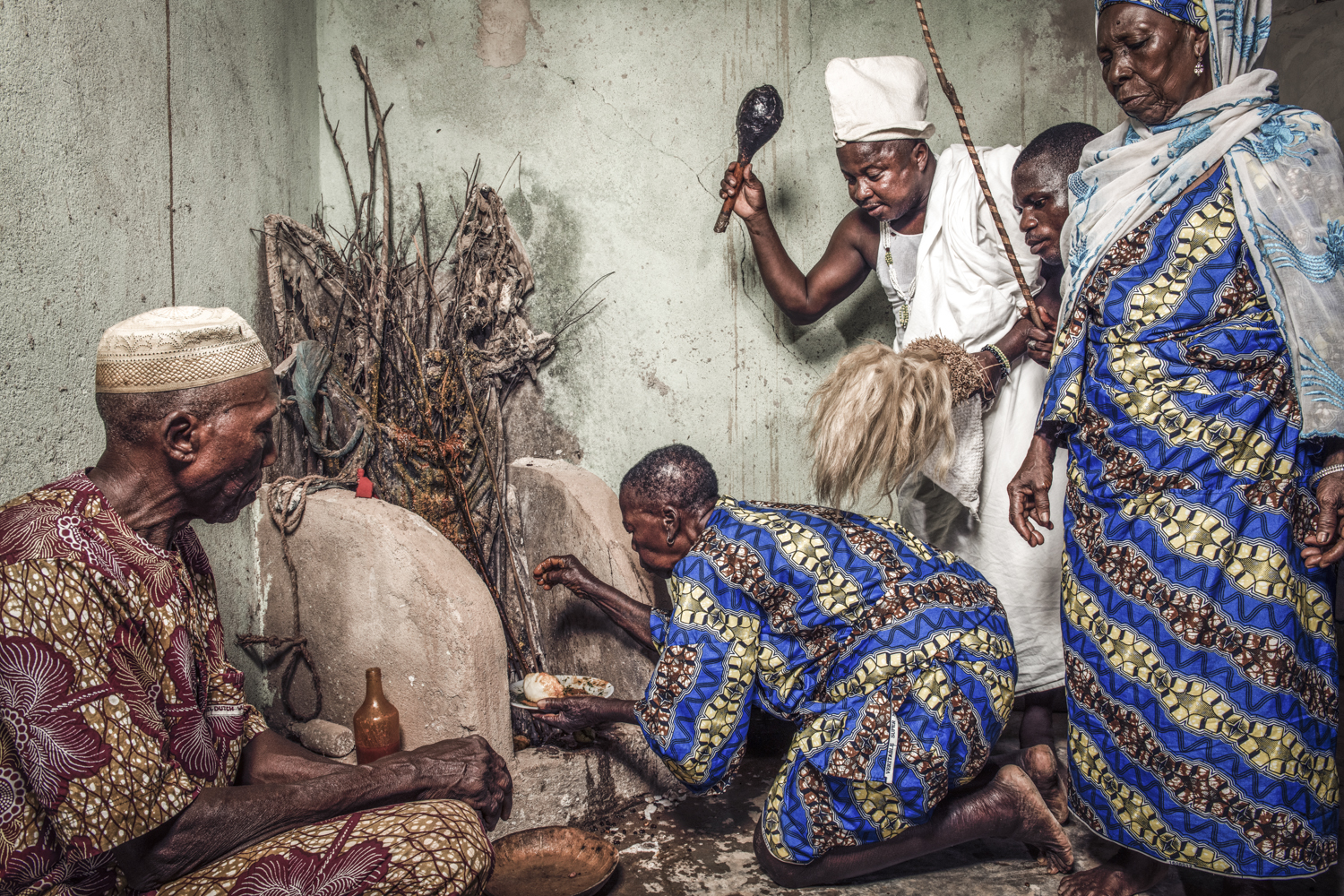
Egungun: Ancestor worship
In Africa, the dead of the family must be honored. For in many African cultures, death does not really exist; the spirit leaves the body to continue its life in the world of the dead, that of the ancestors.
Among the Yoruba, these dead manifest themselves to their descendants through an entity called EGOUN.
It is the spirit of the dead who returns to earth under beautiful loincloths decorated with applications of cut fabric, embroidered and adorned with shells and sequins, bone, and magic wood.
Family and clan societies, strictly reserved for men, have been formed around Egoun the revenant. They evoke the dead, call them and take care of them on earth.
Égoun serves as an intermediary with the souls in the afterlife.
He appears to certain families a few days after the death of one of its members, or during ceremonies performed to honor their memory; he also comes to bring the blessing of the ancestors to the marriages of their descendants and, in certain cases, to welcome a newborn child.
Offerings of food, drink and money are always made to him during his appearances.
EGOUN speaks with a deep, husky voice and dances readily to the sound of Bata or Ogbon drums.
The contact of his loincloth can be fatal to the living, so the MARIWOS (the guardians), members of the EGOUN society, always accompany them, carrying large engraved wooden sticks (lshan) to ward off the unwary. This stick symbolizes the border between the world of the dead (Kou-tome) and the world of the living. Ancestor worship in Africa is directed only to that part of the family that does not go back beyond the founder of the village or the house, that is, to the dynasty of the owners of the inhabited place.
With the exception of the royal families whose members are often deified and therefore have a more important lineage.
This cult is addressed to the deified ancestors and forms a vast system that unites the dead and the living in a continuous and united family whole.
The gods and the dead mix with the living, listen to their complaints, advise them, grant them graces, solve their difficulties and give them remedies for their pains and consolations for their misfortunes. The celestial world is not distant, nor is it superior, and the believer can speak directly with his gods and with his ancestors and benefit from their benevolence.
Each Yoruba clan honors its deceased ancestors in the hope of benefiting from their protection, avoiding their wrath, and keeping the ghosts away from the living.
He therefore regularly brings back the spirit of the ancestors from the realm of the dead (Kou-Tomé)
Each family clan of the ancestor cult has a convent.
It is a sacred place where the masks of the ghosts are kept. It is there that the adepts are trained in secret and that they put on the masks during the ceremonies.
The clan designates those who will be initiated and will have the responsibility of lending their bodies to the spirits of the ancestors and thus, will ensure the dialogue with the ancestors who have become protective deities.
Thus, one or more members of the family are designated, sometimes very young, to be these messengers of the afterlife.
They are taught in secret in a convent for several years, even decades.
There they learn the trance necessary to lend their bodies to the deities, a language that allows them to communicate with the invisible, and to create an appearance...
They emerge from it initiated to the rank of Egungun.
Apart from the initiates, no one knows who is Egungun because during the trances, they appear masked, their bodies totally hidden by their ceremonial costume.
The convent is exclusively reserved for initiates and men, on pain of death. The convent is directed by the Bale, who is generally the head of the family.
The general Alagba is the supreme chief, the king of the Egungun of a city, he watches over the convents of the city.
Egungun: Ancestor worship
In Africa, the dead of the family must be honored. For in many African cultures, death does not really exist; the spirit leaves the body to continue its life in the world of the dead, that of the ancestors.
Among the Yoruba, these dead manifest themselves to their descendants through an entity called EGOUN.
It is the spirit of the dead who returns to earth under beautiful loincloths decorated with applications of cut fabric, embroidered and adorned with shells and sequins, bone, and magic wood.
Family and clan societies, strictly reserved for men, have been formed around Egoun the revenant. They evoke the dead, call them and take care of them on earth.
Égoun serves as an intermediary with the souls in the afterlife.
He appears to certain families a few days after the death of one of its members, or during ceremonies performed to honor their memory; he also comes to bring the blessing of the ancestors to the marriages of their descendants and, in certain cases, to welcome a newborn child.
Offerings of food, drink and money are always made to him during his appearances.
EGOUN speaks with a deep, husky voice and dances readily to the sound of Bata or Ogbon drums.
The contact of his loincloth can be fatal to the living, so the MARIWOS (the guardians), members of the EGOUN society, always accompany them, carrying large engraved wooden sticks (lshan) to ward off the unwary. This stick symbolizes the border between the world of the dead (Kou-tome) and the world of the living. Ancestor worship in Africa is directed only to that part of the family that does not go back beyond the founder of the village or the house, that is, to the dynasty of the owners of the inhabited place.
With the exception of the royal families whose members are often deified and therefore have a more important lineage.
This cult is addressed to the deified ancestors and forms a vast system that unites the dead and the living in a continuous and united family whole.
The gods and the dead mix with the living, listen to their complaints, advise them, grant them graces, solve their difficulties and give them remedies for their pains and consolations for their misfortunes. The celestial world is not distant, nor is it superior, and the believer can speak directly with his gods and with his ancestors and benefit from their benevolence.
Each Yoruba clan honors its deceased ancestors in the hope of benefiting from their protection, avoiding their wrath, and keeping the ghosts away from the living.
He therefore regularly brings back the spirit of the ancestors from the realm of the dead (Kou-Tomé)
Each family clan of the ancestor cult has a convent.
It is a sacred place where the masks of the ghosts are kept. It is there that the adepts are trained in secret and that they put on the masks during the ceremonies.
The clan designates those who will be initiated and will have the responsibility of lending their bodies to the spirits of the ancestors and thus, will ensure the dialogue with the ancestors who have become protective deities.
Thus, one or more members of the family are designated, sometimes very young, to be these messengers of the afterlife.
They are taught in secret in a convent for several years, even decades.
There they learn the trance necessary to lend their bodies to the deities, a language that allows them to communicate with the invisible, and to create an appearance...
They emerge from it initiated to the rank of Egungun.
Apart from the initiates, no one knows who is Egungun because during the trances, they appear masked, their bodies totally hidden by their ceremonial costume.
The convent is exclusively reserved for initiates and men, on pain of death. The convent is directed by the Bale, who is generally the head of the family.
The general Alagba is the supreme chief, the king of the Egungun of a city, he watches over the convents of the city.
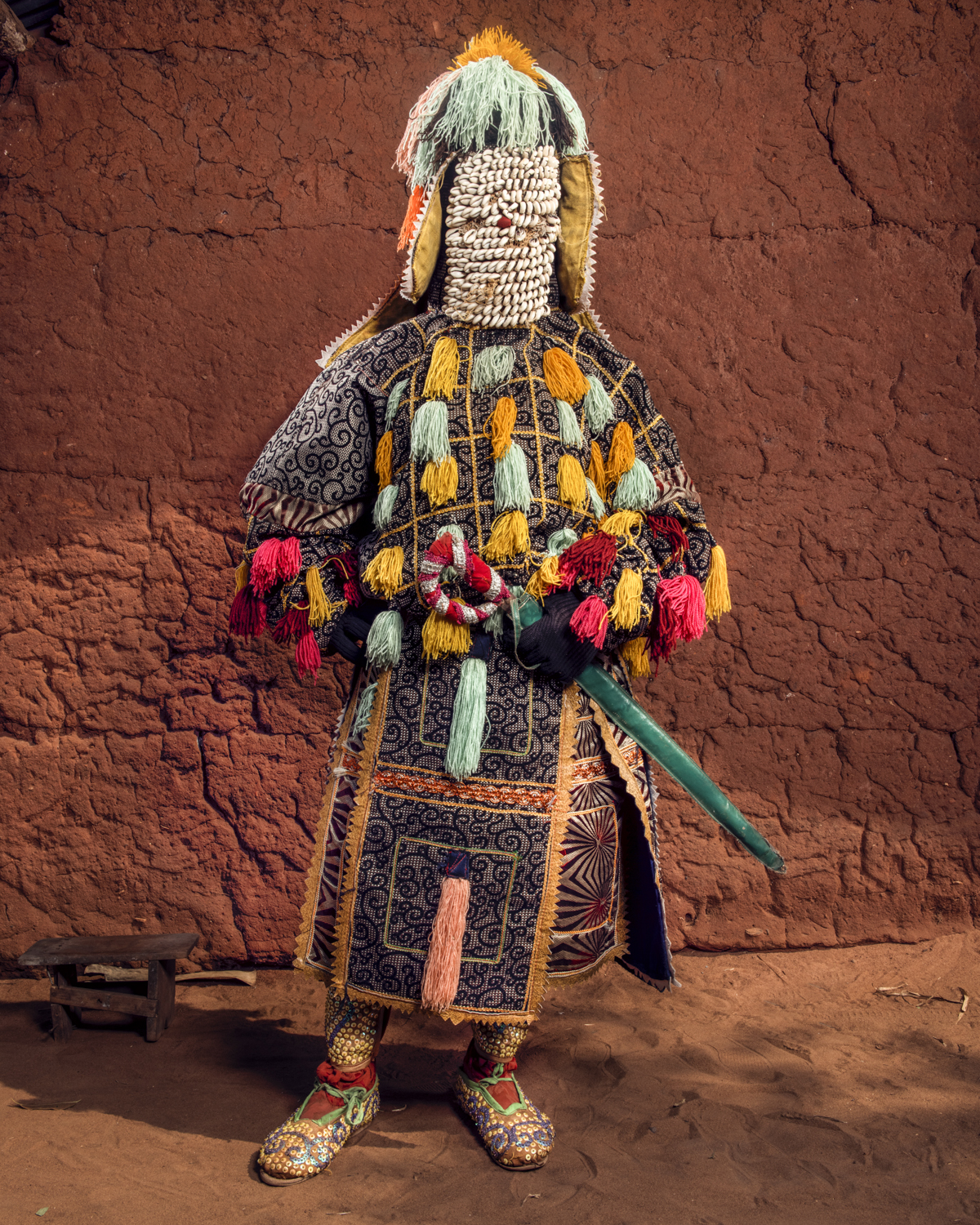
Egungun: Ancestor worship
In Africa, the dead of the family must be honored. For in many African cultures, death does not really exist; the spirit leaves the body to continue its life in the world of the dead, that of the ancestors.
Among the Yoruba, these dead manifest themselves to their descendants through an entity called EGOUN.
It is the spirit of the dead who returns to earth under beautiful loincloths decorated with applications of cut fabric, embroidered and adorned with shells and sequins, bone, and magic wood.
Family and clan societies, strictly reserved for men, have been formed around Egoun the revenant. They evoke the dead, call them and take care of them on earth.
Égoun serves as an intermediary with the souls in the afterlife.
He appears to certain families a few days after the death of one of its members, or during ceremonies performed to honor their memory; he also comes to bring the blessing of the ancestors to the marriages of their descendants and, in certain cases, to welcome a newborn child.
Offerings of food, drink and money are always made to him during his appearances.
EGOUN speaks with a deep, husky voice and dances readily to the sound of Bata or Ogbon drums.
The contact of his loincloth can be fatal to the living, so the MARIWOS (the guardians), members of the EGOUN society, always accompany them, carrying large engraved wooden sticks (lshan) to ward off the unwary. This stick symbolizes the border between the world of the dead (Kou-tome) and the world of the living. Ancestor worship in Africa is directed only to that part of the family that does not go back beyond the founder of the village or the house, that is, to the dynasty of the owners of the inhabited place.
With the exception of the royal families whose members are often deified and therefore have a more important lineage.
This cult is addressed to the deified ancestors and forms a vast system that unites the dead and the living in a continuous and united family whole.
The gods and the dead mix with the living, listen to their complaints, advise them, grant them graces, solve their difficulties and give them remedies for their pains and consolations for their misfortunes. The celestial world is not distant, nor is it superior, and the believer can speak directly with his gods and with his ancestors and benefit from their benevolence.
Each Yoruba clan honors its deceased ancestors in the hope of benefiting from their protection, avoiding their wrath, and keeping the ghosts away from the living.
He therefore regularly brings back the spirit of the ancestors from the realm of the dead (Kou-Tomé)
Each family clan of the ancestor cult has a convent.
It is a sacred place where the masks of the ghosts are kept. It is there that the adepts are trained in secret and that they put on the masks during the ceremonies.
The clan designates those who will be initiated and will have the responsibility of lending their bodies to the spirits of the ancestors and thus, will ensure the dialogue with the ancestors who have become protective deities.
Thus, one or more members of the family are designated, sometimes very young, to be these messengers of the afterlife.
They are taught in secret in a convent for several years, even decades.
There they learn the trance necessary to lend their bodies to the deities, a language that allows them to communicate with the invisible, and to create an appearance...
They emerge from it initiated to the rank of Egungun.
Apart from the initiates, no one knows who is Egungun because during the trances, they appear masked, their bodies totally hidden by their ceremonial costume.
The convent is exclusively reserved for initiates and men, on pain of death. The convent is directed by the Bale, who is generally the head of the family.
The general Alagba is the supreme chief, the king of the Egungun of a city, he watches over the convents of the city.
Egungun: Ancestor worship
In Africa, the dead of the family must be honored. For in many African cultures, death does not really exist; the spirit leaves the body to continue its life in the world of the dead, that of the ancestors.
Among the Yoruba, these dead manifest themselves to their descendants through an entity called EGOUN.
It is the spirit of the dead who returns to earth under beautiful loincloths decorated with applications of cut fabric, embroidered and adorned with shells and sequins, bone, and magic wood.
Family and clan societies, strictly reserved for men, have been formed around Egoun the revenant. They evoke the dead, call them and take care of them on earth.
Égoun serves as an intermediary with the souls in the afterlife.
He appears to certain families a few days after the death of one of its members, or during ceremonies performed to honor their memory; he also comes to bring the blessing of the ancestors to the marriages of their descendants and, in certain cases, to welcome a newborn child.
Offerings of food, drink and money are always made to him during his appearances.
EGOUN speaks with a deep, husky voice and dances readily to the sound of Bata or Ogbon drums.
The contact of his loincloth can be fatal to the living, so the MARIWOS (the guardians), members of the EGOUN society, always accompany them, carrying large engraved wooden sticks (lshan) to ward off the unwary. This stick symbolizes the border between the world of the dead (Kou-tome) and the world of the living. Ancestor worship in Africa is directed only to that part of the family that does not go back beyond the founder of the village or the house, that is, to the dynasty of the owners of the inhabited place.
With the exception of the royal families whose members are often deified and therefore have a more important lineage.
This cult is addressed to the deified ancestors and forms a vast system that unites the dead and the living in a continuous and united family whole.
The gods and the dead mix with the living, listen to their complaints, advise them, grant them graces, solve their difficulties and give them remedies for their pains and consolations for their misfortunes. The celestial world is not distant, nor is it superior, and the believer can speak directly with his gods and with his ancestors and benefit from their benevolence.
Each Yoruba clan honors its deceased ancestors in the hope of benefiting from their protection, avoiding their wrath, and keeping the ghosts away from the living.
He therefore regularly brings back the spirit of the ancestors from the realm of the dead (Kou-Tomé)
Each family clan of the ancestor cult has a convent.
It is a sacred place where the masks of the ghosts are kept. It is there that the adepts are trained in secret and that they put on the masks during the ceremonies.
The clan designates those who will be initiated and will have the responsibility of lending their bodies to the spirits of the ancestors and thus, will ensure the dialogue with the ancestors who have become protective deities.
Thus, one or more members of the family are designated, sometimes very young, to be these messengers of the afterlife.
They are taught in secret in a convent for several years, even decades.
There they learn the trance necessary to lend their bodies to the deities, a language that allows them to communicate with the invisible, and to create an appearance...
They emerge from it initiated to the rank of Egungun.
Apart from the initiates, no one knows who is Egungun because during the trances, they appear masked, their bodies totally hidden by their ceremonial costume.
The convent is exclusively reserved for initiates and men, on pain of death. The convent is directed by the Bale, who is generally the head of the family.
The general Alagba is the supreme chief, the king of the Egungun of a city, he watches over the convents of the city.
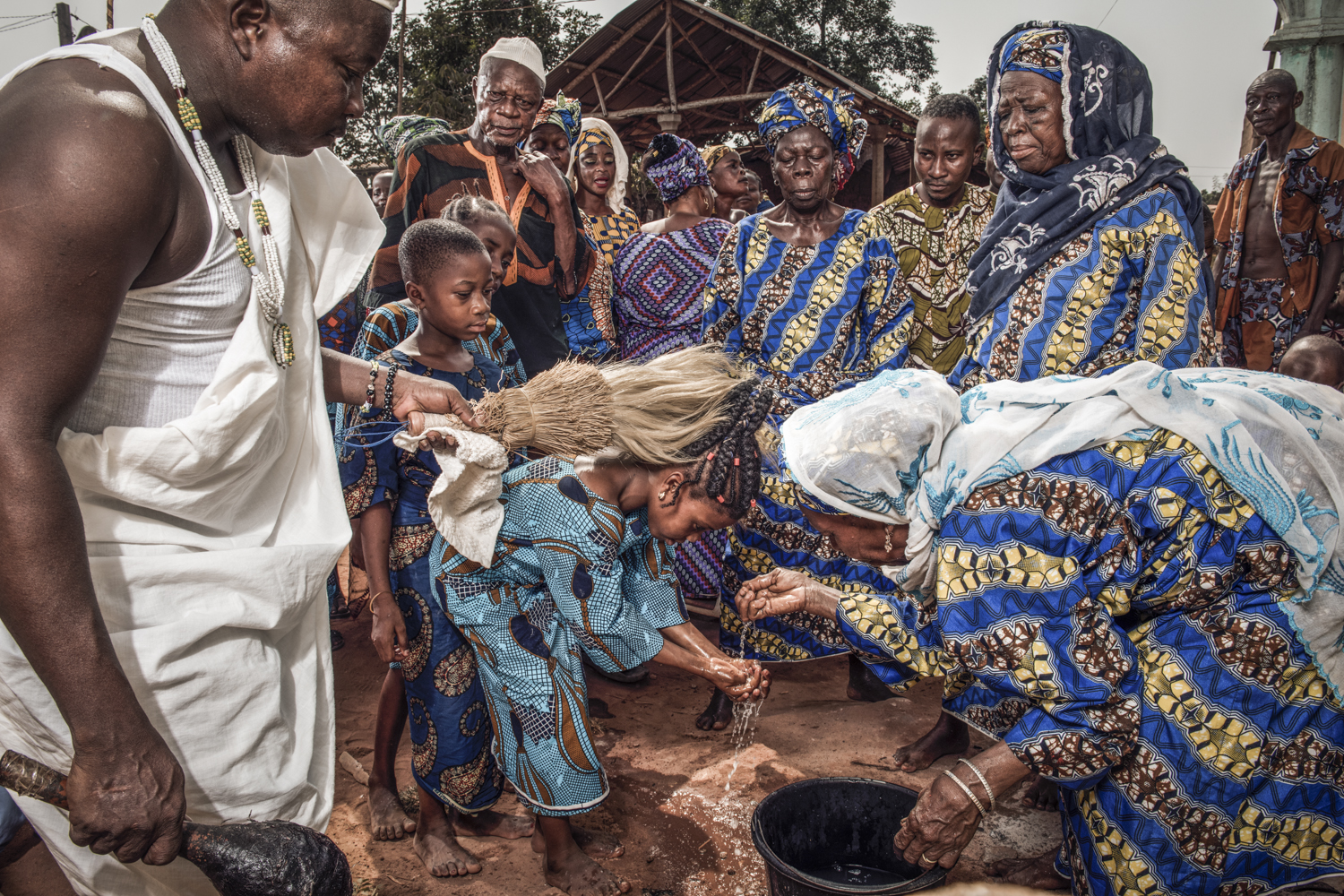
Egungun: Ancestor worship
In Africa, the dead of the family must be honored. For in many African cultures, death does not really exist; the spirit leaves the body to continue its life in the world of the dead, that of the ancestors.
Among the Yoruba, these dead manifest themselves to their descendants through an entity called EGOUN.
It is the spirit of the dead who returns to earth under beautiful loincloths decorated with applications of cut fabric, embroidered and adorned with shells and sequins, bone, and magic wood.
Family and clan societies, strictly reserved for men, have been formed around Egoun the revenant. They evoke the dead, call them and take care of them on earth.
Égoun serves as an intermediary with the souls in the afterlife.
He appears to certain families a few days after the death of one of its members, or during ceremonies performed to honor their memory; he also comes to bring the blessing of the ancestors to the marriages of their descendants and, in certain cases, to welcome a newborn child.
Offerings of food, drink and money are always made to him during his appearances.
EGOUN speaks with a deep, husky voice and dances readily to the sound of Bata or Ogbon drums.
The contact of his loincloth can be fatal to the living, so the MARIWOS (the guardians), members of the EGOUN society, always accompany them, carrying large engraved wooden sticks (lshan) to ward off the unwary. This stick symbolizes the border between the world of the dead (Kou-tome) and the world of the living. Ancestor worship in Africa is directed only to that part of the family that does not go back beyond the founder of the village or the house, that is, to the dynasty of the owners of the inhabited place.
With the exception of the royal families whose members are often deified and therefore have a more important lineage.
This cult is addressed to the deified ancestors and forms a vast system that unites the dead and the living in a continuous and united family whole.
The gods and the dead mix with the living, listen to their complaints, advise them, grant them graces, solve their difficulties and give them remedies for their pains and consolations for their misfortunes. The celestial world is not distant, nor is it superior, and the believer can speak directly with his gods and with his ancestors and benefit from their benevolence.
Each Yoruba clan honors its deceased ancestors in the hope of benefiting from their protection, avoiding their wrath, and keeping the ghosts away from the living.
He therefore regularly brings back the spirit of the ancestors from the realm of the dead (Kou-Tomé)
Each family clan of the ancestor cult has a convent.
It is a sacred place where the masks of the ghosts are kept. It is there that the adepts are trained in secret and that they put on the masks during the ceremonies.
The clan designates those who will be initiated and will have the responsibility of lending their bodies to the spirits of the ancestors and thus, will ensure the dialogue with the ancestors who have become protective deities.
Thus, one or more members of the family are designated, sometimes very young, to be these messengers of the afterlife.
They are taught in secret in a convent for several years, even decades.
There they learn the trance necessary to lend their bodies to the deities, a language that allows them to communicate with the invisible, and to create an appearance...
They emerge from it initiated to the rank of Egungun.
Apart from the initiates, no one knows who is Egungun because during the trances, they appear masked, their bodies totally hidden by their ceremonial costume.
The convent is exclusively reserved for initiates and men, on pain of death. The convent is directed by the Bale, who is generally the head of the family.
The general Alagba is the supreme chief, the king of the Egungun of a city, he watches over the convents of the city.
Egungun: Ancestor worship
In Africa, the dead of the family must be honored. For in many African cultures, death does not really exist; the spirit leaves the body to continue its life in the world of the dead, that of the ancestors.
Among the Yoruba, these dead manifest themselves to their descendants through an entity called EGOUN.
It is the spirit of the dead who returns to earth under beautiful loincloths decorated with applications of cut fabric, embroidered and adorned with shells and sequins, bone, and magic wood.
Family and clan societies, strictly reserved for men, have been formed around Egoun the revenant. They evoke the dead, call them and take care of them on earth.
Égoun serves as an intermediary with the souls in the afterlife.
He appears to certain families a few days after the death of one of its members, or during ceremonies performed to honor their memory; he also comes to bring the blessing of the ancestors to the marriages of their descendants and, in certain cases, to welcome a newborn child.
Offerings of food, drink and money are always made to him during his appearances.
EGOUN speaks with a deep, husky voice and dances readily to the sound of Bata or Ogbon drums.
The contact of his loincloth can be fatal to the living, so the MARIWOS (the guardians), members of the EGOUN society, always accompany them, carrying large engraved wooden sticks (lshan) to ward off the unwary. This stick symbolizes the border between the world of the dead (Kou-tome) and the world of the living. Ancestor worship in Africa is directed only to that part of the family that does not go back beyond the founder of the village or the house, that is, to the dynasty of the owners of the inhabited place.
With the exception of the royal families whose members are often deified and therefore have a more important lineage.
This cult is addressed to the deified ancestors and forms a vast system that unites the dead and the living in a continuous and united family whole.
The gods and the dead mix with the living, listen to their complaints, advise them, grant them graces, solve their difficulties and give them remedies for their pains and consolations for their misfortunes. The celestial world is not distant, nor is it superior, and the believer can speak directly with his gods and with his ancestors and benefit from their benevolence.
Each Yoruba clan honors its deceased ancestors in the hope of benefiting from their protection, avoiding their wrath, and keeping the ghosts away from the living.
He therefore regularly brings back the spirit of the ancestors from the realm of the dead (Kou-Tomé)
Each family clan of the ancestor cult has a convent.
It is a sacred place where the masks of the ghosts are kept. It is there that the adepts are trained in secret and that they put on the masks during the ceremonies.
The clan designates those who will be initiated and will have the responsibility of lending their bodies to the spirits of the ancestors and thus, will ensure the dialogue with the ancestors who have become protective deities.
Thus, one or more members of the family are designated, sometimes very young, to be these messengers of the afterlife.
They are taught in secret in a convent for several years, even decades.
There they learn the trance necessary to lend their bodies to the deities, a language that allows them to communicate with the invisible, and to create an appearance...
They emerge from it initiated to the rank of Egungun.
Apart from the initiates, no one knows who is Egungun because during the trances, they appear masked, their bodies totally hidden by their ceremonial costume.
The convent is exclusively reserved for initiates and men, on pain of death. The convent is directed by the Bale, who is generally the head of the family.
The general Alagba is the supreme chief, the king of the Egungun of a city, he watches over the convents of the city.
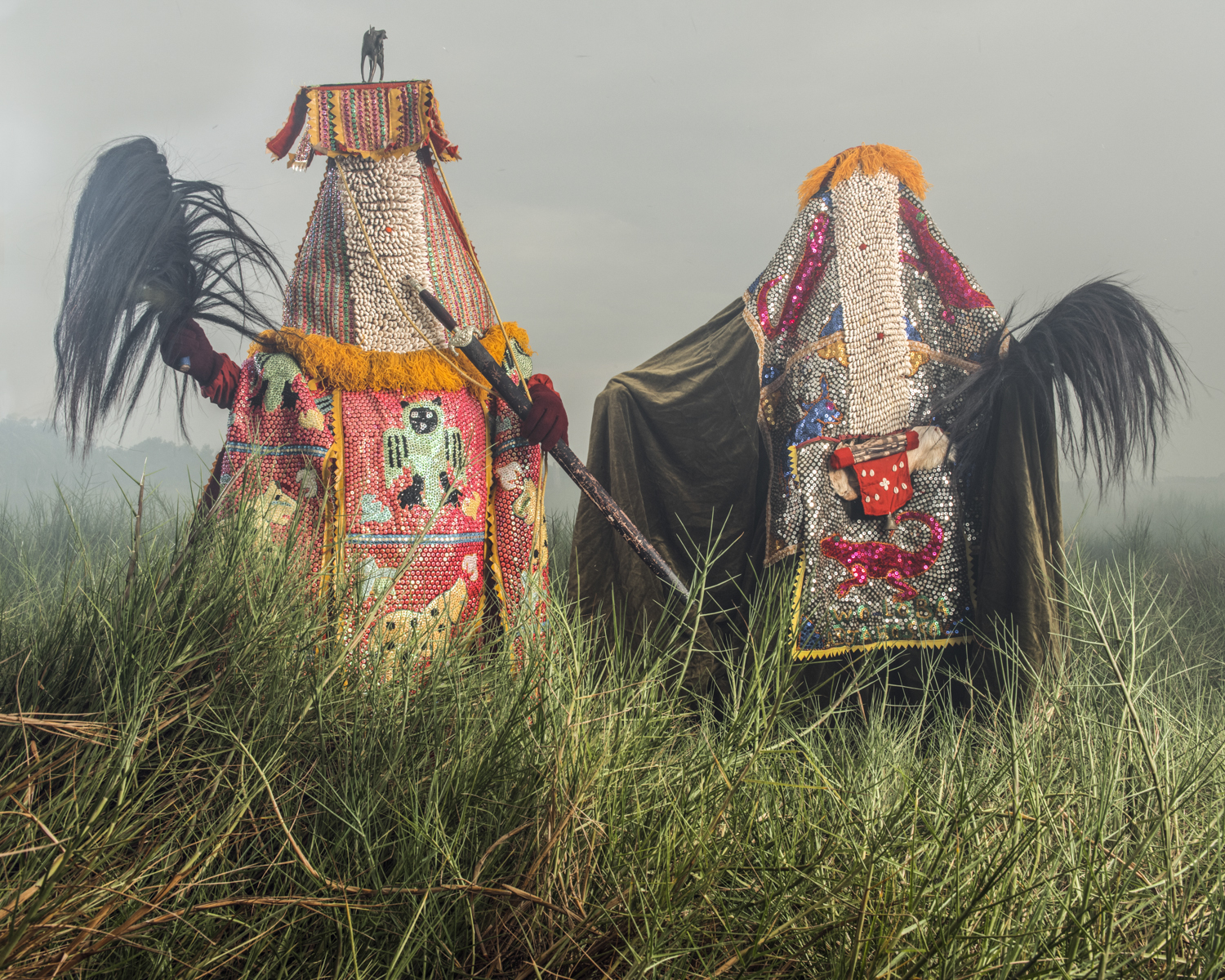
Egungun: Ancestor worship
In Africa, the dead of the family must be honored. For in many African cultures, death does not really exist; the spirit leaves the body to continue its life in the world of the dead, that of the ancestors.
Among the Yoruba, these dead manifest themselves to their descendants through an entity called EGOUN.
It is the spirit of the dead who returns to earth under beautiful loincloths decorated with applications of cut fabric, embroidered and adorned with shells and sequins, bone, and magic wood.
Family and clan societies, strictly reserved for men, have been formed around Egoun the revenant. They evoke the dead, call them and take care of them on earth.
Égoun serves as an intermediary with the souls in the afterlife.
He appears to certain families a few days after the death of one of its members, or during ceremonies performed to honor their memory; he also comes to bring the blessing of the ancestors to the marriages of their descendants and, in certain cases, to welcome a newborn child.
Offerings of food, drink and money are always made to him during his appearances.
EGOUN speaks with a deep, husky voice and dances readily to the sound of Bata or Ogbon drums.
The contact of his loincloth can be fatal to the living, so the MARIWOS (the guardians), members of the EGOUN society, always accompany them, carrying large engraved wooden sticks (lshan) to ward off the unwary. This stick symbolizes the border between the world of the dead (Kou-tome) and the world of the living. Ancestor worship in Africa is directed only to that part of the family that does not go back beyond the founder of the village or the house, that is, to the dynasty of the owners of the inhabited place.
With the exception of the royal families whose members are often deified and therefore have a more important lineage.
This cult is addressed to the deified ancestors and forms a vast system that unites the dead and the living in a continuous and united family whole.
The gods and the dead mix with the living, listen to their complaints, advise them, grant them graces, solve their difficulties and give them remedies for their pains and consolations for their misfortunes. The celestial world is not distant, nor is it superior, and the believer can speak directly with his gods and with his ancestors and benefit from their benevolence.
Each Yoruba clan honors its deceased ancestors in the hope of benefiting from their protection, avoiding their wrath, and keeping the ghosts away from the living.
He therefore regularly brings back the spirit of the ancestors from the realm of the dead (Kou-Tomé)
Each family clan of the ancestor cult has a convent.
It is a sacred place where the masks of the ghosts are kept. It is there that the adepts are trained in secret and that they put on the masks during the ceremonies.
The clan designates those who will be initiated and will have the responsibility of lending their bodies to the spirits of the ancestors and thus, will ensure the dialogue with the ancestors who have become protective deities.
Thus, one or more members of the family are designated, sometimes very young, to be these messengers of the afterlife.
They are taught in secret in a convent for several years, even decades.
There they learn the trance necessary to lend their bodies to the deities, a language that allows them to communicate with the invisible, and to create an appearance...
They emerge from it initiated to the rank of Egungun.
Apart from the initiates, no one knows who is Egungun because during the trances, they appear masked, their bodies totally hidden by their ceremonial costume.
The convent is exclusively reserved for initiates and men, on pain of death. The convent is directed by the Bale, who is generally the head of the family.
The general Alagba is the supreme chief, the king of the Egungun of a city, he watches over the convents of the city.
Egungun: Ancestor worship
In Africa, the dead of the family must be honored. For in many African cultures, death does not really exist; the spirit leaves the body to continue its life in the world of the dead, that of the ancestors.
Among the Yoruba, these dead manifest themselves to their descendants through an entity called EGOUN.
It is the spirit of the dead who returns to earth under beautiful loincloths decorated with applications of cut fabric, embroidered and adorned with shells and sequins, bone, and magic wood.
Family and clan societies, strictly reserved for men, have been formed around Egoun the revenant. They evoke the dead, call them and take care of them on earth.
Égoun serves as an intermediary with the souls in the afterlife.
He appears to certain families a few days after the death of one of its members, or during ceremonies performed to honor their memory; he also comes to bring the blessing of the ancestors to the marriages of their descendants and, in certain cases, to welcome a newborn child.
Offerings of food, drink and money are always made to him during his appearances.
EGOUN speaks with a deep, husky voice and dances readily to the sound of Bata or Ogbon drums.
The contact of his loincloth can be fatal to the living, so the MARIWOS (the guardians), members of the EGOUN society, always accompany them, carrying large engraved wooden sticks (lshan) to ward off the unwary. This stick symbolizes the border between the world of the dead (Kou-tome) and the world of the living. Ancestor worship in Africa is directed only to that part of the family that does not go back beyond the founder of the village or the house, that is, to the dynasty of the owners of the inhabited place.
With the exception of the royal families whose members are often deified and therefore have a more important lineage.
This cult is addressed to the deified ancestors and forms a vast system that unites the dead and the living in a continuous and united family whole.
The gods and the dead mix with the living, listen to their complaints, advise them, grant them graces, solve their difficulties and give them remedies for their pains and consolations for their misfortunes. The celestial world is not distant, nor is it superior, and the believer can speak directly with his gods and with his ancestors and benefit from their benevolence.
Each Yoruba clan honors its deceased ancestors in the hope of benefiting from their protection, avoiding their wrath, and keeping the ghosts away from the living.
He therefore regularly brings back the spirit of the ancestors from the realm of the dead (Kou-Tomé)
Each family clan of the ancestor cult has a convent.
It is a sacred place where the masks of the ghosts are kept. It is there that the adepts are trained in secret and that they put on the masks during the ceremonies.
The clan designates those who will be initiated and will have the responsibility of lending their bodies to the spirits of the ancestors and thus, will ensure the dialogue with the ancestors who have become protective deities.
Thus, one or more members of the family are designated, sometimes very young, to be these messengers of the afterlife.
They are taught in secret in a convent for several years, even decades.
There they learn the trance necessary to lend their bodies to the deities, a language that allows them to communicate with the invisible, and to create an appearance...
They emerge from it initiated to the rank of Egungun.
Apart from the initiates, no one knows who is Egungun because during the trances, they appear masked, their bodies totally hidden by their ceremonial costume.
The convent is exclusively reserved for initiates and men, on pain of death. The convent is directed by the Bale, who is generally the head of the family.
The general Alagba is the supreme chief, the king of the Egungun of a city, he watches over the convents of the city.
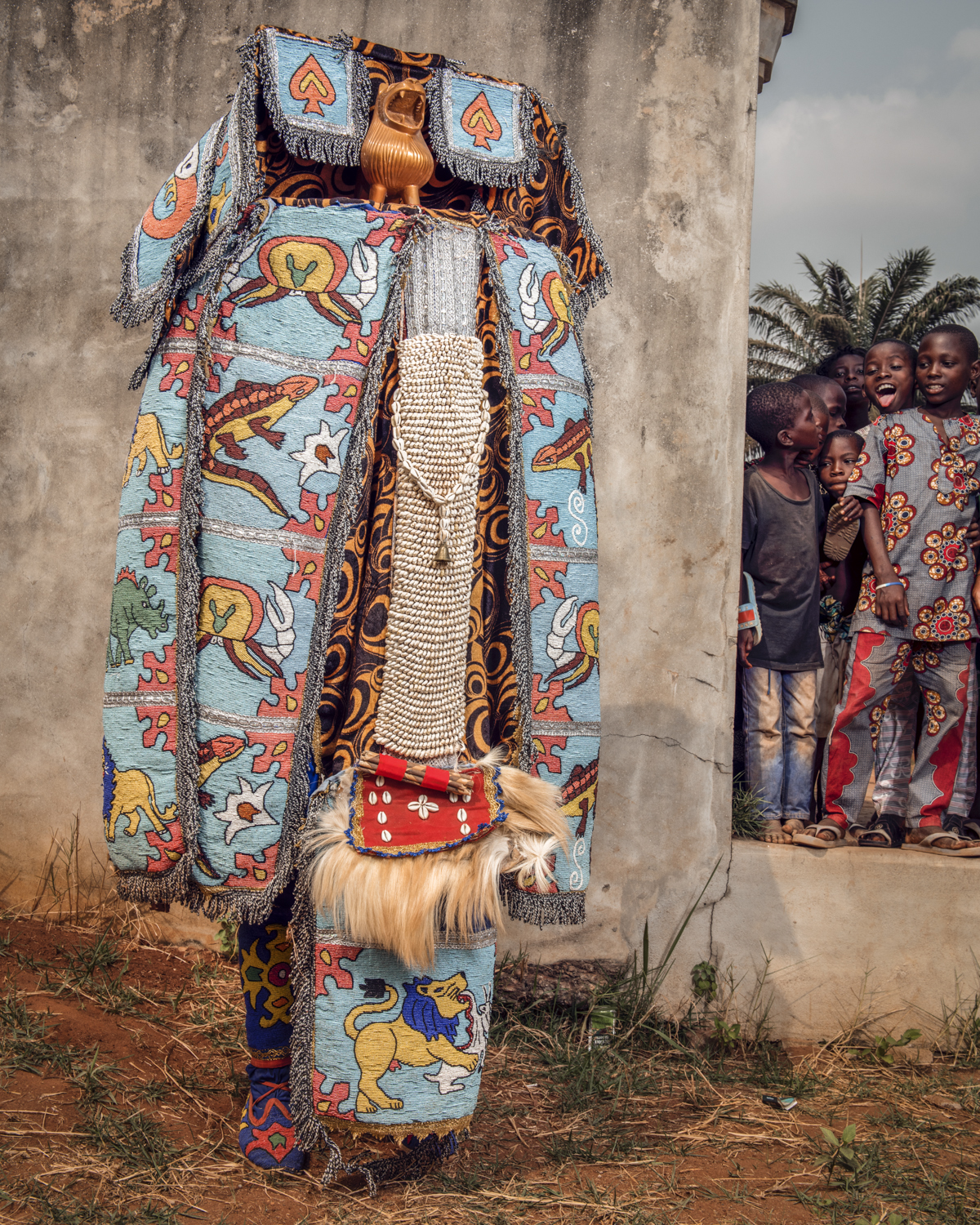
Egungun: Ancestor worship
In Africa, the dead of the family must be honored. For in many African cultures, death does not really exist; the spirit leaves the body to continue its life in the world of the dead, that of the ancestors.
Among the Yoruba, these dead manifest themselves to their descendants through an entity called EGOUN.
It is the spirit of the dead who returns to earth under beautiful loincloths decorated with applications of cut fabric, embroidered and adorned with shells and sequins, bone, and magic wood.
Family and clan societies, strictly reserved for men, have been formed around Egoun the revenant. They evoke the dead, call them and take care of them on earth.
Égoun serves as an intermediary with the souls in the afterlife.
He appears to certain families a few days after the death of one of its members, or during ceremonies performed to honor their memory; he also comes to bring the blessing of the ancestors to the marriages of their descendants and, in certain cases, to welcome a newborn child.
Offerings of food, drink and money are always made to him during his appearances.
EGOUN speaks with a deep, husky voice and dances readily to the sound of Bata or Ogbon drums.
The contact of his loincloth can be fatal to the living, so the MARIWOS (the guardians), members of the EGOUN society, always accompany them, carrying large engraved wooden sticks (lshan) to ward off the unwary. This stick symbolizes the border between the world of the dead (Kou-tome) and the world of the living. Ancestor worship in Africa is directed only to that part of the family that does not go back beyond the founder of the village or the house, that is, to the dynasty of the owners of the inhabited place.
With the exception of the royal families whose members are often deified and therefore have a more important lineage.
This cult is addressed to the deified ancestors and forms a vast system that unites the dead and the living in a continuous and united family whole.
The gods and the dead mix with the living, listen to their complaints, advise them, grant them graces, solve their difficulties and give them remedies for their pains and consolations for their misfortunes. The celestial world is not distant, nor is it superior, and the believer can speak directly with his gods and with his ancestors and benefit from their benevolence.
Each Yoruba clan honors its deceased ancestors in the hope of benefiting from their protection, avoiding their wrath, and keeping the ghosts away from the living.
He therefore regularly brings back the spirit of the ancestors from the realm of the dead (Kou-Tomé)
Each family clan of the ancestor cult has a convent.
It is a sacred place where the masks of the ghosts are kept. It is there that the adepts are trained in secret and that they put on the masks during the ceremonies.
The clan designates those who will be initiated and will have the responsibility of lending their bodies to the spirits of the ancestors and thus, will ensure the dialogue with the ancestors who have become protective deities.
Thus, one or more members of the family are designated, sometimes very young, to be these messengers of the afterlife.
They are taught in secret in a convent for several years, even decades.
There they learn the trance necessary to lend their bodies to the deities, a language that allows them to communicate with the invisible, and to create an appearance...
They emerge from it initiated to the rank of Egungun.
Apart from the initiates, no one knows who is Egungun because during the trances, they appear masked, their bodies totally hidden by their ceremonial costume.
The convent is exclusively reserved for initiates and men, on pain of death. The convent is directed by the Bale, who is generally the head of the family.
The general Alagba is the supreme chief, the king of the Egungun of a city, he watches over the convents of the city.
Egungun: Ancestor worship
In Africa, the dead of the family must be honored. For in many African cultures, death does not really exist; the spirit leaves the body to continue its life in the world of the dead, that of the ancestors.
Among the Yoruba, these dead manifest themselves to their descendants through an entity called EGOUN.
It is the spirit of the dead who returns to earth under beautiful loincloths decorated with applications of cut fabric, embroidered and adorned with shells and sequins, bone, and magic wood.
Family and clan societies, strictly reserved for men, have been formed around Egoun the revenant. They evoke the dead, call them and take care of them on earth.
Égoun serves as an intermediary with the souls in the afterlife.
He appears to certain families a few days after the death of one of its members, or during ceremonies performed to honor their memory; he also comes to bring the blessing of the ancestors to the marriages of their descendants and, in certain cases, to welcome a newborn child.
Offerings of food, drink and money are always made to him during his appearances.
EGOUN speaks with a deep, husky voice and dances readily to the sound of Bata or Ogbon drums.
The contact of his loincloth can be fatal to the living, so the MARIWOS (the guardians), members of the EGOUN society, always accompany them, carrying large engraved wooden sticks (lshan) to ward off the unwary. This stick symbolizes the border between the world of the dead (Kou-tome) and the world of the living. Ancestor worship in Africa is directed only to that part of the family that does not go back beyond the founder of the village or the house, that is, to the dynasty of the owners of the inhabited place.
With the exception of the royal families whose members are often deified and therefore have a more important lineage.
This cult is addressed to the deified ancestors and forms a vast system that unites the dead and the living in a continuous and united family whole.
The gods and the dead mix with the living, listen to their complaints, advise them, grant them graces, solve their difficulties and give them remedies for their pains and consolations for their misfortunes. The celestial world is not distant, nor is it superior, and the believer can speak directly with his gods and with his ancestors and benefit from their benevolence.
Each Yoruba clan honors its deceased ancestors in the hope of benefiting from their protection, avoiding their wrath, and keeping the ghosts away from the living.
He therefore regularly brings back the spirit of the ancestors from the realm of the dead (Kou-Tomé)
Each family clan of the ancestor cult has a convent.
It is a sacred place where the masks of the ghosts are kept. It is there that the adepts are trained in secret and that they put on the masks during the ceremonies.
The clan designates those who will be initiated and will have the responsibility of lending their bodies to the spirits of the ancestors and thus, will ensure the dialogue with the ancestors who have become protective deities.
Thus, one or more members of the family are designated, sometimes very young, to be these messengers of the afterlife.
They are taught in secret in a convent for several years, even decades.
There they learn the trance necessary to lend their bodies to the deities, a language that allows them to communicate with the invisible, and to create an appearance...
They emerge from it initiated to the rank of Egungun.
Apart from the initiates, no one knows who is Egungun because during the trances, they appear masked, their bodies totally hidden by their ceremonial costume.
The convent is exclusively reserved for initiates and men, on pain of death. The convent is directed by the Bale, who is generally the head of the family.
The general Alagba is the supreme chief, the king of the Egungun of a city, he watches over the convents of the city.
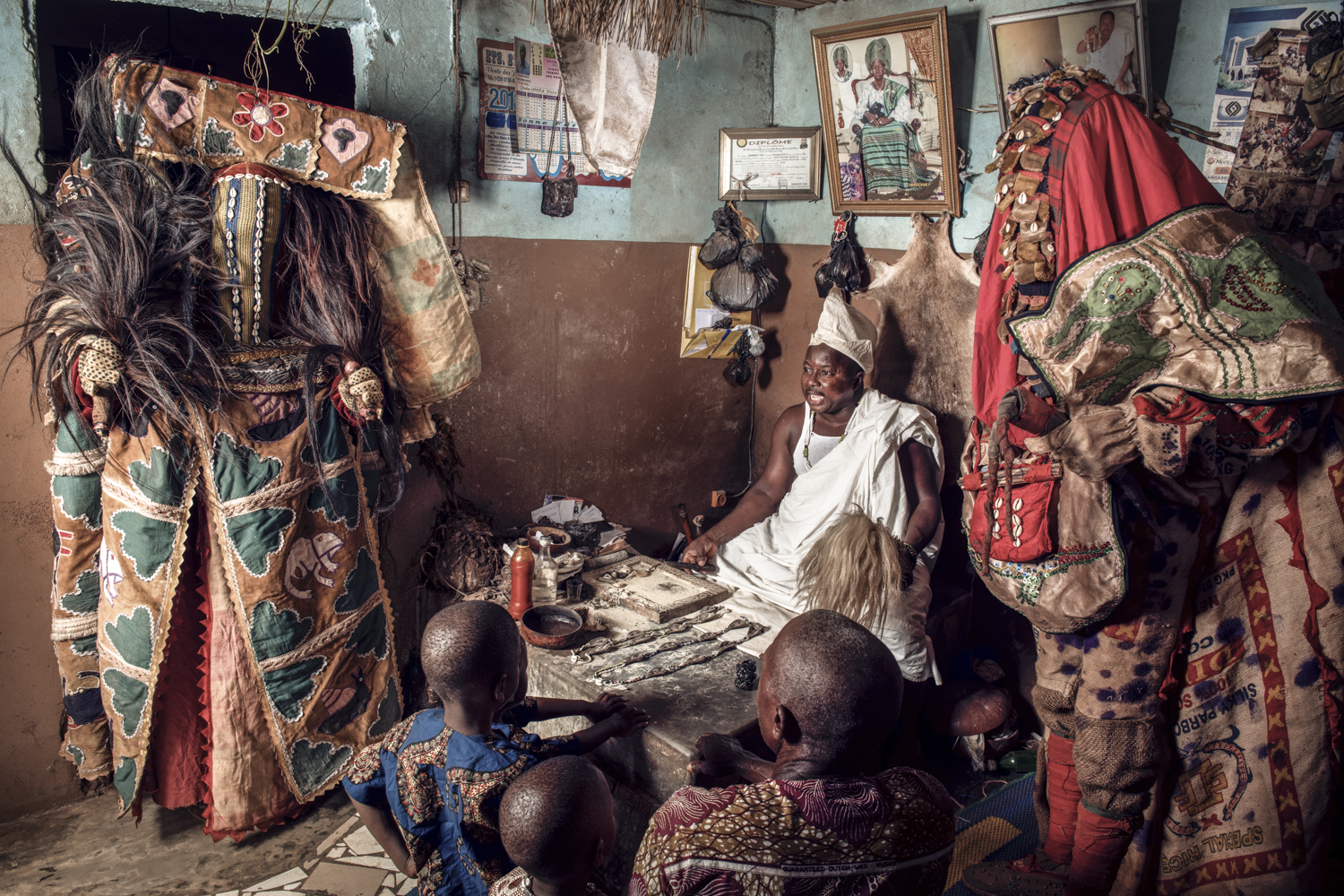
Egungun: Ancestor worship
In Africa, the dead of the family must be honored. For in many African cultures, death does not really exist; the spirit leaves the body to continue its life in the world of the dead, that of the ancestors.
Among the Yoruba, these dead manifest themselves to their descendants through an entity called EGOUN.
It is the spirit of the dead who returns to earth under beautiful loincloths decorated with applications of cut fabric, embroidered and adorned with shells and sequins, bone, and magic wood.
Family and clan societies, strictly reserved for men, have been formed around Egoun the revenant. They evoke the dead, call them and take care of them on earth.
Égoun serves as an intermediary with the souls in the afterlife.
He appears to certain families a few days after the death of one of its members, or during ceremonies performed to honor their memory; he also comes to bring the blessing of the ancestors to the marriages of their descendants and, in certain cases, to welcome a newborn child.
Offerings of food, drink and money are always made to him during his appearances.
EGOUN speaks with a deep, husky voice and dances readily to the sound of Bata or Ogbon drums.
The contact of his loincloth can be fatal to the living, so the MARIWOS (the guardians), members of the EGOUN society, always accompany them, carrying large engraved wooden sticks (lshan) to ward off the unwary. This stick symbolizes the border between the world of the dead (Kou-tome) and the world of the living. Ancestor worship in Africa is directed only to that part of the family that does not go back beyond the founder of the village or the house, that is, to the dynasty of the owners of the inhabited place.
With the exception of the royal families whose members are often deified and therefore have a more important lineage.
This cult is addressed to the deified ancestors and forms a vast system that unites the dead and the living in a continuous and united family whole.
The gods and the dead mix with the living, listen to their complaints, advise them, grant them graces, solve their difficulties and give them remedies for their pains and consolations for their misfortunes. The celestial world is not distant, nor is it superior, and the believer can speak directly with his gods and with his ancestors and benefit from their benevolence.
Each Yoruba clan honors its deceased ancestors in the hope of benefiting from their protection, avoiding their wrath, and keeping the ghosts away from the living.
He therefore regularly brings back the spirit of the ancestors from the realm of the dead (Kou-Tomé)
Each family clan of the ancestor cult has a convent.
It is a sacred place where the masks of the ghosts are kept. It is there that the adepts are trained in secret and that they put on the masks during the ceremonies.
The clan designates those who will be initiated and will have the responsibility of lending their bodies to the spirits of the ancestors and thus, will ensure the dialogue with the ancestors who have become protective deities.
Thus, one or more members of the family are designated, sometimes very young, to be these messengers of the afterlife.
They are taught in secret in a convent for several years, even decades.
There they learn the trance necessary to lend their bodies to the deities, a language that allows them to communicate with the invisible, and to create an appearance...
They emerge from it initiated to the rank of Egungun.
Apart from the initiates, no one knows who is Egungun because during the trances, they appear masked, their bodies totally hidden by their ceremonial costume.
The convent is exclusively reserved for initiates and men, on pain of death. The convent is directed by the Bale, who is generally the head of the family.
The general Alagba is the supreme chief, the king of the Egungun of a city, he watches over the convents of the city.
Egungun: Ancestor worship
In Africa, the dead of the family must be honored. For in many African cultures, death does not really exist; the spirit leaves the body to continue its life in the world of the dead, that of the ancestors.
Among the Yoruba, these dead manifest themselves to their descendants through an entity called EGOUN.
It is the spirit of the dead who returns to earth under beautiful loincloths decorated with applications of cut fabric, embroidered and adorned with shells and sequins, bone, and magic wood.
Family and clan societies, strictly reserved for men, have been formed around Egoun the revenant. They evoke the dead, call them and take care of them on earth.
Égoun serves as an intermediary with the souls in the afterlife.
He appears to certain families a few days after the death of one of its members, or during ceremonies performed to honor their memory; he also comes to bring the blessing of the ancestors to the marriages of their descendants and, in certain cases, to welcome a newborn child.
Offerings of food, drink and money are always made to him during his appearances.
EGOUN speaks with a deep, husky voice and dances readily to the sound of Bata or Ogbon drums.
The contact of his loincloth can be fatal to the living, so the MARIWOS (the guardians), members of the EGOUN society, always accompany them, carrying large engraved wooden sticks (lshan) to ward off the unwary. This stick symbolizes the border between the world of the dead (Kou-tome) and the world of the living. Ancestor worship in Africa is directed only to that part of the family that does not go back beyond the founder of the village or the house, that is, to the dynasty of the owners of the inhabited place.
With the exception of the royal families whose members are often deified and therefore have a more important lineage.
This cult is addressed to the deified ancestors and forms a vast system that unites the dead and the living in a continuous and united family whole.
The gods and the dead mix with the living, listen to their complaints, advise them, grant them graces, solve their difficulties and give them remedies for their pains and consolations for their misfortunes. The celestial world is not distant, nor is it superior, and the believer can speak directly with his gods and with his ancestors and benefit from their benevolence.
Each Yoruba clan honors its deceased ancestors in the hope of benefiting from their protection, avoiding their wrath, and keeping the ghosts away from the living.
He therefore regularly brings back the spirit of the ancestors from the realm of the dead (Kou-Tomé)
Each family clan of the ancestor cult has a convent.
It is a sacred place where the masks of the ghosts are kept. It is there that the adepts are trained in secret and that they put on the masks during the ceremonies.
The clan designates those who will be initiated and will have the responsibility of lending their bodies to the spirits of the ancestors and thus, will ensure the dialogue with the ancestors who have become protective deities.
Thus, one or more members of the family are designated, sometimes very young, to be these messengers of the afterlife.
They are taught in secret in a convent for several years, even decades.
There they learn the trance necessary to lend their bodies to the deities, a language that allows them to communicate with the invisible, and to create an appearance...
They emerge from it initiated to the rank of Egungun.
Apart from the initiates, no one knows who is Egungun because during the trances, they appear masked, their bodies totally hidden by their ceremonial costume.
The convent is exclusively reserved for initiates and men, on pain of death. The convent is directed by the Bale, who is generally the head of the family.
The general Alagba is the supreme chief, the king of the Egungun of a city, he watches over the convents of the city.
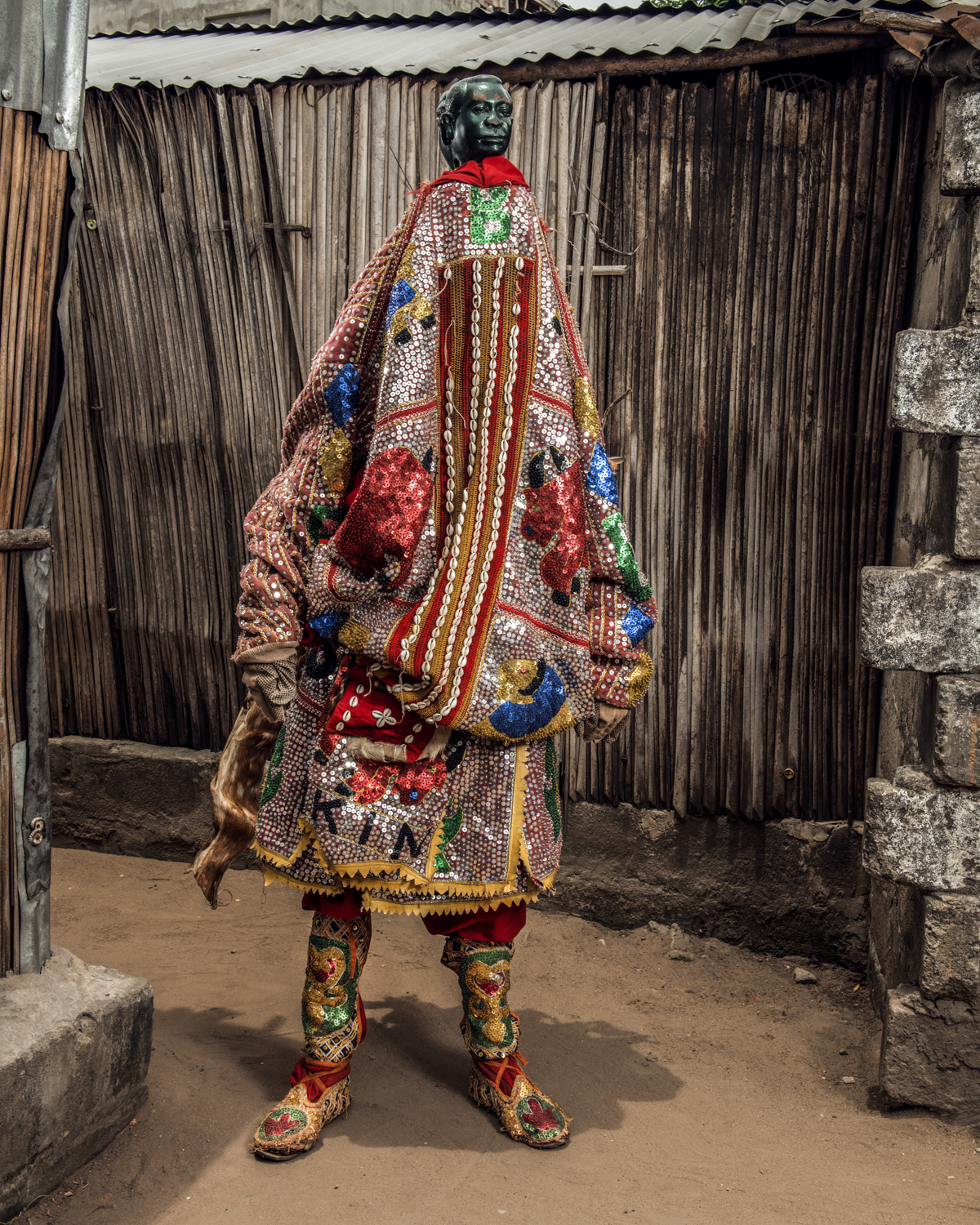
Egungun: Ancestor worship
In Africa, the dead of the family must be honored. For in many African cultures, death does not really exist; the spirit leaves the body to continue its life in the world of the dead, that of the ancestors.
Among the Yoruba, these dead manifest themselves to their descendants through an entity called EGOUN.
It is the spirit of the dead who returns to earth under beautiful loincloths decorated with applications of cut fabric, embroidered and adorned with shells and sequins, bone, and magic wood.
Family and clan societies, strictly reserved for men, have been formed around Egoun the revenant. They evoke the dead, call them and take care of them on earth.
Égoun serves as an intermediary with the souls in the afterlife.
He appears to certain families a few days after the death of one of its members, or during ceremonies performed to honor their memory; he also comes to bring the blessing of the ancestors to the marriages of their descendants and, in certain cases, to welcome a newborn child.
Offerings of food, drink and money are always made to him during his appearances.
EGOUN speaks with a deep, husky voice and dances readily to the sound of Bata or Ogbon drums.
The contact of his loincloth can be fatal to the living, so the MARIWOS (the guardians), members of the EGOUN society, always accompany them, carrying large engraved wooden sticks (lshan) to ward off the unwary. This stick symbolizes the border between the world of the dead (Kou-tome) and the world of the living. Ancestor worship in Africa is directed only to that part of the family that does not go back beyond the founder of the village or the house, that is, to the dynasty of the owners of the inhabited place.
With the exception of the royal families whose members are often deified and therefore have a more important lineage.
This cult is addressed to the deified ancestors and forms a vast system that unites the dead and the living in a continuous and united family whole.
The gods and the dead mix with the living, listen to their complaints, advise them, grant them graces, solve their difficulties and give them remedies for their pains and consolations for their misfortunes. The celestial world is not distant, nor is it superior, and the believer can speak directly with his gods and with his ancestors and benefit from their benevolence.
Each Yoruba clan honors its deceased ancestors in the hope of benefiting from their protection, avoiding their wrath, and keeping the ghosts away from the living.
He therefore regularly brings back the spirit of the ancestors from the realm of the dead (Kou-Tomé)
Each family clan of the ancestor cult has a convent.
It is a sacred place where the masks of the ghosts are kept. It is there that the adepts are trained in secret and that they put on the masks during the ceremonies.
The clan designates those who will be initiated and will have the responsibility of lending their bodies to the spirits of the ancestors and thus, will ensure the dialogue with the ancestors who have become protective deities.
Thus, one or more members of the family are designated, sometimes very young, to be these messengers of the afterlife.
They are taught in secret in a convent for several years, even decades.
There they learn the trance necessary to lend their bodies to the deities, a language that allows them to communicate with the invisible, and to create an appearance...
They emerge from it initiated to the rank of Egungun.
Apart from the initiates, no one knows who is Egungun because during the trances, they appear masked, their bodies totally hidden by their ceremonial costume.
The convent is exclusively reserved for initiates and men, on pain of death. The convent is directed by the Bale, who is generally the head of the family.
The general Alagba is the supreme chief, the king of the Egungun of a city, he watches over the convents of the city.
Egungun: Ancestor worship
In Africa, the dead of the family must be honored. For in many African cultures, death does not really exist; the spirit leaves the body to continue its life in the world of the dead, that of the ancestors.
Among the Yoruba, these dead manifest themselves to their descendants through an entity called EGOUN.
It is the spirit of the dead who returns to earth under beautiful loincloths decorated with applications of cut fabric, embroidered and adorned with shells and sequins, bone, and magic wood.
Family and clan societies, strictly reserved for men, have been formed around Egoun the revenant. They evoke the dead, call them and take care of them on earth.
Égoun serves as an intermediary with the souls in the afterlife.
He appears to certain families a few days after the death of one of its members, or during ceremonies performed to honor their memory; he also comes to bring the blessing of the ancestors to the marriages of their descendants and, in certain cases, to welcome a newborn child.
Offerings of food, drink and money are always made to him during his appearances.
EGOUN speaks with a deep, husky voice and dances readily to the sound of Bata or Ogbon drums.
The contact of his loincloth can be fatal to the living, so the MARIWOS (the guardians), members of the EGOUN society, always accompany them, carrying large engraved wooden sticks (lshan) to ward off the unwary. This stick symbolizes the border between the world of the dead (Kou-tome) and the world of the living. Ancestor worship in Africa is directed only to that part of the family that does not go back beyond the founder of the village or the house, that is, to the dynasty of the owners of the inhabited place.
With the exception of the royal families whose members are often deified and therefore have a more important lineage.
This cult is addressed to the deified ancestors and forms a vast system that unites the dead and the living in a continuous and united family whole.
The gods and the dead mix with the living, listen to their complaints, advise them, grant them graces, solve their difficulties and give them remedies for their pains and consolations for their misfortunes. The celestial world is not distant, nor is it superior, and the believer can speak directly with his gods and with his ancestors and benefit from their benevolence.
Each Yoruba clan honors its deceased ancestors in the hope of benefiting from their protection, avoiding their wrath, and keeping the ghosts away from the living.
He therefore regularly brings back the spirit of the ancestors from the realm of the dead (Kou-Tomé)
Each family clan of the ancestor cult has a convent.
It is a sacred place where the masks of the ghosts are kept. It is there that the adepts are trained in secret and that they put on the masks during the ceremonies.
The clan designates those who will be initiated and will have the responsibility of lending their bodies to the spirits of the ancestors and thus, will ensure the dialogue with the ancestors who have become protective deities.
Thus, one or more members of the family are designated, sometimes very young, to be these messengers of the afterlife.
They are taught in secret in a convent for several years, even decades.
There they learn the trance necessary to lend their bodies to the deities, a language that allows them to communicate with the invisible, and to create an appearance...
They emerge from it initiated to the rank of Egungun.
Apart from the initiates, no one knows who is Egungun because during the trances, they appear masked, their bodies totally hidden by their ceremonial costume.
The convent is exclusively reserved for initiates and men, on pain of death. The convent is directed by the Bale, who is generally the head of the family.
The general Alagba is the supreme chief, the king of the Egungun of a city, he watches over the convents of the city.
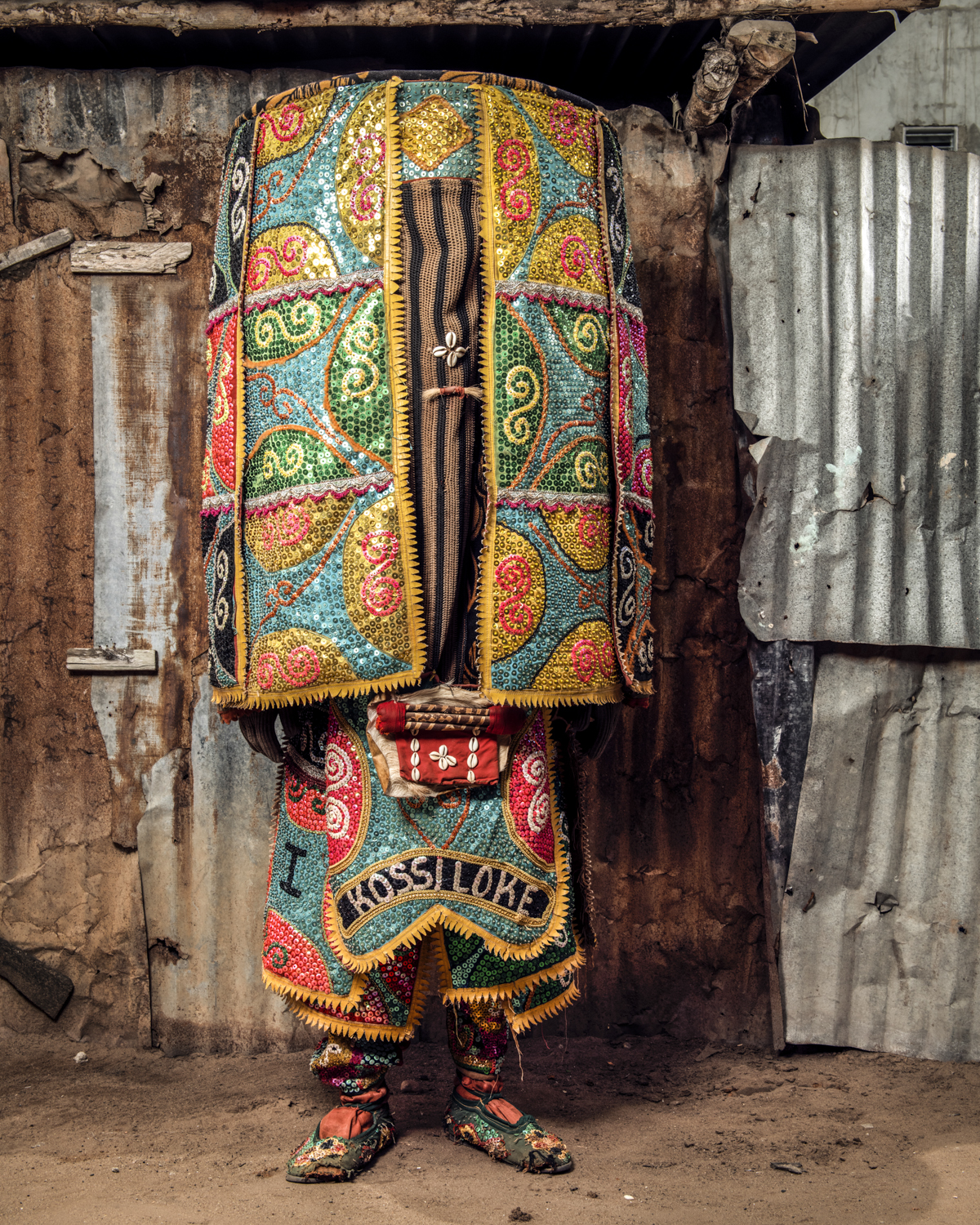
Egungun: Ancestor worship
In Africa, the dead of the family must be honored. For in many African cultures, death does not really exist; the spirit leaves the body to continue its life in the world of the dead, that of the ancestors.
Among the Yoruba, these dead manifest themselves to their descendants through an entity called EGOUN.
It is the spirit of the dead who returns to earth under beautiful loincloths decorated with applications of cut fabric, embroidered and adorned with shells and sequins, bone, and magic wood.
Family and clan societies, strictly reserved for men, have been formed around Egoun the revenant. They evoke the dead, call them and take care of them on earth.
Égoun serves as an intermediary with the souls in the afterlife.
He appears to certain families a few days after the death of one of its members, or during ceremonies performed to honor their memory; he also comes to bring the blessing of the ancestors to the marriages of their descendants and, in certain cases, to welcome a newborn child.
Offerings of food, drink and money are always made to him during his appearances.
EGOUN speaks with a deep, husky voice and dances readily to the sound of Bata or Ogbon drums.
The contact of his loincloth can be fatal to the living, so the MARIWOS (the guardians), members of the EGOUN society, always accompany them, carrying large engraved wooden sticks (lshan) to ward off the unwary. This stick symbolizes the border between the world of the dead (Kou-tome) and the world of the living. Ancestor worship in Africa is directed only to that part of the family that does not go back beyond the founder of the village or the house, that is, to the dynasty of the owners of the inhabited place.
With the exception of the royal families whose members are often deified and therefore have a more important lineage.
This cult is addressed to the deified ancestors and forms a vast system that unites the dead and the living in a continuous and united family whole.
The gods and the dead mix with the living, listen to their complaints, advise them, grant them graces, solve their difficulties and give them remedies for their pains and consolations for their misfortunes. The celestial world is not distant, nor is it superior, and the believer can speak directly with his gods and with his ancestors and benefit from their benevolence.
Each Yoruba clan honors its deceased ancestors in the hope of benefiting from their protection, avoiding their wrath, and keeping the ghosts away from the living.
He therefore regularly brings back the spirit of the ancestors from the realm of the dead (Kou-Tomé)
Each family clan of the ancestor cult has a convent.
It is a sacred place where the masks of the ghosts are kept. It is there that the adepts are trained in secret and that they put on the masks during the ceremonies.
The clan designates those who will be initiated and will have the responsibility of lending their bodies to the spirits of the ancestors and thus, will ensure the dialogue with the ancestors who have become protective deities.
Thus, one or more members of the family are designated, sometimes very young, to be these messengers of the afterlife.
They are taught in secret in a convent for several years, even decades.
There they learn the trance necessary to lend their bodies to the deities, a language that allows them to communicate with the invisible, and to create an appearance...
They emerge from it initiated to the rank of Egungun.
Apart from the initiates, no one knows who is Egungun because during the trances, they appear masked, their bodies totally hidden by their ceremonial costume.
The convent is exclusively reserved for initiates and men, on pain of death. The convent is directed by the Bale, who is generally the head of the family.
The general Alagba is the supreme chief, the king of the Egungun of a city, he watches over the convents of the city.
Egungun: Ancestor worship
In Africa, the dead of the family must be honored. For in many African cultures, death does not really exist; the spirit leaves the body to continue its life in the world of the dead, that of the ancestors.
Among the Yoruba, these dead manifest themselves to their descendants through an entity called EGOUN.
It is the spirit of the dead who returns to earth under beautiful loincloths decorated with applications of cut fabric, embroidered and adorned with shells and sequins, bone, and magic wood.
Family and clan societies, strictly reserved for men, have been formed around Egoun the revenant. They evoke the dead, call them and take care of them on earth.
Égoun serves as an intermediary with the souls in the afterlife.
He appears to certain families a few days after the death of one of its members, or during ceremonies performed to honor their memory; he also comes to bring the blessing of the ancestors to the marriages of their descendants and, in certain cases, to welcome a newborn child.
Offerings of food, drink and money are always made to him during his appearances.
EGOUN speaks with a deep, husky voice and dances readily to the sound of Bata or Ogbon drums.
The contact of his loincloth can be fatal to the living, so the MARIWOS (the guardians), members of the EGOUN society, always accompany them, carrying large engraved wooden sticks (lshan) to ward off the unwary. This stick symbolizes the border between the world of the dead (Kou-tome) and the world of the living. Ancestor worship in Africa is directed only to that part of the family that does not go back beyond the founder of the village or the house, that is, to the dynasty of the owners of the inhabited place.
With the exception of the royal families whose members are often deified and therefore have a more important lineage.
This cult is addressed to the deified ancestors and forms a vast system that unites the dead and the living in a continuous and united family whole.
The gods and the dead mix with the living, listen to their complaints, advise them, grant them graces, solve their difficulties and give them remedies for their pains and consolations for their misfortunes. The celestial world is not distant, nor is it superior, and the believer can speak directly with his gods and with his ancestors and benefit from their benevolence.
Each Yoruba clan honors its deceased ancestors in the hope of benefiting from their protection, avoiding their wrath, and keeping the ghosts away from the living.
He therefore regularly brings back the spirit of the ancestors from the realm of the dead (Kou-Tomé)
Each family clan of the ancestor cult has a convent.
It is a sacred place where the masks of the ghosts are kept. It is there that the adepts are trained in secret and that they put on the masks during the ceremonies.
The clan designates those who will be initiated and will have the responsibility of lending their bodies to the spirits of the ancestors and thus, will ensure the dialogue with the ancestors who have become protective deities.
Thus, one or more members of the family are designated, sometimes very young, to be these messengers of the afterlife.
They are taught in secret in a convent for several years, even decades.
There they learn the trance necessary to lend their bodies to the deities, a language that allows them to communicate with the invisible, and to create an appearance...
They emerge from it initiated to the rank of Egungun.
Apart from the initiates, no one knows who is Egungun because during the trances, they appear masked, their bodies totally hidden by their ceremonial costume.
The convent is exclusively reserved for initiates and men, on pain of death. The convent is directed by the Bale, who is generally the head of the family.
The general Alagba is the supreme chief, the king of the Egungun of a city, he watches over the convents of the city.
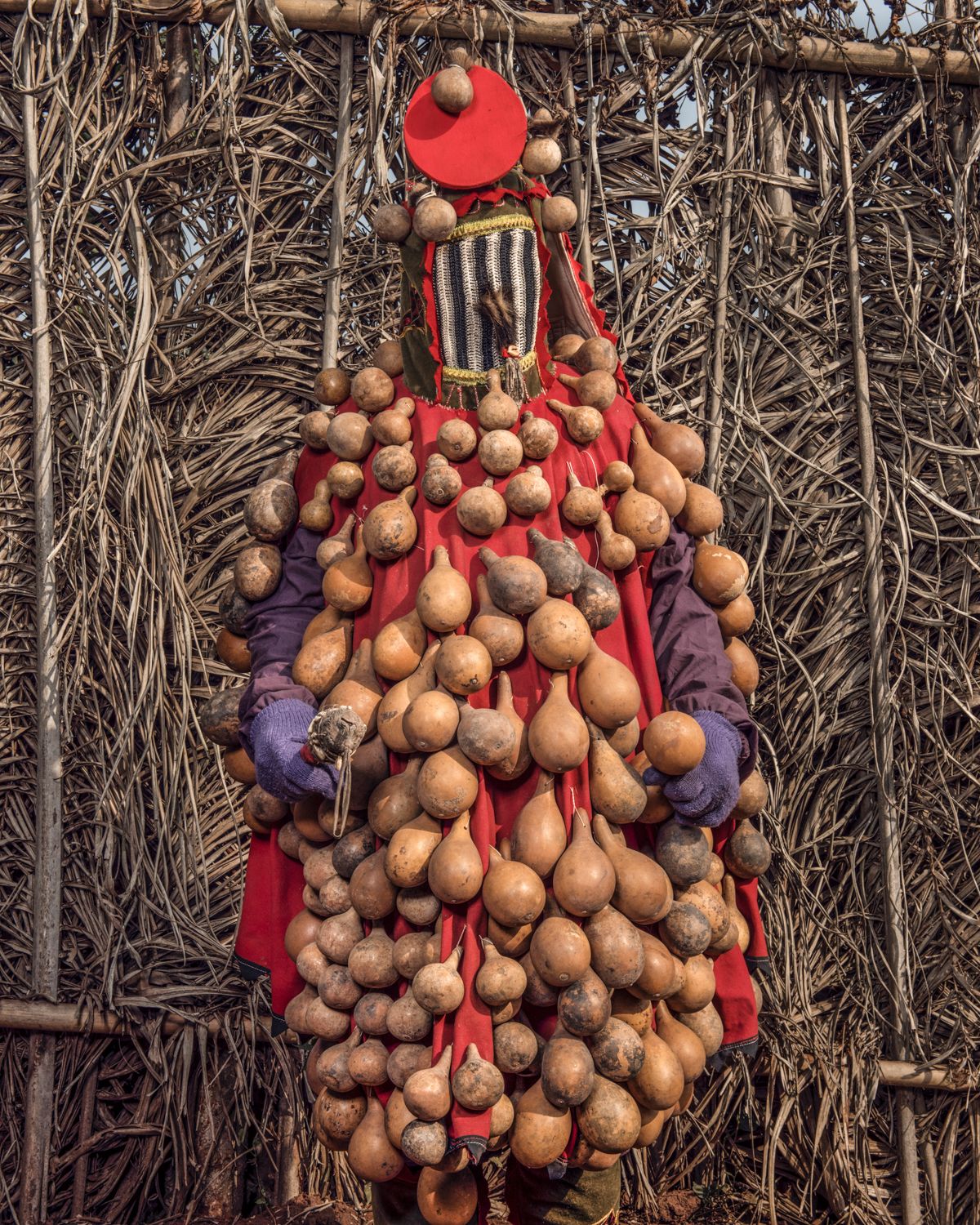
Egungun: Ancestor worship
In Africa, the dead of the family must be honored. For in many African cultures, death does not really exist; the spirit leaves the body to continue its life in the world of the dead, that of the ancestors.
Among the Yoruba, these dead manifest themselves to their descendants through an entity called EGOUN.
It is the spirit of the dead who returns to earth under beautiful loincloths decorated with applications of cut fabric, embroidered and adorned with shells and sequins, bone, and magic wood.
Family and clan societies, strictly reserved for men, have been formed around Egoun the revenant. They evoke the dead, call them and take care of them on earth.
Égoun serves as an intermediary with the souls in the afterlife.
He appears to certain families a few days after the death of one of its members, or during ceremonies performed to honor their memory; he also comes to bring the blessing of the ancestors to the marriages of their descendants and, in certain cases, to welcome a newborn child.
Offerings of food, drink and money are always made to him during his appearances.
EGOUN speaks with a deep, husky voice and dances readily to the sound of Bata or Ogbon drums.
The contact of his loincloth can be fatal to the living, so the MARIWOS (the guardians), members of the EGOUN society, always accompany them, carrying large engraved wooden sticks (lshan) to ward off the unwary. This stick symbolizes the border between the world of the dead (Kou-tome) and the world of the living. Ancestor worship in Africa is directed only to that part of the family that does not go back beyond the founder of the village or the house, that is, to the dynasty of the owners of the inhabited place.
With the exception of the royal families whose members are often deified and therefore have a more important lineage.
This cult is addressed to the deified ancestors and forms a vast system that unites the dead and the living in a continuous and united family whole.
The gods and the dead mix with the living, listen to their complaints, advise them, grant them graces, solve their difficulties and give them remedies for their pains and consolations for their misfortunes. The celestial world is not distant, nor is it superior, and the believer can speak directly with his gods and with his ancestors and benefit from their benevolence.
Each Yoruba clan honors its deceased ancestors in the hope of benefiting from their protection, avoiding their wrath, and keeping the ghosts away from the living.
He therefore regularly brings back the spirit of the ancestors from the realm of the dead (Kou-Tomé)
Each family clan of the ancestor cult has a convent.
It is a sacred place where the masks of the ghosts are kept. It is there that the adepts are trained in secret and that they put on the masks during the ceremonies.
The clan designates those who will be initiated and will have the responsibility of lending their bodies to the spirits of the ancestors and thus, will ensure the dialogue with the ancestors who have become protective deities.
Thus, one or more members of the family are designated, sometimes very young, to be these messengers of the afterlife.
They are taught in secret in a convent for several years, even decades.
There they learn the trance necessary to lend their bodies to the deities, a language that allows them to communicate with the invisible, and to create an appearance...
They emerge from it initiated to the rank of Egungun.
Apart from the initiates, no one knows who is Egungun because during the trances, they appear masked, their bodies totally hidden by their ceremonial costume.
The convent is exclusively reserved for initiates and men, on pain of death. The convent is directed by the Bale, who is generally the head of the family.
The general Alagba is the supreme chief, the king of the Egungun of a city, he watches over the convents of the city.
Egungun: Ancestor worship
In Africa, the dead of the family must be honored. For in many African cultures, death does not really exist; the spirit leaves the body to continue its life in the world of the dead, that of the ancestors.
Among the Yoruba, these dead manifest themselves to their descendants through an entity called EGOUN.
It is the spirit of the dead who returns to earth under beautiful loincloths decorated with applications of cut fabric, embroidered and adorned with shells and sequins, bone, and magic wood.
Family and clan societies, strictly reserved for men, have been formed around Egoun the revenant. They evoke the dead, call them and take care of them on earth.
Égoun serves as an intermediary with the souls in the afterlife.
He appears to certain families a few days after the death of one of its members, or during ceremonies performed to honor their memory; he also comes to bring the blessing of the ancestors to the marriages of their descendants and, in certain cases, to welcome a newborn child.
Offerings of food, drink and money are always made to him during his appearances.
EGOUN speaks with a deep, husky voice and dances readily to the sound of Bata or Ogbon drums.
The contact of his loincloth can be fatal to the living, so the MARIWOS (the guardians), members of the EGOUN society, always accompany them, carrying large engraved wooden sticks (lshan) to ward off the unwary. This stick symbolizes the border between the world of the dead (Kou-tome) and the world of the living. Ancestor worship in Africa is directed only to that part of the family that does not go back beyond the founder of the village or the house, that is, to the dynasty of the owners of the inhabited place.
With the exception of the royal families whose members are often deified and therefore have a more important lineage.
This cult is addressed to the deified ancestors and forms a vast system that unites the dead and the living in a continuous and united family whole.
The gods and the dead mix with the living, listen to their complaints, advise them, grant them graces, solve their difficulties and give them remedies for their pains and consolations for their misfortunes. The celestial world is not distant, nor is it superior, and the believer can speak directly with his gods and with his ancestors and benefit from their benevolence.
Each Yoruba clan honors its deceased ancestors in the hope of benefiting from their protection, avoiding their wrath, and keeping the ghosts away from the living.
He therefore regularly brings back the spirit of the ancestors from the realm of the dead (Kou-Tomé)
Each family clan of the ancestor cult has a convent.
It is a sacred place where the masks of the ghosts are kept. It is there that the adepts are trained in secret and that they put on the masks during the ceremonies.
The clan designates those who will be initiated and will have the responsibility of lending their bodies to the spirits of the ancestors and thus, will ensure the dialogue with the ancestors who have become protective deities.
Thus, one or more members of the family are designated, sometimes very young, to be these messengers of the afterlife.
They are taught in secret in a convent for several years, even decades.
There they learn the trance necessary to lend their bodies to the deities, a language that allows them to communicate with the invisible, and to create an appearance...
They emerge from it initiated to the rank of Egungun.
Apart from the initiates, no one knows who is Egungun because during the trances, they appear masked, their bodies totally hidden by their ceremonial costume.
The convent is exclusively reserved for initiates and men, on pain of death. The convent is directed by the Bale, who is generally the head of the family.
The general Alagba is the supreme chief, the king of the Egungun of a city, he watches over the convents of the city.
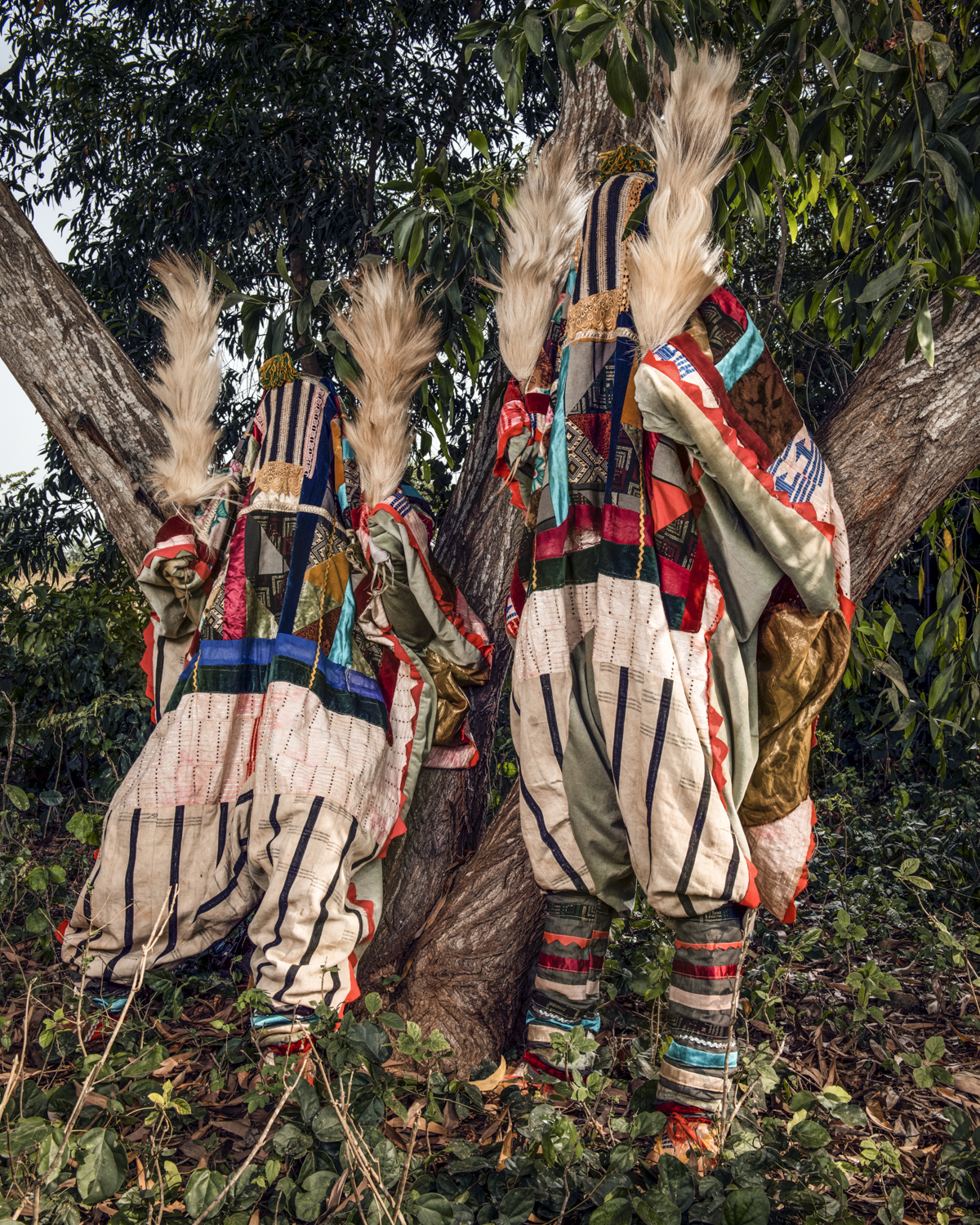
Egungun: Ancestor worship
In Africa, the dead of the family must be honored. For in many African cultures, death does not really exist; the spirit leaves the body to continue its life in the world of the dead, that of the ancestors.
Among the Yoruba, these dead manifest themselves to their descendants through an entity called EGOUN.
It is the spirit of the dead who returns to earth under beautiful loincloths decorated with applications of cut fabric, embroidered and adorned with shells and sequins, bone, and magic wood.
Family and clan societies, strictly reserved for men, have been formed around Egoun the revenant. They evoke the dead, call them and take care of them on earth.
Égoun serves as an intermediary with the souls in the afterlife.
He appears to certain families a few days after the death of one of its members, or during ceremonies performed to honor their memory; he also comes to bring the blessing of the ancestors to the marriages of their descendants and, in certain cases, to welcome a newborn child.
Offerings of food, drink and money are always made to him during his appearances.
EGOUN speaks with a deep, husky voice and dances readily to the sound of Bata or Ogbon drums.
The contact of his loincloth can be fatal to the living, so the MARIWOS (the guardians), members of the EGOUN society, always accompany them, carrying large engraved wooden sticks (lshan) to ward off the unwary. This stick symbolizes the border between the world of the dead (Kou-tome) and the world of the living. Ancestor worship in Africa is directed only to that part of the family that does not go back beyond the founder of the village or the house, that is, to the dynasty of the owners of the inhabited place.
With the exception of the royal families whose members are often deified and therefore have a more important lineage.
This cult is addressed to the deified ancestors and forms a vast system that unites the dead and the living in a continuous and united family whole.
The gods and the dead mix with the living, listen to their complaints, advise them, grant them graces, solve their difficulties and give them remedies for their pains and consolations for their misfortunes. The celestial world is not distant, nor is it superior, and the believer can speak directly with his gods and with his ancestors and benefit from their benevolence.
Each Yoruba clan honors its deceased ancestors in the hope of benefiting from their protection, avoiding their wrath, and keeping the ghosts away from the living.
He therefore regularly brings back the spirit of the ancestors from the realm of the dead (Kou-Tomé)
Each family clan of the ancestor cult has a convent.
It is a sacred place where the masks of the ghosts are kept. It is there that the adepts are trained in secret and that they put on the masks during the ceremonies.
The clan designates those who will be initiated and will have the responsibility of lending their bodies to the spirits of the ancestors and thus, will ensure the dialogue with the ancestors who have become protective deities.
Thus, one or more members of the family are designated, sometimes very young, to be these messengers of the afterlife.
They are taught in secret in a convent for several years, even decades.
There they learn the trance necessary to lend their bodies to the deities, a language that allows them to communicate with the invisible, and to create an appearance...
They emerge from it initiated to the rank of Egungun.
Apart from the initiates, no one knows who is Egungun because during the trances, they appear masked, their bodies totally hidden by their ceremonial costume.
The convent is exclusively reserved for initiates and men, on pain of death. The convent is directed by the Bale, who is generally the head of the family.
The general Alagba is the supreme chief, the king of the Egungun of a city, he watches over the convents of the city.
Egungun: Ancestor worship
In Africa, the dead of the family must be honored. For in many African cultures, death does not really exist; the spirit leaves the body to continue its life in the world of the dead, that of the ancestors.
Among the Yoruba, these dead manifest themselves to their descendants through an entity called EGOUN.
It is the spirit of the dead who returns to earth under beautiful loincloths decorated with applications of cut fabric, embroidered and adorned with shells and sequins, bone, and magic wood.
Family and clan societies, strictly reserved for men, have been formed around Egoun the revenant. They evoke the dead, call them and take care of them on earth.
Égoun serves as an intermediary with the souls in the afterlife.
He appears to certain families a few days after the death of one of its members, or during ceremonies performed to honor their memory; he also comes to bring the blessing of the ancestors to the marriages of their descendants and, in certain cases, to welcome a newborn child.
Offerings of food, drink and money are always made to him during his appearances.
EGOUN speaks with a deep, husky voice and dances readily to the sound of Bata or Ogbon drums.
The contact of his loincloth can be fatal to the living, so the MARIWOS (the guardians), members of the EGOUN society, always accompany them, carrying large engraved wooden sticks (lshan) to ward off the unwary. This stick symbolizes the border between the world of the dead (Kou-tome) and the world of the living. Ancestor worship in Africa is directed only to that part of the family that does not go back beyond the founder of the village or the house, that is, to the dynasty of the owners of the inhabited place.
With the exception of the royal families whose members are often deified and therefore have a more important lineage.
This cult is addressed to the deified ancestors and forms a vast system that unites the dead and the living in a continuous and united family whole.
The gods and the dead mix with the living, listen to their complaints, advise them, grant them graces, solve their difficulties and give them remedies for their pains and consolations for their misfortunes. The celestial world is not distant, nor is it superior, and the believer can speak directly with his gods and with his ancestors and benefit from their benevolence.
Each Yoruba clan honors its deceased ancestors in the hope of benefiting from their protection, avoiding their wrath, and keeping the ghosts away from the living.
He therefore regularly brings back the spirit of the ancestors from the realm of the dead (Kou-Tomé)
Each family clan of the ancestor cult has a convent.
It is a sacred place where the masks of the ghosts are kept. It is there that the adepts are trained in secret and that they put on the masks during the ceremonies.
The clan designates those who will be initiated and will have the responsibility of lending their bodies to the spirits of the ancestors and thus, will ensure the dialogue with the ancestors who have become protective deities.
Thus, one or more members of the family are designated, sometimes very young, to be these messengers of the afterlife.
They are taught in secret in a convent for several years, even decades.
There they learn the trance necessary to lend their bodies to the deities, a language that allows them to communicate with the invisible, and to create an appearance...
They emerge from it initiated to the rank of Egungun.
Apart from the initiates, no one knows who is Egungun because during the trances, they appear masked, their bodies totally hidden by their ceremonial costume.
The convent is exclusively reserved for initiates and men, on pain of death. The convent is directed by the Bale, who is generally the head of the family.
The general Alagba is the supreme chief, the king of the Egungun of a city, he watches over the convents of the city.
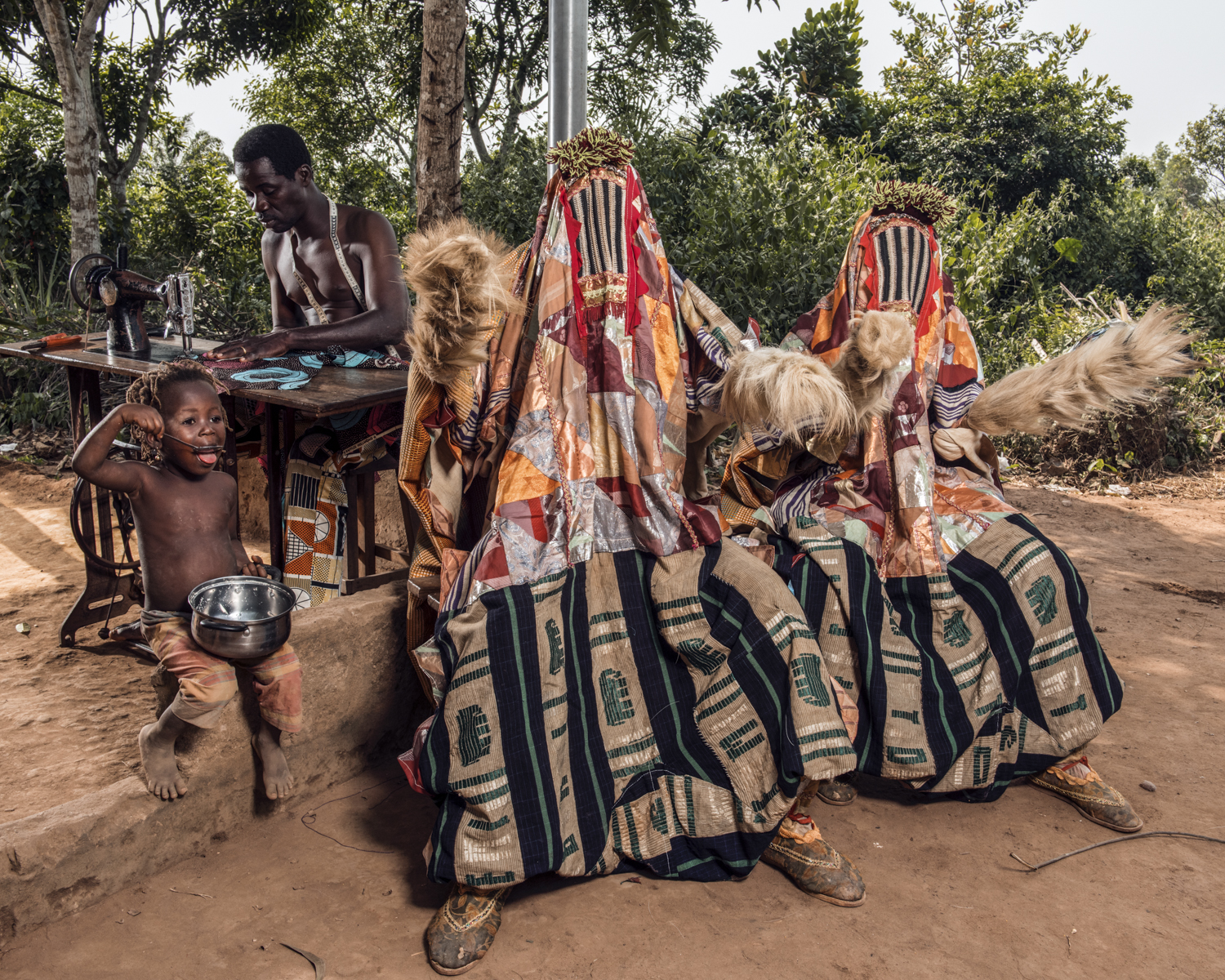
Egungun: Ancestor worship
In Africa, the dead of the family must be honored. For in many African cultures, death does not really exist; the spirit leaves the body to continue its life in the world of the dead, that of the ancestors.
Among the Yoruba, these dead manifest themselves to their descendants through an entity called EGOUN.
It is the spirit of the dead who returns to earth under beautiful loincloths decorated with applications of cut fabric, embroidered and adorned with shells and sequins, bone, and magic wood.
Family and clan societies, strictly reserved for men, have been formed around Egoun the revenant. They evoke the dead, call them and take care of them on earth.
Égoun serves as an intermediary with the souls in the afterlife.
He appears to certain families a few days after the death of one of its members, or during ceremonies performed to honor their memory; he also comes to bring the blessing of the ancestors to the marriages of their descendants and, in certain cases, to welcome a newborn child.
Offerings of food, drink and money are always made to him during his appearances.
EGOUN speaks with a deep, husky voice and dances readily to the sound of Bata or Ogbon drums.
The contact of his loincloth can be fatal to the living, so the MARIWOS (the guardians), members of the EGOUN society, always accompany them, carrying large engraved wooden sticks (lshan) to ward off the unwary. This stick symbolizes the border between the world of the dead (Kou-tome) and the world of the living. Ancestor worship in Africa is directed only to that part of the family that does not go back beyond the founder of the village or the house, that is, to the dynasty of the owners of the inhabited place.
With the exception of the royal families whose members are often deified and therefore have a more important lineage.
This cult is addressed to the deified ancestors and forms a vast system that unites the dead and the living in a continuous and united family whole.
The gods and the dead mix with the living, listen to their complaints, advise them, grant them graces, solve their difficulties and give them remedies for their pains and consolations for their misfortunes. The celestial world is not distant, nor is it superior, and the believer can speak directly with his gods and with his ancestors and benefit from their benevolence.
Each Yoruba clan honors its deceased ancestors in the hope of benefiting from their protection, avoiding their wrath, and keeping the ghosts away from the living.
He therefore regularly brings back the spirit of the ancestors from the realm of the dead (Kou-Tomé)
Each family clan of the ancestor cult has a convent.
It is a sacred place where the masks of the ghosts are kept. It is there that the adepts are trained in secret and that they put on the masks during the ceremonies.
The clan designates those who will be initiated and will have the responsibility of lending their bodies to the spirits of the ancestors and thus, will ensure the dialogue with the ancestors who have become protective deities.
Thus, one or more members of the family are designated, sometimes very young, to be these messengers of the afterlife.
They are taught in secret in a convent for several years, even decades.
There they learn the trance necessary to lend their bodies to the deities, a language that allows them to communicate with the invisible, and to create an appearance...
They emerge from it initiated to the rank of Egungun.
Apart from the initiates, no one knows who is Egungun because during the trances, they appear masked, their bodies totally hidden by their ceremonial costume.
The convent is exclusively reserved for initiates and men, on pain of death. The convent is directed by the Bale, who is generally the head of the family.
The general Alagba is the supreme chief, the king of the Egungun of a city, he watches over the convents of the city.
Egungun: Ancestor worship
In Africa, the dead of the family must be honored. For in many African cultures, death does not really exist; the spirit leaves the body to continue its life in the world of the dead, that of the ancestors.
Among the Yoruba, these dead manifest themselves to their descendants through an entity called EGOUN.
It is the spirit of the dead who returns to earth under beautiful loincloths decorated with applications of cut fabric, embroidered and adorned with shells and sequins, bone, and magic wood.
Family and clan societies, strictly reserved for men, have been formed around Egoun the revenant. They evoke the dead, call them and take care of them on earth.
Égoun serves as an intermediary with the souls in the afterlife.
He appears to certain families a few days after the death of one of its members, or during ceremonies performed to honor their memory; he also comes to bring the blessing of the ancestors to the marriages of their descendants and, in certain cases, to welcome a newborn child.
Offerings of food, drink and money are always made to him during his appearances.
EGOUN speaks with a deep, husky voice and dances readily to the sound of Bata or Ogbon drums.
The contact of his loincloth can be fatal to the living, so the MARIWOS (the guardians), members of the EGOUN society, always accompany them, carrying large engraved wooden sticks (lshan) to ward off the unwary. This stick symbolizes the border between the world of the dead (Kou-tome) and the world of the living. Ancestor worship in Africa is directed only to that part of the family that does not go back beyond the founder of the village or the house, that is, to the dynasty of the owners of the inhabited place.
With the exception of the royal families whose members are often deified and therefore have a more important lineage.
This cult is addressed to the deified ancestors and forms a vast system that unites the dead and the living in a continuous and united family whole.
The gods and the dead mix with the living, listen to their complaints, advise them, grant them graces, solve their difficulties and give them remedies for their pains and consolations for their misfortunes. The celestial world is not distant, nor is it superior, and the believer can speak directly with his gods and with his ancestors and benefit from their benevolence.
Each Yoruba clan honors its deceased ancestors in the hope of benefiting from their protection, avoiding their wrath, and keeping the ghosts away from the living.
He therefore regularly brings back the spirit of the ancestors from the realm of the dead (Kou-Tomé)
Each family clan of the ancestor cult has a convent.
It is a sacred place where the masks of the ghosts are kept. It is there that the adepts are trained in secret and that they put on the masks during the ceremonies.
The clan designates those who will be initiated and will have the responsibility of lending their bodies to the spirits of the ancestors and thus, will ensure the dialogue with the ancestors who have become protective deities.
Thus, one or more members of the family are designated, sometimes very young, to be these messengers of the afterlife.
They are taught in secret in a convent for several years, even decades.
There they learn the trance necessary to lend their bodies to the deities, a language that allows them to communicate with the invisible, and to create an appearance...
They emerge from it initiated to the rank of Egungun.
Apart from the initiates, no one knows who is Egungun because during the trances, they appear masked, their bodies totally hidden by their ceremonial costume.
The convent is exclusively reserved for initiates and men, on pain of death. The convent is directed by the Bale, who is generally the head of the family.
The general Alagba is the supreme chief, the king of the Egungun of a city, he watches over the convents of the city.
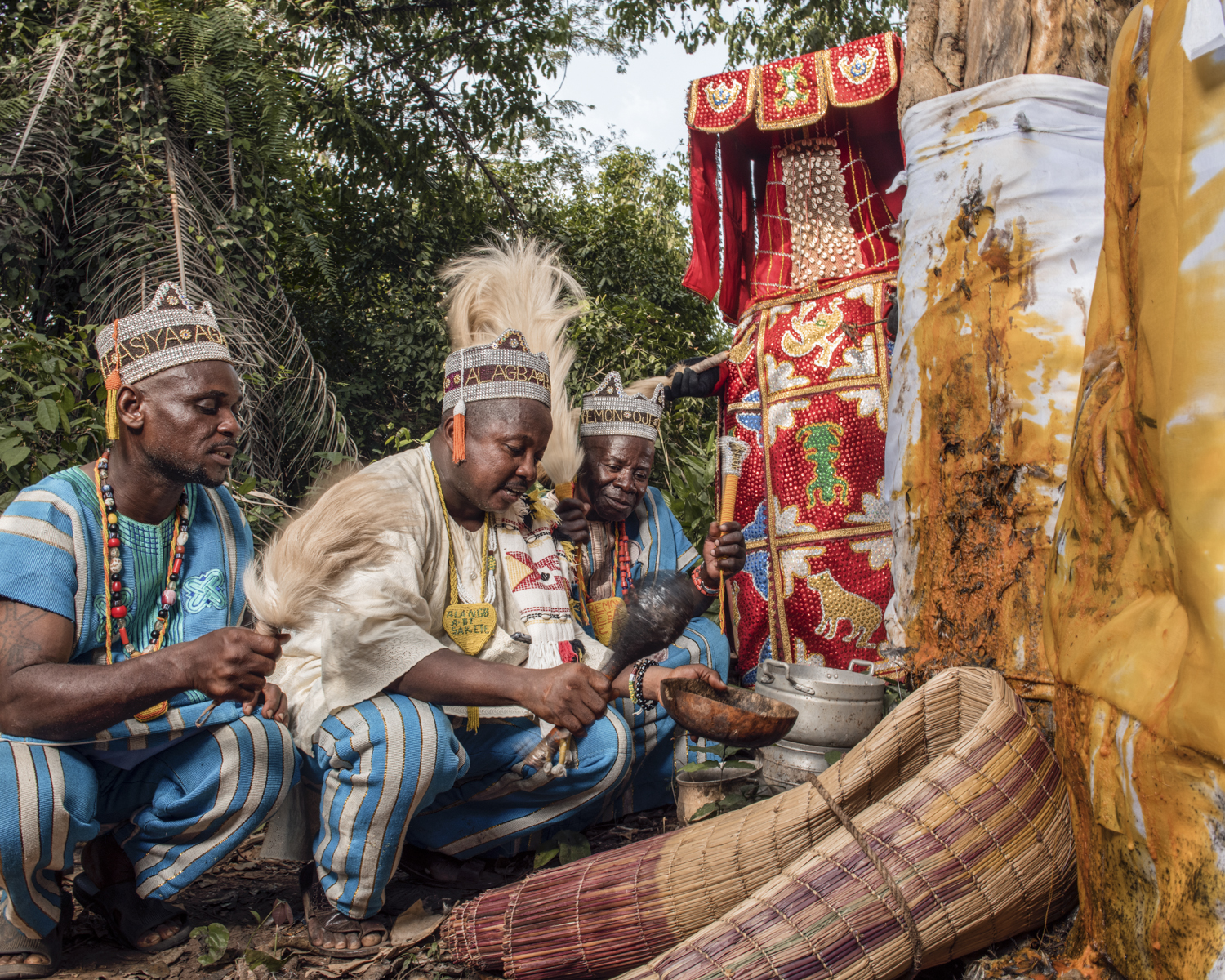
Egungun: Ancestor worship
In Africa, the dead of the family must be honored. For in many African cultures, death does not really exist; the spirit leaves the body to continue its life in the world of the dead, that of the ancestors.
Among the Yoruba, these dead manifest themselves to their descendants through an entity called EGOUN.
It is the spirit of the dead who returns to earth under beautiful loincloths decorated with applications of cut fabric, embroidered and adorned with shells and sequins, bone, and magic wood.
Family and clan societies, strictly reserved for men, have been formed around Egoun the revenant. They evoke the dead, call them and take care of them on earth.
Égoun serves as an intermediary with the souls in the afterlife.
He appears to certain families a few days after the death of one of its members, or during ceremonies performed to honor their memory; he also comes to bring the blessing of the ancestors to the marriages of their descendants and, in certain cases, to welcome a newborn child.
Offerings of food, drink and money are always made to him during his appearances.
EGOUN speaks with a deep, husky voice and dances readily to the sound of Bata or Ogbon drums.
The contact of his loincloth can be fatal to the living, so the MARIWOS (the guardians), members of the EGOUN society, always accompany them, carrying large engraved wooden sticks (lshan) to ward off the unwary. This stick symbolizes the border between the world of the dead (Kou-tome) and the world of the living. Ancestor worship in Africa is directed only to that part of the family that does not go back beyond the founder of the village or the house, that is, to the dynasty of the owners of the inhabited place.
With the exception of the royal families whose members are often deified and therefore have a more important lineage.
This cult is addressed to the deified ancestors and forms a vast system that unites the dead and the living in a continuous and united family whole.
The gods and the dead mix with the living, listen to their complaints, advise them, grant them graces, solve their difficulties and give them remedies for their pains and consolations for their misfortunes. The celestial world is not distant, nor is it superior, and the believer can speak directly with his gods and with his ancestors and benefit from their benevolence.
Each Yoruba clan honors its deceased ancestors in the hope of benefiting from their protection, avoiding their wrath, and keeping the ghosts away from the living.
He therefore regularly brings back the spirit of the ancestors from the realm of the dead (Kou-Tomé)
Each family clan of the ancestor cult has a convent.
It is a sacred place where the masks of the ghosts are kept. It is there that the adepts are trained in secret and that they put on the masks during the ceremonies.
The clan designates those who will be initiated and will have the responsibility of lending their bodies to the spirits of the ancestors and thus, will ensure the dialogue with the ancestors who have become protective deities.
Thus, one or more members of the family are designated, sometimes very young, to be these messengers of the afterlife.
They are taught in secret in a convent for several years, even decades.
There they learn the trance necessary to lend their bodies to the deities, a language that allows them to communicate with the invisible, and to create an appearance...
They emerge from it initiated to the rank of Egungun.
Apart from the initiates, no one knows who is Egungun because during the trances, they appear masked, their bodies totally hidden by their ceremonial costume.
The convent is exclusively reserved for initiates and men, on pain of death. The convent is directed by the Bale, who is generally the head of the family.
The general Alagba is the supreme chief, the king of the Egungun of a city, he watches over the convents of the city.
Egungun: Ancestor worship
In Africa, the dead of the family must be honored. For in many African cultures, death does not really exist; the spirit leaves the body to continue its life in the world of the dead, that of the ancestors.
Among the Yoruba, these dead manifest themselves to their descendants through an entity called EGOUN.
It is the spirit of the dead who returns to earth under beautiful loincloths decorated with applications of cut fabric, embroidered and adorned with shells and sequins, bone, and magic wood.
Family and clan societies, strictly reserved for men, have been formed around Egoun the revenant. They evoke the dead, call them and take care of them on earth.
Égoun serves as an intermediary with the souls in the afterlife.
He appears to certain families a few days after the death of one of its members, or during ceremonies performed to honor their memory; he also comes to bring the blessing of the ancestors to the marriages of their descendants and, in certain cases, to welcome a newborn child.
Offerings of food, drink and money are always made to him during his appearances.
EGOUN speaks with a deep, husky voice and dances readily to the sound of Bata or Ogbon drums.
The contact of his loincloth can be fatal to the living, so the MARIWOS (the guardians), members of the EGOUN society, always accompany them, carrying large engraved wooden sticks (lshan) to ward off the unwary. This stick symbolizes the border between the world of the dead (Kou-tome) and the world of the living. Ancestor worship in Africa is directed only to that part of the family that does not go back beyond the founder of the village or the house, that is, to the dynasty of the owners of the inhabited place.
With the exception of the royal families whose members are often deified and therefore have a more important lineage.
This cult is addressed to the deified ancestors and forms a vast system that unites the dead and the living in a continuous and united family whole.
The gods and the dead mix with the living, listen to their complaints, advise them, grant them graces, solve their difficulties and give them remedies for their pains and consolations for their misfortunes. The celestial world is not distant, nor is it superior, and the believer can speak directly with his gods and with his ancestors and benefit from their benevolence.
Each Yoruba clan honors its deceased ancestors in the hope of benefiting from their protection, avoiding their wrath, and keeping the ghosts away from the living.
He therefore regularly brings back the spirit of the ancestors from the realm of the dead (Kou-Tomé)
Each family clan of the ancestor cult has a convent.
It is a sacred place where the masks of the ghosts are kept. It is there that the adepts are trained in secret and that they put on the masks during the ceremonies.
The clan designates those who will be initiated and will have the responsibility of lending their bodies to the spirits of the ancestors and thus, will ensure the dialogue with the ancestors who have become protective deities.
Thus, one or more members of the family are designated, sometimes very young, to be these messengers of the afterlife.
They are taught in secret in a convent for several years, even decades.
There they learn the trance necessary to lend their bodies to the deities, a language that allows them to communicate with the invisible, and to create an appearance...
They emerge from it initiated to the rank of Egungun.
Apart from the initiates, no one knows who is Egungun because during the trances, they appear masked, their bodies totally hidden by their ceremonial costume.
The convent is exclusively reserved for initiates and men, on pain of death. The convent is directed by the Bale, who is generally the head of the family.
The general Alagba is the supreme chief, the king of the Egungun of a city, he watches over the convents of the city.

Egungun: Ancestor worship
In Africa, the dead of the family must be honored. For in many African cultures, death does not really exist; the spirit leaves the body to continue its life in the world of the dead, that of the ancestors.
Among the Yoruba, these dead manifest themselves to their descendants through an entity called EGOUN.
It is the spirit of the dead who returns to earth under beautiful loincloths decorated with applications of cut fabric, embroidered and adorned with shells and sequins, bone, and magic wood.
Family and clan societies, strictly reserved for men, have been formed around Egoun the revenant. They evoke the dead, call them and take care of them on earth.
Égoun serves as an intermediary with the souls in the afterlife.
He appears to certain families a few days after the death of one of its members, or during ceremonies performed to honor their memory; he also comes to bring the blessing of the ancestors to the marriages of their descendants and, in certain cases, to welcome a newborn child.
Offerings of food, drink and money are always made to him during his appearances.
EGOUN speaks with a deep, husky voice and dances readily to the sound of Bata or Ogbon drums.
The contact of his loincloth can be fatal to the living, so the MARIWOS (the guardians), members of the EGOUN society, always accompany them, carrying large engraved wooden sticks (lshan) to ward off the unwary. This stick symbolizes the border between the world of the dead (Kou-tome) and the world of the living. Ancestor worship in Africa is directed only to that part of the family that does not go back beyond the founder of the village or the house, that is, to the dynasty of the owners of the inhabited place.
With the exception of the royal families whose members are often deified and therefore have a more important lineage.
This cult is addressed to the deified ancestors and forms a vast system that unites the dead and the living in a continuous and united family whole.
The gods and the dead mix with the living, listen to their complaints, advise them, grant them graces, solve their difficulties and give them remedies for their pains and consolations for their misfortunes. The celestial world is not distant, nor is it superior, and the believer can speak directly with his gods and with his ancestors and benefit from their benevolence.
Each Yoruba clan honors its deceased ancestors in the hope of benefiting from their protection, avoiding their wrath, and keeping the ghosts away from the living.
He therefore regularly brings back the spirit of the ancestors from the realm of the dead (Kou-Tomé)
Each family clan of the ancestor cult has a convent.
It is a sacred place where the masks of the ghosts are kept. It is there that the adepts are trained in secret and that they put on the masks during the ceremonies.
The clan designates those who will be initiated and will have the responsibility of lending their bodies to the spirits of the ancestors and thus, will ensure the dialogue with the ancestors who have become protective deities.
Thus, one or more members of the family are designated, sometimes very young, to be these messengers of the afterlife.
They are taught in secret in a convent for several years, even decades.
There they learn the trance necessary to lend their bodies to the deities, a language that allows them to communicate with the invisible, and to create an appearance...
They emerge from it initiated to the rank of Egungun.
Apart from the initiates, no one knows who is Egungun because during the trances, they appear masked, their bodies totally hidden by their ceremonial costume.
The convent is exclusively reserved for initiates and men, on pain of death. The convent is directed by the Bale, who is generally the head of the family.
The general Alagba is the supreme chief, the king of the Egungun of a city, he watches over the convents of the city.
Egungun: Ancestor worship
In Africa, the dead of the family must be honored. For in many African cultures, death does not really exist; the spirit leaves the body to continue its life in the world of the dead, that of the ancestors.
Among the Yoruba, these dead manifest themselves to their descendants through an entity called EGOUN.
It is the spirit of the dead who returns to earth under beautiful loincloths decorated with applications of cut fabric, embroidered and adorned with shells and sequins, bone, and magic wood.
Family and clan societies, strictly reserved for men, have been formed around Egoun the revenant. They evoke the dead, call them and take care of them on earth.
Égoun serves as an intermediary with the souls in the afterlife.
He appears to certain families a few days after the death of one of its members, or during ceremonies performed to honor their memory; he also comes to bring the blessing of the ancestors to the marriages of their descendants and, in certain cases, to welcome a newborn child.
Offerings of food, drink and money are always made to him during his appearances.
EGOUN speaks with a deep, husky voice and dances readily to the sound of Bata or Ogbon drums.
The contact of his loincloth can be fatal to the living, so the MARIWOS (the guardians), members of the EGOUN society, always accompany them, carrying large engraved wooden sticks (lshan) to ward off the unwary. This stick symbolizes the border between the world of the dead (Kou-tome) and the world of the living. Ancestor worship in Africa is directed only to that part of the family that does not go back beyond the founder of the village or the house, that is, to the dynasty of the owners of the inhabited place.
With the exception of the royal families whose members are often deified and therefore have a more important lineage.
This cult is addressed to the deified ancestors and forms a vast system that unites the dead and the living in a continuous and united family whole.
The gods and the dead mix with the living, listen to their complaints, advise them, grant them graces, solve their difficulties and give them remedies for their pains and consolations for their misfortunes. The celestial world is not distant, nor is it superior, and the believer can speak directly with his gods and with his ancestors and benefit from their benevolence.
Each Yoruba clan honors its deceased ancestors in the hope of benefiting from their protection, avoiding their wrath, and keeping the ghosts away from the living.
He therefore regularly brings back the spirit of the ancestors from the realm of the dead (Kou-Tomé)
Each family clan of the ancestor cult has a convent.
It is a sacred place where the masks of the ghosts are kept. It is there that the adepts are trained in secret and that they put on the masks during the ceremonies.
The clan designates those who will be initiated and will have the responsibility of lending their bodies to the spirits of the ancestors and thus, will ensure the dialogue with the ancestors who have become protective deities.
Thus, one or more members of the family are designated, sometimes very young, to be these messengers of the afterlife.
They are taught in secret in a convent for several years, even decades.
There they learn the trance necessary to lend their bodies to the deities, a language that allows them to communicate with the invisible, and to create an appearance...
They emerge from it initiated to the rank of Egungun.
Apart from the initiates, no one knows who is Egungun because during the trances, they appear masked, their bodies totally hidden by their ceremonial costume.
The convent is exclusively reserved for initiates and men, on pain of death. The convent is directed by the Bale, who is generally the head of the family.
The general Alagba is the supreme chief, the king of the Egungun of a city, he watches over the convents of the city.
/
MosaïqueMosaic
LégendeLegend